- Nursing CV examples

Build your CV on this template

When applying for a nursing role, a great CV is crucial if you want to get hired.
Your CV needs to grab recruiters’ attention and tell them exactly why they should interview you quickly.
This guide will walk you through every step of creating a winning nursing CV and also includes 7 nursing CV examples you can use for inspiration.
Guide Contents

Structuring and formatting your CV
- Writing your CV profile
- Detailing work experience
- Your education
Vital skills for your nursing CV
Senior staff nurse cv example.
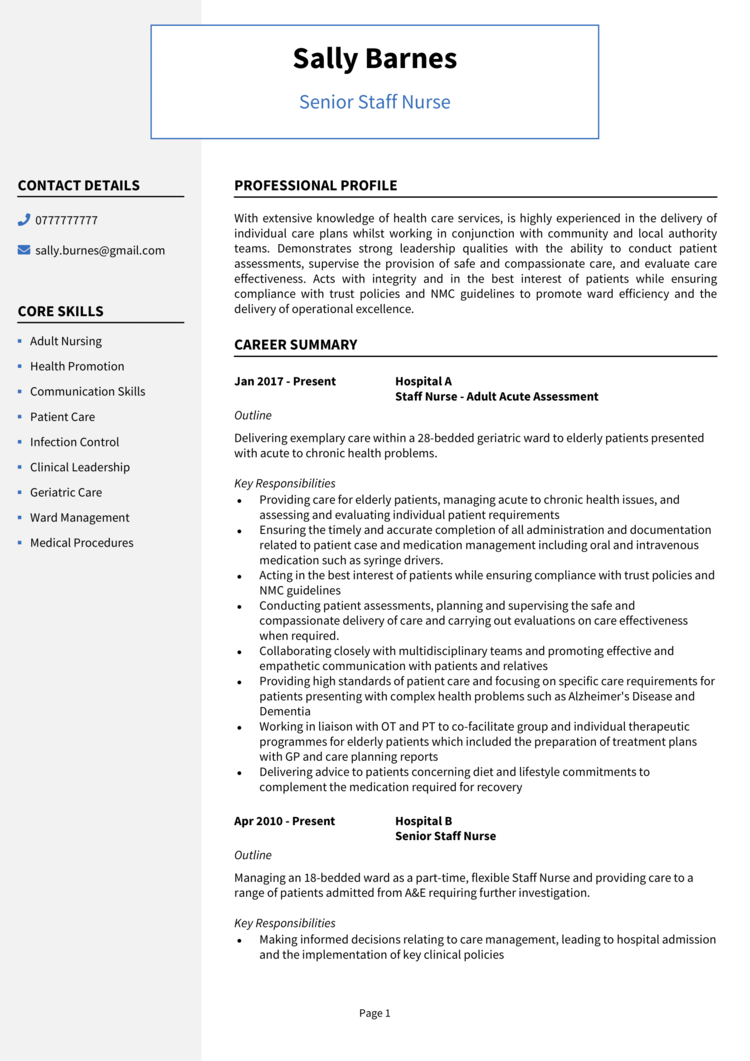
CV templates
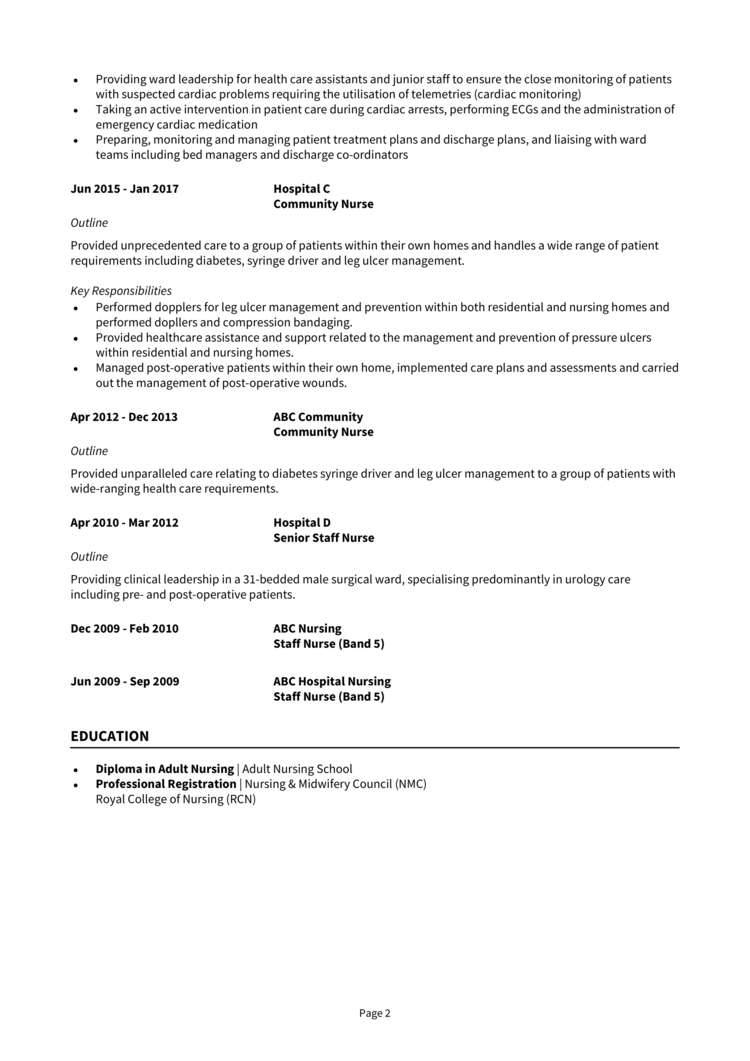
- Surgical Nurse CV
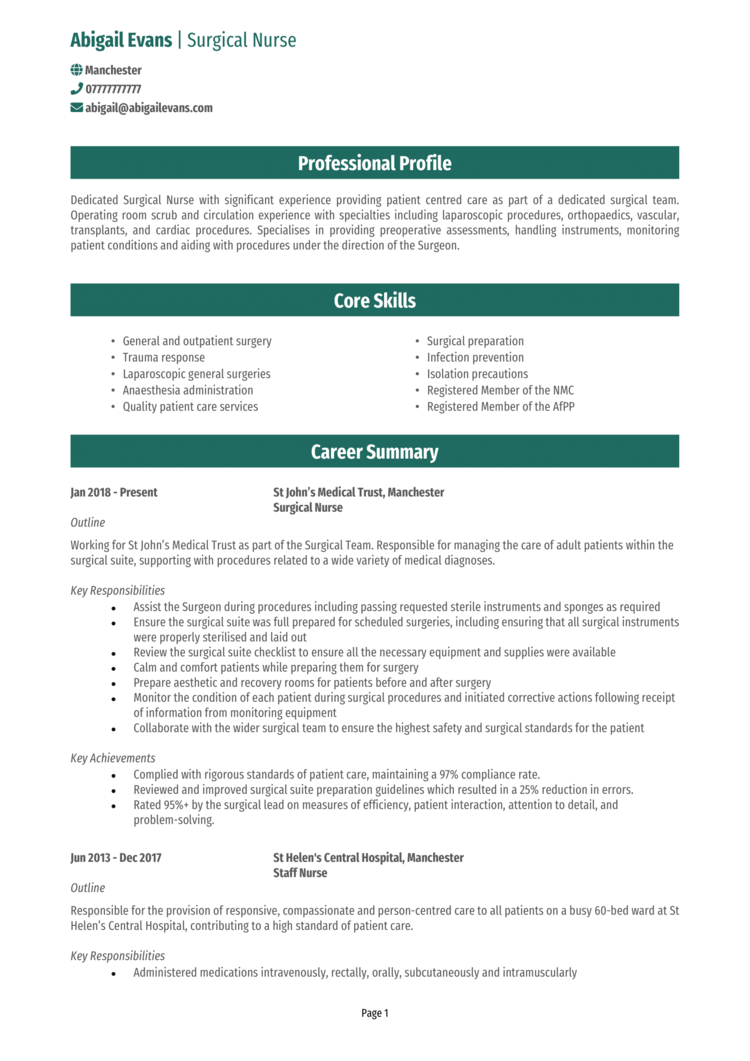
Student Nurse CV

Nurse Practitioner CV example
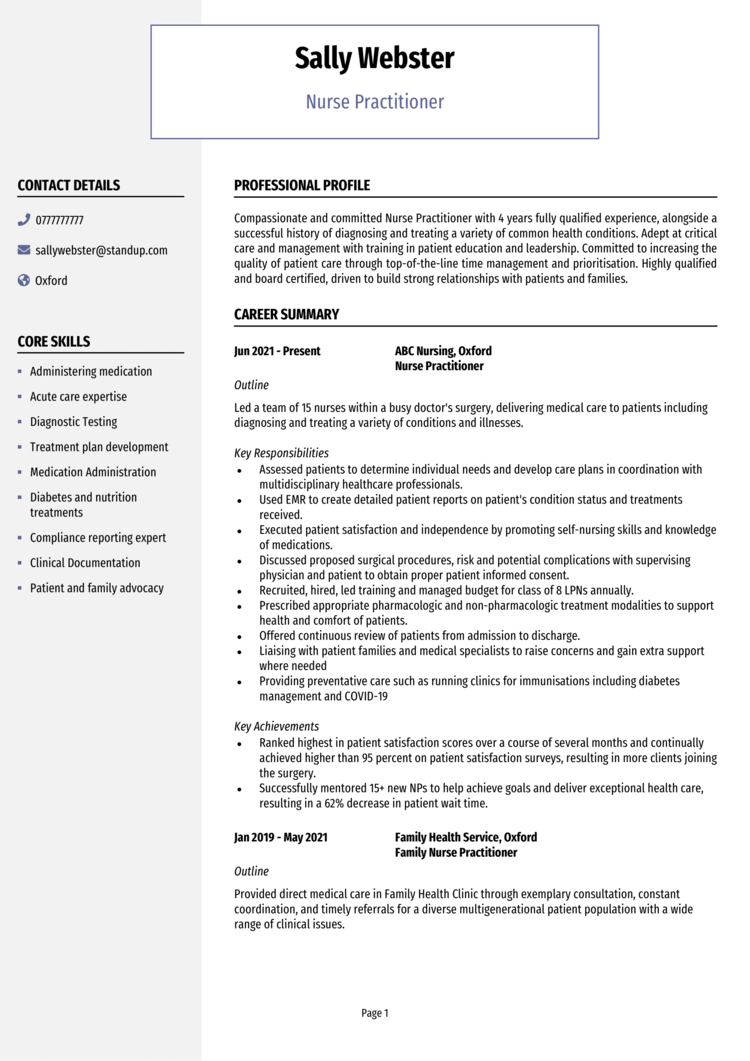
Registered Nurse CV example

Staff Nurse CV example
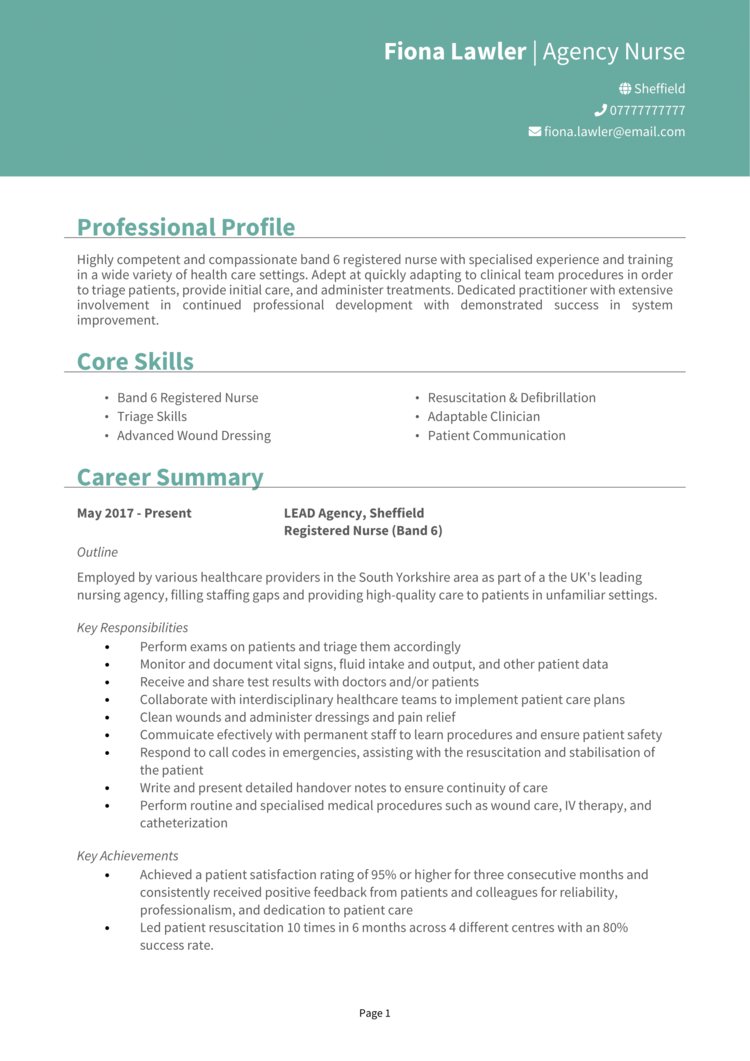
Nurse Manager CV example

This is an example nurse CV to give you a general idea of the layout and content of a nursing CV.
However, when creating your own CV, you should take into consideration the roles you are applying for and the specific areas of nursing you specialise in.
The rest of this guide will show you exactly how to populate each area of your CV, and the skills you should be highlighting.

Build your CV now
When creating your nursing CV, how you structure and format it, is just as important as the content listed within it.
Now, more than ever, people have very low attention spans when it comes to reading – especially recruiters, who sometimes see hundreds of CVs per day.
So, making sure your CV is structured and formatted in a way that is easy to read, and allows recruiters to pick out the information they need is crucial.
The structure and format of your CV have two core purposes:
- They create the initial first impression by putting together a professional looking document that potential employers will take seriously
- They create a logical structure to allow readers to read and navigate quickly
This infographic will serve as a good for putting your CV’s structure together.

Formatting tips
Use the following guidelines as much as possible to ensure your CV stands out and looks professional.
- Stick to simple, easy to read fonts , such as Arial
- Don’t use too many colours – black text on a white background works best for readers
- Keep it simple and to the point – no unnecessary distractions like images or graphs.
CV structure overview
When structuring your nursing CV, it’s very important that you make it easy to read, with no big chunks of text, and that all of the most important information is easy to see on first glance.
Your CV should feature the following sections.
Name and contact information – should be listed directly at the top of the page so it’s easy for recruiters to contact you
Personal statement/profile – a short introductory paragraph summarising your skills, experience and knowledge within nursing
Work experience – List your roles in reverse chronological order to showcase your ability to apply your skills and knowledge
Education and qualifications – List out your qualifications related to nursing, and include the key details of each one
Contact details
Your contact details should always be placed at the very top of the page and should be impossible to miss.

Information to include:
- Phone number
- Email address
You’re not obligated to disclose the following and they will not affect hiring decisions:
- Full address
- Your date of birth, nationality, and sex
- A photograph
Your nursing CV profile
This section should go directly under your contact details at the top of the page.
Your profile or personal statement is your chance to shine and get noticed, but you have to be mindful of people’s time, so keep it short, punchy, and to the point.

In order to ensure that recruiters keep reading your CV, here are the key things to include in your profile section:
Nursing qualifications – Provide an overview of your most important nursing qualifications
Environments you have worked in – Perhaps you’ve worked in private care homes, or maybe you’ve worked across a number of specialist hospital wards – employers will want to know this.
High level nursing skills – Skills like patient care, medication provision and ward hygiene will be important to most nursing roles
Nursing experience – Whether you are a newly qualified nurse, or have 20 years experience, you must make your experience level clear here
Quick tip: If you worry that your written English isn’t perfect, try using our quick-and-easy CV Builder to eliminate the risk of making mistakes.
Core skills section
To create a snap shot of your skills, add a core skills section underneath your profile.
It’s simply a bullet-pointed list of your most relevant talents spread out over 2 or 3 columns.

The effect this has, is that it shows recruiters a great summary of your skills that they can digest within seconds of opening your CV – great for a positive first impression .
Work experience
In your work experience section you need to list your previous roles in reverse chronological order like the diagram below.

You should focus on your nursing experience, writing plenty of detail in nurse roles, and much less detail in non-nursing roles.
In case you have no employment history in nursing – for example, if you’ve just graduated, you can also list any volunteer work or university placements to compensate.
How to structure your role descriptions
To provide an easy and pleasant reading experience for recruiters, lay your roles out like so:

Here’s a brief outline of what to include in each section:
Role outline
A sentence or two describing who you work/worked for, and what the overall purpose of the role is.
“Delivering ongoing care within a 28-bedded geriatric ward to elderly patients presented with acute to chronic health problems”
Key responsibilities
List the key tasks you carry out during your role, and show how they impact your employer, colleagues and patients.
- Ensuring the timely and accurate completion of all administration and documentation
- Conducting patient assessments, planning and supervising the safe and compassionate delivery of care
- Liaising with ward managers and doctors to arrange plans and schedules
Achievements
Add any achievements made during the role, that have made a big positive effect in your workplace.
Contributed significantly to raising standards across local community nursing; observing and mentoring Junior Nurses, and improving care metrics by an average of 10%
Quick tip: If you worry that your written English isn’t perfect, try using our quick-and-easy CV Builder to eliminate the risk of making mistakes.
Education and qualifications
When applying for a job as a nurse, it’s important to make sure you have the right qualifications for nursing.
Anyone wishing to work as a nurse, regardless of the role, must possess a degree in nursing.
Your education and qualifications should come directly after your work experience, and be listed from the most recently achieved.
Any qualifications relevant to the role you’re applying for should be listed in this section.
Although every nursing role will be different, there are certain skills that are essential to nurses across the board.
Here are a few of them…
Patient care – The ability to care for patients is paramount to a nurse’s skill set and should be evident throughout your CV.
Knowledge of medication – Administering medications and understanding their effects is another crucial skill for most nurses.
Ward management – Not only is this skill useful if you plan on climbing the ranks within a ward, but it will also show that you know how a ward is run, and have a deeper insight into staffing levels and patient bed allocation charts.
Hygiene and health – Ensuring you know what your patients area eating, and that they are clean and comfortable in their beds
When applying for nursing roles, a good CV that’s well structured and formatted in a professional, clear way is essential.
It’s also important to highlight your key skills, and show what you can bring to any role so you have the best chances of standing out and being selected.
Hopefully this guide has provided you with some useful tips to get you started.
More Nursing CV examples
- A&E Nurse CV
- Auxiliary Nurse CV
- Care Coordinator CV
- Critical Care Nurse CV
- Deputy Care Manager CV
- Emergency Care CV
- Healthcare assistant CV
- Mental Health Nurse CV
- Mental Health Support Worker CV
- Neonatal Nurse CV
- Newly Qualified Nurse CV
- NHS Healthcare Assistant CV
- Nurse Educator CV
- Occupational Health Nurse CV
- Oncology Nurse CV
- Paediatric Nurse CV
- Practice Nurse CV
- Senior Care Assistant CV
The Ultimate Guide to Nursing Resumes in 2025
How to write a nurse resume, nurse resume research, nursing resume readers & robots, choose a nurse resume format, nurse resume format & design, writing your nursing resume, common resume mistakes, nursing resume templates, nurse resume faqs.

Expert Reviewed by: Amanda Guarniere, NP, Founder of the Resume RX
In 2024, a vague, uninspiring nursing resume just won't cut it. Recent years have fostered growing competition for the best nursing jobs , creating a greater need for nurses to learn how to write exceptional nursing resumes. With vast opportunities and diverse requirements from various employers, every nurse must put their best foot forward to market themselves for the best positions.
However, this ever-changing world of online applications and robotic resume readers makes it more complex for nurses to get to the first rounds of interviews. This article will help you tackle the daunting task of writing a nursing resume that stands out. We'll help you build a better nursing resume by giving you an inside look at how robotic resume readers work and providing tips on how to make your resume, things you should and shouldn't include, and provide examples and templates.
Nurses Helping Nurses: Why You Can Trust Nurse.org
As the leading educational website for nurses by nurses, Nurse.org is committed to editorial integrity and data-driven analysis.
✔ Content written by 80+ licensed, practicing nurses who are experts in their respective specialties. Learn more about our nurse contributors .
✔ Transparent, trusted data sources from the U.S. Bureau of Labor and Statistics (BLS), Payscale, ZipRecruiter and Glassdoor. Learn more about our data resources .
✔ Consistent article updates to ensure they are as relevant and accurate as possible, utilizing the latest data and information when it becomes available.

Think of your job search as your own personal marketing campaign. And the product is you! Your resume is an advertisement for your professional nursing brand. A brand is more than a logo - it’s the overall impression you give your audience. In this case, your audience is a potential employer.
As with any advertisement, the goal of your nursing resume is to pique your audience’s interest in a limited amount of time. It’s commonly said that hiring managers will spend less than ten seconds reading your resume. And in many cases, it has to first be screened by a resume-reading robot before it reaches human hands.
So, you must carefully curate your brand for these employers. Captivate them with your professionalism, unique skillset, experience, and personality using your nursing resume. These tactics may help get your foot in the door for an interview, where you can close the deal by impressing them in person.
The first and most important step in any marketing campaign is the research phase. The more you learn about potential employers, the better you can tailor your registered nurse resume to their requirements.
Initial Employer Research for Nursing Resumes
Before you begin tailoring your resume for specific jobs, take some time to answer the following questions about each company:
- Who are they?
- What is their company culture?
- What do they struggle with as an organization?
- What qualities are they looking for in a potential candidate?
- Which of their desired qualities do you possess?
Researching Company Culture and Values
The internet has made it fairly easy to hop online and start your research right now from your mobile device. Employers' websites and social platforms will give you an inside glimpse at their culture and values.
Instead of simply reading a job posting, take a few extra steps to investigate the employer's online presence:
- Check out the company website - what does their mission statement say?
- See what they tweet about
- Investigate what photos they post on Instagram
- Learn about the articles they share on Facebook
- Check their LinkedIn - do you have any connections at the company?
- Look at their Google ratings
Don't miss out on our most popular holiday giveaway: Nurse GiftAway Win scrubs, shoes, cash and more! Sign-Up
Examine Required vs Preferred Nursing Qualifications
The research phase isn't just about investigating the company - you also need to understand the job description. Specifically, understanding the difference between "required" and "preferred" qualifications will help you build a tailored resume for each job:
Required Qualifications
These are just what they say - requirements. Those who do not possess these qualifications will not be considered.
Preferred Qualifications
Skills that are desired but are not deal-breakers for the employer. You may still be considered even if you do not possess these.
As you personalize your nursing resume to different opportunities, these qualifications will, in part, guide what you do and do not include. You should include any and all required qualifications if you want an employer to consider your candidacy.
If you do not possess some or all of the preferred qualifications, you can apply anyway and still be in the running. However, including the ones you do possess on your tailored nursing resume is always the best practice.
Build a Master Resume
You may want a solid starting point from which you can use your research to build a dedicated resume for each position you apply for. Queue the "master resume," a comprehensive working document that highlights everything you've accomplished and every skill you've fostered as a nurse thus far.
We recommend starting with a foundational nurse resume so that you can alter it for each role you apply to. This way, you won't be rewriting a new resume for every single position. But you'll also avoid submitting "cookie-cutter" resumes that employers won't bother looking at twice.
Use Research to Personalize Your Nursing Resume
Dale Carnegie once said that “A person’s name is, to that person, the sweetest and most important sound in any language.” Personalizing your RN resume matters, with both how you mention and address the future employer and how to include your specific qualifications that match what they are looking for.
Using your research and leveraging your professional brand and personality to target your nurse resume could lead to the interview of your dreams. Not targeting it, however, could lead you on the fast track to nowhere.
The internet revolution transformed the hiring process, impacting the entire labor market in a very short time. 15 years ago, printing your resume on off-white linen paper and hand-delivering it to employers was the status quo. But as little as five years later, doing so might only get you some perplexed looks and urges to apply online.
Technological advances will continue shaping the job market in 2024. USC Annenberg reports that up to 55% of companies are making investments in AI recruiting measures. But even now, many employers screen online applicants using resume-reading robots.
This section explores how these bots impact the hiring process and how to get your nursing resume past them and into a real person's hands.
What Is a Resume Reading Robot?

ATS systems are highly technical but can only do what their program says, unable to come close to human discretion. So, knowing how ATS systems work can help you write a resume that passes their screening.
Here's a brief overview of how employers use ATS software to screen nursing applicants:
1. Knockout Questions
Recruiters can use an ATS to scan for keywords or "knockout questions" like "Do you have an active Washington State Nursing License?" These functions help them swiftly eliminate unqualified candidates.
2. Disqualifying Statements
They may also configure the ATS to include “disqualifying statements.” An ATS searching for these statements will automatically reject nursing resumes with certain keywords or phrases.
For example, an ATS screening for bachelor's-trained nurses might reject resumes that mention an associate's degree. If you have both, consider listing only your BSN.
3. Keyword Screening
Finally, recruiters may use the ATS to find resumes with exact keywords or phrases. These may include qualifications listed in the job description, degrees, or skills. They can program the ATS to reject any application that does not include their specified keywords.
How Does ATS Work?
Not all ATS systems are created equally. They vary greatly in their functionality and behavior. Most ATS systems are programmed to score resumes according to keywords. However, they can be configured to search and score resumes based on various other criteria.
The results are imperfect. Some ATS systems can't differentiate between titles, such as Clinical Nurse II and Registered Nurse, or distinguish between the terms BLS and Basic Life Support. So how do you navigate these intricacies in your nursing resume?
Best Practice: R ead the job description and use the exact wording for the qualifications listed that you possess.
If you use acronyms and abbreviations, make sure to spell out the entire word, followed by the shortened version. It would be disappointing to have all the requested qualifications but be filtered out by the ATS because you used only the acronyms when the robot was programmed for the full phrases spelled out.
What Are the Shortcomings of ATS?
The problem is that ATS does not ‘read’ a resume as a human would - it simply collects data. It doesn’t care about aesthetics, either. It is programmed by an employer to search for the right keywords, in the right order, on the right part of the resume.
Also, the system can get confused pretty easily. For example, if the font is too fancy or if it encounters unrecognizable symbols, it may score the resume as ‘unqualified’ and move on to the next resume. It does what it is configured to do, nothing more and nothing less.
While ATS has streamlined the hiring process for employers, it’s also made job search extremely challenging for the job seeker. In fact, 94% of hiring professionals say that ATS has positively influenced their hiring goals, while 80% of job seekers say that their online job search is stressful.
What Other Hiring Technology Might I Encounter?
Recently, some employers have started to use artificial intelligence in a different way - during the interview process. Rather than having strict ATS filters, they offer more candidates the opportunity to interview, but there is a catch.
You don't interview with the employer but with a computer. In these one-way or “on-demand” interviews, you essentially get the opportunity to record your video response to interview questions. After you submit it, hiring managers or recruiters review the video responses before choosing the candidates for formal interviews.
Does Every Employer Use ATS?
While many employers use ATS, there are definitely employers who still rely on human resource professionals to screen resumes. In those instances, a human resources professional usually skims the resumes and invites the most qualified candidates in for an interview.
The problem here is that most employers will receive hundreds of resumes for a single opening. To get through the resumes quickly, the HR professional may resort to a simple scan of the resumes knowing that even qualified applicants may not make it. It’s simply a way to reduce the number of applicants.
In either case, the goal of the modern resume is to ‘sell’ yourself in an organized, targeted manner for a specific role. The best way to design an effective, attention-grabbing resume is by making strong assertions in the beginning followed by supporting evidence.
How to Get Past the ATS
- Target your resume to the specific position. Do this by reading job descriptions and selecting keywords noted in the descriptions - competencies, skills sets, education, and experience.
- Match individual experiences to keywords/key skill sets found within the job posting.
- Research the employer and target the resume based on the facility's values and culture.
- Make strong assertions within the top ⅓ of the resume.
- Follow those assertions with supporting evidence.
- Include a “ Professional Summary ” if you are an experienced Nurse.
- Only apply to roles that you match 100% of the “Required Qualifications.”
- Use simple fonts such as Times New Roman, Arial, or Calibri.
- Never use smaller than 10-point font. See Part 5 for more styling suggestions.
- Use simple black bullet (dots) points, not special bullet symbols.
- Save your resume as a .doc, .docx, or .pdf format.
- If using an abbreviation, always spell out the words followed by the abbreviation or acronym. You never know how the abbreviation was entered into the ATS.
- Use standard, simple section headers such as “Work History” or “Education.”
- Settings you’ve worked in
- Patient demographics
- Policies/procedures
- EMR/EHR used
- Medications administered
- Equipment used
- Don’t use the same title as at your current employer if it is different from the title in the job description. Use the title in the job description.
- Don’t overload your resume with keywords. Use them appropriately. Overusing keywords will flag a resume and could cause the ATS to lower your score.
- Don't forget to support the keywords you use with evidence throughout your resume.
- Do not put your contact information in the header section because ATS will not see it.
- Do not include tables because most ATS can’t read them. Other ATS can only read them if their operator programmed them to do so.
- Do not use creative section headers such as “Where I’ve Worked” because the ATS likely doesn’t understand what that means.
- Don’t include a headshot, graphics, special fonts, photos, colored fonts, or unique bullets.
- Do not state, “References available upon request.” It takes up too much space and is unnecessary. If employers want references, they’ll ask.
- Don’t place skills at the bottom of the resume. Many ATS systems only scan the top ⅓ of the resume for keywords. If you have important keywords at the bottom, the ATS may not see them and could disqualify your resume.
- Don’t use “I” statements; resumes should be written in the third person.
- Do not rely on resume builder software. Stay in control of your registered nurse resume.
How to Spot an ATS
If you’ve ever visited a job posting and seen an “APPLY NOW” button, you’ve encountered the elusive resume-reading bot. ATS requires candidates to enter data on the front end.
Maybe you’ve gone through the steps to create a login, complete the application and upload your resume. Perhaps you didn’t realize at the time that you were entering your information into an applicant tracking system.
Raise your hand if you never heard back from an employer after applying online. Raise your other hand if you received an automated response “thanking” you for your interest and never heard back!
Now, keep in mind that it can be difficult to stand out when you are applying for a job online, especially when there is an ATS involved. As you consider your overall job search strategy, try to think of other ways that can increase your chances of getting a job. Don’t be afraid to ask your network connections for referrals and recommendations, or let friends and family know what type of position you are looking for and where. While your resume is absolutely important, it isn’t the only tool that can lead to you getting a job.
Prior to ever typing words onto your resume, it’s important to first decide on a resume format. There are three types of resume layouts. While we highly recommend the reverse-chronological layout for most nursing professionals, we’d encourage you to make the best choice for yourself.
Here’s a breakdown of the three most popular types of resume layouts:
1. Reverse Chronological Nursing Resume
This layout focuses on career history and lists jobs in reverse chronological order. We recommend this type of registered nurse resume for the majority of healthcare professionals and will focus the details of this article on the format. It is best suited for:
- New nursing graduates
- Nurses with fewer than 5 roles within the past 5-7 years.
- Travel Nurses with <10 completed assignments
- Nurses with experience in only 1-2 specialties
- Nurses applying for a similar role
- Nurses wanting to show vertical career progression
2. Functional Nursing Resume
This nurse resume layout places emphasis on skills and deemphasizes work history. However, it does not pass the ATS test well, and hiring managers overall do not prefer it. We recommend against this layout for the majority of nursing professionals. Typically, people who use this format are:
- Changing careers
- Have large gaps in employment
- Do have years of experience in the role in which they are applying
3. Combination Nursing Resume
This layout is a mixture of the reverse chronological and the functional resume. While it places emphasis on skill sets, abilities, and accomplishments, it also highlights applicable work history. We recommend combination resumes for nursing professionals with the following background, goals, and barriers:
- Nurses with experience in multiple specialties and/or medical professions
- Seasoned travel nurses with >10 completed assignments
- Nurses with multiple small gaps in employment
- Nurses looking to change specialties
- Nurses interested in changing careers
Writing a nursing resume can feel overwhelming. It’s no easy task! Nowadays, nursing resumes must be able to pass through resume reading software before it even reaches a recruiter. That’s why we’ve put together THREE nurse resume templates to cater to your unique professional needs and employment situation.

By clicking download, you agree to receive email newsletters and special offers from Nurse.org. You may unsubscribe at any time by using the unsubscribe link, found at the bottom of every email.
Your request has been received. Thanks!

The first formatting and design consideration you should make when creating your nursing resume is how well an ATS will read them. We recommend the following comprehensive design and formatting guidelines to appease common ATS systems:
Many experts believe you can achieve the perfect balance of text to white space in your nursing resume using the following margin settings:
- Top Margin: 1"
- Side Margins: .63"
Left alignment is standard since that’s how most people (and robots) read. You may think a justified alignment looks tidier, but it can leave uneven gaps between words and ultimately make text harder to read.
In the nursing profession, length should not be the focus of the resume. While we recommend 1-2 pages, some nurses may have resumes with 3 (or more) pages.
Don’t stress over length too much. If the resume is slightly over the page amount by a few lines try changing the margin, font style, font size, or shortening statements. The bottom line is it should look visually appealing and should include keywords.
We recommend Times New Roman or Arial to best utilize the functionality of the ATS. However, this is your personal preference. Take note that Times New Roman can be difficult to read if it is smaller than 11pt.
If you are striving for a resume that looks visually appealing when printed, there are great ways to achieve that without going overboard with design. For example, you could use the “small caps” feature for headings, which keeps the font the same but adds a bit more character and differentiation. Or, you could try a font pairing, using serif fonts for headers and sans serif for body text.
Important Note: Different font styles will take up different amounts of space. See how these identical statements look vastly different despite both being in 11 pt font:
Experienced Travel Nurse with 8 years experience in critical care nursing.
Throughout the resume, there should be different-sized fonts. We recommend the following for each section:
It’s important to note that 10-point font should be the smallest size on the resume.
While some ATS systems claim to read colors, we encourage you to simply use black.
Special Characters
We recommend keeping the resume very simple. Basic bullet points (black dots) may be used when desired. Simple lines are acceptable as well.
Design Features to Avoid
The following design features are best left off the resume:
- Multiple font styles
- Special characters
As you’ve learned, ATS systems skim resumes and locate specific information in the correct order. We’d suggest using the following categories and section headers to optimize your nursing resume for ATS scoring.
Contact Information
This is the first section of the resume and does not require a title. Your name should be front and center. Don’t make the recruiter search for it. Make sure it’s the largest font on the page. While there are varying opinions on the exact placement of the name, we recommend a simple classic version in the following format:
Your name should be the first thing a recruiter, hiring manager, or ATS system sees on your nurse resume. It should share a line with your nursing credentials and be in a bold, readable, 18-22 pt font. If you go by a different name, make sure to list both in this section.
Nursing Credentials
Your nursing credentials should directly follow your first and last name on a nursing resume. The preferred order to list these in is Highest degree earned, Licensure, then National Certifications.
We've included a credential quick reference guide below to help you fill out your resume perfectly.
The days of listing your home address on a resume are over - most employers don't need this information, and we advise against including it on your resume as a security precaution. However, this is a personal decision you can make at your own discretion.
You should never leave your location off completely because many employers have location parameters set in their ATS systems. Ensure you include your city and state in the contact information portion of your nursing resume.
Phone/Texting Number
Oh, technology! Yes, some employers will actually text their candidates. Make sure to indicate if you receive texts and whether the phone number is a cell phone or a home phone. This is a great time to make sure your voicemail message states your full name and is professional.
Email Address
It is in your best interest to ensure that you have a professional email address that does not reveal your age. Age discrimination is real, and listing your birth year or using an antiquated email service like AOL can definitely trigger it.
Your email address should include a variation of your name and some numbers if necessary. You can even make a totally separate email account and use it only for your job search.
LinkedIn Profile
If you have a LinkedIn profile definitely include it. If you don’t have a LinkedIn profile, you could be missing out on opportunities. Now is the time to create one!
In your settings, you can easily create a shortened LinkedIn URL that doesn’t have a bunch of random numbers and letters.
How Your Digital Footprint Impacts Your Nursing Job Search
Though you may not list it, you should consider your social media and online presence when you complete the contact information portion of your resume. Potential employers will likely look you up online. Many Recruiters tell us that looking a candidate up on Facebook, Instagram, LinkedIn, and Twitter is one of the first things they do. So, make sure everything you post online is what you would want an employer to see.
Additionally, online behavior can benefit you. Do you have a nursing-related website or blog? Are you an Instagram celebrity? Maybe you created a successful YouTube channel when you were a newbie nurse. Include all this on your resume if it relates to nursing. This is all part of your unique brand!
Nursing Resume Credential Quick Reference Guide
According to the American Nurses Credentialing Center (AACN), the preferred order is Highest degree earned, Licensure, and National Certification.
Educational degrees include doctoral degrees (Ph.D., DrPH, DNS, EdD, DNP), master’s degrees (MSN, MS, MA), bachelor’s degrees (BS, BSN, BA), and associate degrees (AD, ADN).
Licensure credentials include RN, LPN, CNA, and APRN.
National certification , which is occasionally voluntary for nurses and obligatory for advanced practice nurses, is awarded through accredited certifying bodies such as the American Nurses Credentialing Center (ANCC), includes RNBC (Registered Nurse-Board Certified) and FNP-BC (Family Nurse Practitioner-Board Certified).
You may also choose to include awards and honors:
Outstanding achievements in nursing, such as FAAN (Fellow of the American Academy of Nursing).
Other certifications that recognize additional skills, such as the EMT-Basic/EMT, awarded by the National Registry of Emergency Medical Technicians.
Here is an example of contact information on a nursing resume that puts it all together:
Penny Lite, BSN, RN Los Angeles, CA | Text/Call: (987) 654 - 3210 | [email protected] | www.linkedin.com/pennylitern
Professional Summary
Don’t make an employer (or ATS) search your entire resume for reasons to invite you to an interview. Tell them right off the top exactly why you are the best candidate for the role.
Every position is unique, and this is your first opportunity to optimize the resume for ATS and to also catch the employer’s eye. Spend a little time to target it and let your qualifications and accomplishments shine.
While there is some debate about how to introduce your resume, we suggest using a professional summary as opposed to a career objective. The professional summary can be formatted in either a short paragraph or a bulleted list asserting qualifications and providing a concise career snapshot.
How to Write a Professional Summary for a Nursing Resume
Think of your resume summary as an “elevator pitch” - a quick, attention-grabbing, loaded statement that entices the reader to want to continue on. Your professional summary is unique to you and should be targeted to a specific role, just like the cover letters career counselors used to tell us about.
However, it could definitely include the following information:
- Number of years of experience in a specialty
- Common keywords found in nursing job descriptions e.g., excellent patient care, acute care, family education, compassionate
- Facility designations or info about facilities
- Supervisory experience and number of subordinates
- Special certifications or awards
- Language abilities
- Soft skills such as patience, compassion, and a cooperative spirit
Nursing professional summary example:
4+ years nursing experience with strong clinical background in critical care (CCU) and intermediate care nursing (IMCU). Proactively streamlines operations, initiates tasks, and supports the healthcare team while prioritizing excellent patient care. Champions patient and family education by providing compassionate, inclusive care that encourages self-sufficiency. Recipient of the Daisy Award. Bilingual in English and Spanish.
Nursing Skills and Areas of Expertise
List your nursing skills within the top ⅓ of the resume - Don't make the common mistake of adding them last. With the popularity of ATS, this mistake could cost you an interview. This is especially true in nursing, as the profession requires very specific skills.
Additionally, your hard skills should be directly targeted to the role as expressed in the job description. Is the employer asking for a specific EMR that you are experienced with? List it! Are you an expert at starting IVs because of your five years of experience in the emergency room? List it!
This should not be a generic list of skills but a specific list that is as quantified as possible. It’s possible that if you are a newer nurse or are making a specialty pivot you may not have hard skills to include. In that case, it’s okay to omit this section and highlight your transferable soft nursing skills within your job history.
While most nurses list their license titles on their resumes, it’s been our experience that they leave off a few very important details - most notably, whether the license is active and the expiration date.
Why is this important? Including this information lets potential employers know that you are ready to start work ASAP. They don’t have to wait for the licensing process. Including your license number is optional, and you can make this decision based on your privacy comfort. The employer will likely be verifying your license online anyway (this is all public information).
If you are an advanced practice nurse, you may decide to leave off license numbers for privacy purposes, especially your DEA number or controlled substance registration number.
Here’s an example of how to list your licensure:
Registered Nurse - California, #RN00101, expires 4/17/2024.
Certifications and Credentials
This is another key section where some important details are typically missing on the nursing resumes we’ve seen. While most nurses list their credentials, it’s important to list them in a specific manner.
Don’t simply list acronyms, as some ATS systems may not be programmed to read shortened versions. Make sure to list the accrediting body, credential/certification number (where applicable), and expiration date.
Here’s an example of how to list your certifications and credentials:
Basic Life Support (BLS), American Heart Association, expires: 12/1/2021
Work History
Employers want to know what you can do for them, period. Nurse recruiters we’ve talked to will zero in on this section. What are they looking for? Evidence, facts, quantifiable points - proof to support the assertions made in your resume summary.
Vague work histories are particularly frustrating to employers - especially when applicants copy and paste job descriptions. To avoid falling into those pitfalls, try incorporating these tips:
Use simple section headers such as “Work History” or “Relevant Experience,” these are ATS friendly. “What I’ve Done” is not.
List your experience in reverse chronological order. If you have a lengthy employment history, you may consider only including the most recent 10-15 years of experience. This will shorten your resume and also limit the chances that you’ll encounter age discrimination. Looking at the big-picture experience from 25 years ago doesn’t necessarily speak to your recent nursing experience because employers care about what you can do for them now.
Work History Format
Adding your work history in a logical format can help your nursing resume beat the ATS and impress recruiters. We recommend using the following format for each work history segment:
1. Job Title and Specialty
This is a controversial subject, but we believe employers care more about what you’ve done than who you’ve worked for. Use the job title as it is listed in the job posting, or use a more industry-wide job title. Registered Nurse as opposed to Clinical Nurse II.
2. Facility Name
Add the name of the facility or company you worked for after your job title. You can add this on the same line or a different line, but using the same line will optimize space.
3. Employment Dates
These are important and can be listed in a number of ways. However, it’s been our experience that specific dates are not necessary for a resume. On an application, yes, on a resume, not so much. You can simply list the months and years (mm/yy - present).
4. Facility-Specific and Unit-Specific Information
This information is helpful and important to employers but is left off the majority of resumes we’ve seen, it includes:
- Trauma level: level I, II, III
- Facility Designations
- Total Hospital beds
- Total unit beds
Primary Duties and Accomplishments
This section looks best in a bulleted list of no more than six points and should include duties, noteworthy accomplishments, and achievements. It’s important to emphasize specific duties and not be too vague.
Also, try your best not to simply regurgitate basic nursing duties that would be assumed of your role. This will take up valuable space on your resume and not really tell the reader much about you !
Wondering what specifics to include? Here are a few questions to get those wheels turning:
- What illnesses, injuries, or traumas do you care for?
- What cases do you work on?
- What type of medications do you administer and how?
- What therapies do you perform?
- What equipment do you use?
- How have you improved processes?
- When have I been first or best?
- No. 1 achievement in each position?
- Which achievements have the most impressive numbers?
- When have I been publicly recognized?
Write Strong Nursing Resume Bullets
Wondering how to order your bullets and what to include? Try this: start with a verb leading to quantifiable data or a specific point and include a relevant duty.
Use our comprehensive tables to build compelling nursing resume bullets that make your achievements shine:
Here is a brief work history resume example for nurses that puts it all together:
Registered Nurse, Acute Care - Example Medical Center 09-19 - Present
- Supervised staff of 15 registered nurses, 8 certified nursing assistants, and 7 paramedics while multitasking excellent patient care.
- Cared for up to 4 patients per shift with acute neurological disorders, including strokes, spinal cord injuries, and head trauma.
Education and Training
In the nursing profession, education and training are of utmost importance. If you have work experience, this section can be fairly brief. You should list your relevant degrees in chronological order.
There are varying opinions regarding the specific ordering of education. However, we believe that the degree or certification title should be listed first. Employers care firstly that you have the education requirement they need and secondarily where you obtained the requirement.
We suggest the following format: Degree or Certification Title (acronym), Institution Name
Here’s an example:
Bachelor's Degree in Nursing (BSN), University of Washington
Should I Include Graduation Dates on a Nursing Resume?
You are not required to include your college or high school graduation dates on your nursing resume , as it could reveal your age. Age discrimination is the top form of employment discrimination and affects all age groups. If you graduated more than 10-15 years ago, it may be a good idea to omit the date. But this is a personal decision you should make at your own discretion.
Should I Include My GPA on a Nursing Resume?
Including your GPA in your nursing resume is optional. If you are particularly proud of your GPA, by all means, add it! However, it is not required. If you graduated with honors that you are proud of, you can definitely include that as well. Again the resume is a unique snapshot of you!
Should I Include my Non-Nursing Degrees and Credentials?
If you possess other degrees not related to nursing, it is not necessary to include those on your nursing resume. Some second-career nurses like to list this information, especially if there has been an interesting career pivot or one that brings a lot of value to your role as a nurse. Remember, you are telling your personal, unique story, and you get to decide what to include.
How Do I Add In-Progress Advanced Education Programs?
If you are currently enrolled in higher education to advance your studies within the nursing field, that should be listed on your resume and state that the degree is pending or in progress. However, if you started a graduate degree program, never finished, and do not plan on finishing, it is unnecessary to include it on the resume.
Should I Include my High School Education?
Nurses do not need to include their high school diplomas on their resumes. The nursing profession requires completion of higher education, and therefore, your higher degree trumps your diploma.
Awards, Accomplishments, and Affiliations
Though this section is not required, we encourage including awards and accomplishments that are relevant to the nursing profession. These details will provide the potential employer with more proof and evidence of who you are as a nurse.
In this section, you can include:
- Awards and recognitions that are specific to the hospital or facility where you work, e.g. the Daisy Award, Employee of the Month, and Nursing Excellence Award
- Professional memberships and affiliations relating to nursing and/or healthcare
- Volunteer work, if it relates to nursing
We suggest the following format: Title, organization, year
Here are a couple of examples:
- Recipient, Nursing Excellence Award, Washington Medical Center
- Volunteer, American Red Cross - Haiti - 2012
Naming Your Nurse Resume Save File
One last thing, saving! Don’t just give your resume any old name! Hiring professionals sometimes receive multiple documents from candidates, and they don’t want to waste time sorting through every document to find the resume. Some prefer to organize resumes by specialty. Tell them exactly which document is your resume.
We suggest the following format: firstlast_specialty_resume.doc
Here’s an example:
PennyLite_ICU_resume.doc
We’ve seen a lot of resumes over the years, and you might be surprised by the amount of strange information people have included on them. So, here are the top mistakes we’ve seen:
Woot! If you’ve made it this far you should have an excellent understanding of how to write a great nursing resume. We know it’s a lot of information right now, and we hope that you’ll use the information to advance your career.
For a little more help, try using our free resume templates. And when you’ve landed your next interview, check out the next part in this series, The Complete Guide to Nursing Job Interviews .
>> Download free nurse resume templates!
What should be included in a nursing resume?
- A nursing resume should include your education, experience, including clinical, work, and volunteer, any certifications you have, and skills.
How do I write a nurse resume?
- You can use a template to fill out your nursing resume or fill out your own.
How do I list my nursing skills on my resume?
- List skills that are in the job description or outline on the facility’s website. For instance, common nursing skills include critical thinking, teamwork, communication, team management, and high ethical standards.
Do you put RN after your name on a resume?
- You can include "RN" or "RN, BSN" if you have other credentials. If you haven’t passed your NCLEX yet, you can put G.N. for Graduate Nurse.
How long should a nurse's resume be?
- A nursing resume should be no longer than 1-2 pages.
What is your greatest skill as a nurse?
- The most valuable skill you have as a nurse may depend on your exact role and specialty, but in general, communication, kindness, empathy, and critical thinking are highly valued traits as a nurse.
How far back should a resume go?
- If you’re a recent graduate, you don’t need to go to high school, just include your college experience and degree. For experienced nurses, include all relevant experience.
Amanda is an Ivy-league-educated nurse practitioner and career mentor who helps nurses find and land their dream jobs. She founded The Résumé Rx in 2018 to help nurses with career and résumé strategy Learn more about Amanda and her products at www.theresumerx.com and follow her on Instagram @theresumerx.

Angelina has her finger on the pulse of everything nursing. Whether it's a trending news topic, valuable resource or, heartfelt story, Angelina is an expert at producing content that nurses love to read. As a former nurse recruiter turned marketer, she specializes in warmly engaging with the nursing community and exponentially growing our social presence.
Education: Bachelor of the Arts (BA), Multi/Interdisciplinary Studies - Ethnicity, Gender, and Labor, University of Washington
The Best Resume Guide for Nurses
How to Write a Nursing Resume
Addressing required vs. preferred qualifications, types of nursing resumes.
- What Should Your Resume Include
Are you ready to earn your online nursing degree?

Whether you are a recent nursing school graduate or an experienced healthcare professional, writing a nursing resume that accurately and persuasively depicts your education, skills, and characteristics is the first step to getting an interview.
Since this important document is the initial impression you will make on a hiring manager, you must craft a resume that creatively addresses the employer’s requirements and highlights your professional achievements, helping you stand out from other qualified applicants.
The nursing field heavily relies on extensive practical training, certification and registered nurse licensure , and specialization, so it is important that your resume highlights your qualifications. Even personal qualities should emphasize practical applications (e.g., how your compassionate nature enables you to connect with patients or how your bilingualism helps you accommodate diverse populations as a nurse ).
Being specific can make a resume exceptional. Through this guide, you can learn how to tailor your nursing resume to an employer’s mission and job description.
Do Your Research
Learning how to write a nursing resume requires dedicated research that allows you to target information to your potential employer. On top of carefully going through the job description, look at the employer’s website and social media platforms to figure out their culture and values.
Some healthcare facilities emphasize education and certification, while others want nurses with more clinical experience. Find out what they want in an ideal employee and tailor your application accordingly. It is equally important to consider your needs and if the job fits your standards for professional advancement and personal happiness.
Write Down Your Key Points
Format your resume.
For more details and examples, see our tips for writing a nursing resume .
Addressing a potential employer’s specifications is the main objective in writing a nursing resume. But before writing, it’s important to identify required versus preferred job qualifications.
Because this profession necessitates advanced academic and professional training in addition to licensure and nursing clinical experience , job postings for nurses include extensive requirements that are either required or preferred criteria. Required reflects qualifications a candidate must possess to warrant consideration, while preferred is typically a wishlist of additional skills, experiences, and character traits that benefit the position but are not mandatory.
An effective resume details how an applicant fulfills required qualifications and as many of the preferred qualifications as possible without crowding the page and rendering the information inaccessible. Nurses can take advantage of a cover letter to elaborate and fill in additional qualifications with anecdotal evidence and data, if possible.
While some healthcare facilities outright reject applicants who do not possess all their required qualifications, most see the job listing as a guideline and not a checklist. Even if a nurse does not meet all the standards, they should still apply if they can impress during the interview.
Popular Online RN-to-BSN Programs
Learn about start dates, transferring credits, availability of financial aid, and more by contacting the universities below.
Ultimately, a resume represents the individual person, their academic standing, professional achievements, personal qualities, and career potential. How do you write a nursing resume that gets all these points across? Choose the proper formatting.
There are three main resume formats, each with their unique structure and distinct purpose: the reverse chronological, the functional, and the combination. Nurses need to use the resume style that best suits their particular skill set and the position they are vying for.
Reverse Chronological
The most commonly used resume type, this form benefits nurses who possess extensive and relevant professional experience. Here, past employment is the most important element, with positions listed in reverse chronological order. However, this reliable resume structure comes with drawbacks, as it can highlight gaps in employment, frequent job changes, and the candidate’s age.
Also referred to as the skill-based resume, this format highlights awards, accomplishments, and training, making it preferable for recent college graduates and other professionals who lack relevant work history. One of the major drawbacks of the functional resume is that it can expose a candidate’s limited experience in the nursing field.
Combination
The most complex resume type, the combination format eschews the either-or structure of the previous forms, enabling professionals to showcase relevant professional experience and skills and training. Experienced nurses, especially those with clinical specializations, benefit most from this resume form. However, versatility also renders it more difficult to construct, as the large amount of information can confuse readers if not conveyed clearly.
What Should I Include on a Nursing Resume?
Education and training.
The American Nurses Credentialing Center provides a standardized way of listing all your credentials. The preferred sectional order is education, licensure, state designations, certification, awards and honors, and additional certification. Start with your highest degree, then work backwards.
You do not need to include high school information or graduation dates. If you are currently working on a degree, state that completion is pending or in progress. Whether you provide GPA information is up to you. Generally, it is only worthwhile if you graduated in the last three years and earned a 3.5 or better.
Display professional nursing experience in reverse chronological order, starting with your current or most recent position. If you have gaps in employment, prepare to address them. Consider listing facility- and unit-specific information, including total beds, trauma levels, and patient demographics. Specificity when writing a nursing resume elevates it from good to great.
For example, while both positions require a great deal of stamina, a nursing home nurse does not fulfill the same responsibilities as an urgent care nurse. By framing professional experience through a personal lens, your resume stands out among the rest.
Out of all the resume sections, this one benefits from keyword use the most. You can usually find out what skills an employer wants by analyzing the job description. Tailor this section to meet those needs. Work in categories, such as basic care, technical, administrative, and computer skills.
Be strategic and specific. Instead of “defibrillation insertions,” list “automatic implantable cardioverter-defibrillator insertions.” Finally, do not neglect soft skills for nurses , like reliability and adaptability or special skills like a foreign or sign language. These details can set you apart from other applicants.
Licensure and Certifications
As a registered nurse, you’ve earned a state-specific nursing license . And because the profession consists of diverse and advanced nursing specializations , you also may have pursued certification exams and postdegree training in areas like gerontology or cardiac-vascular nursing. List them in their entirety and avoid acronyms.
For licenses, use this order: license type, licensing state/body, license name and number, nurse license compact , and expiration date. For certifications, start with the name, followed by conferring organization, expiration, and certification number, if applicable.
Awards, Accomplishments, and Affiliations
Celebrate all relevant achievements, but do it honestly and in a way that reflects your ongoing commitment to nursing and capacity for high performance in the new position. These achievements may include academic recognition; official awards; and competitive scholarships, fellowships, grants, and internships. Also display membership in professional organizations, such as the American Nurses Association or Sigma Theta Tau, the international honor society of nursing.
As an experienced professional, you may find that you possess an abundance of awards and accomplishments. In these instances, narrow them to the most prestigious, current, and applicable to the job you are applying for.
Volunteer Work
Unpaid positions let prospective employers know you understand the importance of community education, outreach, and engagement. Only include volunteer work that relates to nursing or the health services field. As always, when writing a nursing resume, furnish specific details that showcase your skills in action (e.g., you managed a 10-person team to canvas a neighborhood about HIV/AIDS prevention).
What Should I Put on My Nursing Resume If I Don’t Have Any Experience?
For recent college graduates, professionals switching careers, and those with limited clinical experience, learning how to write a resume for a nursing job may seem overwhelming. You can make up for inexperience by using a functional hybrid resume format that places academic credentials, qualifications, and skills above the employment section. Additionally, you have completed extensive training as a student and perhaps continuing education, so highlight state licensure, optional certification, and organizational membership to further bolster your resume.
Start with a personal introduction that states more than just the obvious (that you want the job), but also speaks to your professional values as a nurse and the training and education you possess. The lack of contextualization can represent a major pitfall of the functional resume. Avoid this by making your skills applicable to actual work scenarios that relate to a nurse’s duties.
Hospital managers seek employees who display skills, such as critical thinking, safe practice, customer service, and interpersonal communication. As a nursing student, you completed hours of clinical training. Use these experiences to show employers your skills in action, framing them in terms of achievements.
Finally, take full advantage of volunteer positions, giving them their own section, to show that you not only display the practical qualifications for the job, but also care passionately about the well-being of patients and healthcare equitability for all communities.
What Is a Resume-Reading Robot/ATS?
To deal with a flood of candidates, many employers use an applicant tracking system (ATS). Like a hiring manager quickly scanning for standouts among the group, the ATS ranks and categorizes nursing resumes by how many designated keywords they contain. This automated process reduces an employer’s manual workload and theoretically vets resumes with a large amount of filler content, an indication of unqualified applicants.
However, the ATS may also unnecessarily reject qualified nurses as part of automated software processes. To avoid this unfair outcome, learning how to write a nurse resume requires working within and overcoming the ATS framework.
Tips for Outsmarting an ATS
- Simple Headers: To accommodate the ATS, use header terms common enough to show up in keyword searches, such as “skills,” “professional experience,” and “education.” Do not neglect to include city, state, and, if living outside the U.S., country, because employers generally vet candidates by location.
- Clean Format: Engaging visuals are useless if they make your resume difficult to read. Use a simple format that contains no graphics or unusual fonts because the standard ATS cannot process such information, resulting in an automatic rejection. In general, Verdana, Tahoma, and Arial fonts at the 10.5 point size or above are acceptable.
- Keywords/Phrases: You can usually glean relevant keywords from the job description. If not, conduct some research into phrases commonly found in the nursing field, such as “patient care,” “clinical research,” and “community outreach.” Avoid abbreviations in all cases.
- Industry-Specific Jargon: ATS keywords reveal a candidate’s relevant skills and experiences. The more specific a keyword is to the particular position you are applying for, the better. When in doubt, use the hiring employer’s phrases first, industry standards second, and your current or previous employer’s terminology third.
- Choose the nursing resume type that best highlights your experience, personality, and qualifications.
- Be specific; specificity helps your resume stand out from the rest.
- Format your resume using headers and keywords that make it easy to read — whether by a person or an applicant tracking system.
You might be interested in

Best Online Nursing Programs and Degrees in 2025
Overwhelmed by the abundance of online nursing programs? This guide can help you navigate the possibilities and narrow down the options.

Nurse Practitioner Career Overview

Certified Nursing Assistant (CNA) Career Overview
Resume Worded | Career Strategy
- All CV Examples
- Medical Resumes/CVs
42 Nursing CV Examples - Here's What Works In 2024
Finding a job in nursing a good cv can be your golden ticket. this piece will guide you on how to punch up your cv to stand out and land that nursing job you want. you'll get smart sample cvs and templates, and learn the know-hows of the trade. read on if you're ready to step up your game in the nursing field. let's get you job-ready..

As the backbone of any medical facility, the role of a Nurse is anything but ordinary. Nurses carry immense compassion, resilience, and a textbook full of healthcare knowledge. What's more? They need to be able to wear these hats while carrying out a range of tasks - from patient care and medication administration to communicating with doctors. Now, how do you seamlessly weave these richly-diverse skills into the threads of your CV, you may ask? Well, that's where we step in. The journey from nursing school to a full-fledged nursing career can be a whirlwind of experiences. And in 2024, with an increased focus on telehealth and home care services, there's an added layer of digital savvy and adaptability expected just the right amount. All of these need to see the light of day in your CV, to give hiring managers a glimpse of the multifaceted professional you are. In this sea of different resumes and CVs, here's some clarity. Whether it's called a Resume in the USA or a CV in the UK, they're essentially two sides of the same coin. For the nursing role, all that matters is a concise, well-presented 1-2 page document showcasing your skills, and experiences. Ignore the chatter about CVs being long, drawn-out papers. That's just academia talk. Moving forward, we'll spill the secrets on crafting a winning Resume or CV - call it what you like. We have lined up real-life examples, top-trending templates of 2024 and a deep dive into the skills that need to be highlighted. These are your career-building bricks, laid out systematically, to guide you on your professional path. No frills, no overly complex jargon, just straight-forward, effective advice. After all, as recruiters, we know what we're looking for. Now it's time for you to show us.
Nursing CV Templates
Jump to a template:
- General Nurse
- Experienced Nurse
- Certified Nursing Assistant
- Registered Nurse
- Psychiatric Nurse
- Nurse Case Manager
- Nursing Student
- Travel Nurse
- Nurse Practitioner
- New Grad Nurse
- Director of Nursing
- Nursing Supervisor
- Clinical Rotation Nurse
- Charge Nurse
- Remote Nurse
- Preceptor Nurse
- Relief Charge Nurse
- LPN Nurse (Licensed Practical Nurse)
- LVN Nurse (Licensed Vocational Nurse)
- ICU Charge Nurse
- Prior Authorization Nurse
- Clinic Nurse
- Medical Surgical Nurse
Jump to a resource:
- Keywords for Nursing CVs
- Action Verbs to Use
- Related Medical CVs
- Similar Careers to a Nursing
- Nursing Resume Examples
Template 1 of 42: General Nurse CV Example
A General Nurse's CV isn't just a series of qualifications and past jobs. It's a chance to showcase your unique skills and passion for patient care. The healthcare industry needs nurses who are adept at handling the ever-evolving challenges of patient care, so your CV should reflect your adaptability and resilience. Recently, there's been an upward trend in the demand for nurses with specializations, such as geriatric or pediatric nursing, so expand on any specialized experience or training you possess. When crafting your CV, consider your audience - typically hiring managers or senior nurses - so ensure your wording is precise and professional.
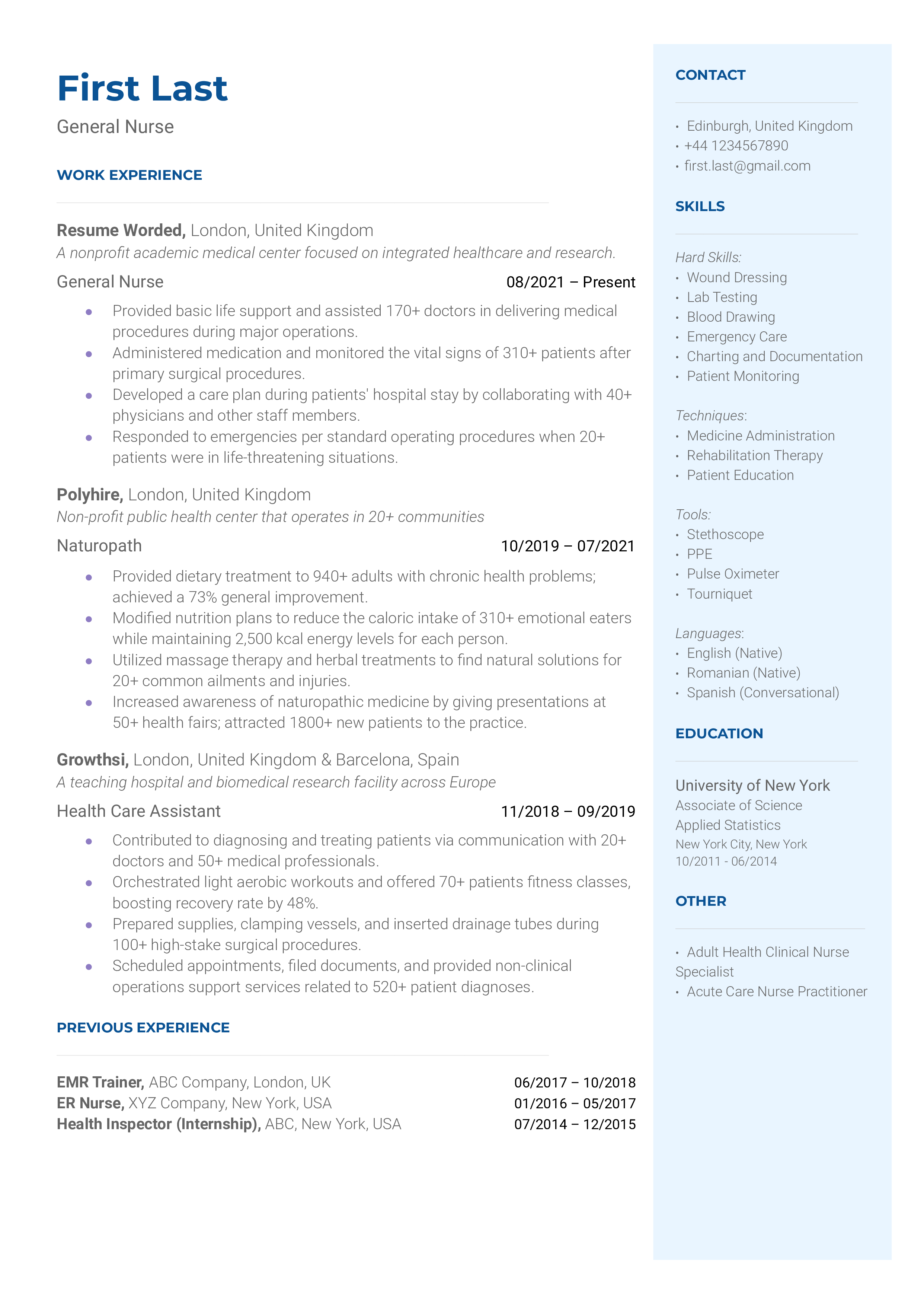
Tips to help you write your General Nurse CV in 2024
display specific clinical skills.
Despite your broad nursing knowledge, hiring managers want to know about your particular abilities. If you have specialized skills like wound care, diabetic management, or advanced cardiac life support, make sure these stand out on your CV.
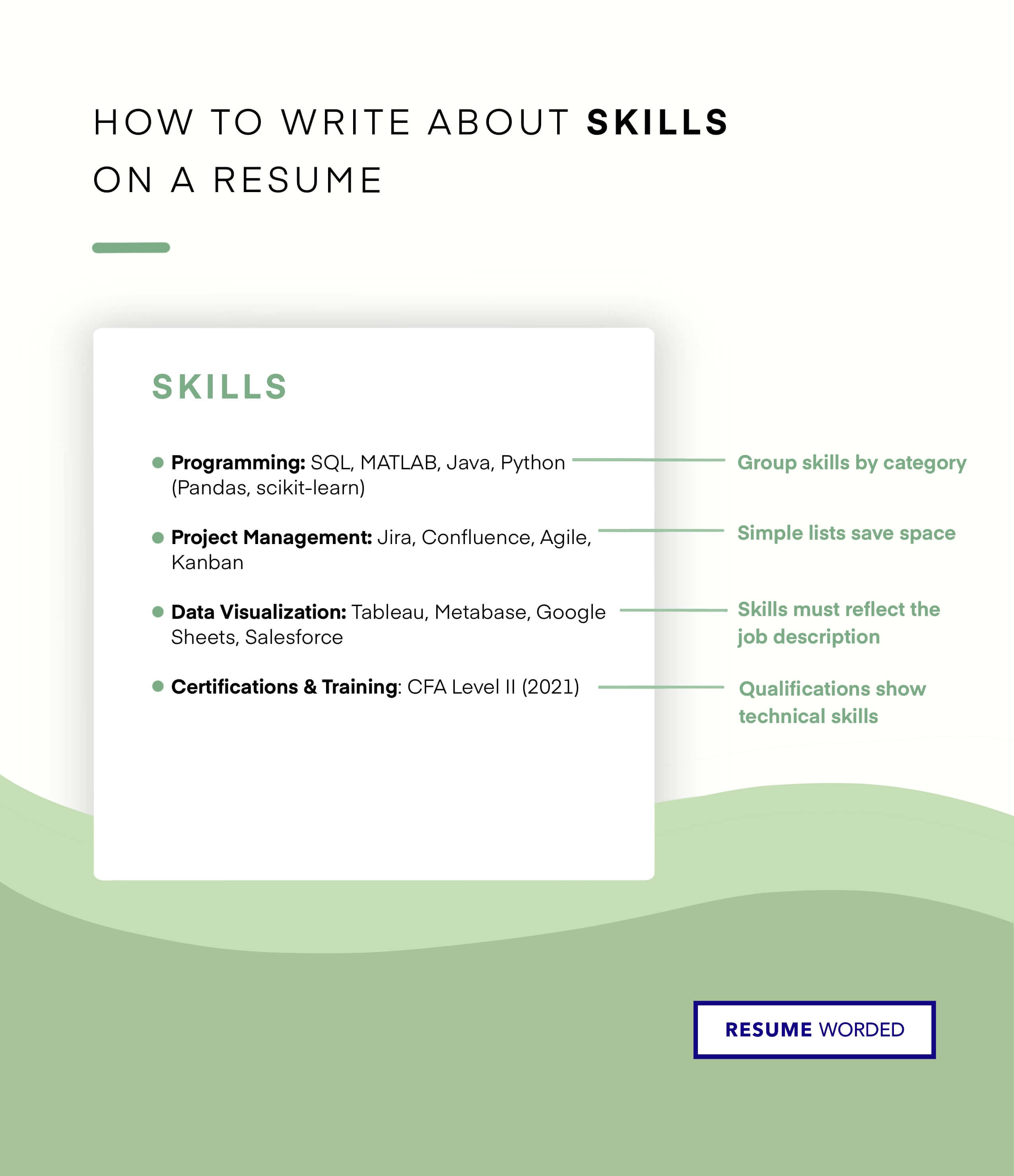
Emphasize soft skills in patient care
Nurses aren't just clinical practitioners, they also provide emotional support to patients. Therefore, it's crucial to illustrate your soft skills, such as communication, empathy, and relationship-building. Detail specific situations where these were critical to patient care.
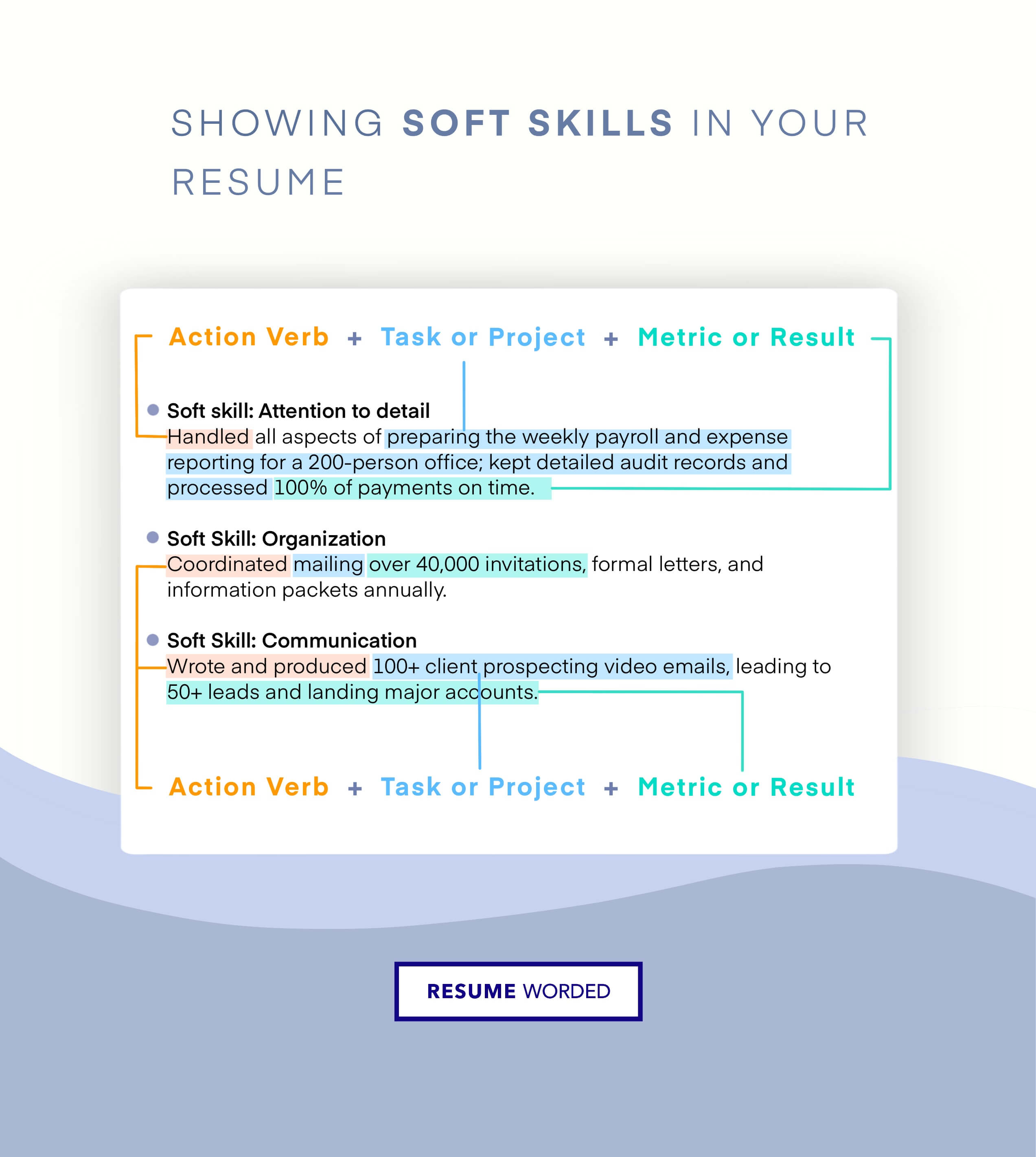
Skills you can include on your General Nurse CV
Template 2 of 42: general nurse cv example.
A General Nurse, a hero in scrubs, is the backbone of any healthcare facility. Your CV serves as a reflection of your passion, dedication, and skill in this field. The healthcare industry is constantly evolving, so keeping up-to-date with new nursing practices and medical technologies is important. The recent pandemic has amplified the need for versatility and quick adaptability to new procedures and protocols. When writing your CV, remember to showcase your ability to thrive under pressure and your dedication to patient care. Never forget to showcase your specialty skills and continuous learning in this ever-evolving field.
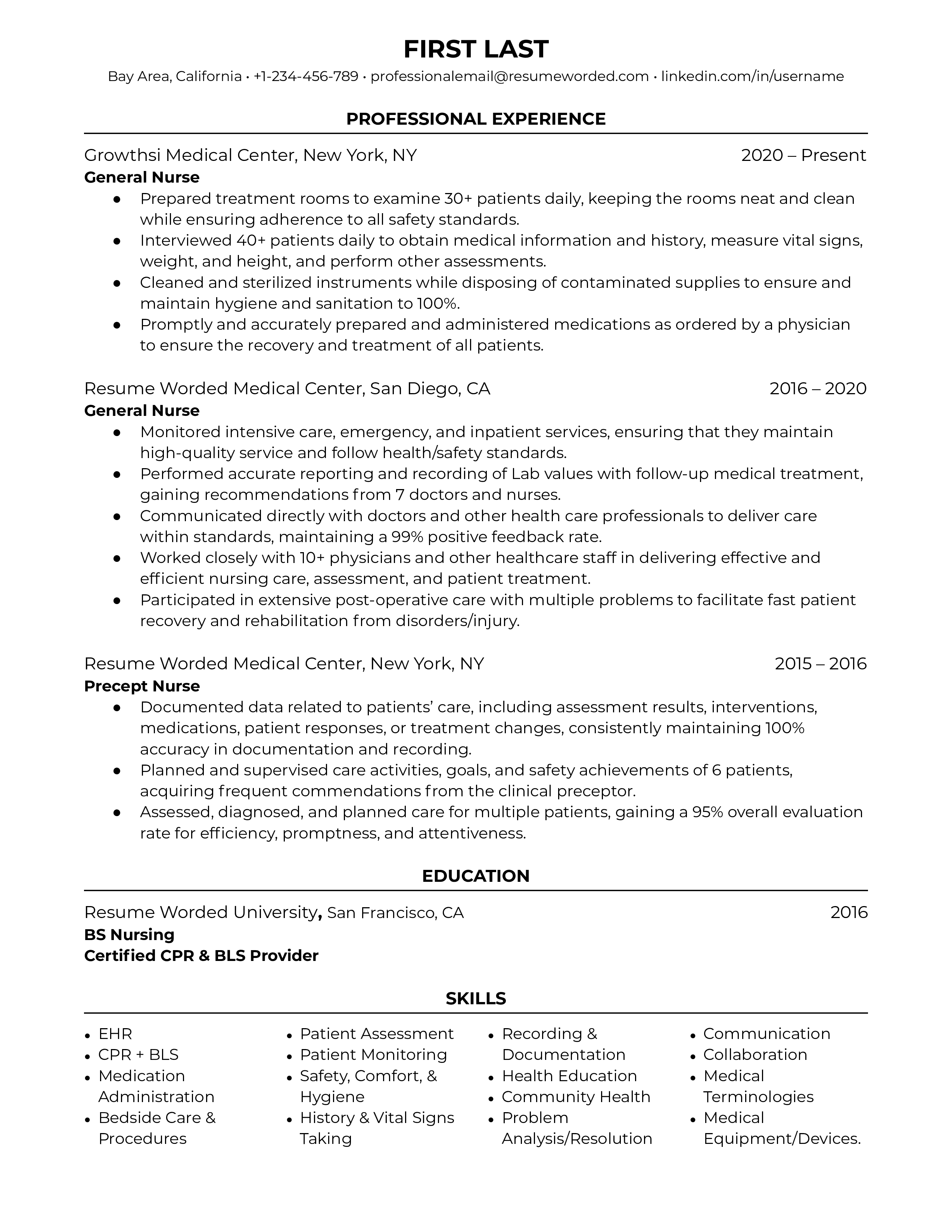
Showcase your Specialty Skills
As a General Nurse, you may have gained expertise in certain areas like palliative care, wound management, or geriatric care. Your CV should mention these skills, ensure you are seen as a more attractive candidate and spotlight your commitment to continued learning.
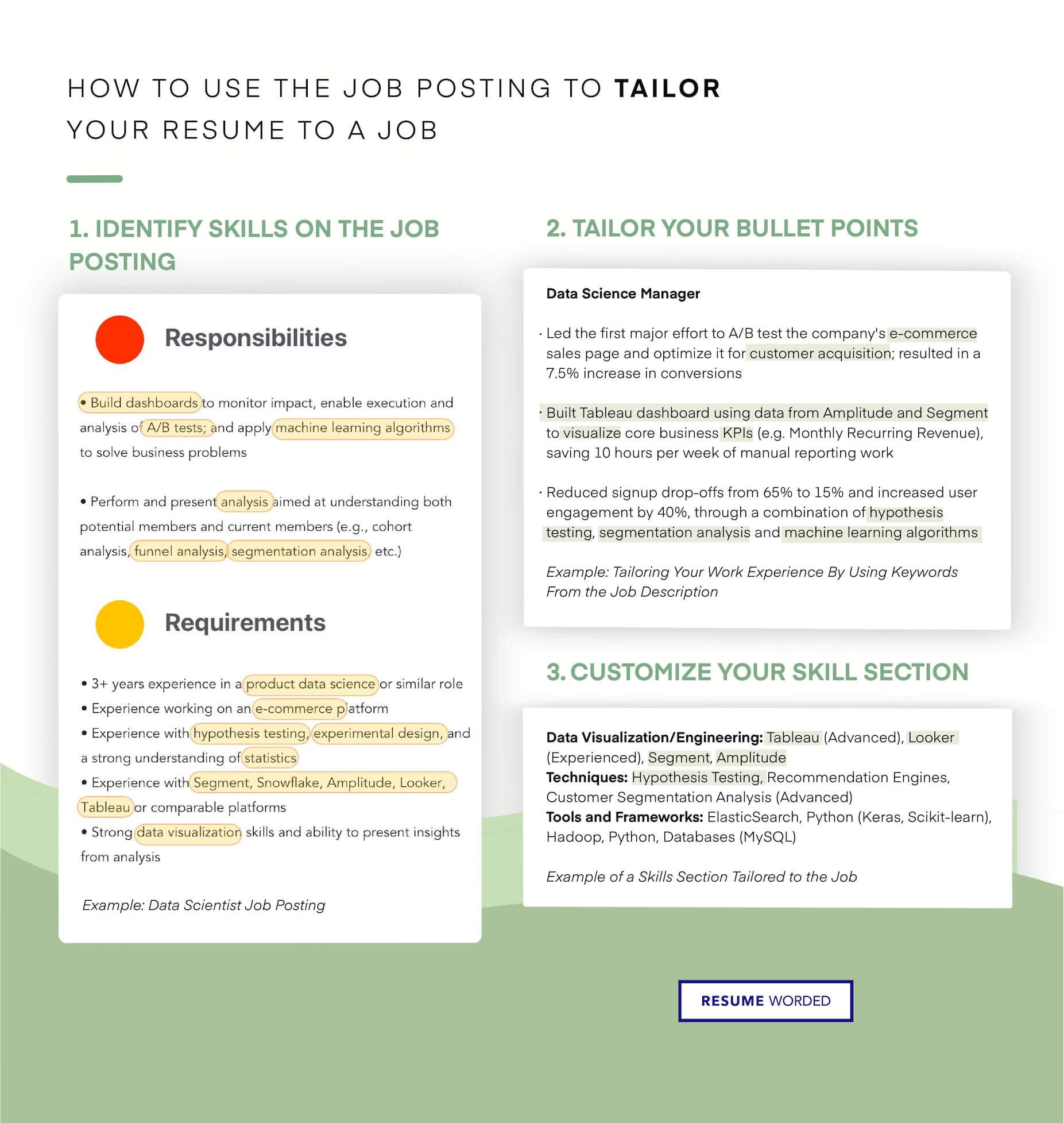
Highlight your Soft Skills
Given the nature of nursing, soft skills like empathy, communication and resilience, are equally important as clinical skills. You should demonstrate situations where you've used these skills. For instance, you can share an instance where your empathetic communication helped ease a patient's anxiety.

Template 3 of 42: Experienced Nurse CV Example
As an experienced nurse, you've weathered many a storm in the healthcare sector. Your CV should reflect your resilience, adaptability and the critical role you've played in patient care. The nursing industry is shifting towards more patient-centered care, creating a demand for nurses who can demonstrate empathy and excellent communication skills. It's also becoming more data-driven, so any experience in informatics or data analysis is a bonus. Writing your CV isn't just about listing your qualifications and experience, it's about telling a story - your story. Show how you've grown, remained consistent, and made an impact in the fast-paced, ever-changing world of healthcare.
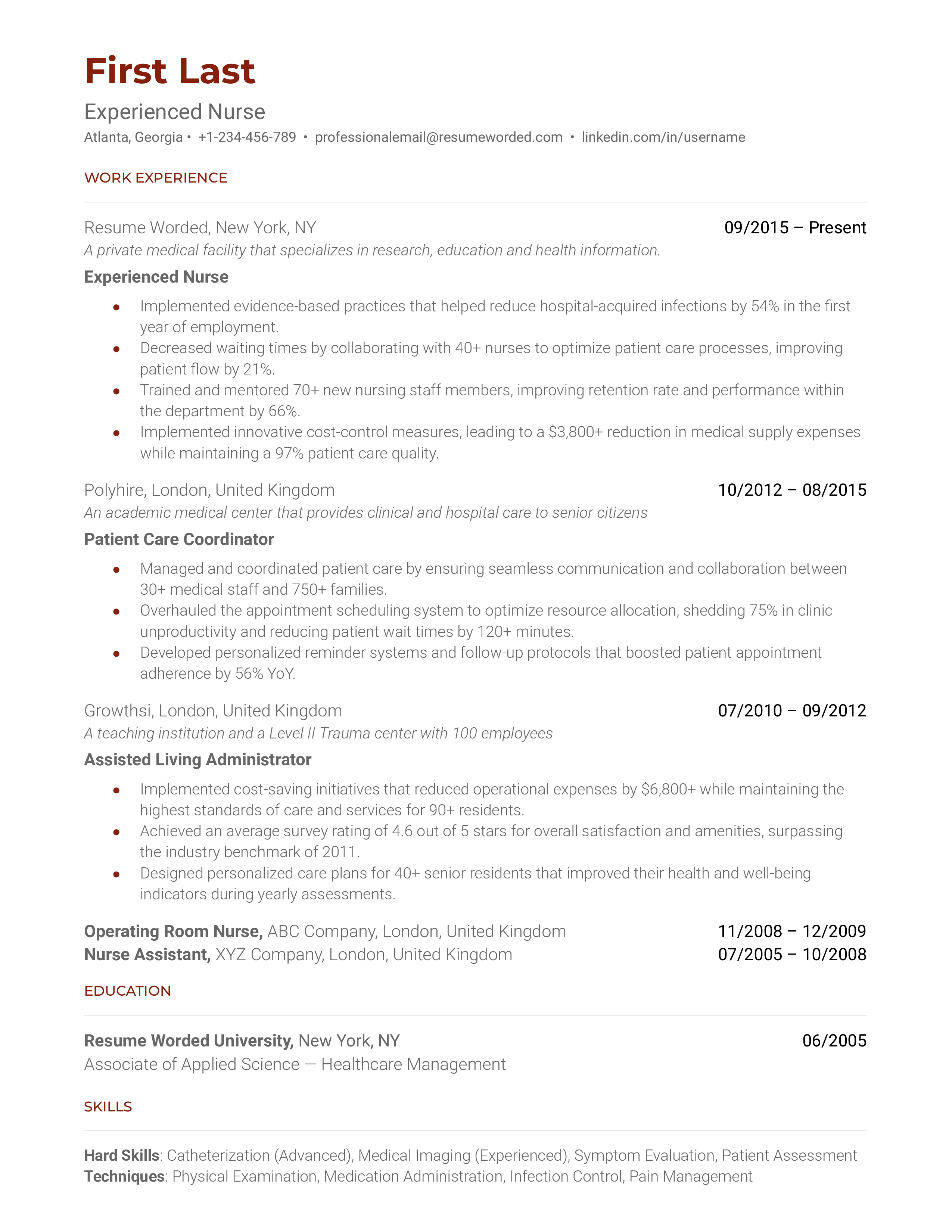
Tips to help you write your Experienced Nurse CV in 2024
showcase your soft skills.
As an experienced nurse, you've likely developed a suite of interpersonal skills that allow you to connect with patients and work well with your team. Make sure your CV includes instances showing patience, empathy, excellent communication or critical thinking.
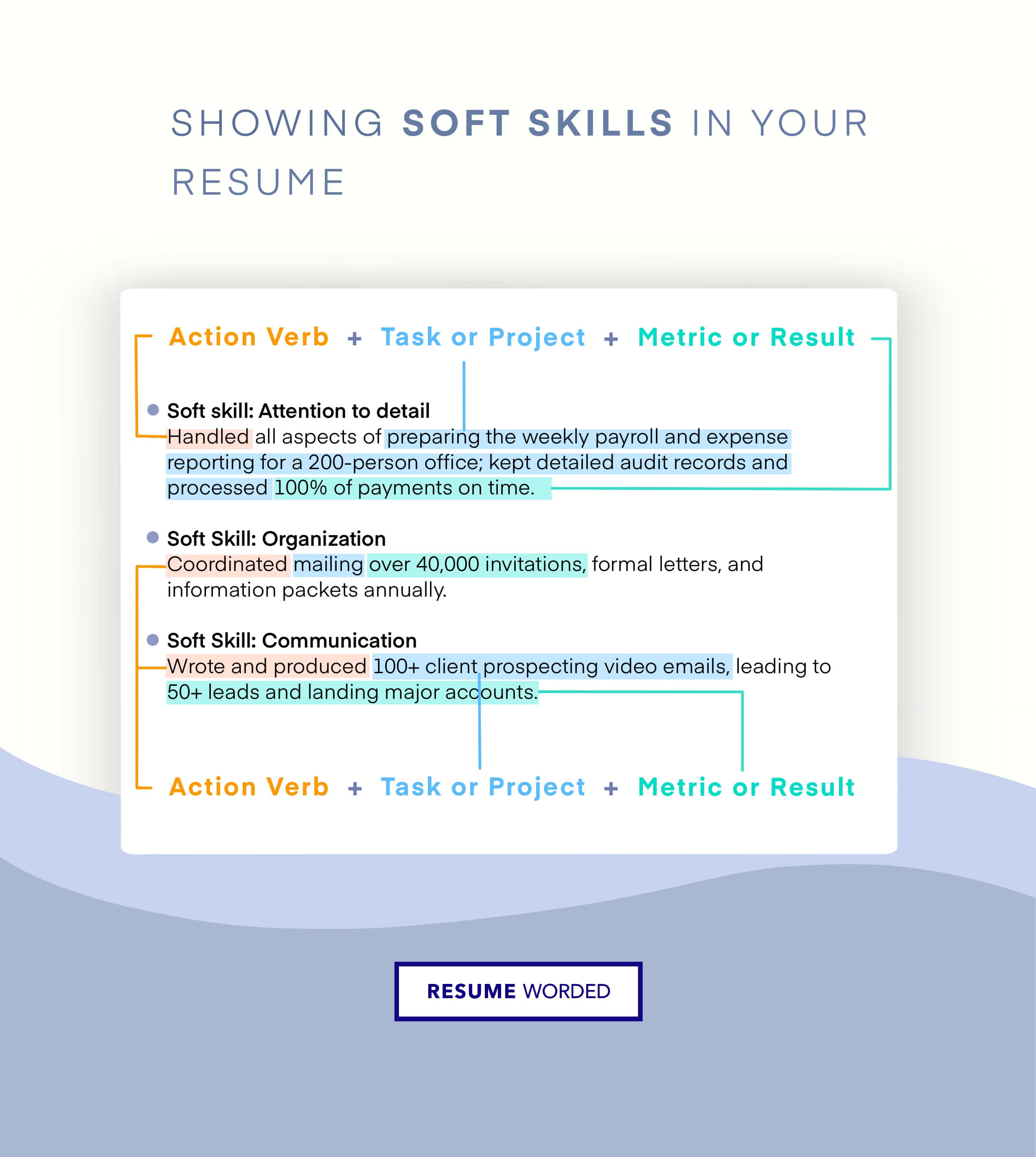
Include specifics about quality of care
Being an experienced nurse, you'll have examples where your intervention improved patient outcomes. Use specific instances on your CV, such as instances of lowering infection rates, reducing readmissions, or streamlining care processes. This evidence of your proactive approach will stand out.
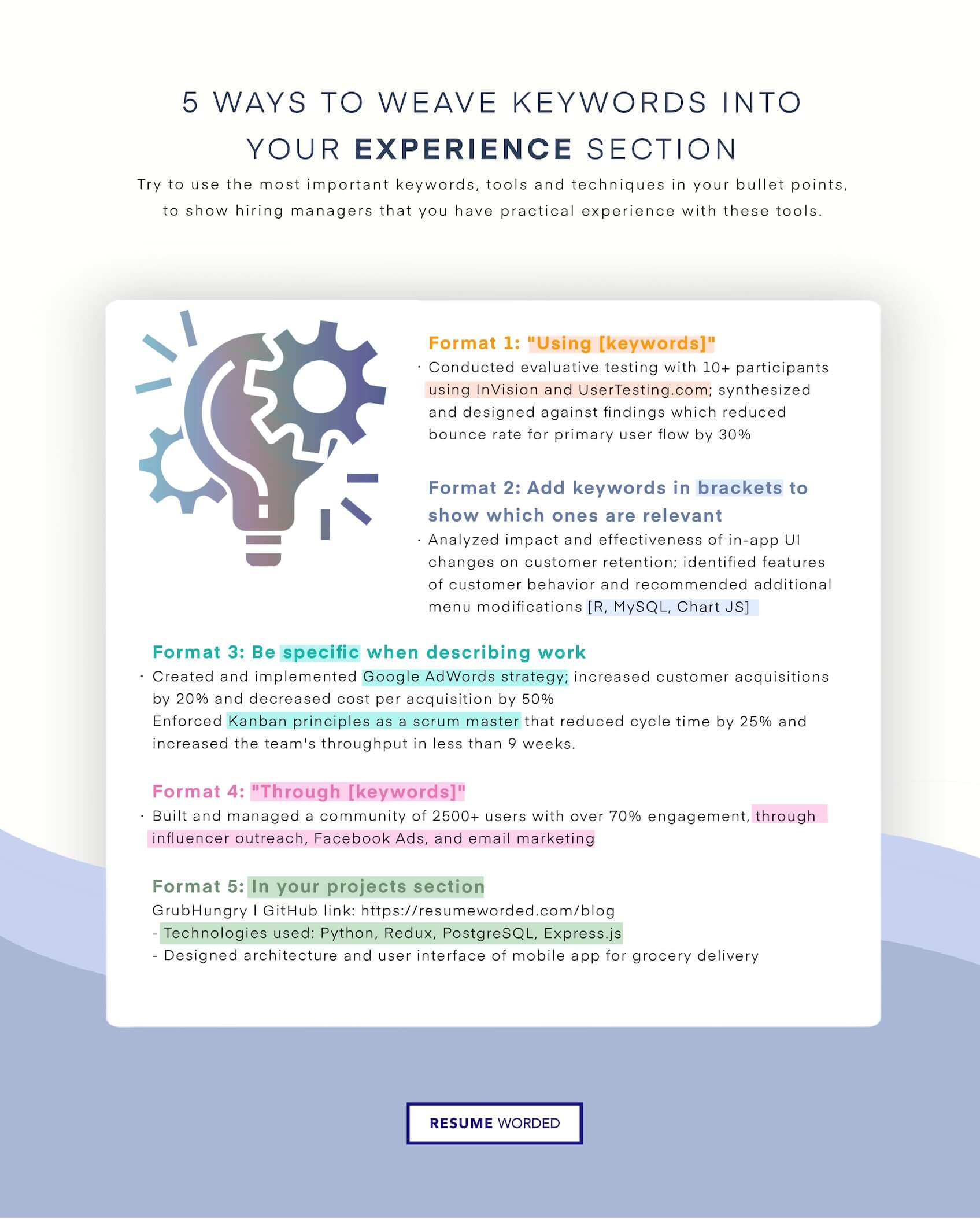
Skills you can include on your Experienced Nurse CV
Template 4 of 42: experienced nurse cv example.
Having years of medical experience under your belt, stepping into the role of an experienced nurse presents some unique challenges, along with opportunities. The healthcare industry, especially nursing, is ever-evolving with technological advancements, revised protocols and changes in patient care models. In this fluid environment, an experienced nurse's CV isn't merely about listing years of experience. It's about showcasing growth, continuous learning and adaptability amidst these changes. When you're writing your CV, remember your experience goes beyond clinical skills. It’s also about leadership, patient advocacy and adaptability.
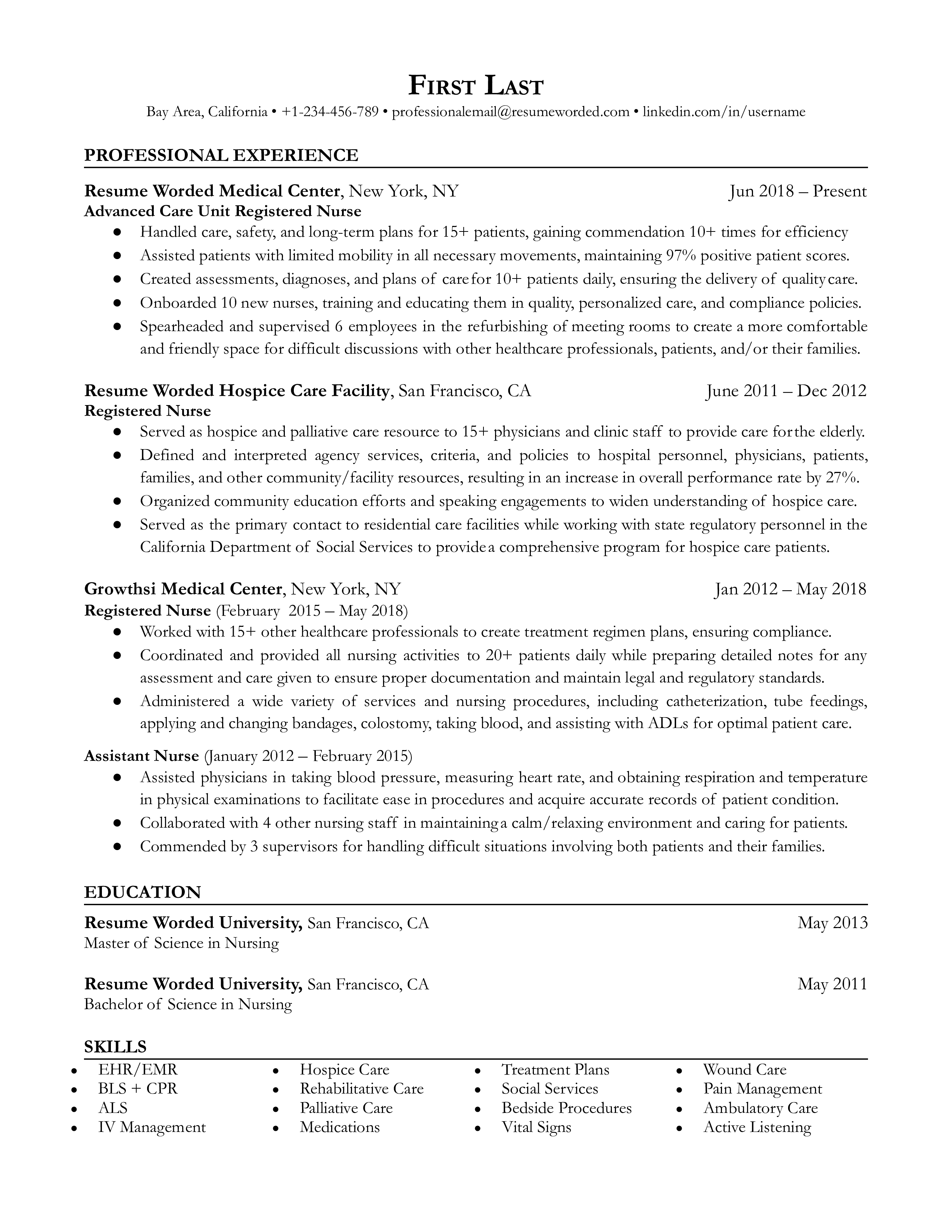
Emphasize your nursing specialties
As an experienced nurse, you've likely developed expertise in certain areas. Maybe it's geriatric care, intensive care or surgical assistance. Wherever your strengths lie, make sure to lay them out in your CV. Specify the areas you’re proficient in to show you can handle specialized responsibilities.
Detail your leadership and mentoring roles
Experience often comes with leadership roles. If you've had opportunities to lead a team, train junior nurses, or mentor students, include these experiences in your CV. This not only demonstrates your ability to handle extra responsibilities, but also mastery in your field that others can learn from.
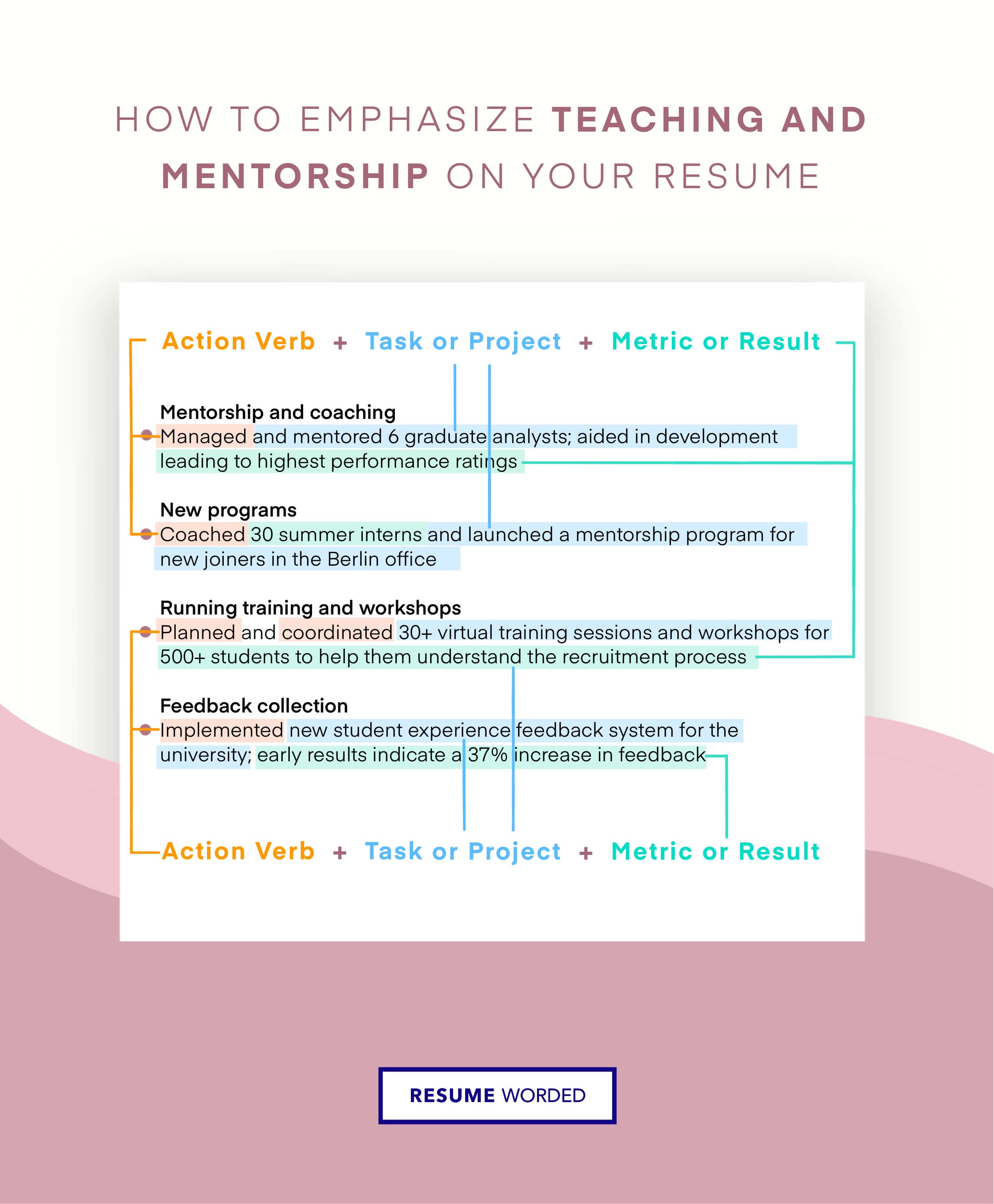
Template 5 of 42: Certified Nursing Assistant CV Example
As a Certified Nursing Assistant (CNA), you're right at the heart of healthcare, providing intimate, hands-on care to patients. Your CV needs to show your dedication to patient care, your hands-on experience, and your relevant qualifications. With increasing healthcare demands and the overall aging population, there's a rise in jobs for CNAs. However, it's crucial to emphasize your niche skills within the sector to stand out in an increasingly competitive market. Your CV should be clean, concise, and specifically tailored to the role of a CNA, ensuring it emphasizes your patient care skills, attention to detail, and medical knowledge.
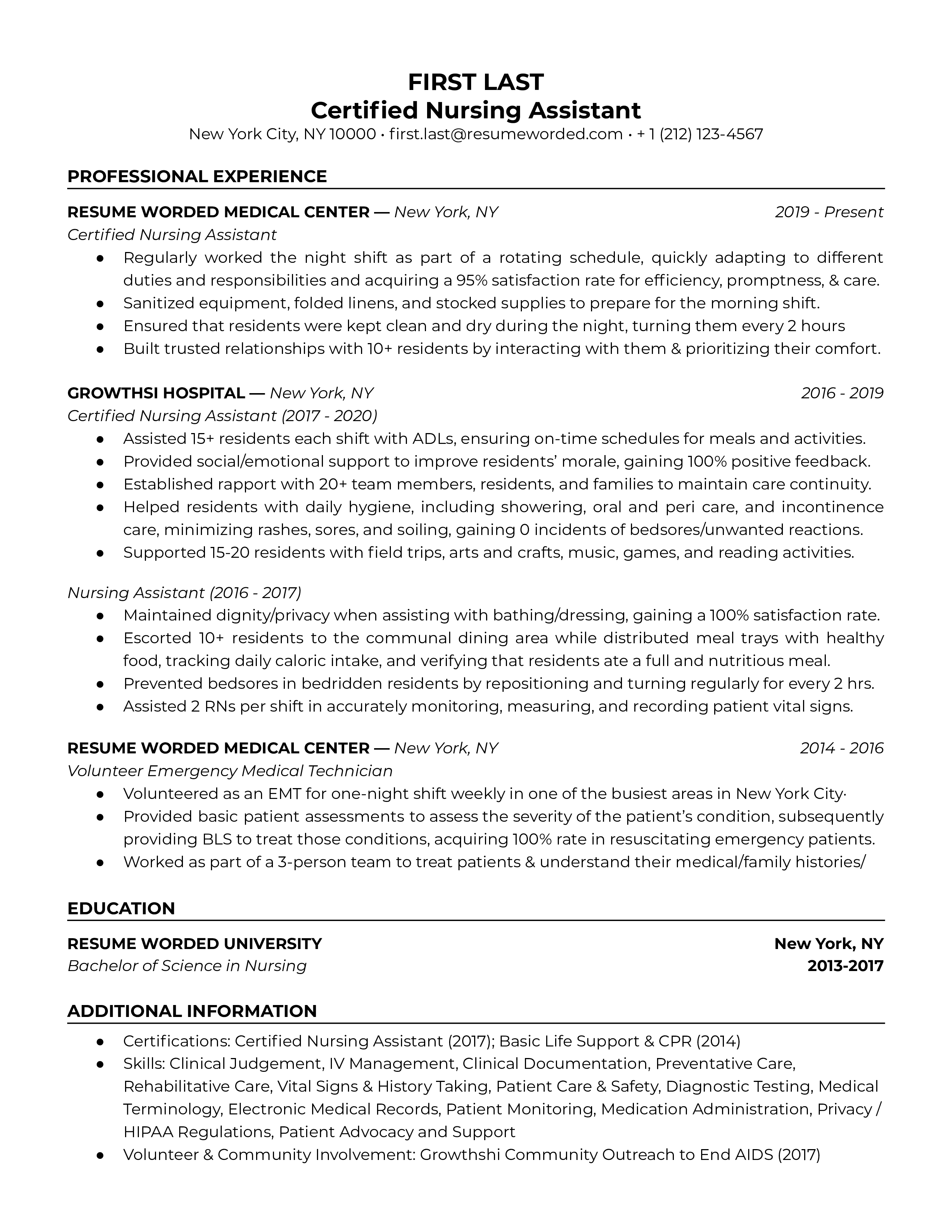
Tips to help you write your Certified Nursing Assistant CV in 2024
include relevant certifications and trainings.
As you know, having appropriate certifications is non-negotiable for CNAs. Make sure to list these clearly on your CV. Include specifics, such as the type of certification (CNA, CPR, etc.), where you received it, and the date of issuance or validity.
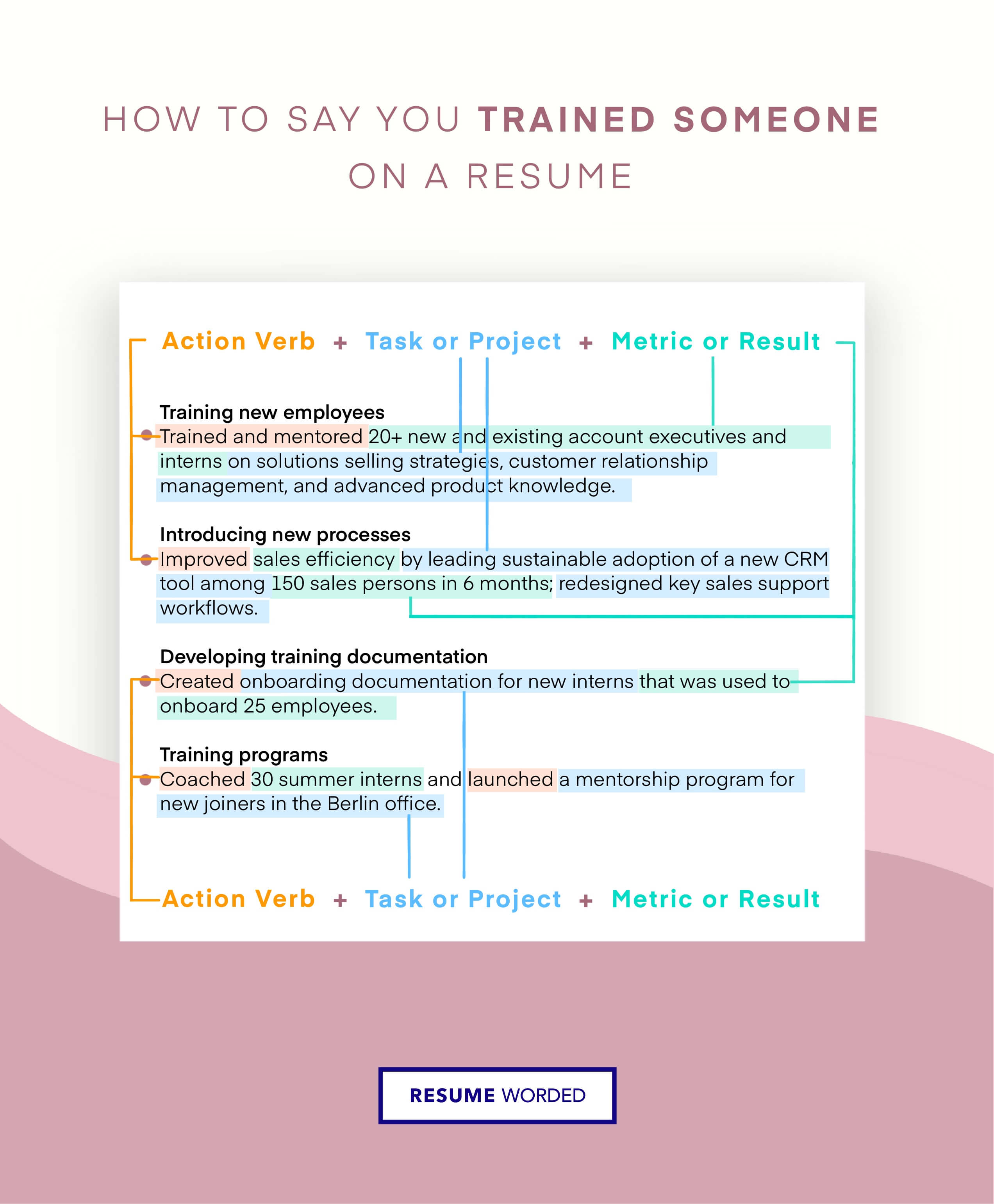
Detail your specific patient care skills
CNAs are expected to have a wide array of patient care skills, from assisting with personal hygiene to recording vital signs. Tailor this section very carefully, putting emphasis on the skills most relevant to the specific CNA job you're applying for, as every care setting can prioritize different skills.
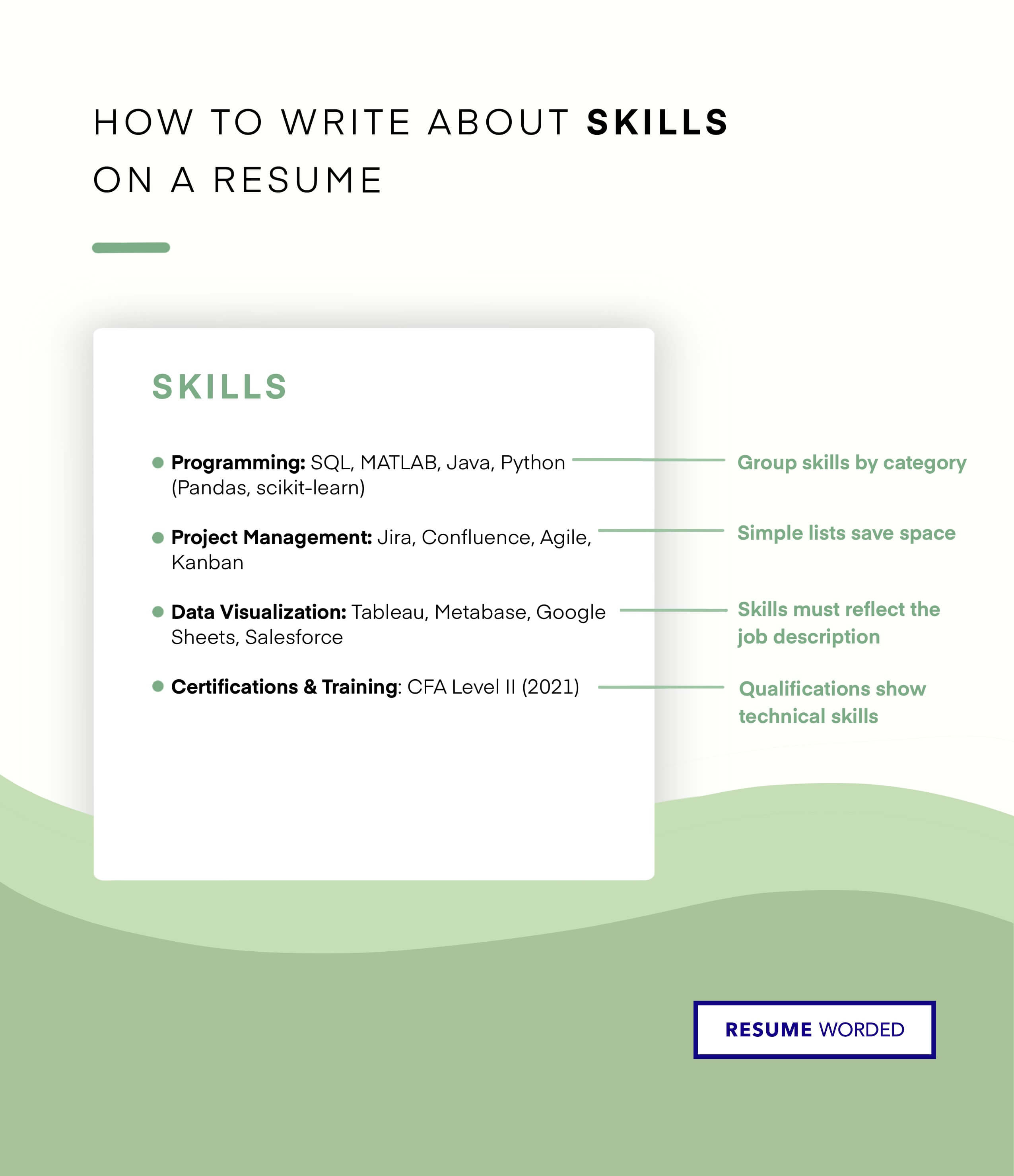
Skills you can include on your Certified Nursing Assistant CV
Template 6 of 42: registered nurse cv example.
As a Registered Nurse, you're more than just a health provider, you are a critical communicator, a patient advocate, and a reliable team member. So, your CV should reflect these unique aspects. Recent trends in the industry show a growing emphasis on skills like patient education and multidisciplinary teamwork. Instead of just listing your clinical skills, show how you use them in practice. For instance, demonstrate how your bedside manner contributes to patient recovery or how you’ve innovated to improve care delivery. Just remember, it's not about ticking boxes, it’s about showcasing how you apply your skills in real-world settings.
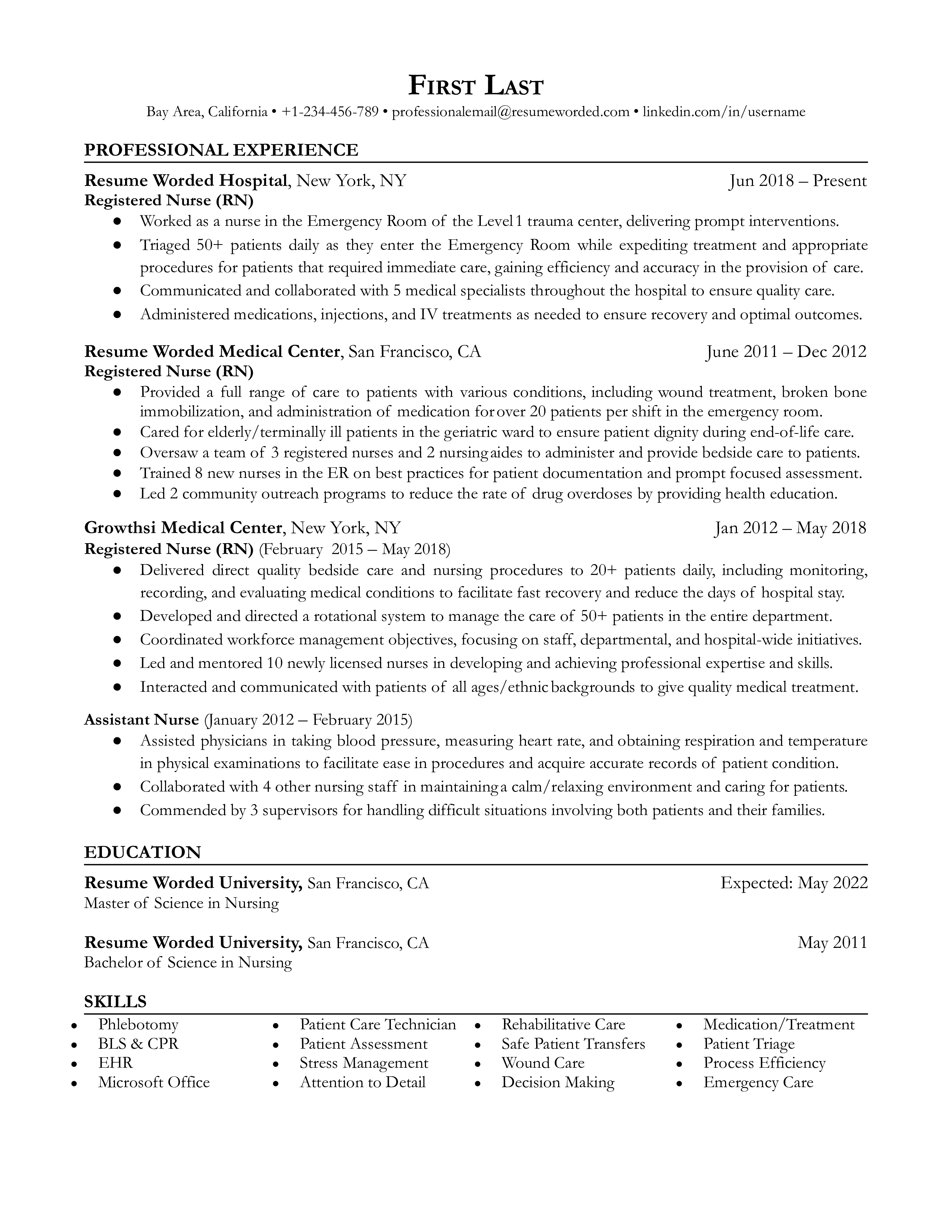
Tips to help you write your Registered Nurse CV in 2024
demonstrate ongoing learning.
Because nursing is a rapidly changing field, it's important to show that you are keeping up with new procedures, technologies, and best practices. Share your recent qualifications, any specialized training you've completed or even webinars and workshops that you've attended.
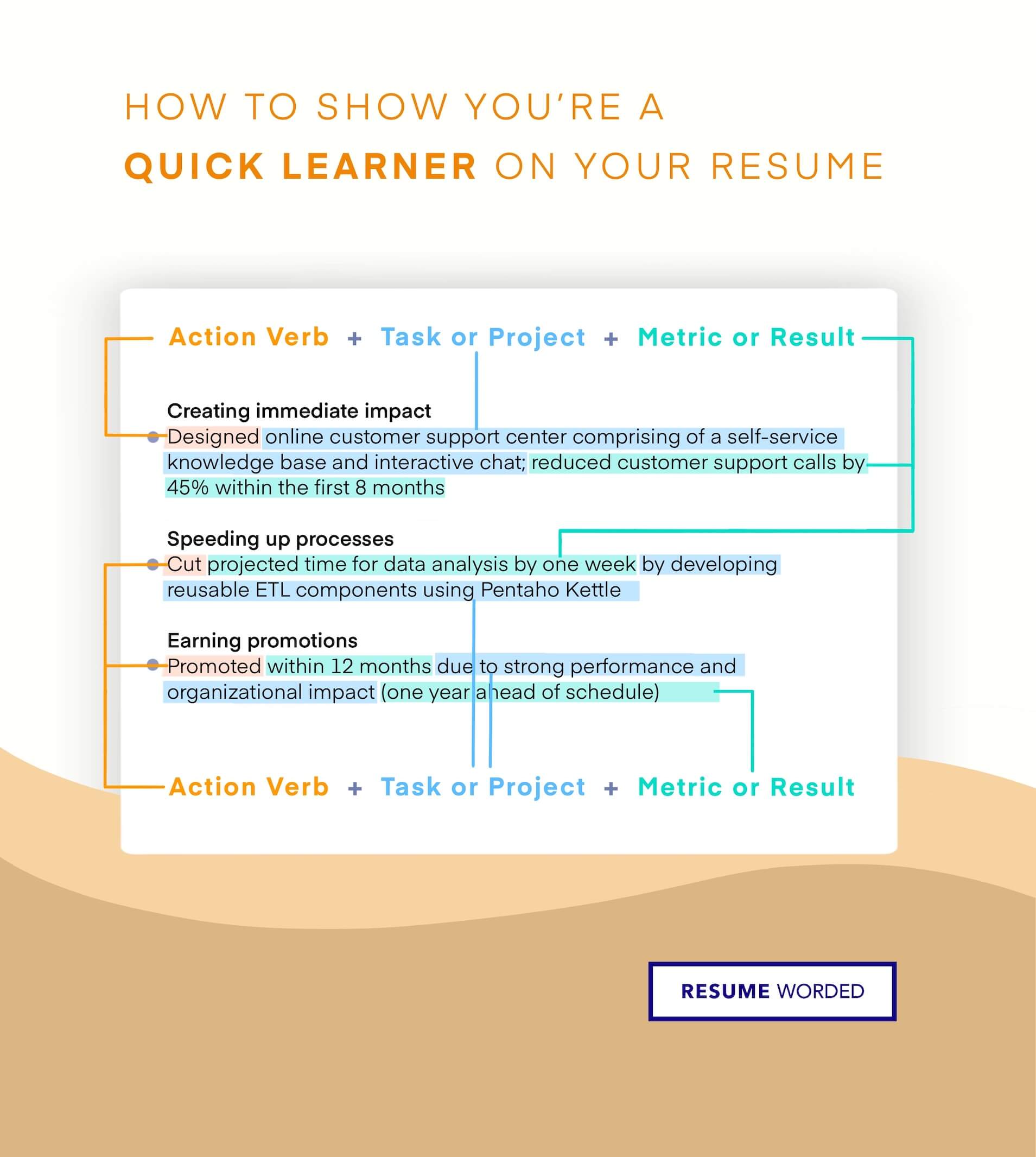
Quantify your impact
Numbers speak volumes in a CV. Use them to illustrate your effectiveness and impact. For instance, you can specify the number of patients you manage on average, or the percentage by which you helped reduce medication errors in your last role.
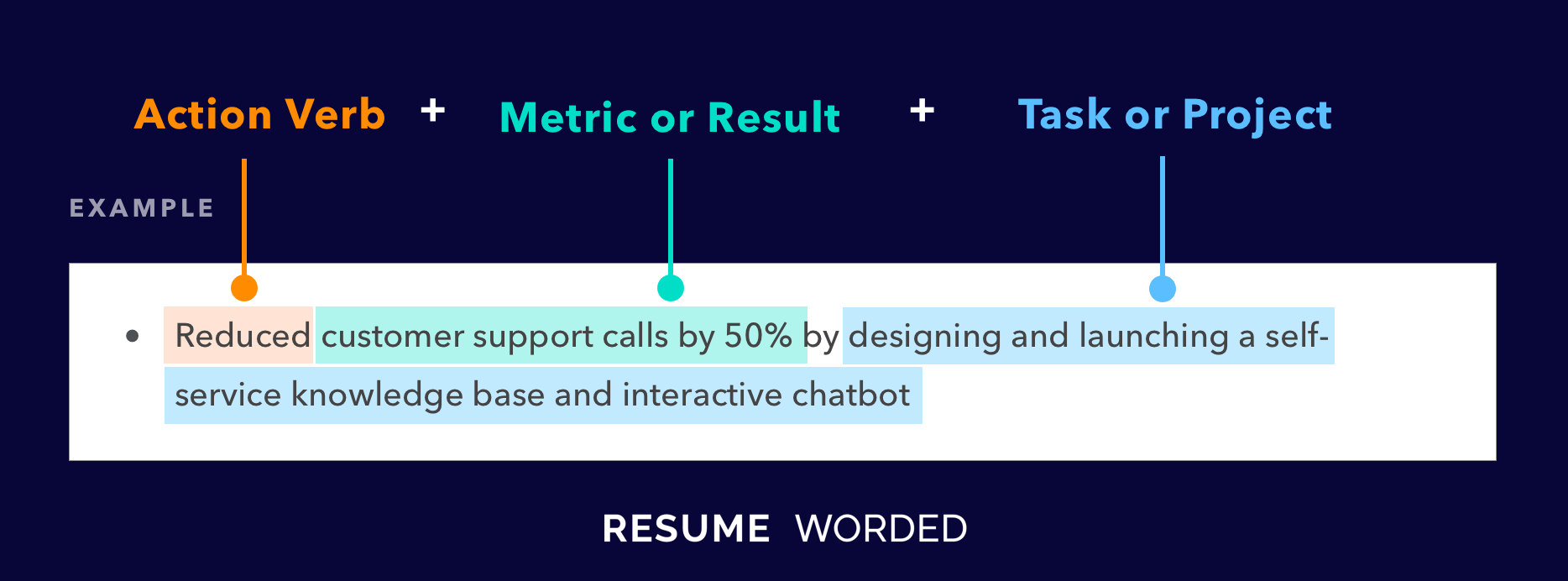
Skills you can include on your Registered Nurse CV
Template 7 of 42: icu nurse cv example.
Getting a job as an ICU Nurse is no small feat. Your CV has to represent you as a trusted professional, well-versed in high-stakes decision-making, patient and family communication, and collaborative teamwork. The healthcare industry leans towards nurses who consistently put patient safety at the forefront, follow precise protocols, and are eager for continued learning. Lately, there's been a trend in hiring ICU nurses with advanced degrees and certifications, as well as those who exhibit resilience and emotional intelligence. When writing your CV, remember that it's essentially a story of your nursing journey, showcasing your commitment and valuable experience in intensive care.
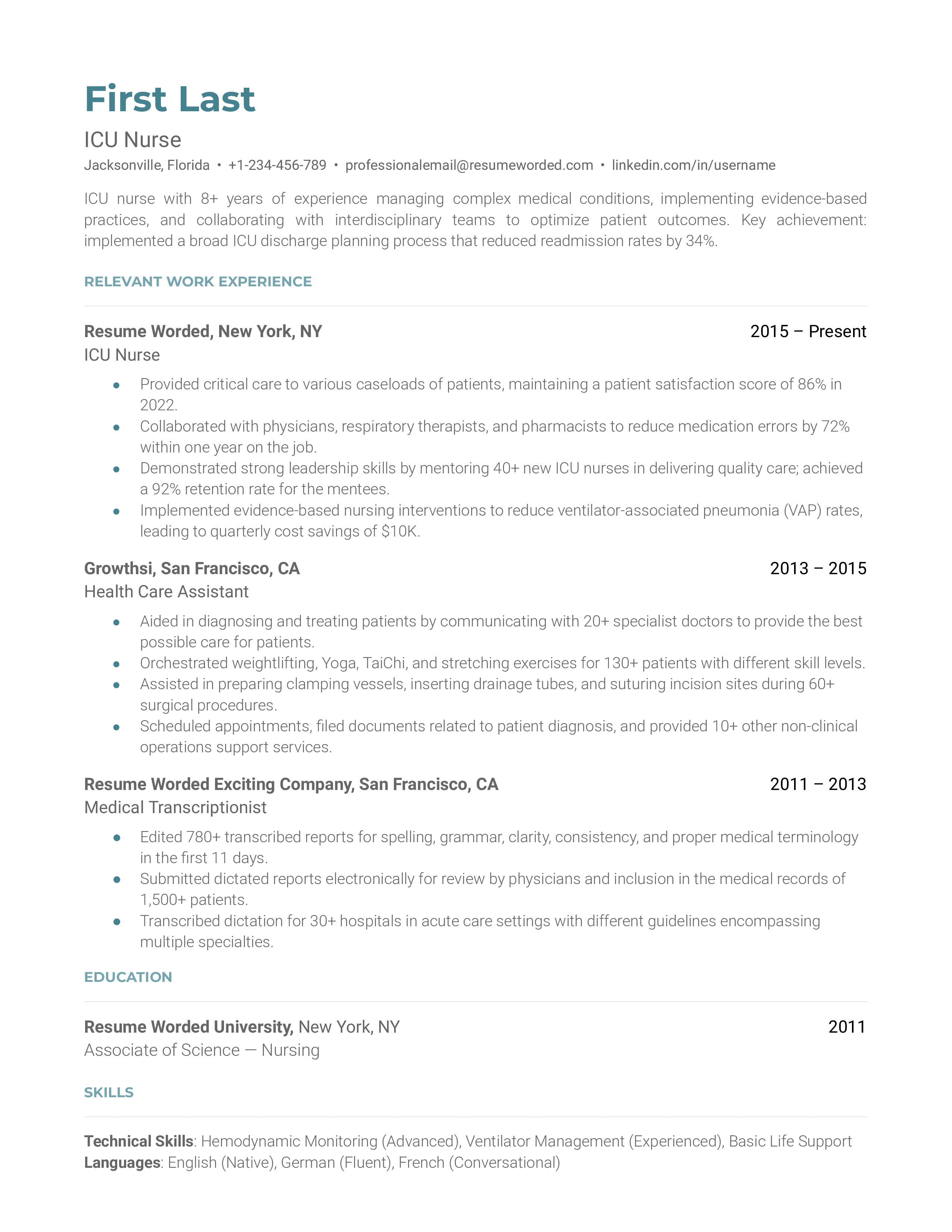
Tips to help you write your ICU Nurse CV in 2024
include specifics on patient care.
When describing your experience, be specific about the types of patients you've cared for. The ICU covers various patient types, from neurointensive to pediatric intensive care. It'll be useful for hiring managers to know your comfort zones and areas of expertise.
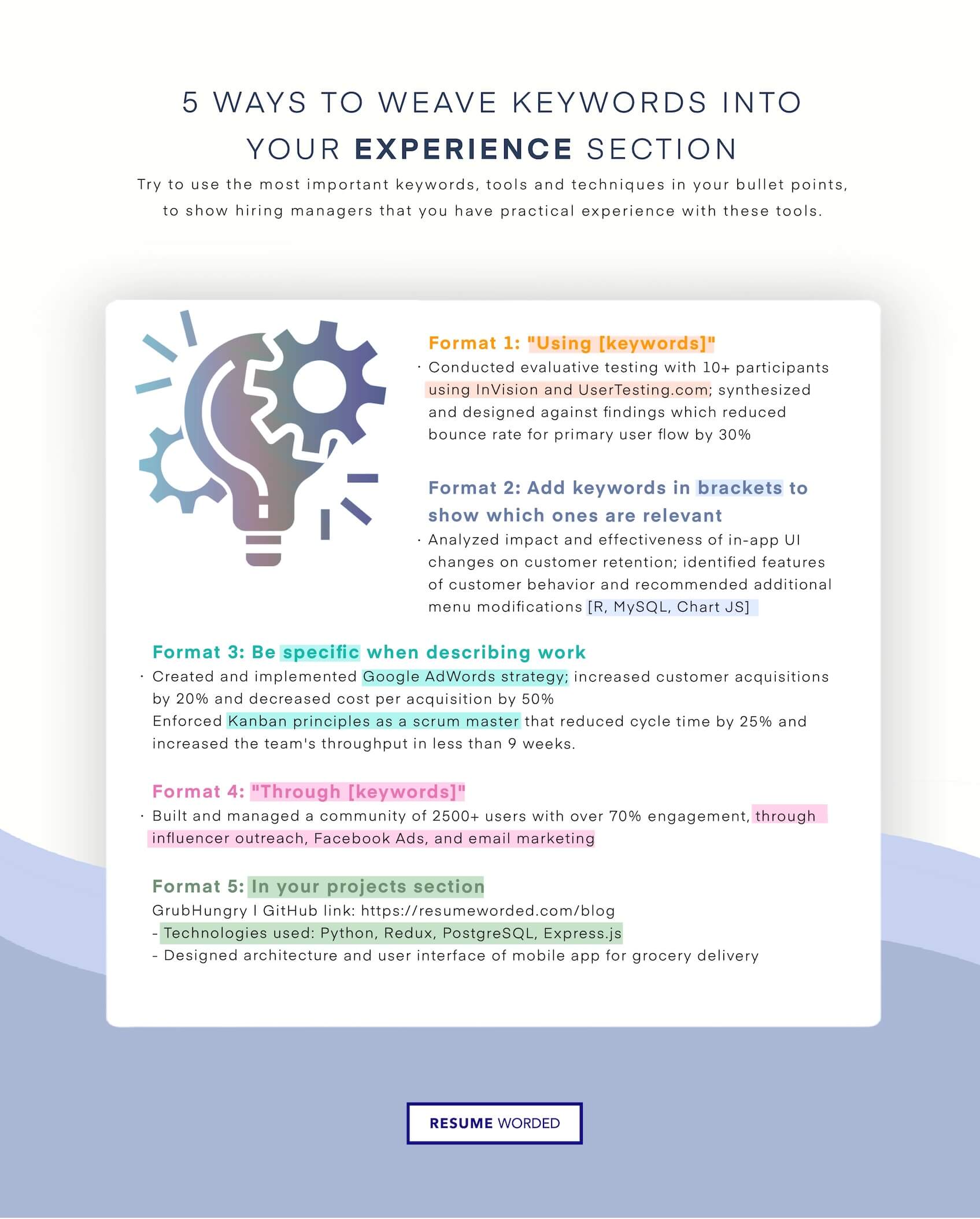
Detail relevant training and certifications
In the world of ICU nursing, specialized training and certifications count a lot. So, if you're certified in areas such as critical care nursing (CCRN) or have received specialized training, for example, in trauma nursing, don't forget to mention it. This gives you an edge and shows your dedication to the field.
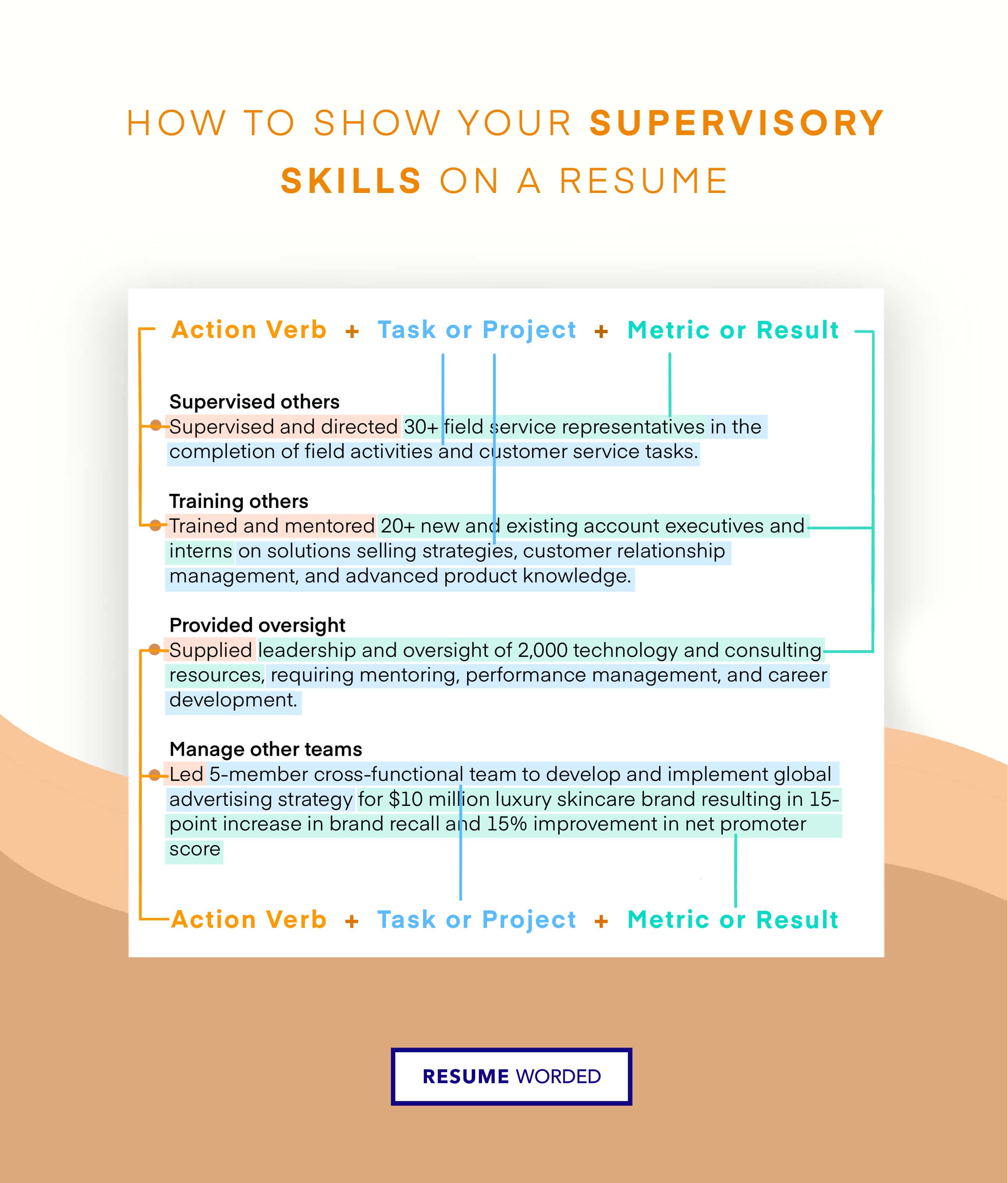

Skills you can include on your ICU Nurse CV
Template 8 of 42: icu nurse cv example.
As an ICU nurse, your role is multifaceted requiring medical knowledge, technical skills, and compassion. Your CV should reflect this complexity, demonstrating not just your medical acumen but also your ability to handle high-pressure situations. It's been a recent trend in the industry to see the increased use of technology in intensive care units. Thus, your technological proficiency is going to catch a recruiter's eye. Your CV needs to present you as the perfect blend of a trained professional and a compassionate caregiver, and should be tailored with care to showcase your unique skills and experiences.
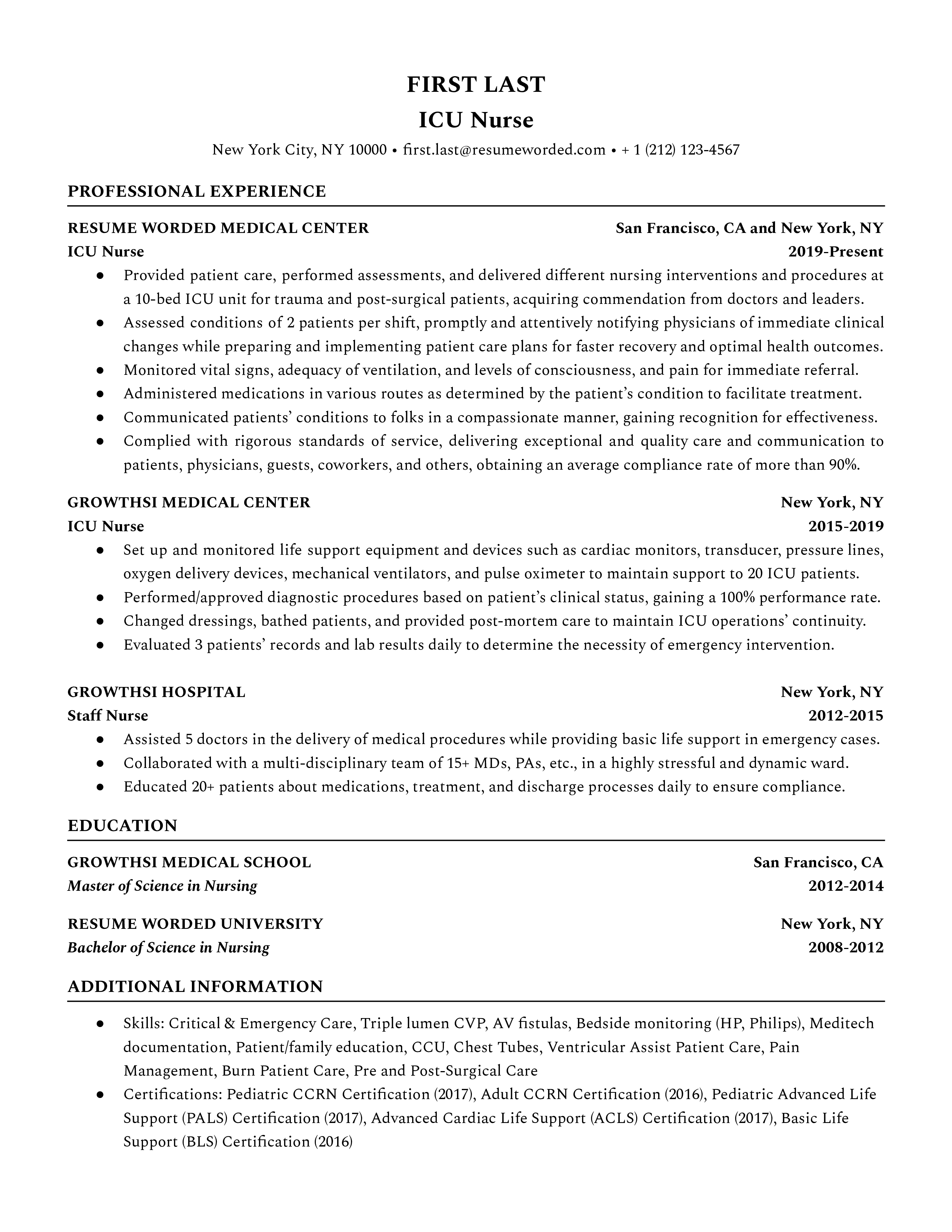
Demonstrate your ability to use tech in ICUs
You should ensure your CV includes relevant experiences that show your comfort with current medical technologies. This could be anything from using electronic health records to handling complex life-support systems. Specific examples would make your proficiency apparent and more convincing.
Detail your high-pressure situation handling
It's important that you illustrate your resilience. Share instances where you've managed high-pressure situations or emergencies. Using facts and figures - like how you handled 50+ emergency cases a month - could really help paint a picture of your capabilities.
Template 9 of 42: NICU Nurse CV Example
Writing a CV for a Neonatal Intensive Care Unit (NICU) Nurse role is a unique task as it must vividly demonstrate your competence in handling critical care for infants. You'll need to convey your ability to manage stressful situations, yet also offer the care and warmth required for such sensitive patients. The health industry is moving towards using more innovative technologies in NICU settings, so make sure to emphasize any familiarity with cutting-edge tech or procedures. When crafting your CV, remember to zone in on your specialist skills, and express your passion for neonatal nursing, showing empathy and attention to detail.
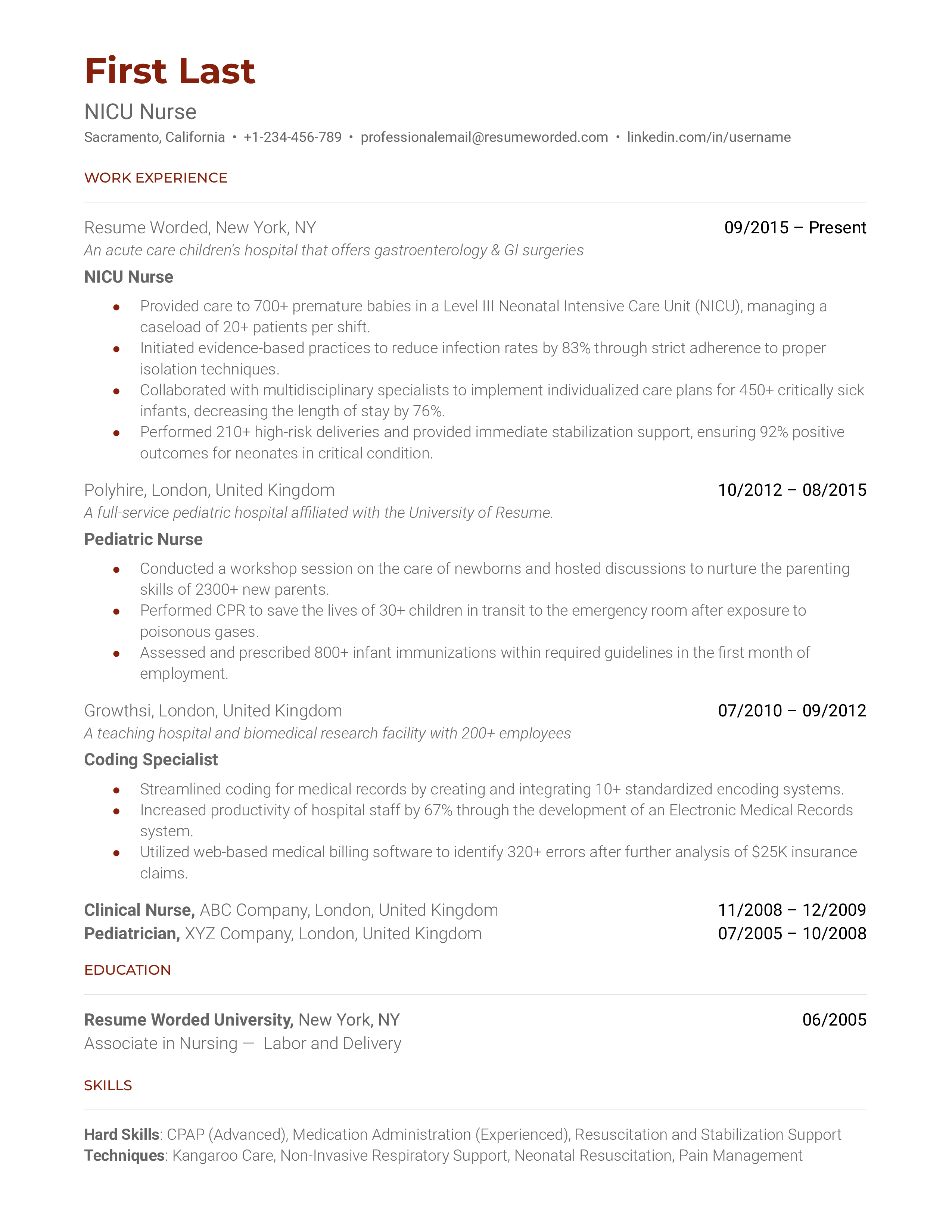
Tips to help you write your NICU Nurse CV in 2024
emphasize specialist nicu skills.
As a NICU Nurse, you are both a specialist nurse and a vital part of a neonatal team. In your CV, you should specifically detail any specialized training you have taken, such as Neonatal Resuscitation Program (NRP) or STABLE certification, and hands-on experience you have in neonatal care.
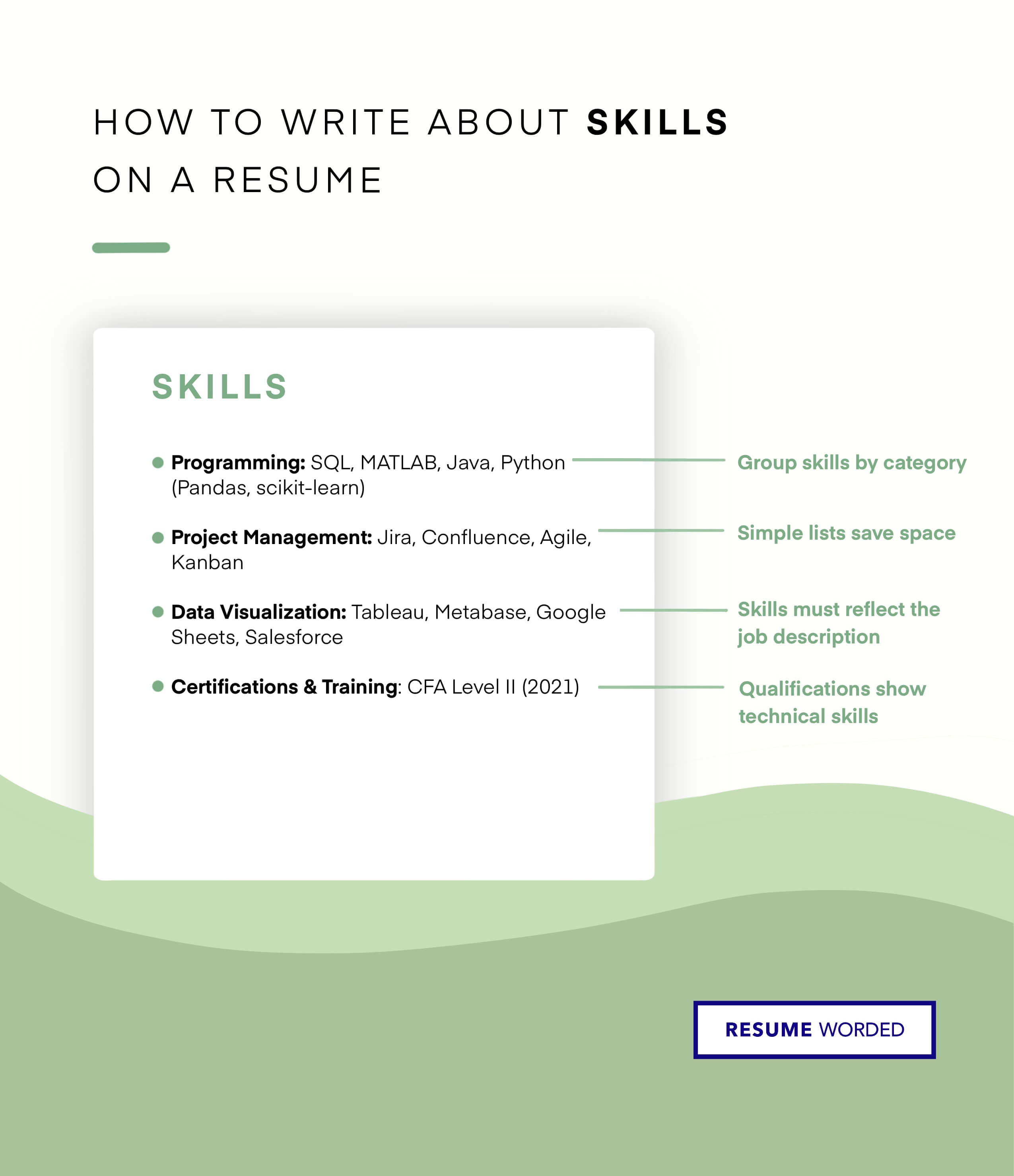
Showcase tech-savviness
Because the NICU industry is becoming more tech-driven, you should mention any experience you have using advanced technology in neonatal care, such as ventilators or incubators. This gives you an edge over other applicants who may not be as familiar with these technologies.
Skills you can include on your NICU Nurse CV
Template 10 of 42: nicu nurse cv example.
As a NICU nurse, your role is intense and highly specialized. You're looking after the most vulnerable patients and making a profound difference in their lives. In recent times, the demand for NICU nurses has surged, reflecting the broader trend for more specialized care in the nursing profession. So when crafting your CV, it's crucial to demonstrate your specialised skills, experience, and compassion for this role. The other thing to remember is that NICU roles often involve a lot more collaboration than people realize. You're working closely with doctors, other nurses, and family members. So alongside showcasing your technical skills, your CV should also highlight teamwork, communication, and an ability to handle emotionally charged situations.
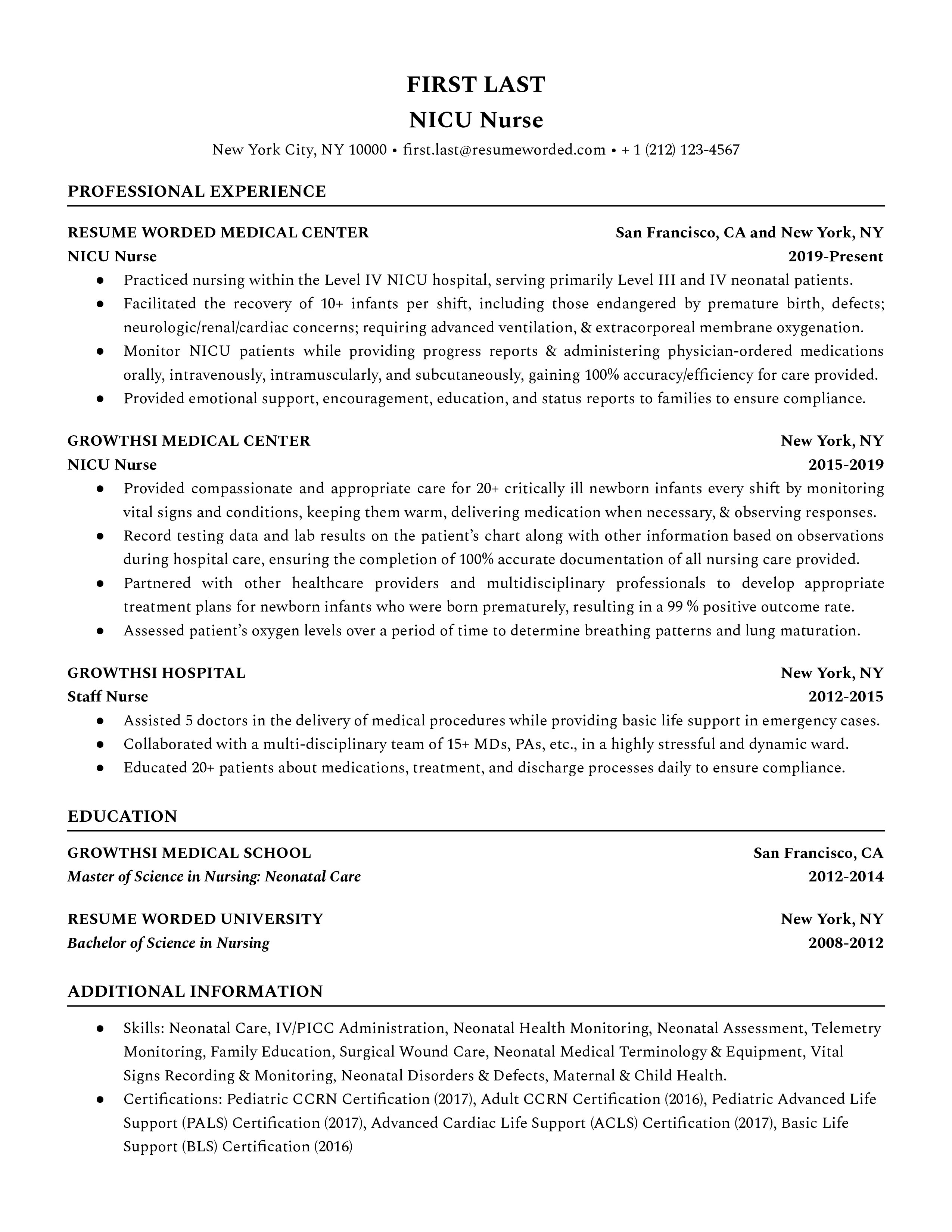
Detail your specialisation
In the NICU, you're dealing with a variety of serious infant health issues. It's therefore important to detail your specialisation or area of expertise. For instance, you might have extensive experience dealing with premature babies or babies with specific health conditions.
Include specifics about your role in a team
As a NICU nurse, you're not working in isolation, but as part of a team, often in a fast-paced environment. Mention instances where you collaborated with doctors and other nurses to improve patient outcomes, or times when you provided emotional support to families.
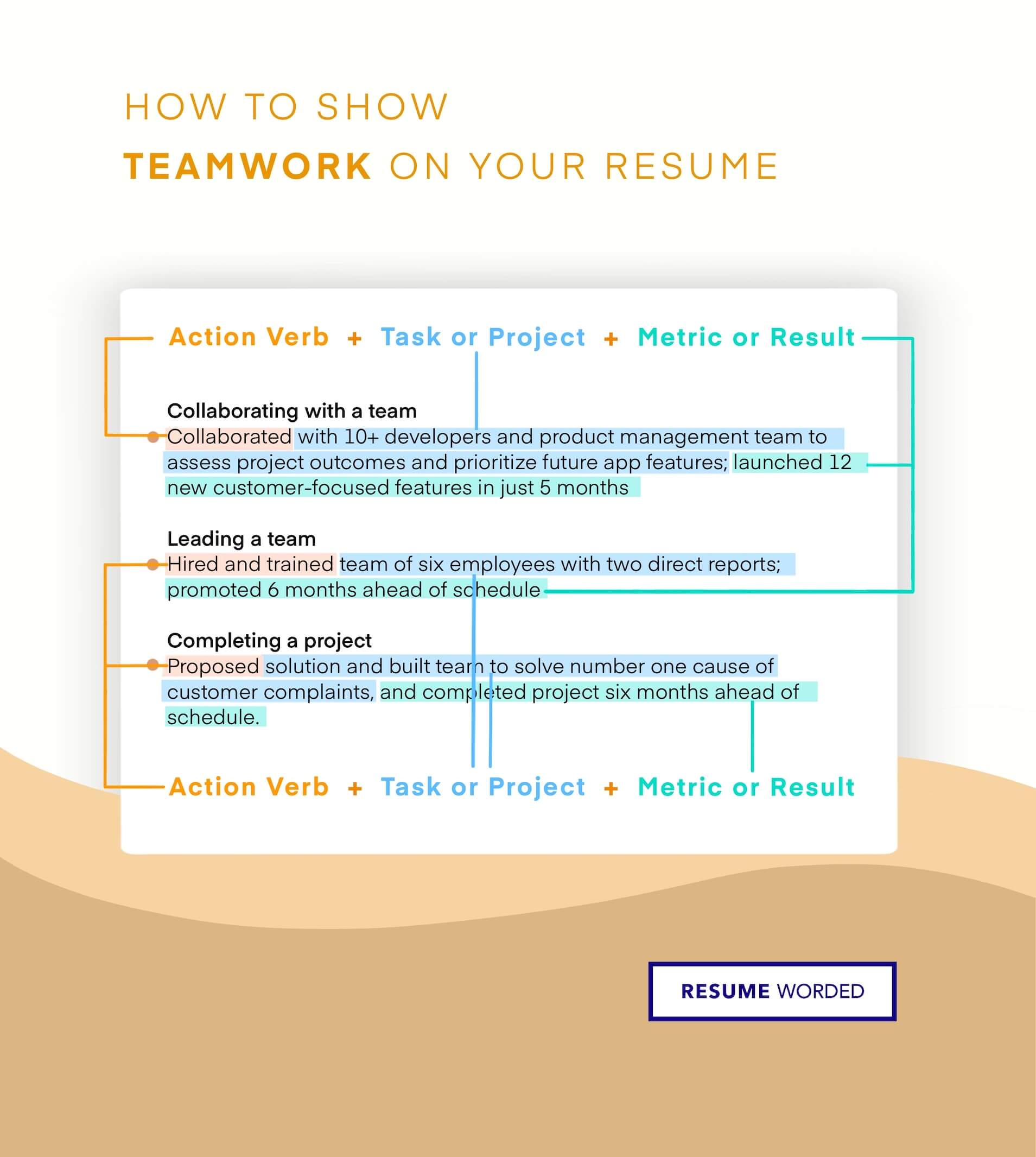
Template 11 of 42: Psychiatric Nurse CV Example
Psychiatric nursing is a specialized profession where you care for people with mental health issues. It requires a unique combination of compassion, resilience, and strong interpersonal skills. In recent years, we've seen a growing emphasis on de-escalation strategies and trauma-informed care, reflecting changes in how mental health care is delivered. Your CV for a psychiatric nurse role should demonstrate your ability to adapt to these shifts in the sector. Equally important, it should tell a story about your experience and skills in managing and improving the mental health of your patients.
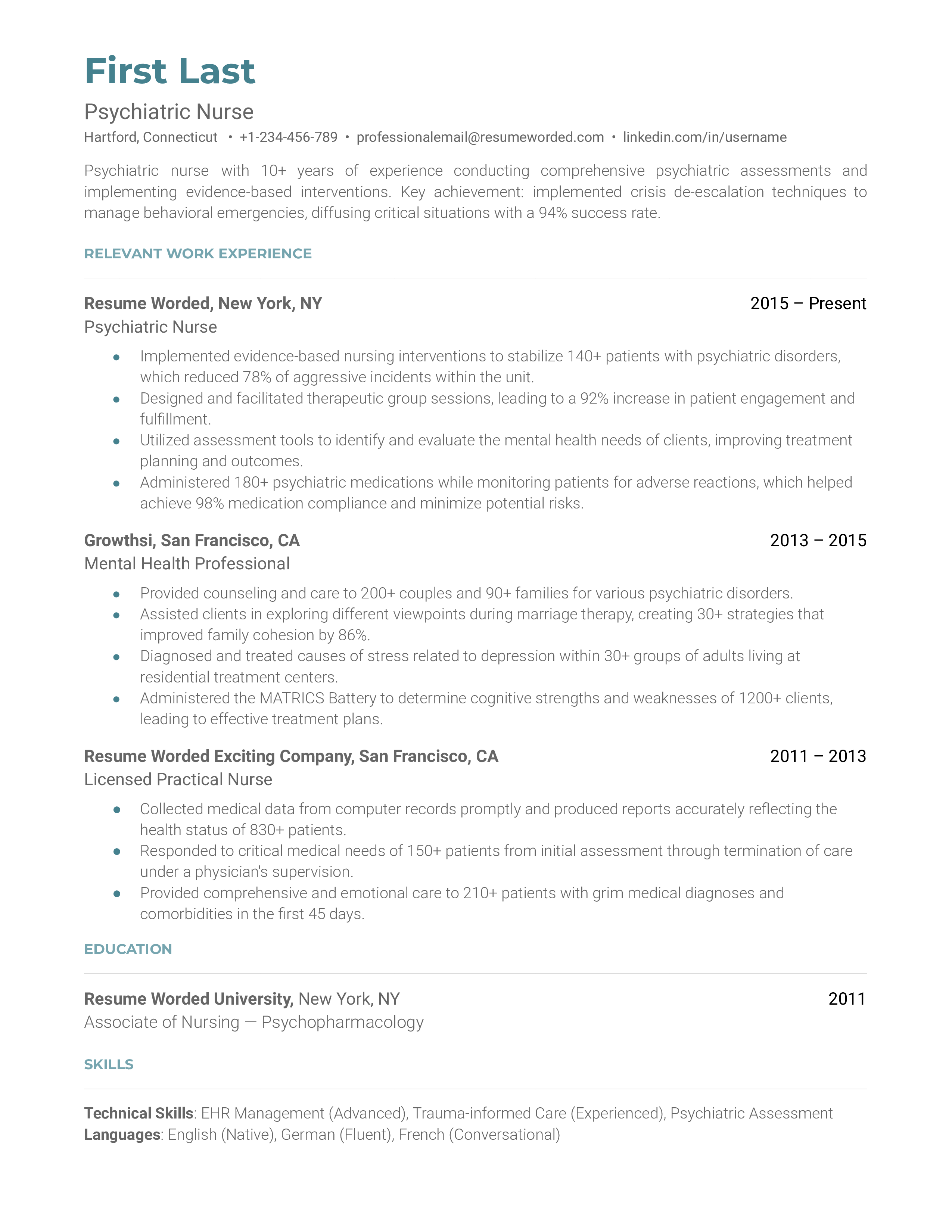
Tips to help you write your Psychiatric Nurse CV in 2024
show your understanding of recovery-focused care.
In your CV, you need to communicate your knowledge and application of a recovery-oriented approach. This is a significant trend in psychiatric nursing, so detailing situations where you've supported patients towards recovery would show the depth of your experience.
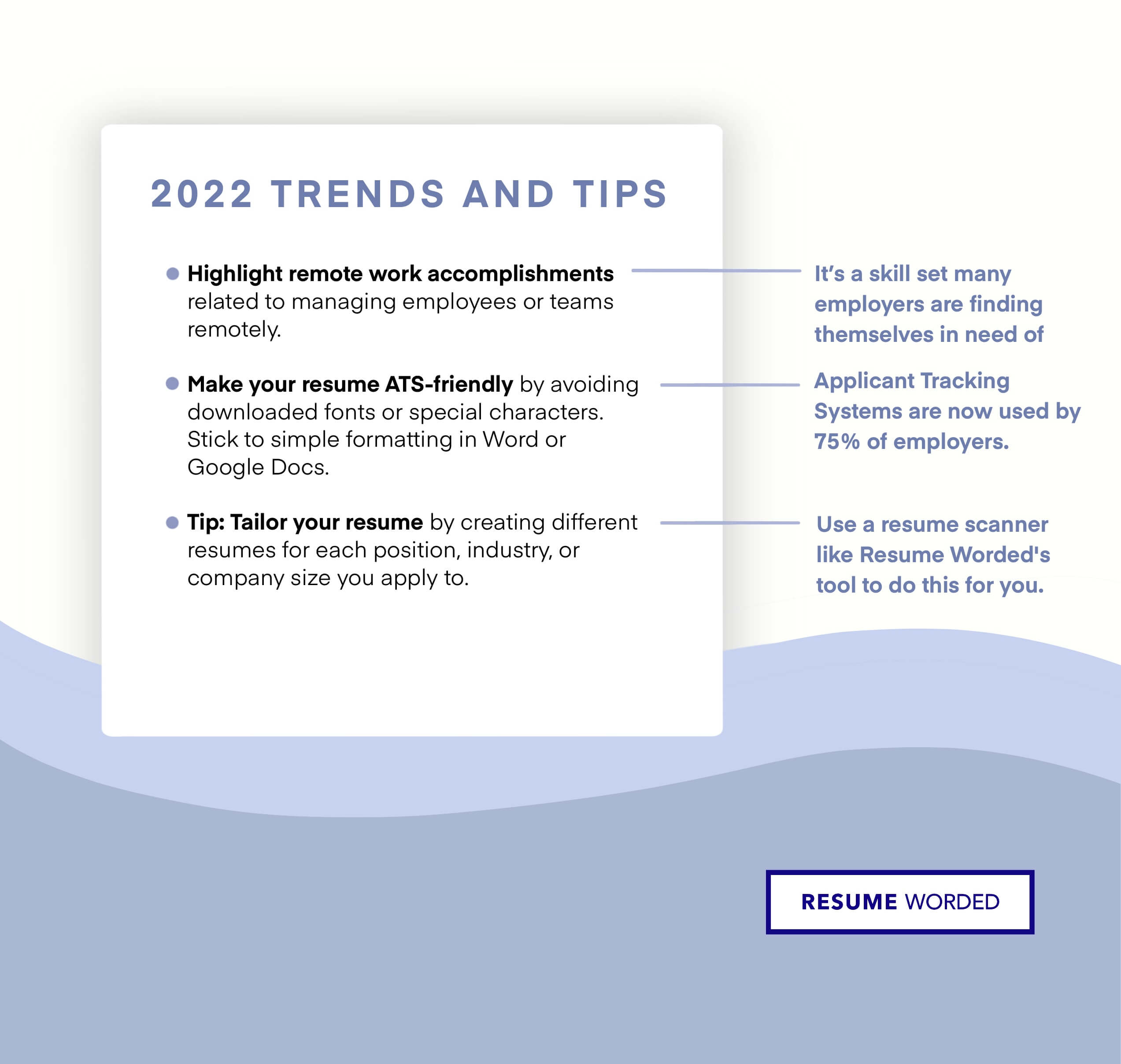
Highlight your proficiency in pharmacology
Psychiatric nurses administer and manage medications, monitor their effects, and educate patients about these medications. Hence, a section dedicated to your pharmacological education and experience would be useful. You should talk about specific medication regimes you’ve managed and any positive outcomes achieved.
Skills you can include on your Psychiatric Nurse CV
Template 12 of 42: psychiatric nurse cv example.
As a psychiatric nurse, your CV is your tool to showcase your expertise in mental health nursing and your ability to provide empathetic, effective patient care. This field is unique in its emphasis on understanding and managing mental health conditions, so your CV should reflect this focus. It's also becoming increasingly important to show adaptability and resilience given the ongoing challenges in healthcare. When writing your CV, remember that you're not just listing your credentials – you're telling a story about your commitment to mental health care.
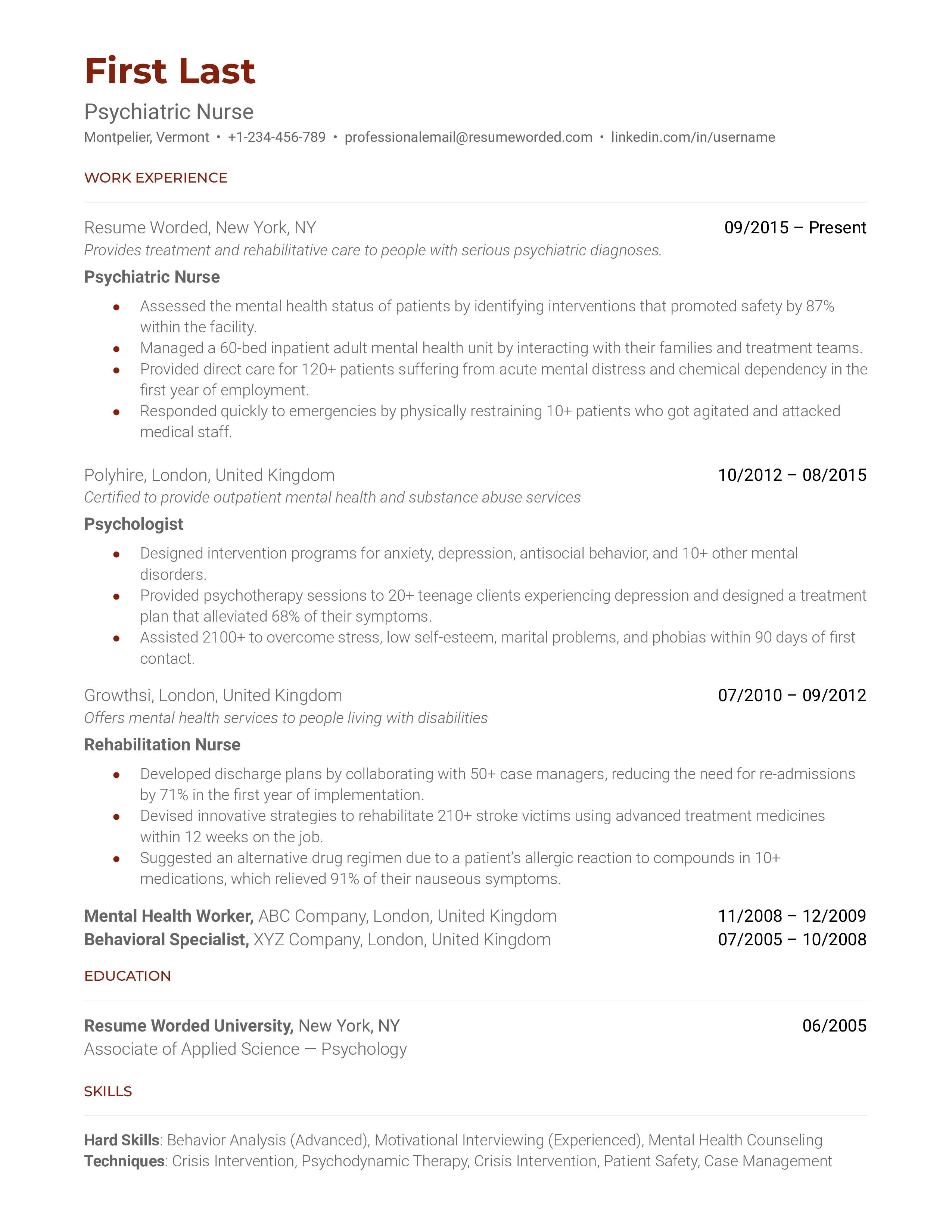
Detail specific mental health nursing skills
Your CV should clearly demonstrate your specific skills in mental health nursing. Include expertise in patient assessment, creating individual care plans, administering medication, and crisis intervention. Showcasing these specialty skills can set you apart from general nursing applicants.
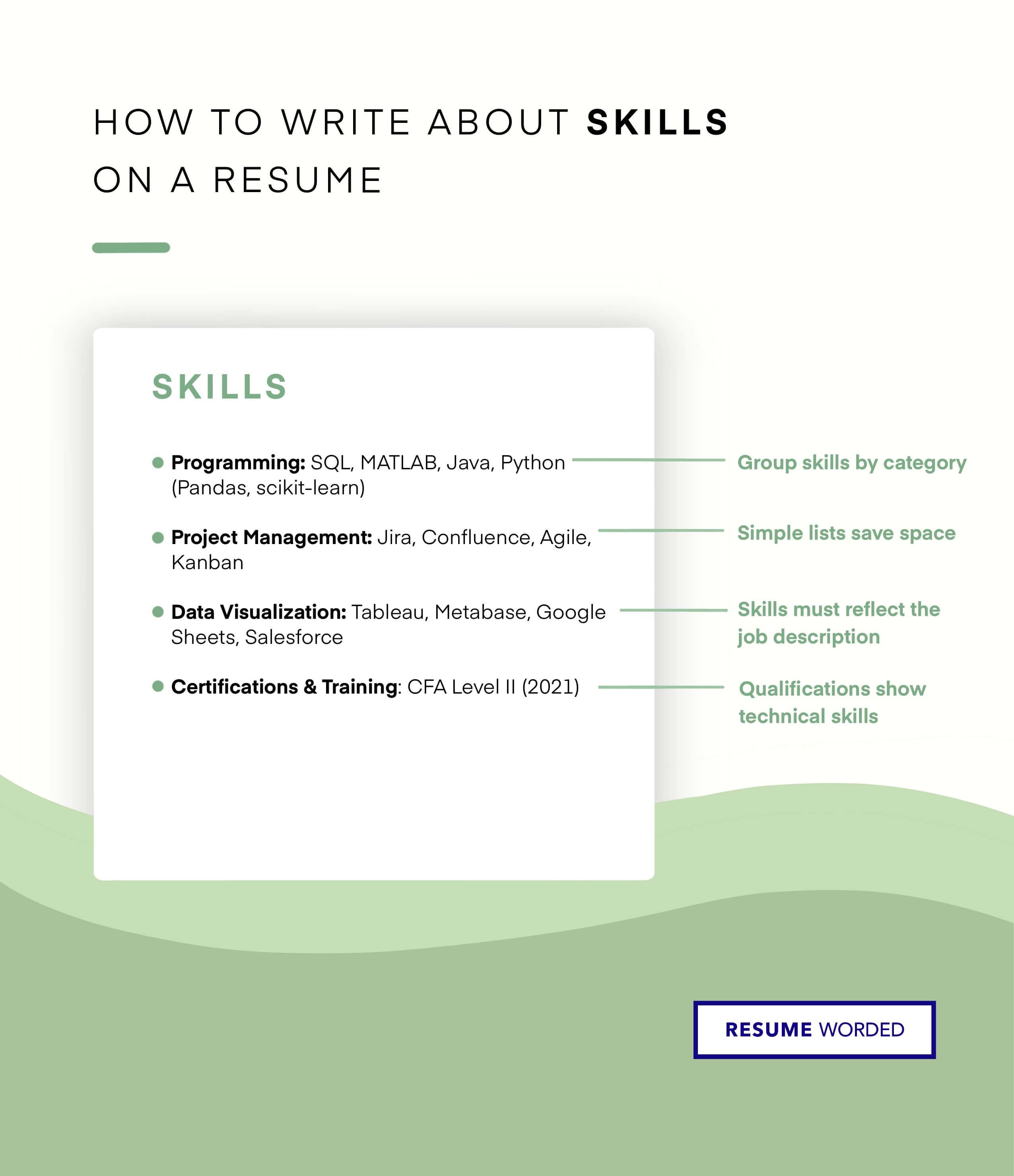
Use numbers to demonstrate impact
Within your experience section, illustrate the impact of your work using clear metrics where possible. Have you managed a high number of patients, reduced medication errors, or improved patient satisfaction scores? The tangible impact you've made can provide a compelling insight into your abilities.
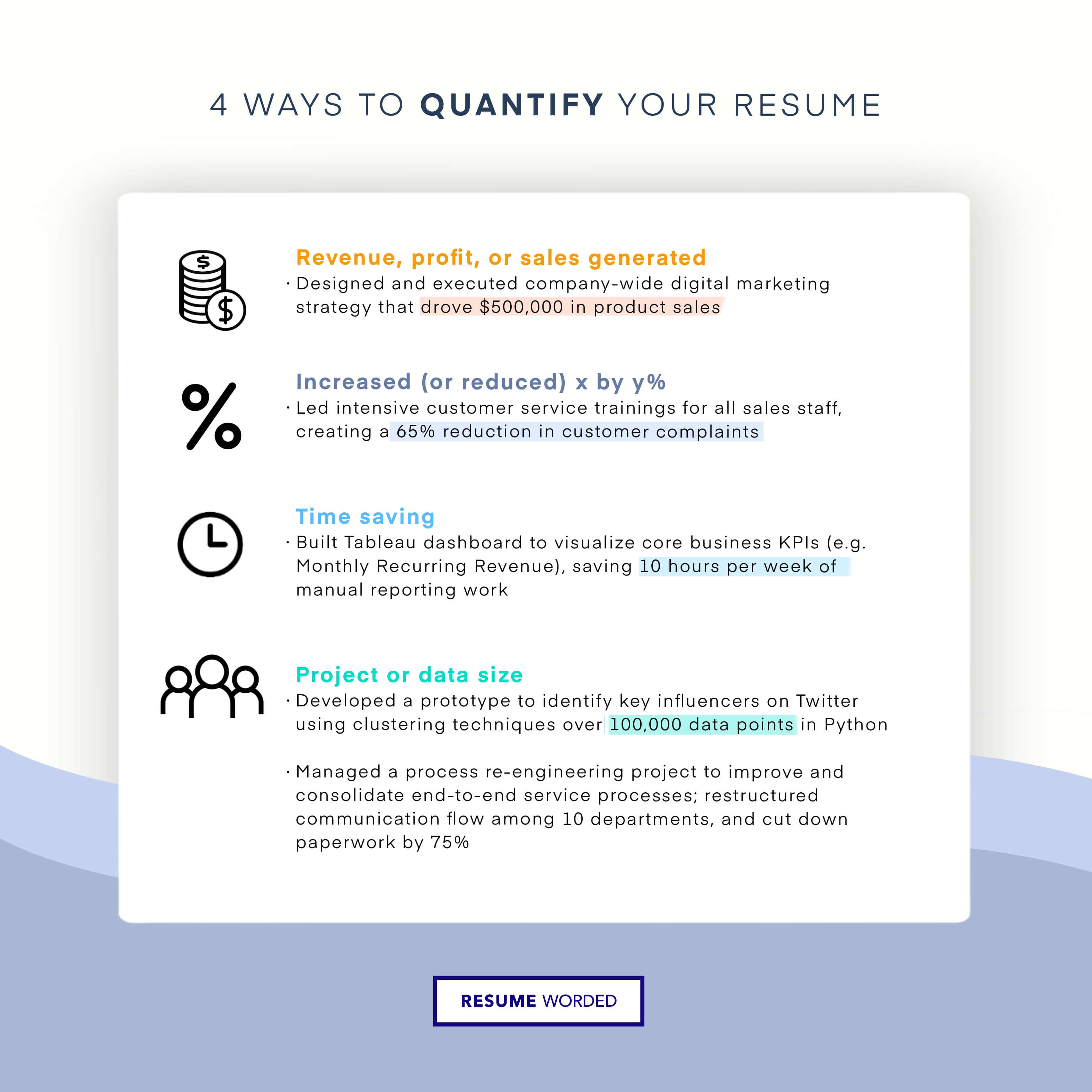
Template 13 of 42: Psychiatric Nurse CV Example
Psychiatric nursing is a deeply satisfying career, where you make a real difference in people's lives. It's a job that requires compassion, patience, and a deep understanding of human psychology. Medical advancements in mental health have been many, with more focus shifting towards holistic care, involving psychotherapy, prescription management, and integrated care plans. When crafting your CV, you need to position yourself as a compassionate caretaker and a competent medical professional. Remember, psychiatric nursing isn't just about administering medication; it's about understanding the patient's needs, building rapport, and working towards improvement and recovery.
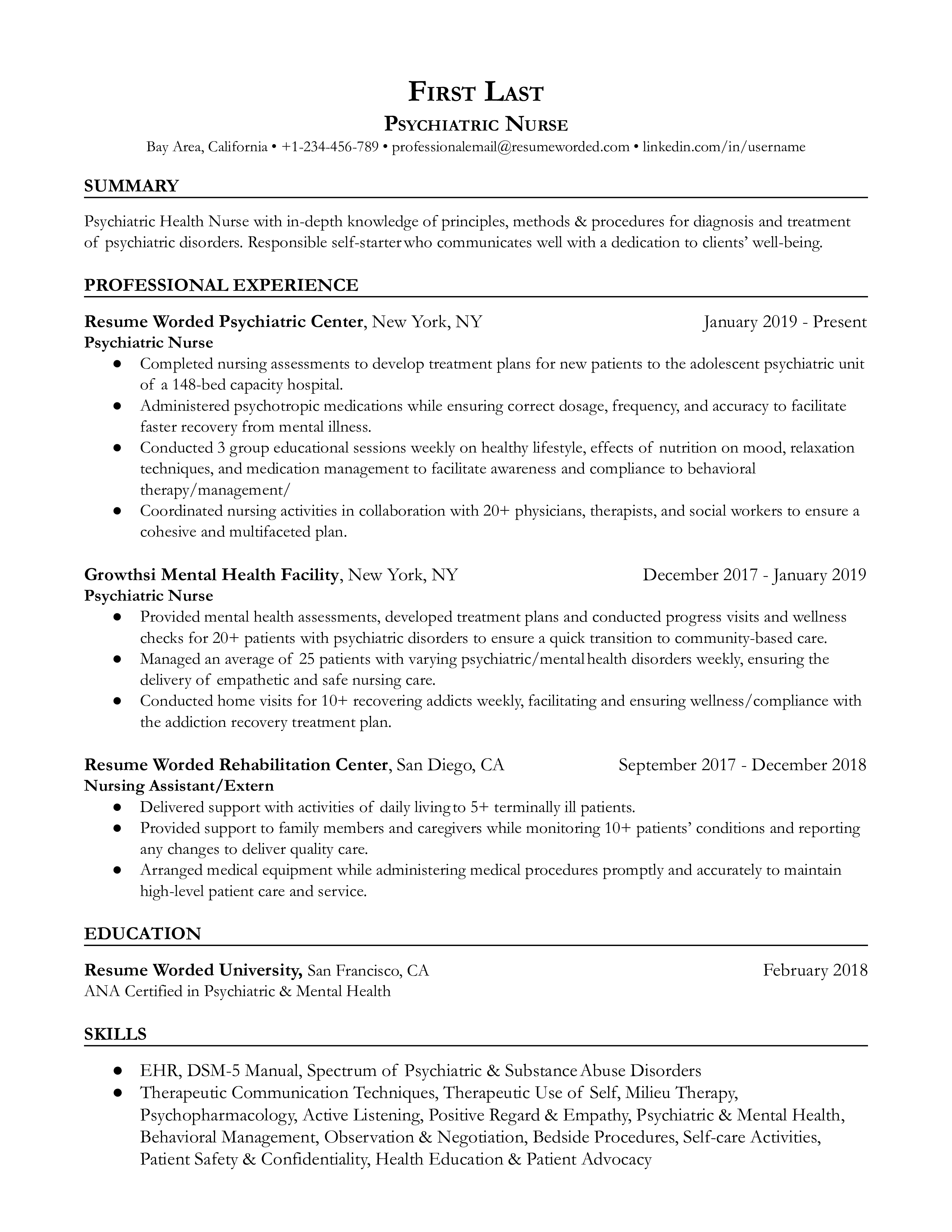
Showcase your knowledge of mental health disorders
You should clearly outline your ability to diagnose, care for, and monitor patients with mental health disorders. This will show potential employers that you are knowledgeable about disorders like depression, bipolar disorder, schizophrenia, and others, which is crucial in this role.
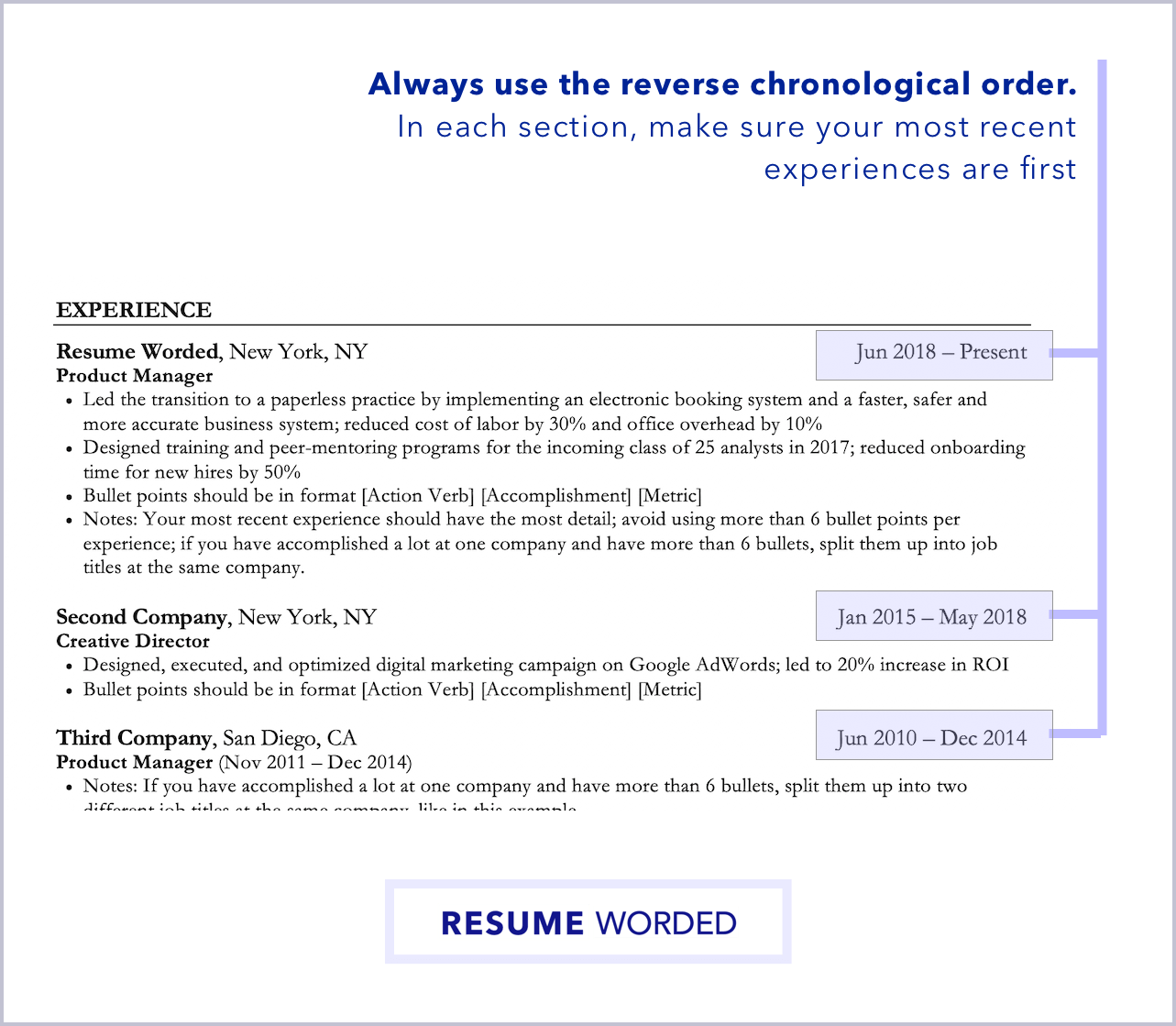
Highlight psychotherapy and counseling skills
As a psychiatric nurse, you're expected to provide psychotherapy and counseling to patients. So, mention the different therapy techniques you're proficient in, such as Cognitive Behavioural Therapy or Dialectical Behavior Therapy. This will showcase your versatility and readiness to handle diverse patient needs effectively.

Template 14 of 42: Nurse Case Manager CV Example
As a Nurse Case Manager, you're the glue that binds healthcare teams, patients, and their families. You're a maestro coordinating complex, multi-disciplinary care plans. Recent trends see hospitals preferring Nurse Case Managers with certified case management training, signaling a shift towards specialized, high-quality care. In crafting your CV, it's important to spotlight your ability to navigate complex care scenarios with empathy, professionalism, and technical prowess. The landscape of case management is becoming increasingly digital too. Tech-savvy nurses adept at using telehealth and electronic health records are highly desirable. So, your CV should echo this change by showcasing your digital literacy alongside your clinical and case management skills.
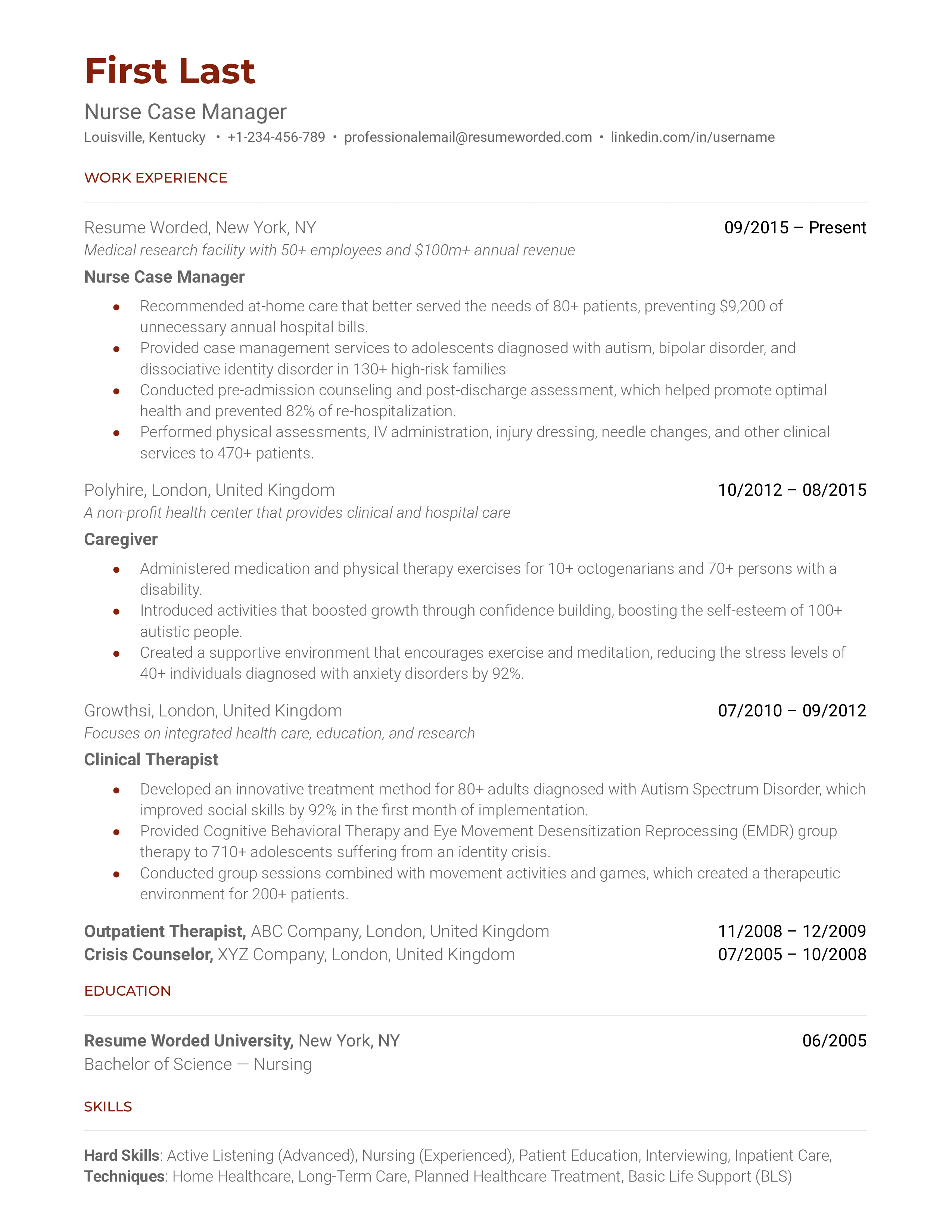
Tips to help you write your Nurse Case Manager CV in 2024
detail your case management certifications.
Certified Nurse Case Managers are in high demand. Show them you're up-to-speed with industry standards by dedicating a section to your certifications. Include the title, issuing organization, and date of receipt. If you're preparing for an exam, mention that too.
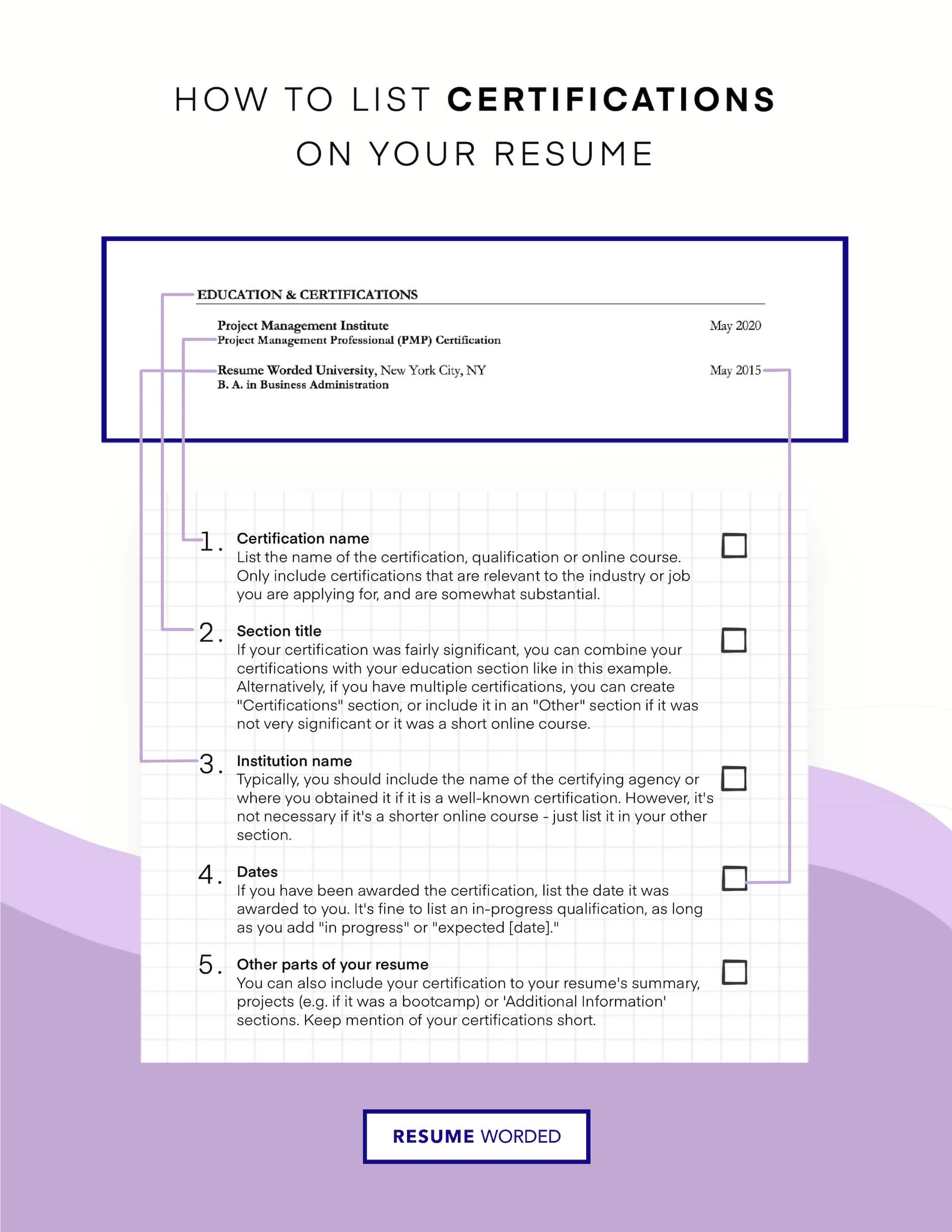
Demonstrate your digital proficiency
The healthcare industry is shifting towards digital platforms. Hence, you should clearly outline your experience with electronic health records or telehealth platforms. Mention specific software you've used and how it has improved patient care or team communication.
Skills you can include on your Nurse Case Manager CV
Template 15 of 42: nurse case manager cv example.
As a Nurse Case Manager, you'll play a vital role in healthcare coordination, ensuring patients receive the right care at the right time. This unique position requires a blend of clinical expertise, superior communication skills, and an understanding of case management principles. Increasingly, employers are emphasizing team collaboration and inter-departmental coordination, as a reflection of broader trends towards integrated healthcare. Your CV needs to reflect these abilities, and more importantly, translate your nursing skills into a context of case management. Put simply, your CV must demonstrate that you're not just a great nurse, but also an effective case manager.
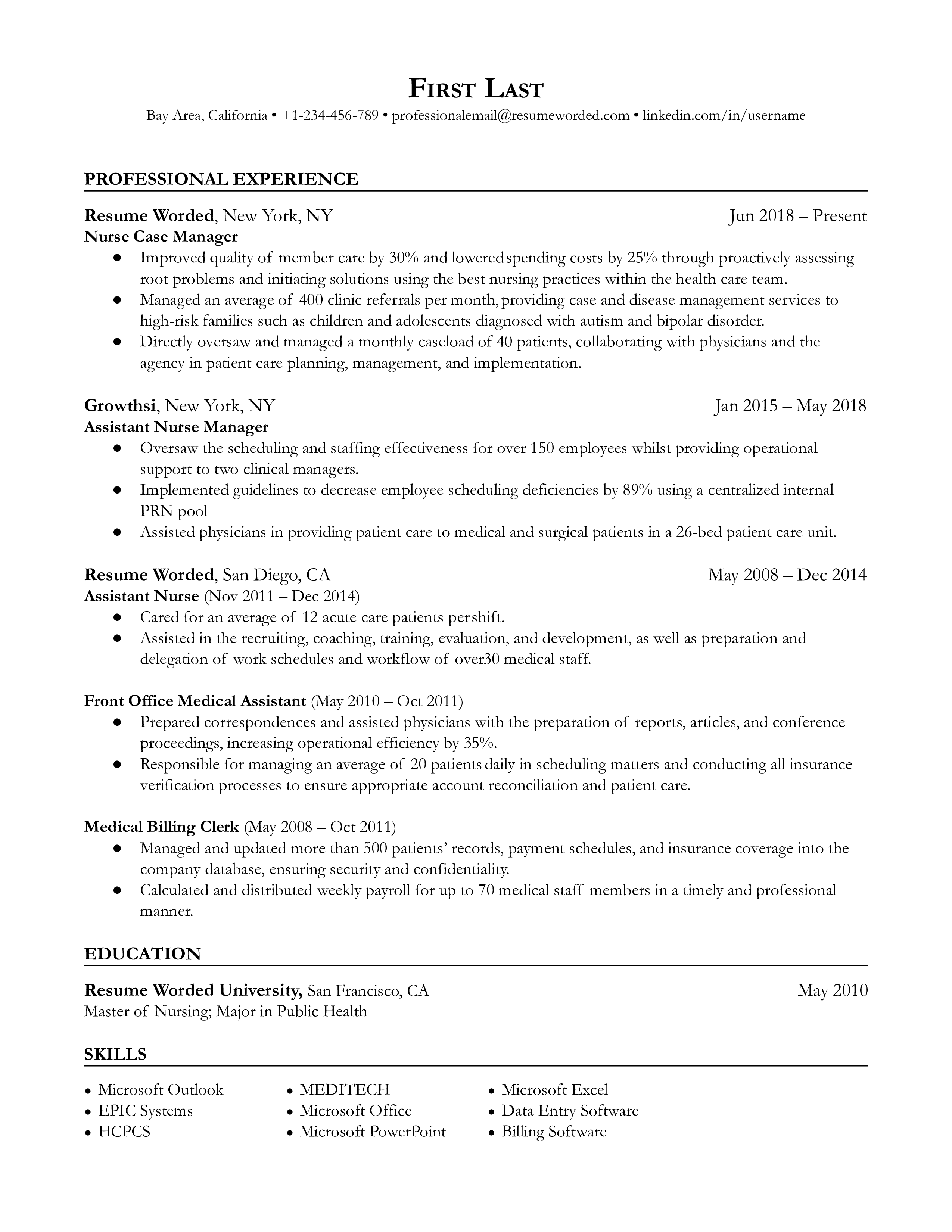
Include patient advocacy achievements
One of the hallmarks of a Nurse Case Manager is patient advocacy. On your CV, showcase instances where you've significantly impacted a patient's healthcare journey. Maybe you coordinated a complex discharge plan or challenged a treatment decision that resulted in improved patient outcome.
Showcase interdisciplinary collaboration
Case management frequently requires you to liaise with various healthcare professionals. Include any experience of working in multidisciplinary teams or situations where you successfully navigated a bureaucratic system to secure patient care resources.
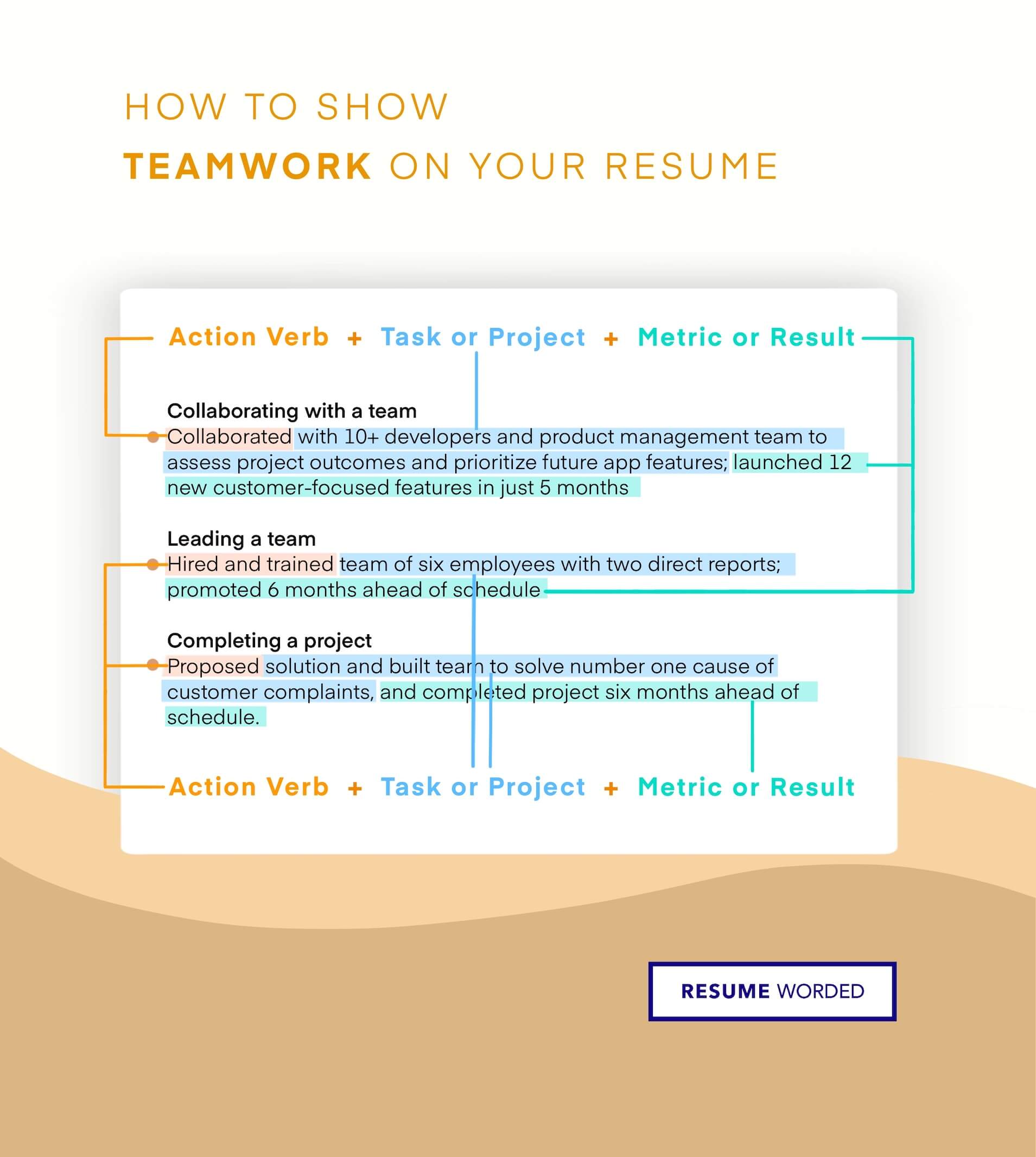
Template 16 of 42: Nurse Case Manager CV Example
As a Nurse Case Manager, you are the bridge between patients, healthcare providers, and insurance companies. Your expertise in patient care, medical terminology, and understanding of insurance processes is vital to ensuring that patients receive the necessary care within the parameters of their insurance coverage. More and more, companies are leaning towards candidates who demonstrate strong leadership skills, as the role often requires leading teams and coordinating across departments. When writing your CV, don't just list your credentials, but also weave in examples of problem-solving and effective communication within complex health systems.
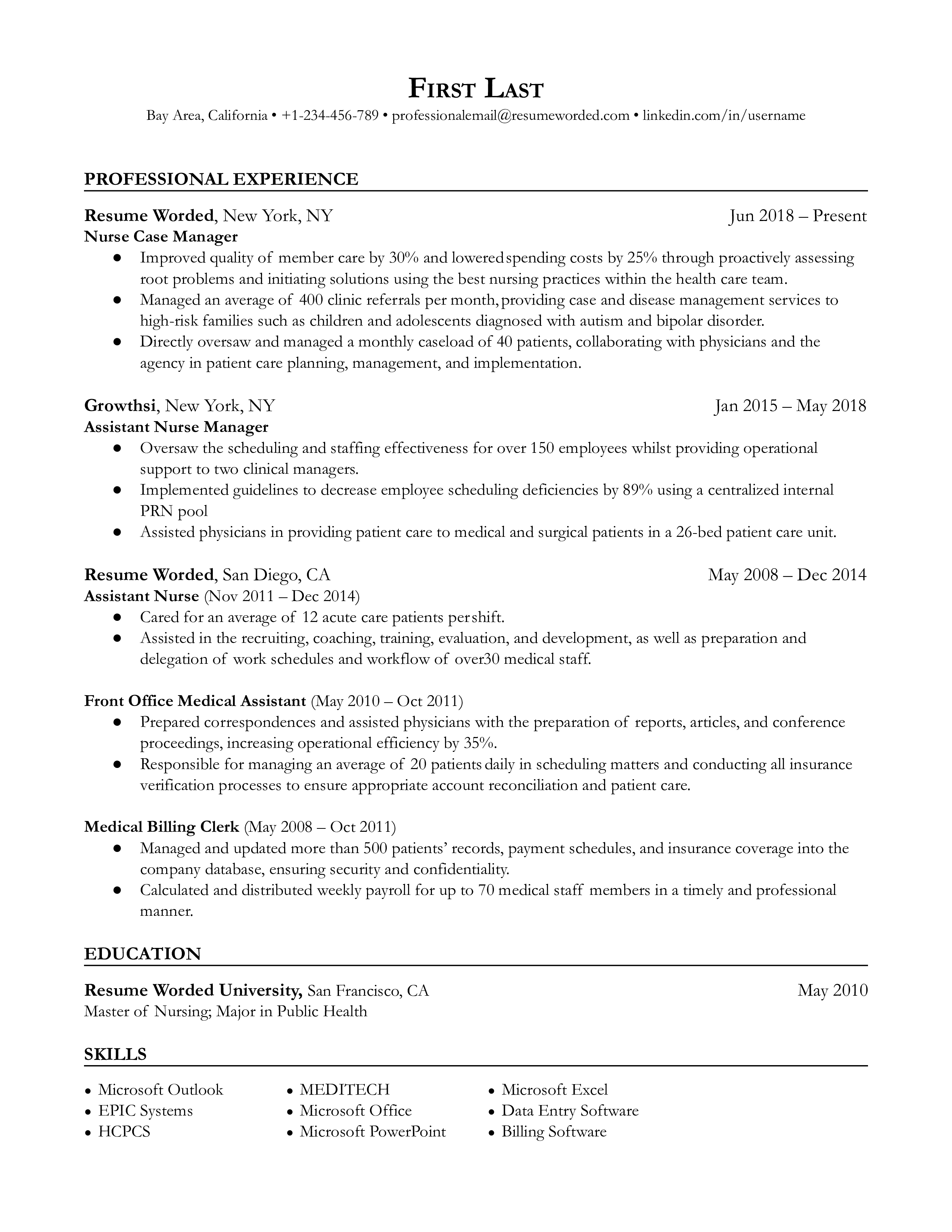
Show your knowledge of healthcare systems
The Nursing Case Manager role often involves navigating complex healthcare systems, so demonstrating your familiarity and experience with these systems on your CV will show potential employers you can hit the ground running.
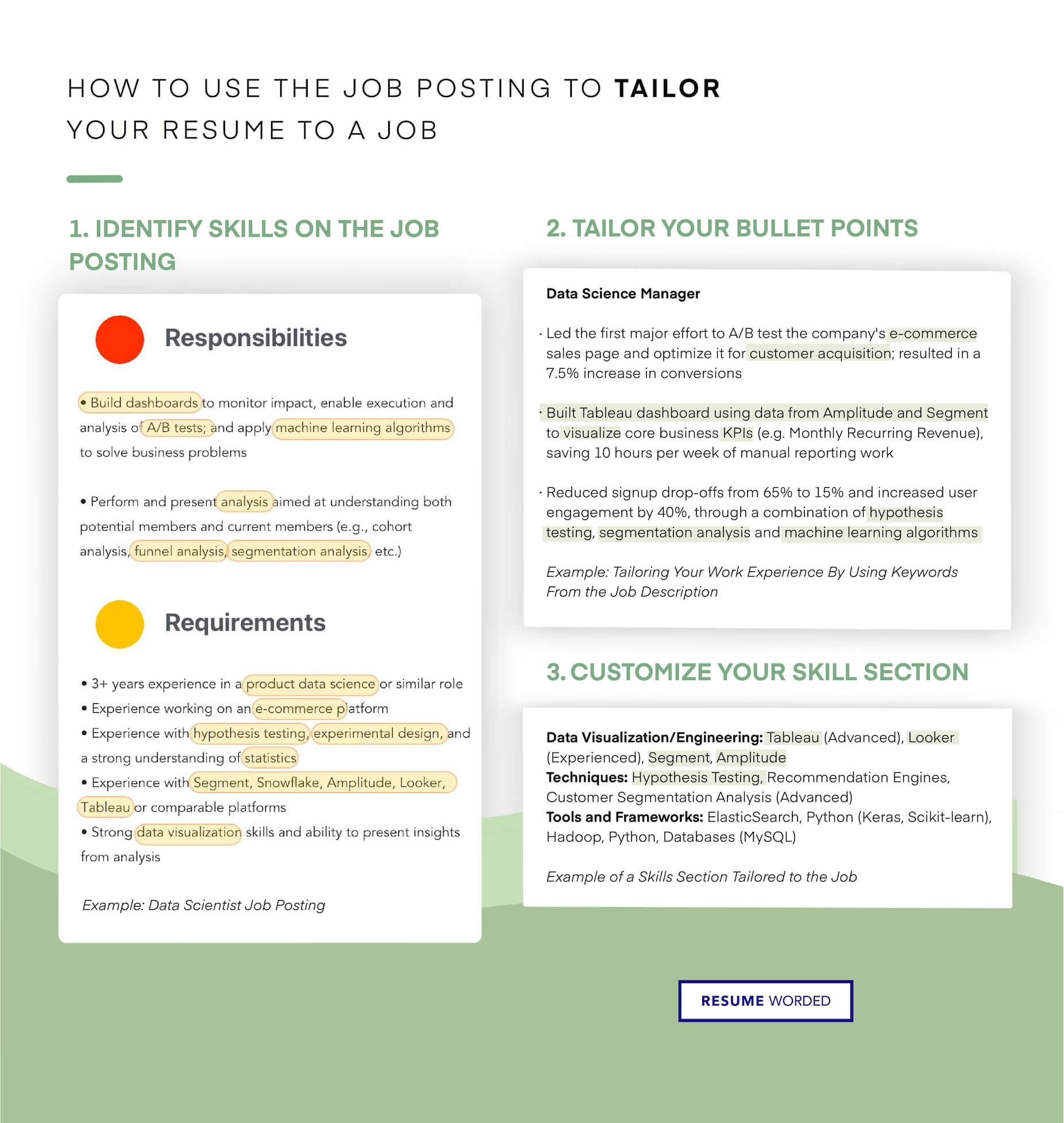
Include specific patient outcome improvements
This position is centered around patient care, so any examples of how your involvement directly improved patient outcomes will make you stand out. It might be how you streamlined a process, implemented a new insurance protocol, or managed a difficult case successfully.
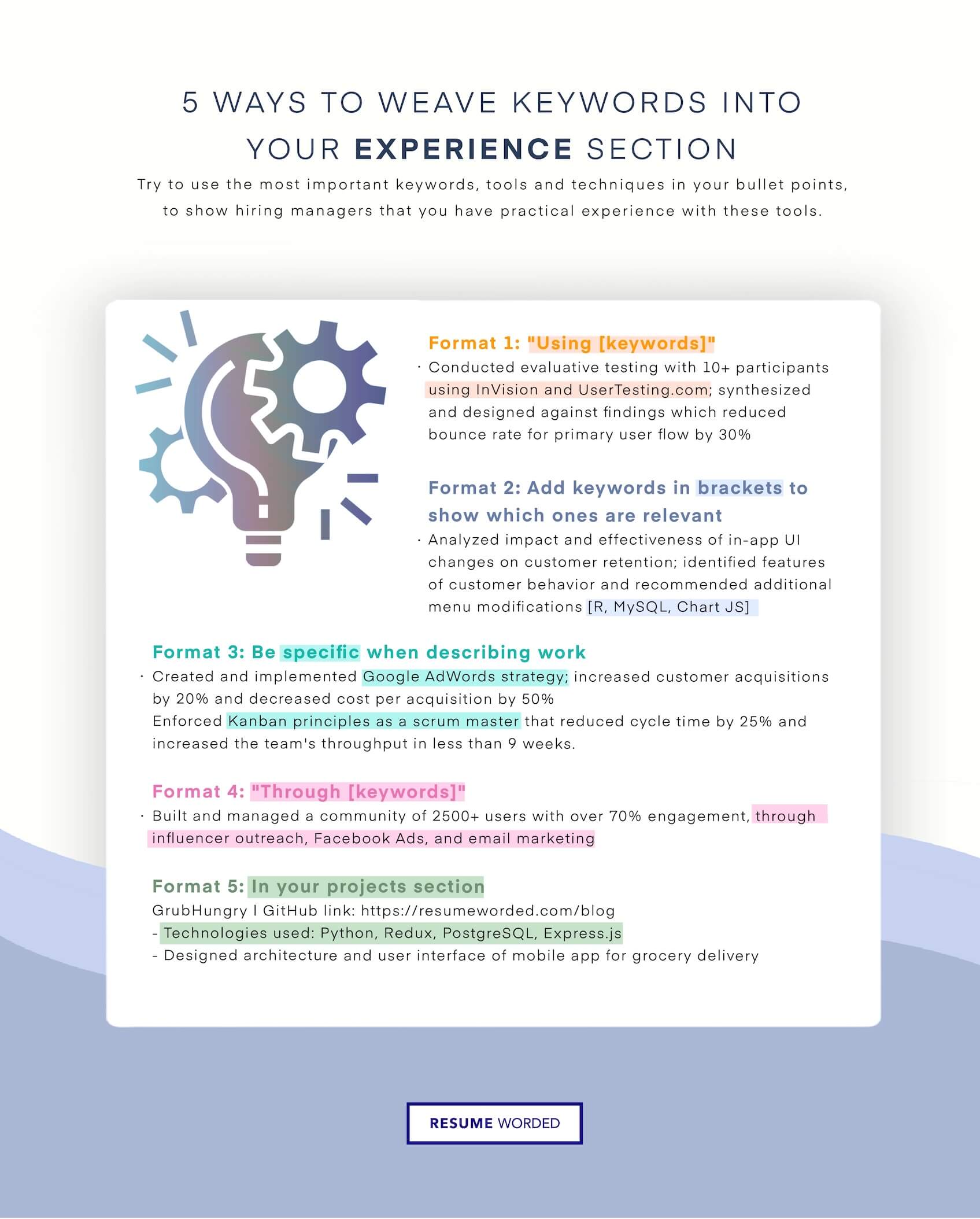
Template 17 of 42: Nursing Student CV Example
As a Nursing Student, your CV is a critical tool for standing out in the highly competitive healthcare sector. Nurses are on the frontlines of patient care, and as a student, you're learning every aspect of this role, from bedside care to administrative tasks. Given the current global health climate, nursing students are in high demand, making it more important than ever to have a standout CV. When writing your CV, remember that it's not just a list of your credentials. It's an opportunity to show potential employers not only the technical skills you've learned, but also the interpersonal skills that are so vital in nursing. Your CV needs to show both clinical and classroom experience, so be specific and focus on your competencies as a future nurse. For example, an increasing number of hospitals are implementing electronic health record (EHR) systems, so if you've learned how to use these in your studies, make sure to include it. The healthcare sector is also placing a greater emphasis on patient-centered care, so any experience you have in communicating effectively with patients is another crucial point to include.

Tips to help you write your Nursing Student CV in 2024
include specific coursework relevant to nursing.
This isn't your average job where you'd only list overall GPA or degree. Include specific coursework that relates directly to a nursing role. This could be Anatomy and Physiology, pharmacology, or a nursing ethics class. By doing so, you're showing a potential employer what skills and knowledge you're bringing to the table.
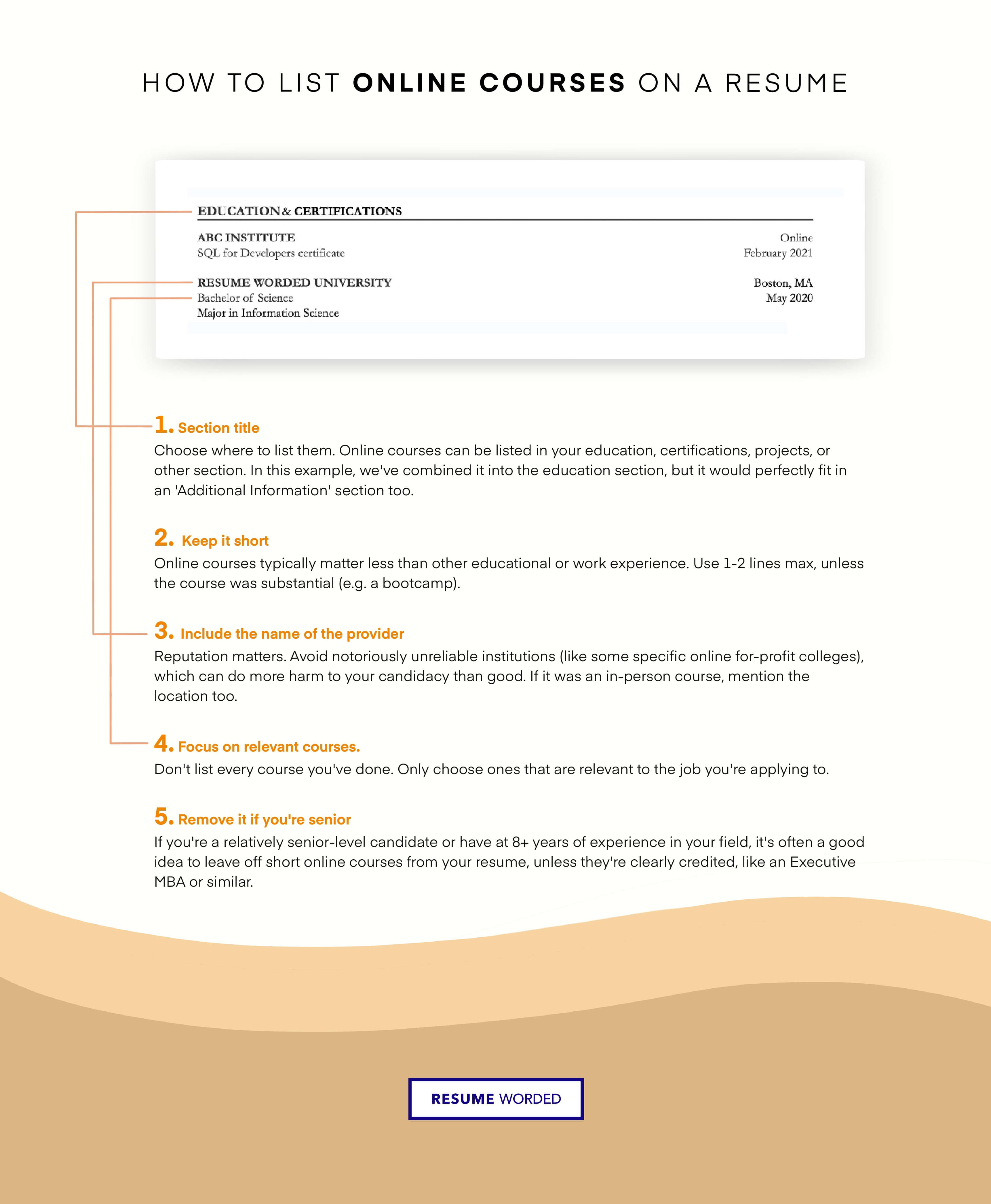
Quantify clinical experience
Whenever possible, quantify your clinical experience in terms of hours spent in different settings like hospitals, clinics, or nursing homes. This shows a potential employer the depth of your practical experience, and also demonstrates your versatility and adaptability in different healthcare environments.
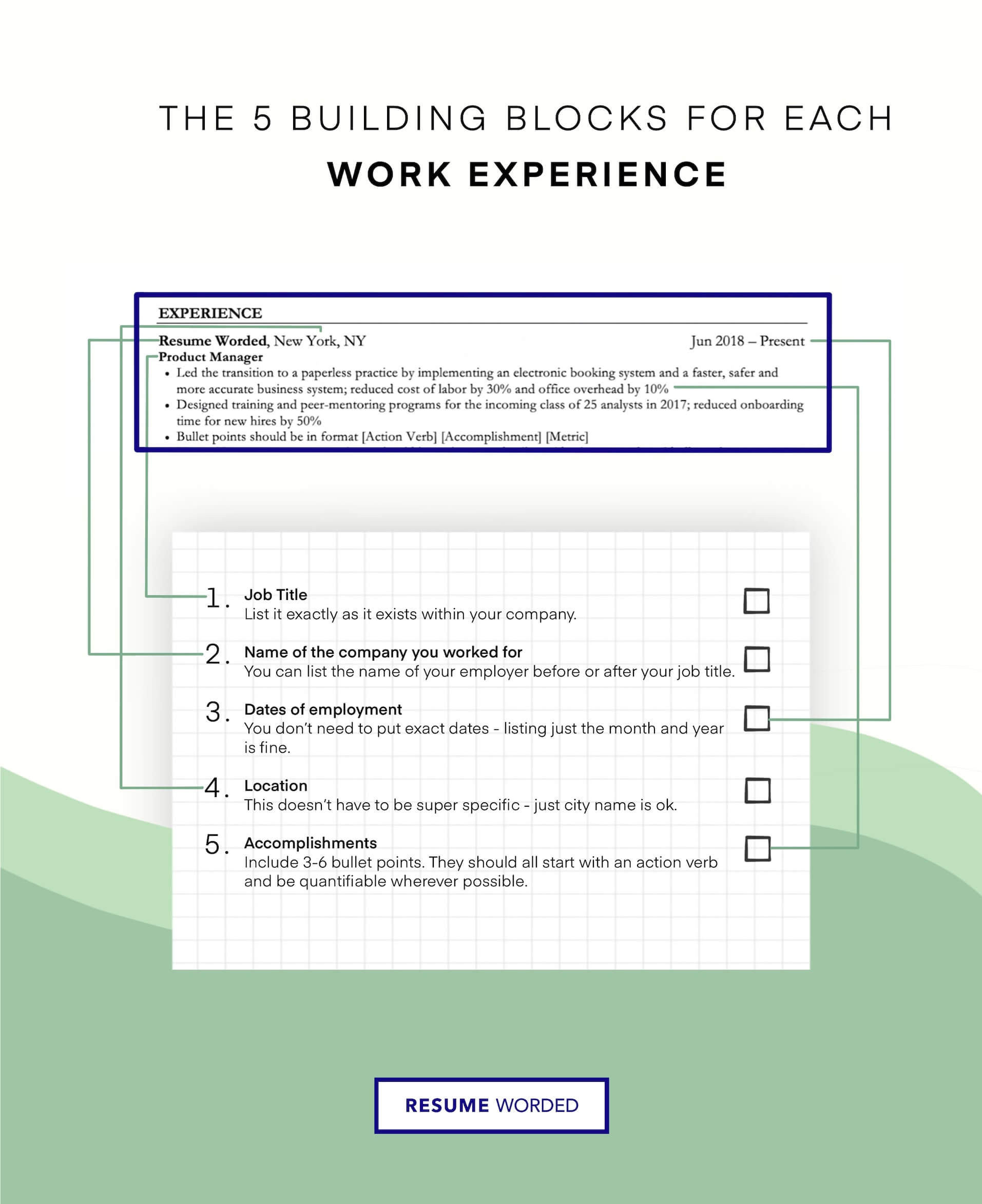
Skills you can include on your Nursing Student CV
Template 18 of 42: travel nurse cv example.
As a travel nurse, you're the healthcare gladiator of the open road, balancing clinical expertise with adaptability. Your CV needs to shout about your flexibility to drop into diverse medical environments, from urban hospitals to rural clinics, and make an immediate impact. The pandemic's shed light on the critical role travel nurses play, resulting in a surge in demand. Reflect this industry trend by detailing how you've stepped up, delivered excellent patient care in challenging locations, and navigated unfamiliar health systems. When writing your CV, remember, it's not just about showcasing your nursing skills—it's about painting a picture of your adaptability, resilience, and passion for providing care wherever it's needed.
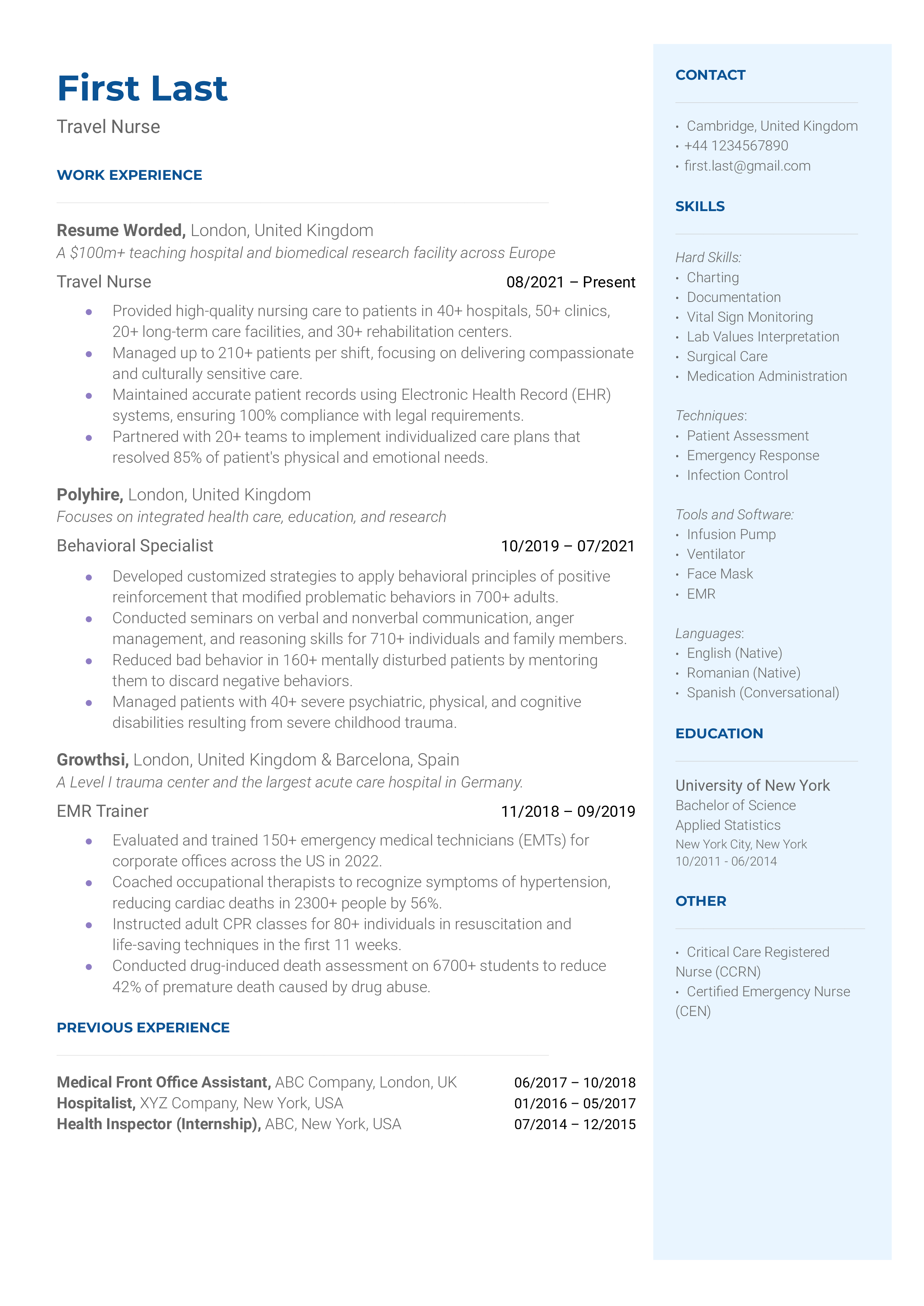
Tips to help you write your Travel Nurse CV in 2024
detail your adaptability across healthcare settings.
This isn't a one-hospital gig, so your CV should demonstrate your capacity to hit the ground running in various healthcare settings. Mention specific environments you've worked in, rates of patient turnover, and unique challenges you've overcome.
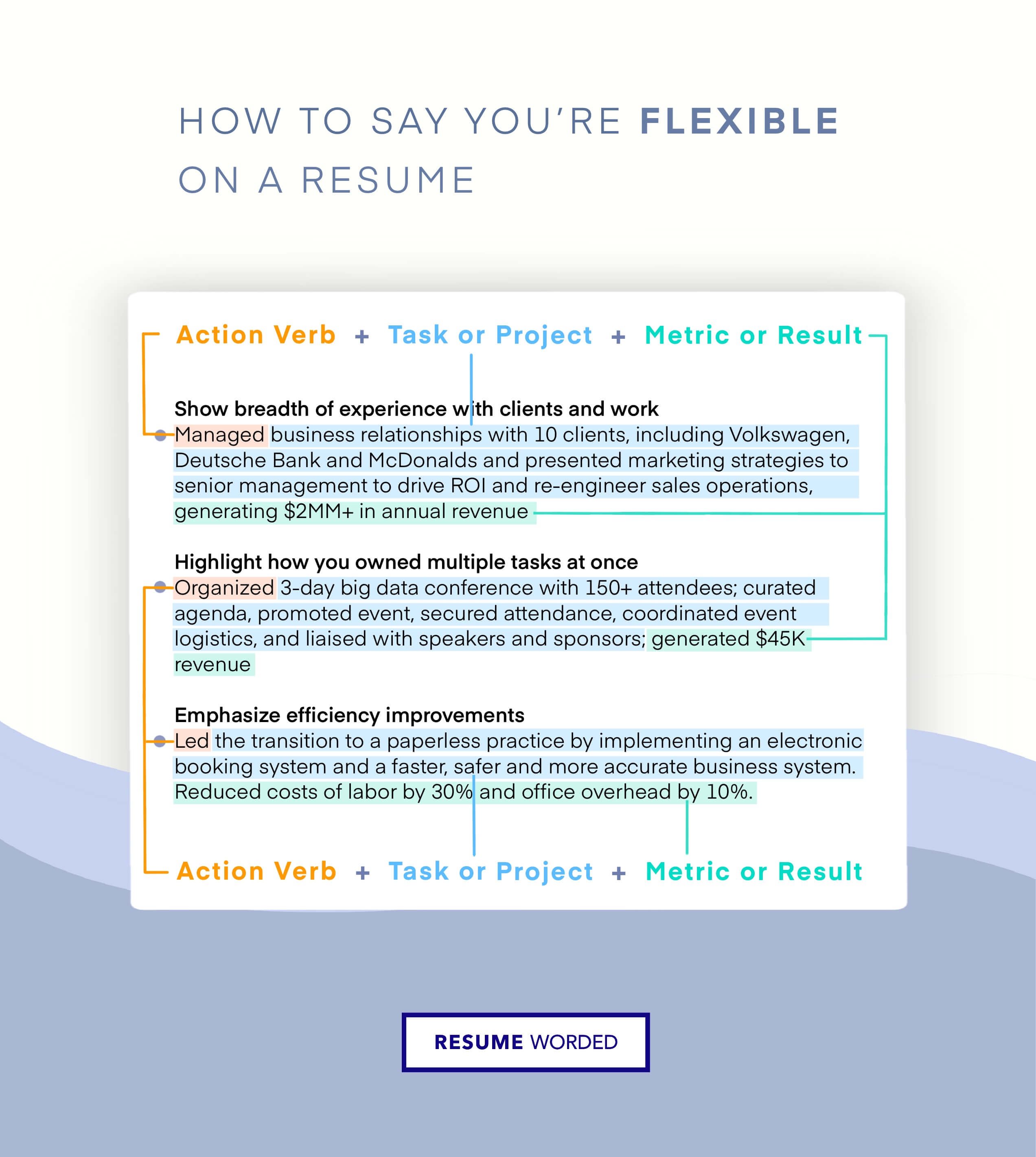
Showcase your ability to learn health systems quickly
As a travel nurse, you're frequently thrust into new health systems. Show you can swiftly understand and comply with different protocols, regulations, and electronic health records systems. Draw on examples where you've had to quickly get up to speed with minimal hand-holding.
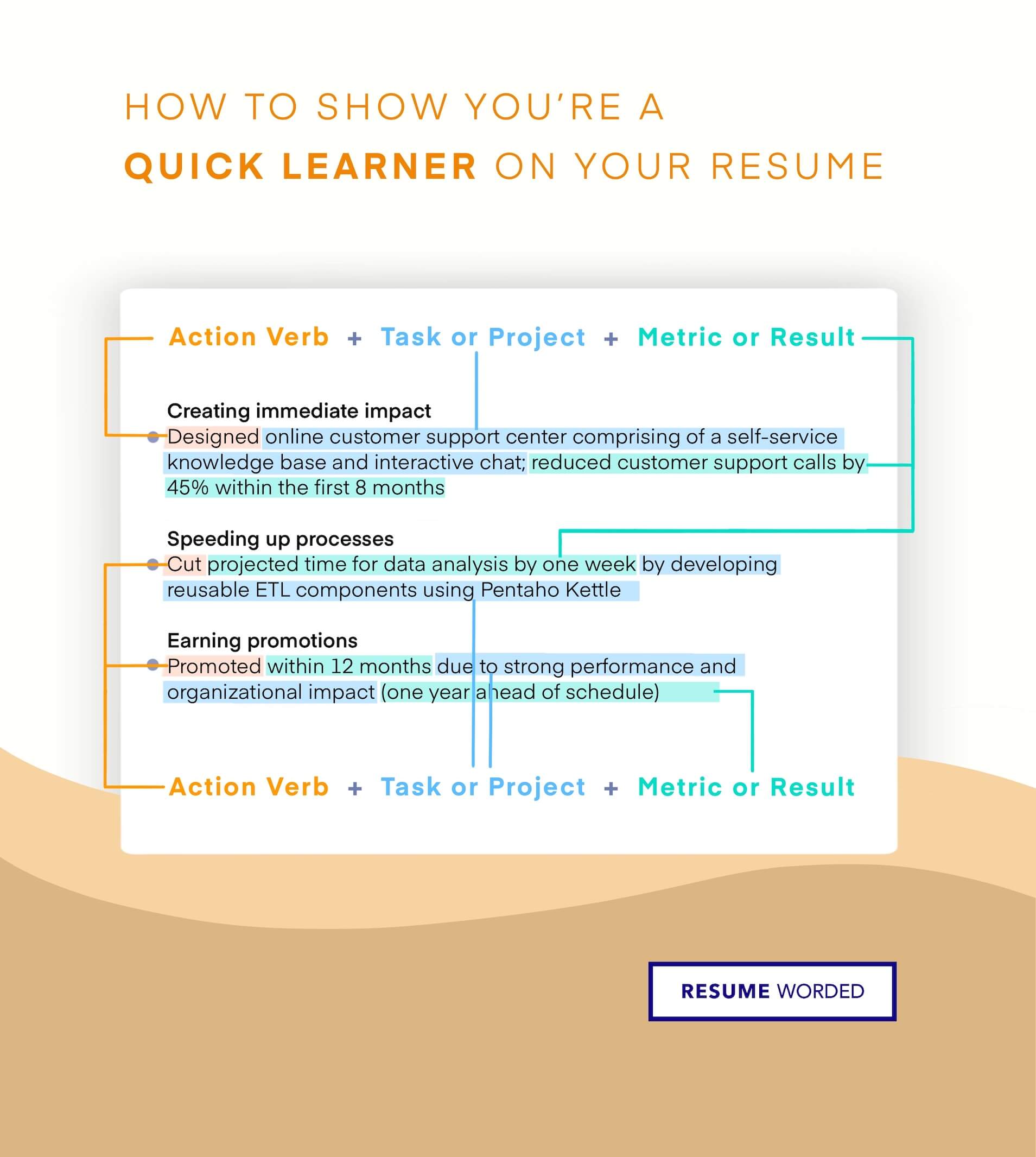
Skills you can include on your Travel Nurse CV
Template 19 of 42: travel nurse cv example.
As a travel nurse, your CV has a life as adventurous as yours. What's unique about your CV is that it's a chronicle of your journey across multiple locations, diverse medical facilities, and complex health conditions. The recent trend towards telehealth has also seeped into this role, with many travel nurses now handling remote consultations alongside in-person care. When you're preparing your CV, remember it's not a laundry list of your past jobs, but a curated pathway of your professional growth, adaptability, and resilience. In this industry, the demand for travel nurses has skyrocketed, particularly in areas grappling with staff shortages or regional health crises. So, emphasize how you've stepped into the breach in different regions and situations. This isn't just a CV for a job, it's the map of a nursing nomad.
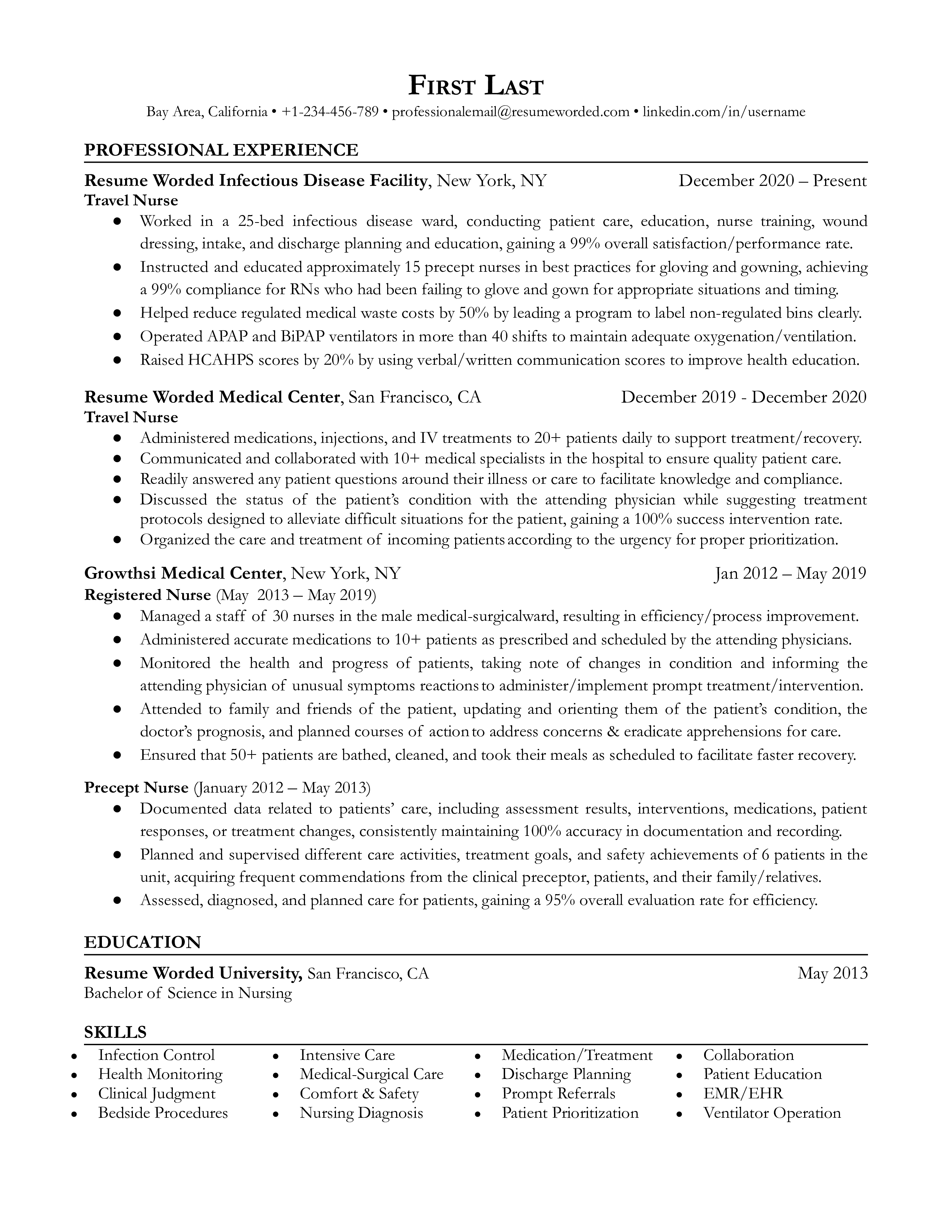
Showcase your adaptability
In your CV, you should spell out how you've adapted to new hospitals, different healthcare systems and varying patient demographics in each of your assignments. Use quantifiable achievements to demonstrate your adaptability, such as the number of facilities you've worked in or the diverse range of medical conditions you've handled.

Highlight telehealth skills
The ability to provide healthcare remotely is increasingly important in the travel nursing profession. In your skills section, ensure that you mention any software or platforms you've used for remote consultations and online patient management. If you have relevant certifications, even better!
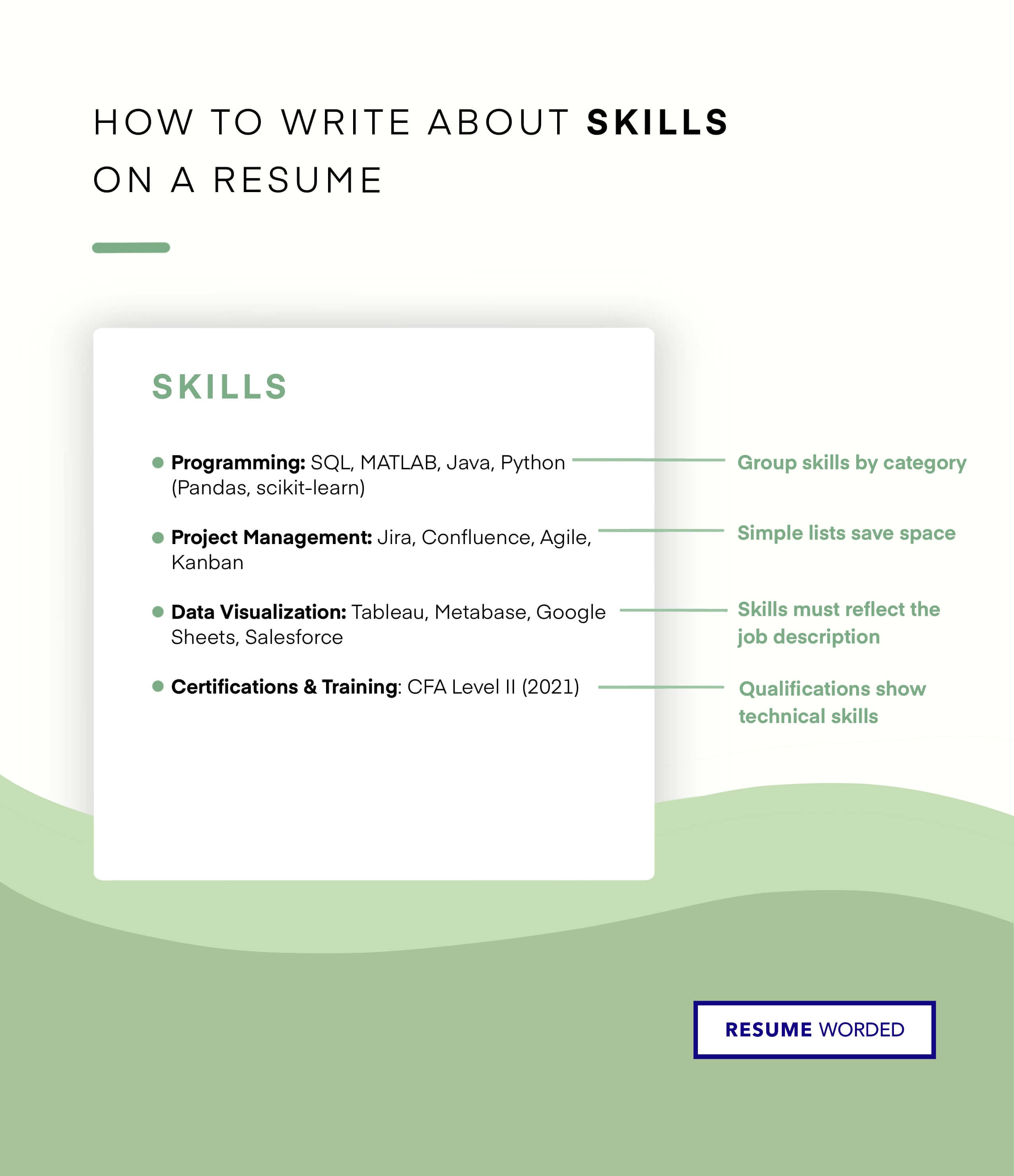
Template 20 of 42: Nurse Practitioner CV Example
Writing your CV for a Nurse Practitioner role is all about showcasing your extensive clinical knowledge, leadership skills, and adaptability. As healthcare continues to evolve rapidly, Nurse Practitioners are being entrusted with greater responsibilities and autonomy, making the job much more multifaceted than before. On one hand, you need to display your proficiency in patient care, and on the other, your capacity to manage teams, innovatively solve problems and incorporate the latest tech advancements, such as telehealth. So, when it comes to your CV, ensure it's a reflection of who you are as a modern Nurse Practitioner.
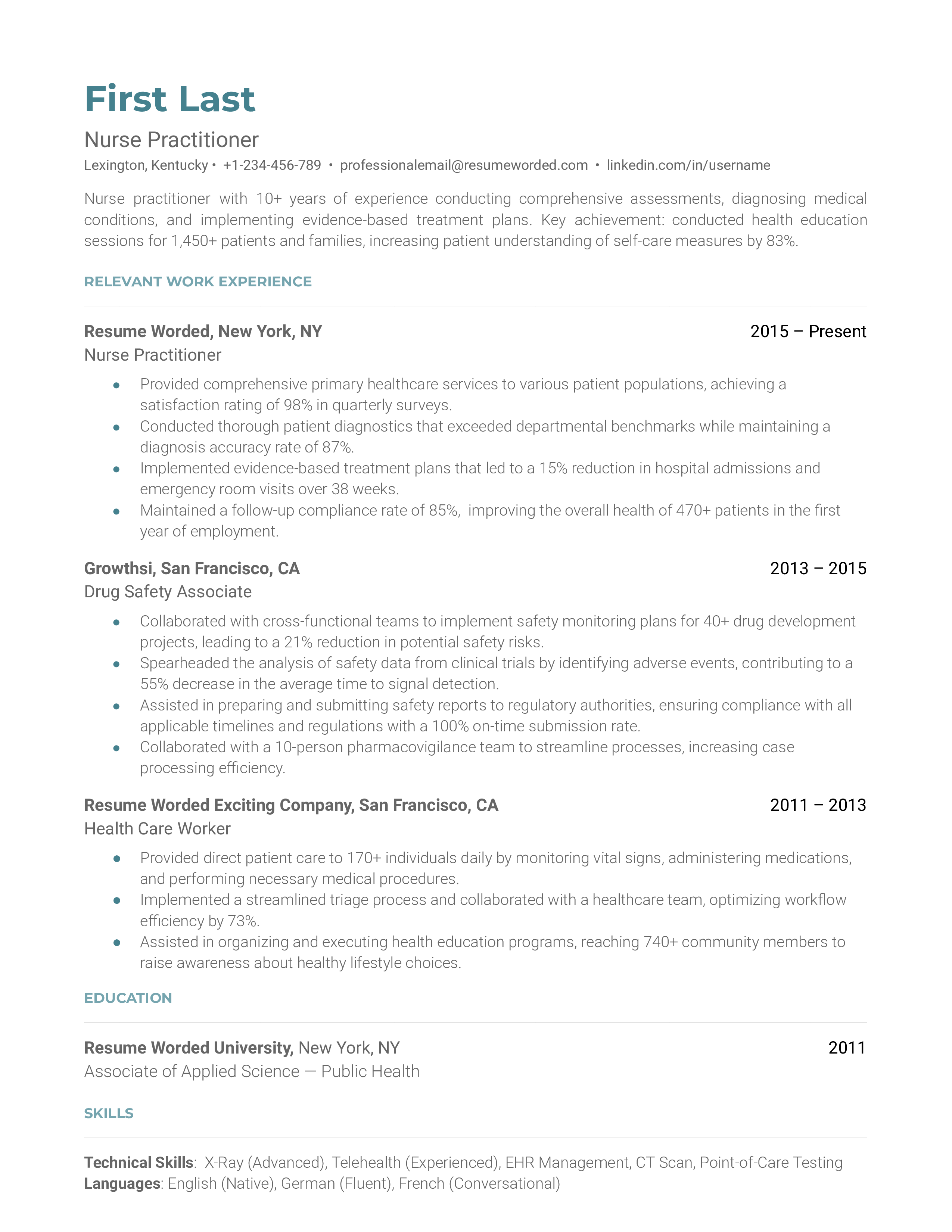
Tips to help you write your Nurse Practitioner CV in 2024
showcase your leadership and management capabilities.
As a Nurse Practitioner, you often have to lead and manage teams, coordinate with doctors and other nursing staff, and supervise patient care. Ensure your CV includes examples of your ability to lead, influence, and manage within a healthcare setting.
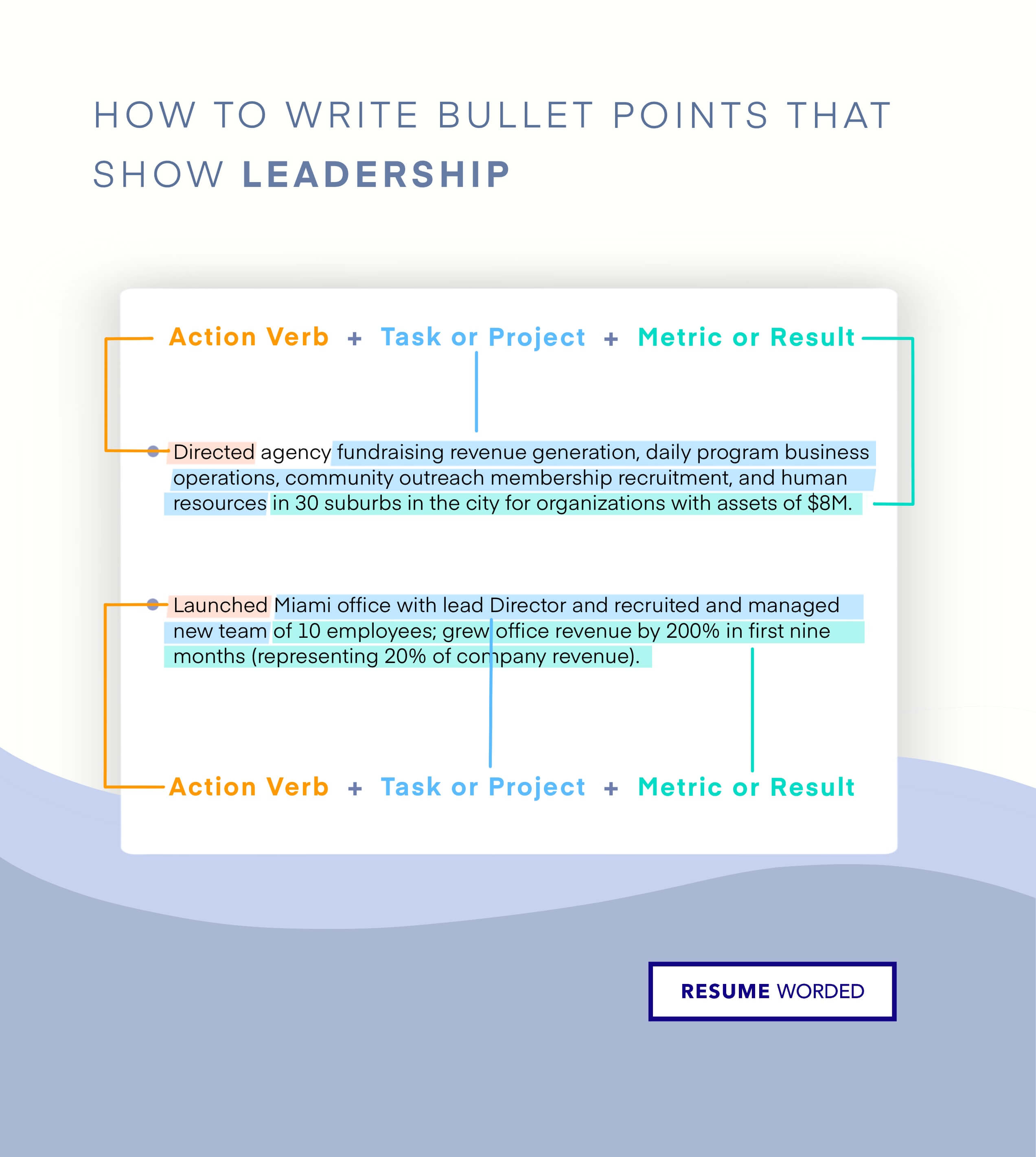
Illustrate your proficiency in emerging healthcare technologies
With telemedicine and electronic health records becoming commonplace, demonstrate your skills in these areas in your CV. Include any specific technologies you're adept at, or instances where you've successfully integrated technology into patient care.
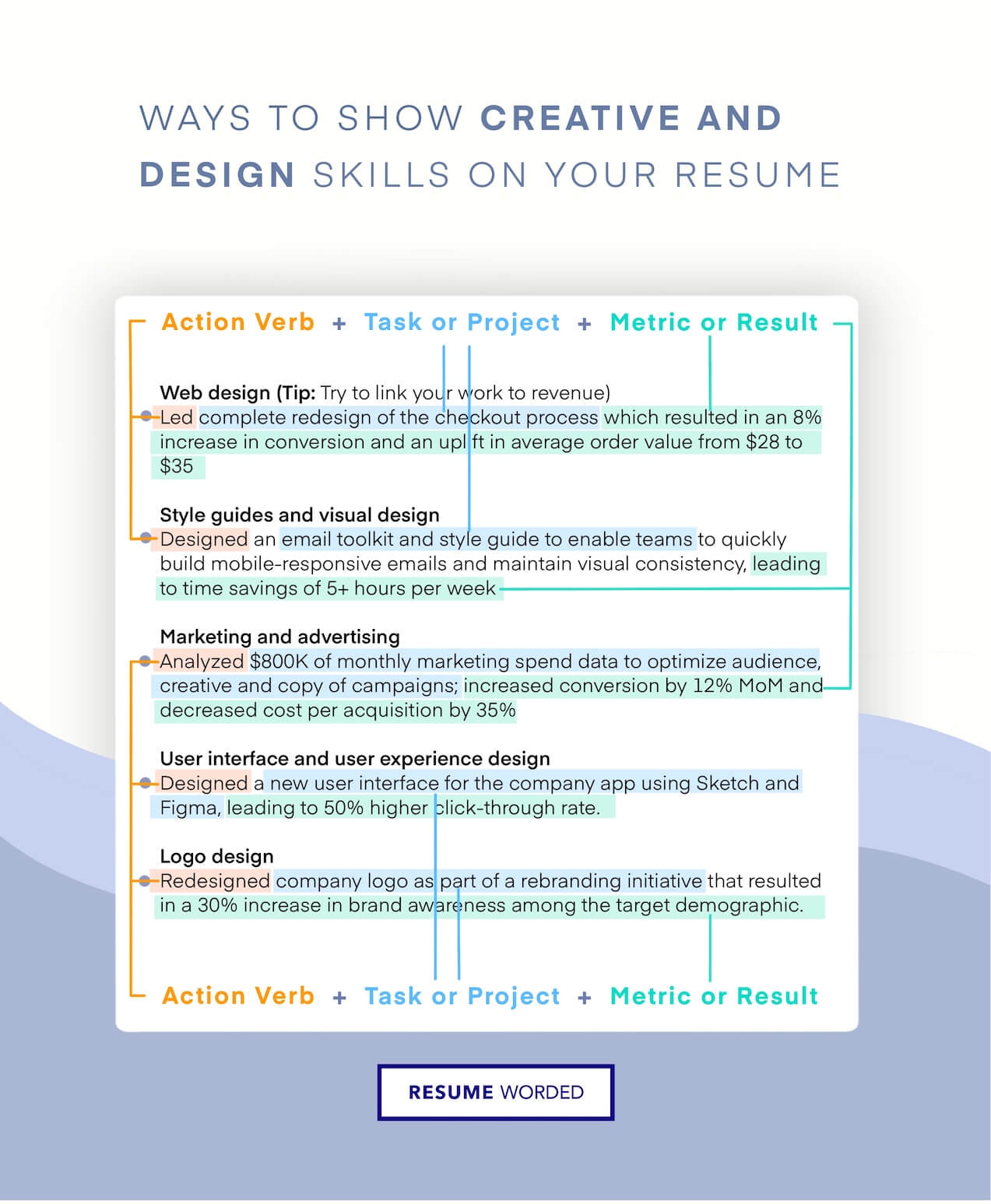
Skills you can include on your Nurse Practitioner CV
Template 21 of 42: nurse practitioner cv example.
As a Nurse Practitioner, your job is rich with opportunities to impact lives directly - making it a satisfying yet demanding role. In recent years, we've noticed that organisations value professionals who showcase adaptability in line with fast-paced healthcare innovations. When writing your CV, understand that employers aren't just looking for your qualifications and experience. They're keen to identify candidates with a genuine passion for patient care and up-to-date knowledge of evolving medical technology and advances. Your CV should go beyond just listing duties performed in past roles. Instead, it should weave a compelling story of your journey as a compassionate caregiver with a sound understanding of modern healthcare practices. This distinction can set you apart from other candidates, grab potential employers' attention, and get you one step closer to that interview.
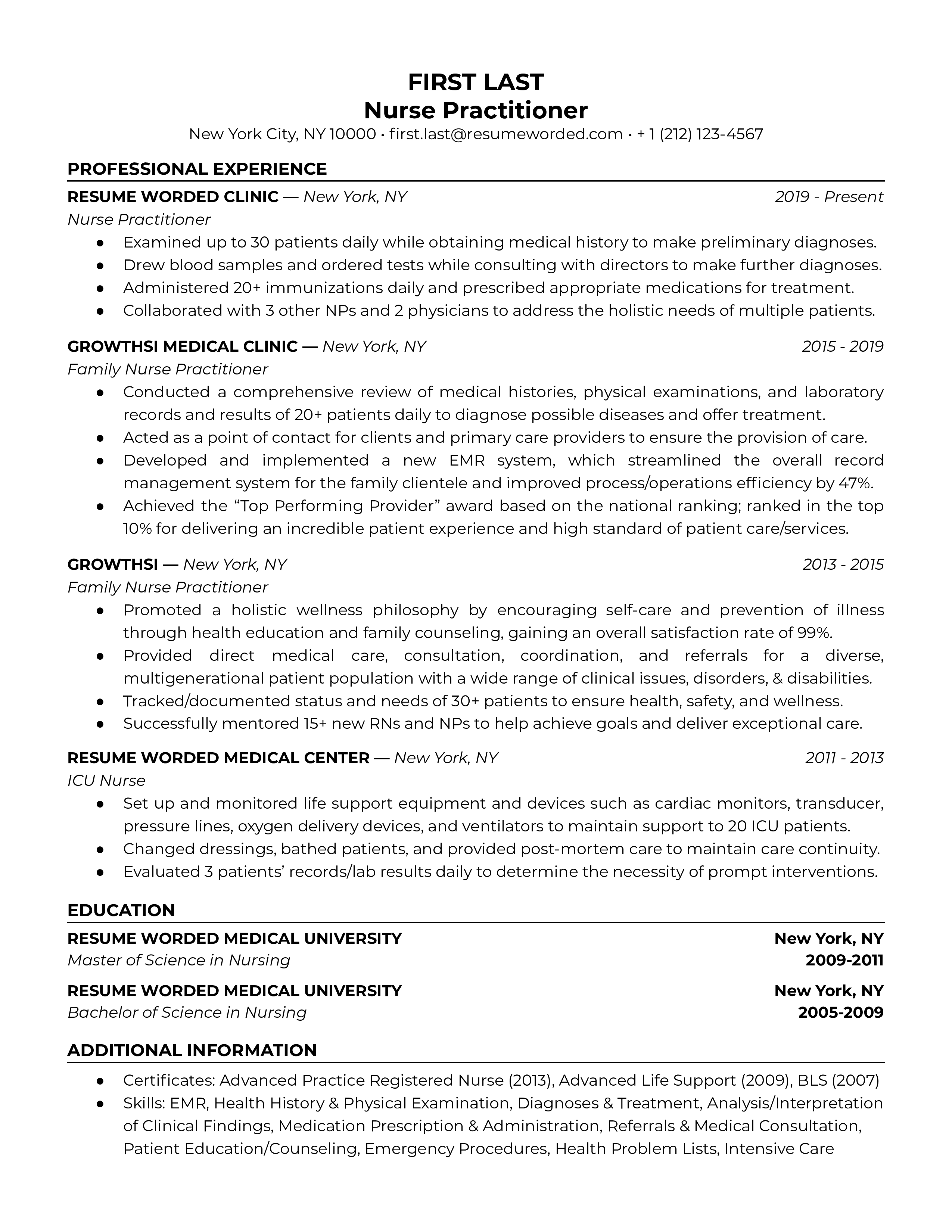
Illustrate proficiency in medical technology
As a Nurse Practitioner, you'll need to handle various medical technologies and software. On your CV, specify the types you're proficient in, from electronic health record systems to diagnostic tools. This will show potential employers that you can comfortably adapt to their technological setup.
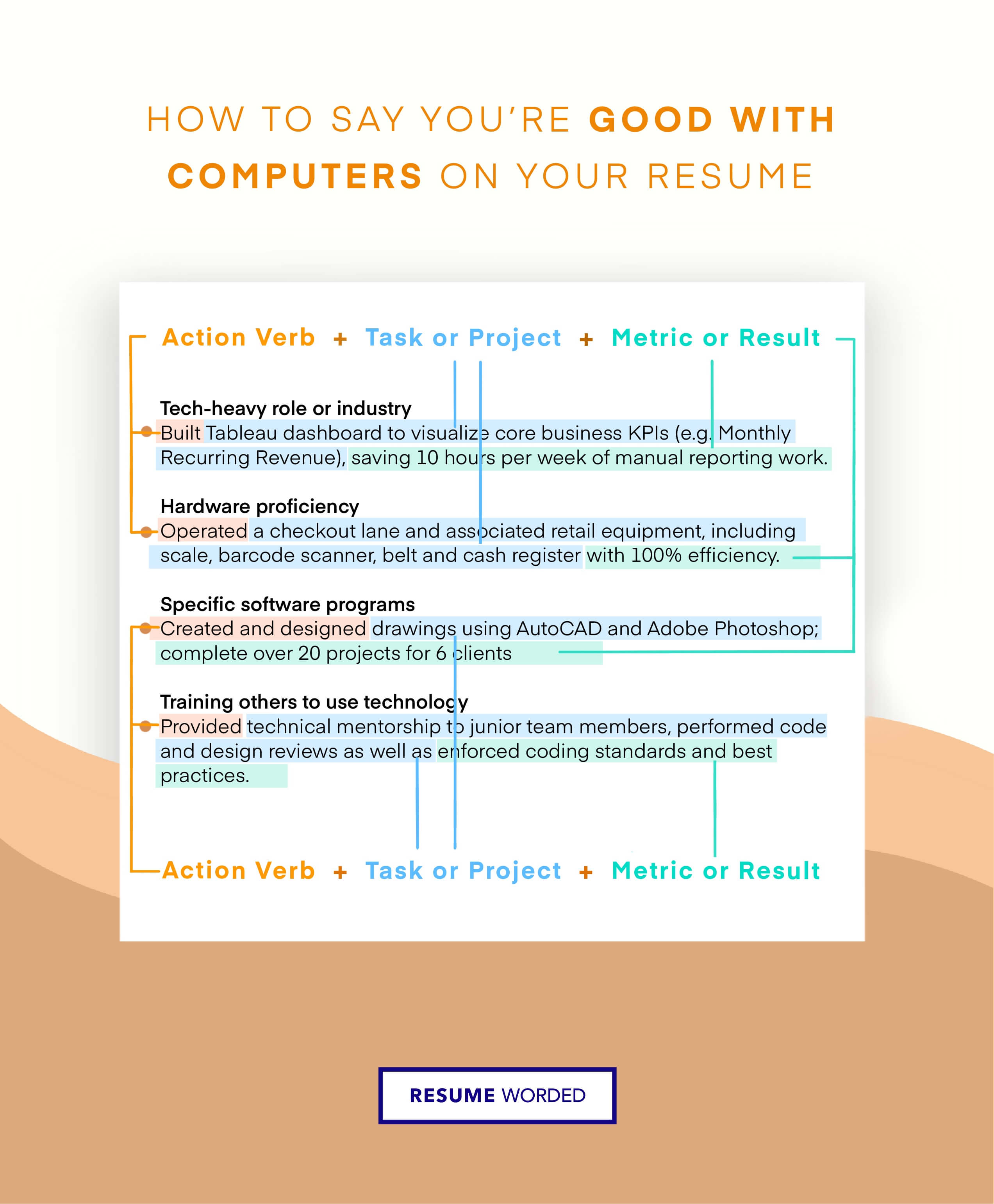
Emphasise patient communication skills
Strong patient communication is an essential part of a Nurse Practitioner's role, often leading to improved patient outcomes. In your CV, share instances where your exceptional interpersonal skills have made a significant difference. This could be patient education initiatives you've led or difficult situations you've navigated with empathy.
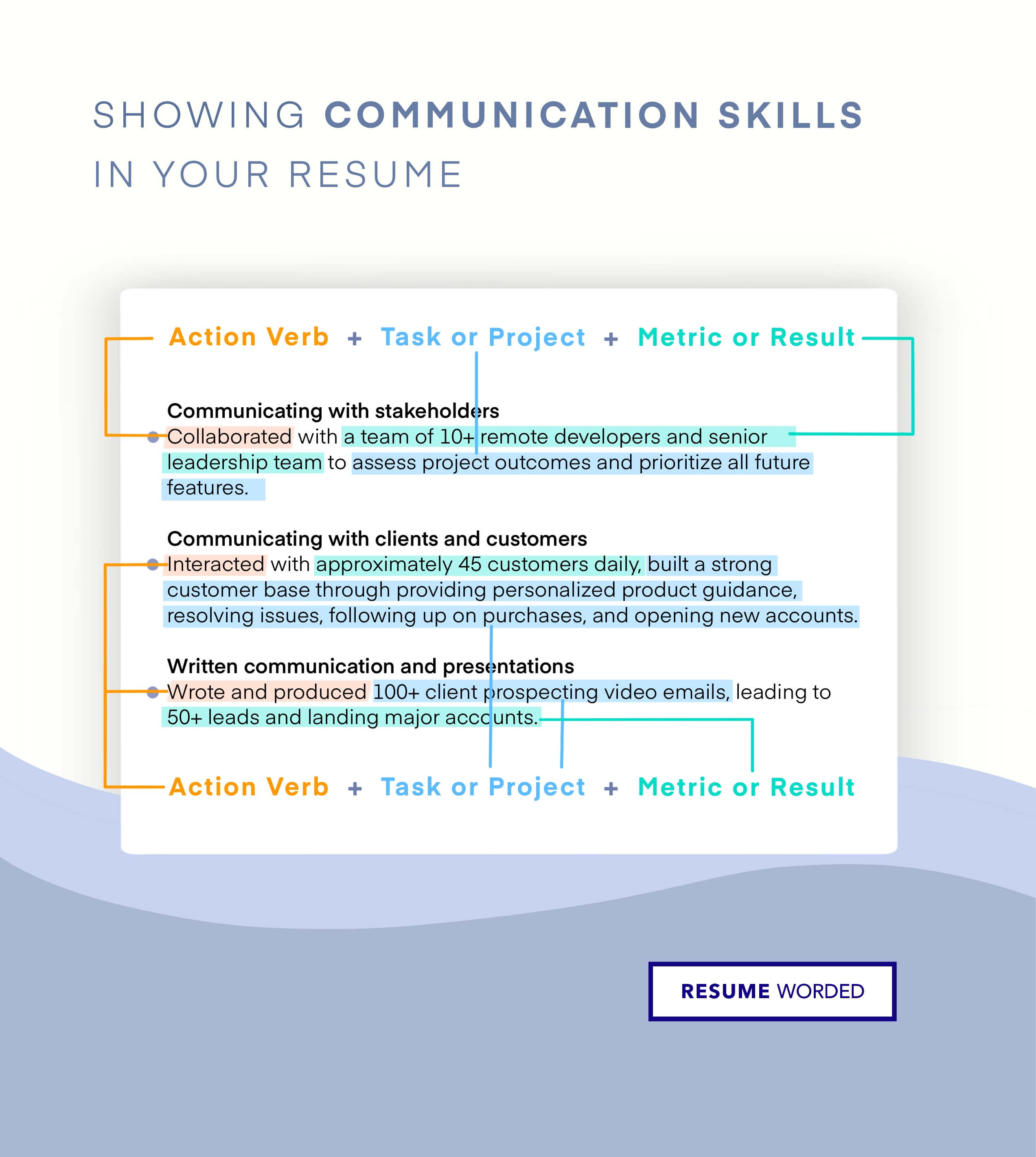
Template 22 of 42: New Grad Nurse CV Example
As a New Grad Nurse, stepping into the professional healthcare world can be quite daunting. Your CV is the key to unlock doors for possible opportunities. Unlike experienced nurses, you'll be showcasing your clinical placements and the practical skills you've honed there. Employers are increasingly searching for candidates who can reflect adaptability and resilience, skills that have become crucial in the face of the recent pandemic. Equally important is communicating your familiarity with new medical technologies as the industry is rapidly digitalizing patient care.
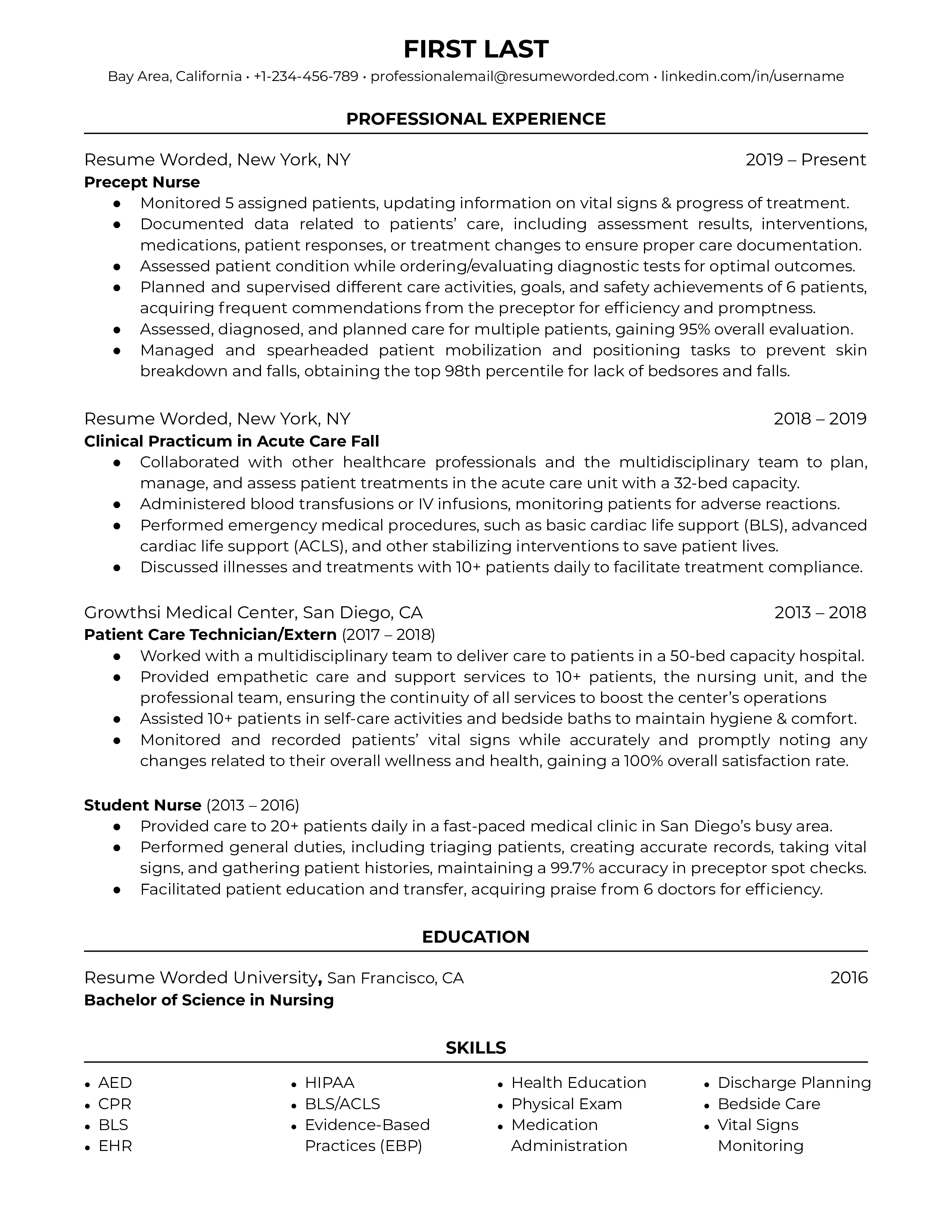
Tips to help you write your New Grad Nurse CV in 2024
show off practical placement experience.
Coming straight from graduation, your nursing placements are your best representation of work experience. Don't simply list where you worked - describe the kind of ward (paediatric, surgical), the tasks you handled, and your patient volume.
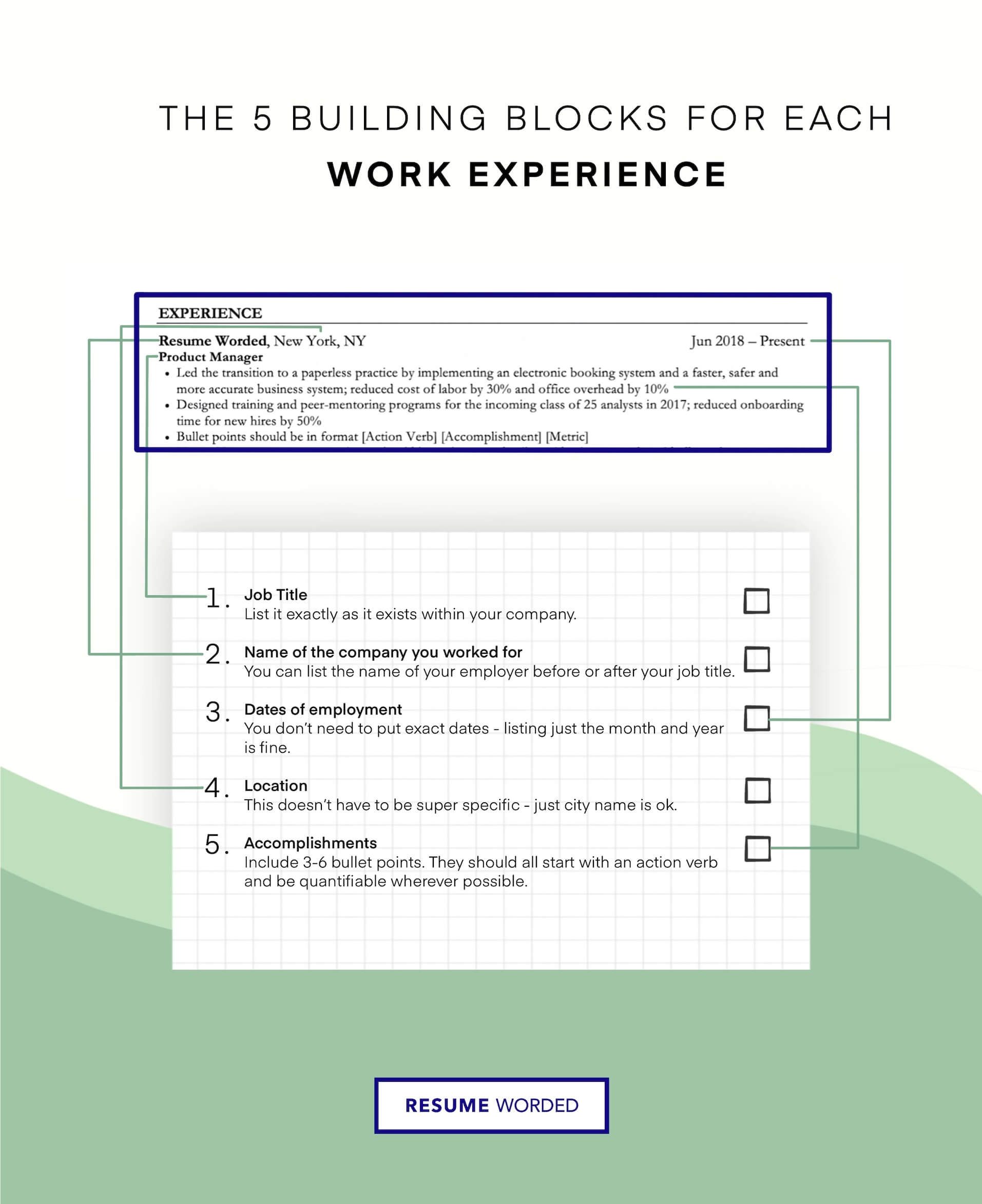
Highlight digital literacy in healthcare
It’s not just about medication administration and patient care anymore. Digital technologies are reshaping healthcare. Demonstrate you can keep pace with this change. Mention any experience with electronic health records or telehealth during your placements.
Skills you can include on your New Grad Nurse CV
Template 23 of 42: new grad nurse cv example.
Entering into nursing as a new graduate is exhilarating, yet it comes with its challenges. With the healthcare sector evolving rapidly, new nurses are often expected to hit the ground running. Moreover, the nursing field can be competitive, and your CV requires a unique blend of clinical knowledge, hands-on experience, and soft skills that matter in patient care. Therefore, crafting a CV that effectively showcases your training, internships, and potential can be the key to landing that first job. It's crucial to tailor your CV to the nursing profession, focusing on the skills and experiences most relevant to the job you're seeking.
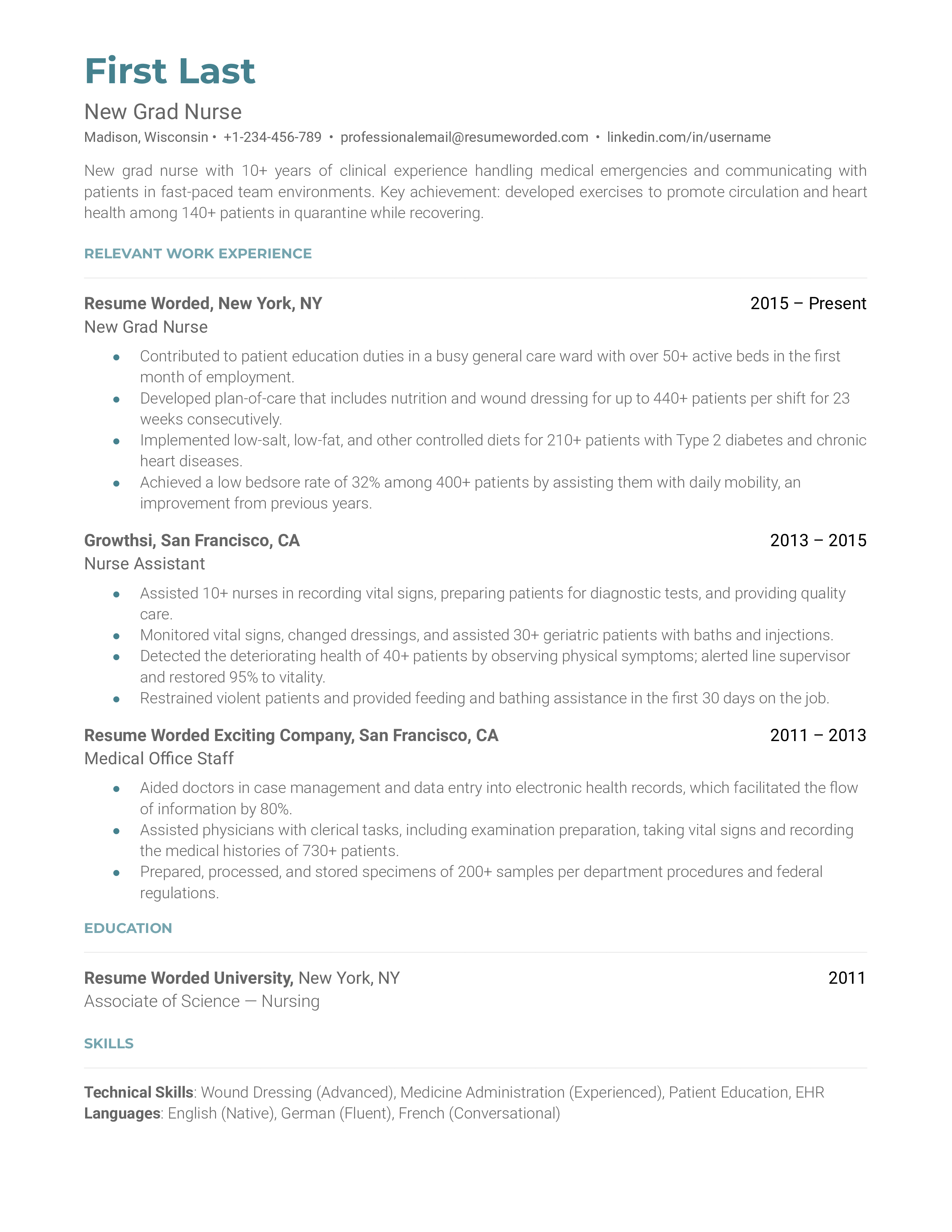
Include Specific Clinical Experience
As a New Grad Nurse, you won't have a wealth of experience, but you should showcase what you do have. Detail your clinical placements during your training. Include the types of care settings, patients you've handled, and any unique or challenging cases that you contributed to managing.
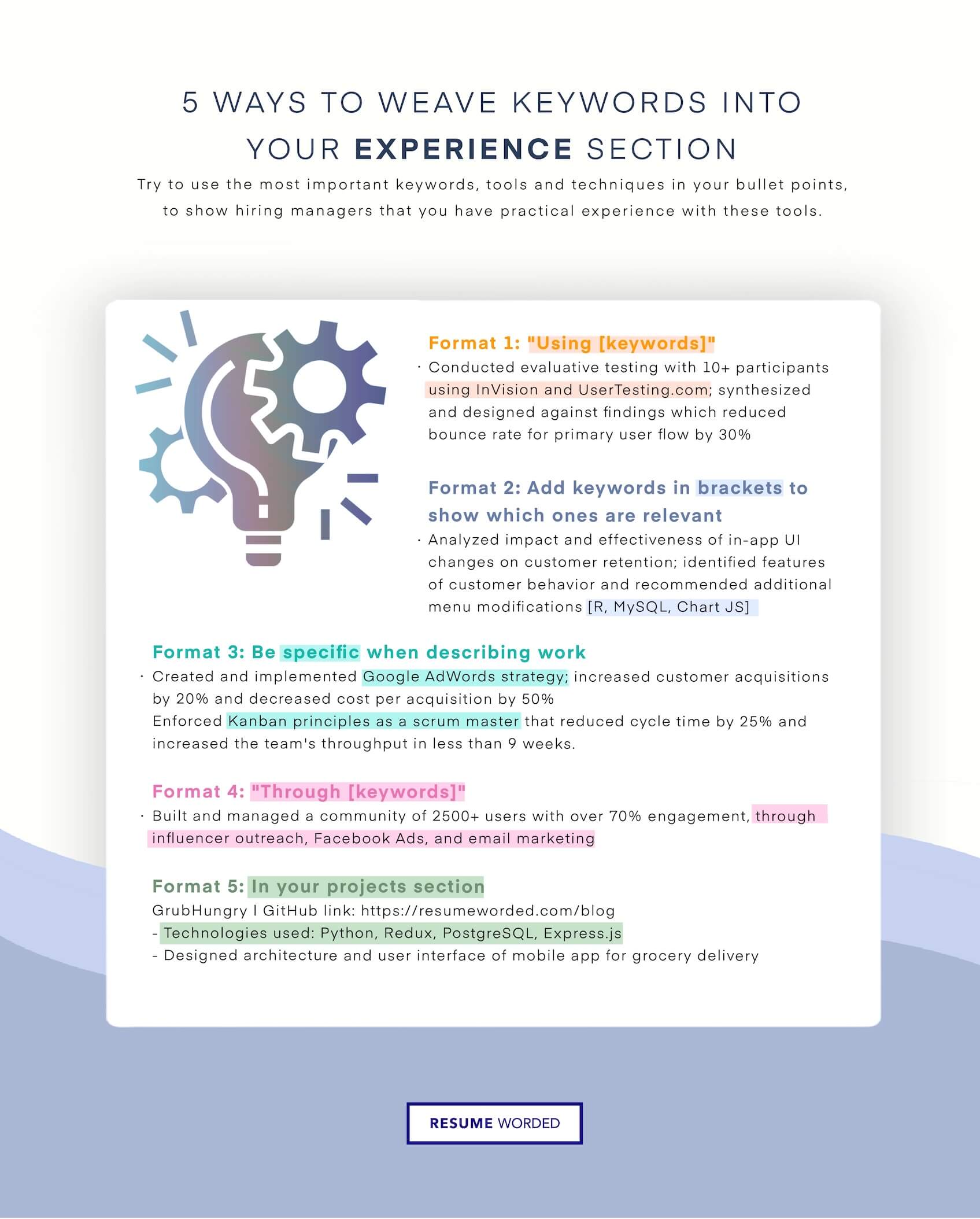
Demonstrate Soft Skills Through Experiences
In nursing, soft skills like communication, empathy, patience, and teamwork are as important as clinical skills. So, instead of listing them, provide real instances or scenarios during your training where these skills were essential. This way, recruiters see your potential, not just your qualifications.
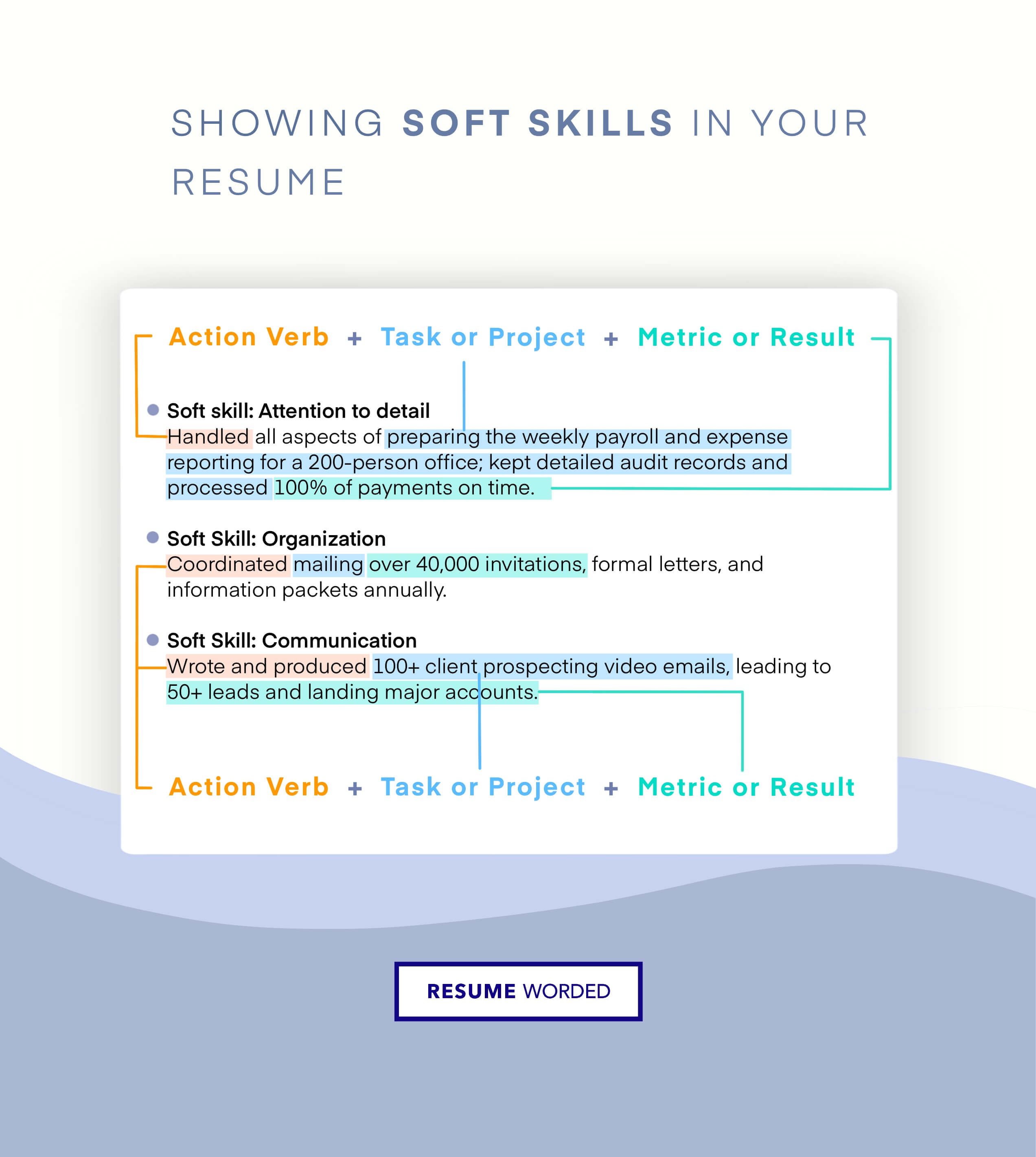
Template 24 of 42: New Grad Nurse CV Example
Nursing is a profession that truly makes a difference in people's lives. As a new grad nurse, your CV needs to showcase your acquired skills, clinical experience, and passion for patient care. Nursing has been evolving, with a noticeable shift towards more specialized roles and a higher demand for research and leadership skills. It's not just about the medical expertise anymore; soft skills like communication and empathy are highly valued. When writing your CV, remember that recruitment managers are not just looking for a nurse, but an individual who can add value to their organization beyond clinical duties.
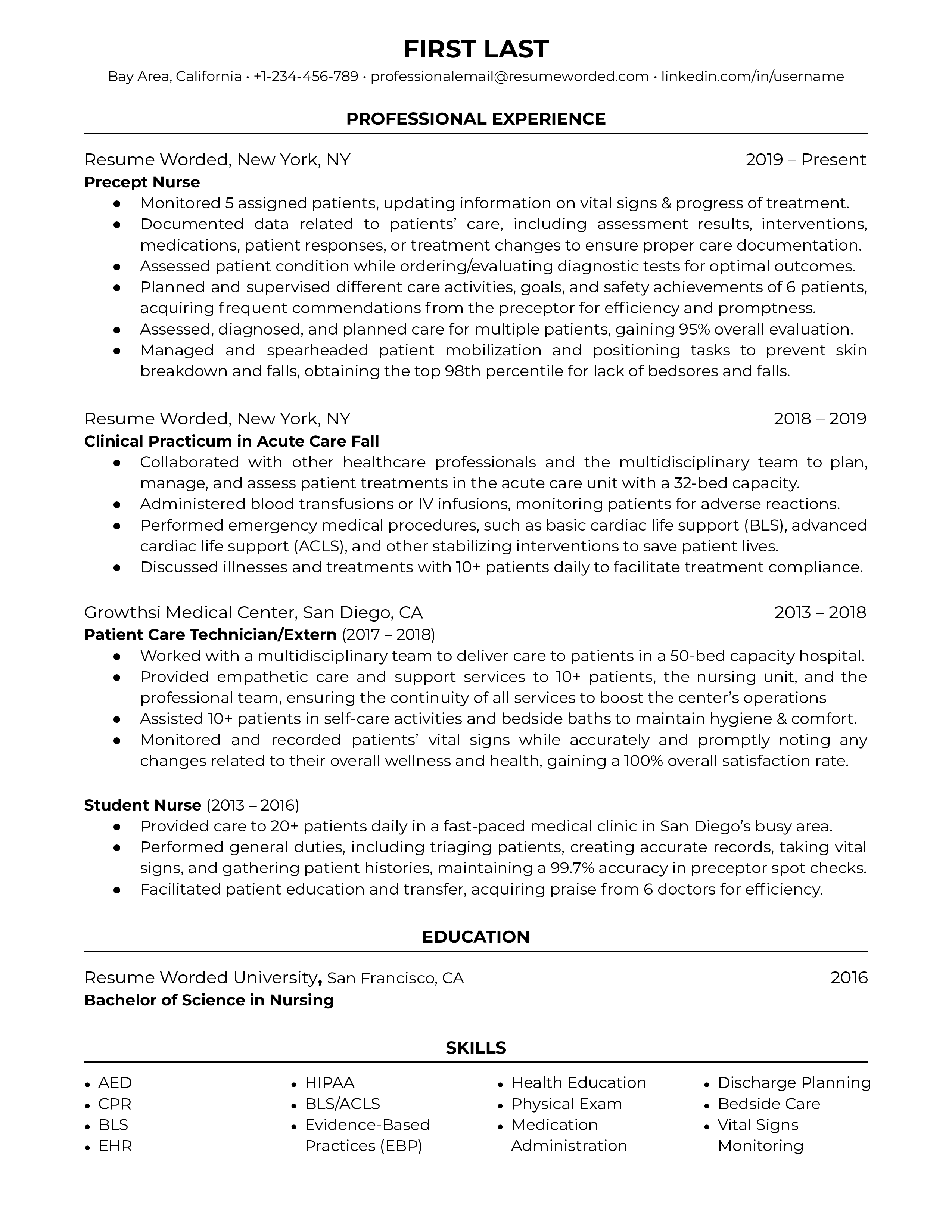
Include relevant clinical rotations
As a new grad nurse, your clinical rotations are your most relevant work experience. Detail the rotations you underwent, focusing on key responsibilities and what you learned. Specify any specialized areas you've had exposure to, such as pediatrics or mental health. This provides the hiring manager with evidence of your hands-on experience.
Emphasize soft skills and teamwork
Within a nursing role, teamwork and interpersonal skills are paramount. Talk about times when you worked as part of a team during your clinical rotations, or when your communication skills truly made a difference. Remember, it's about demonstrating your ability to provide holistic care and work collaboratively.
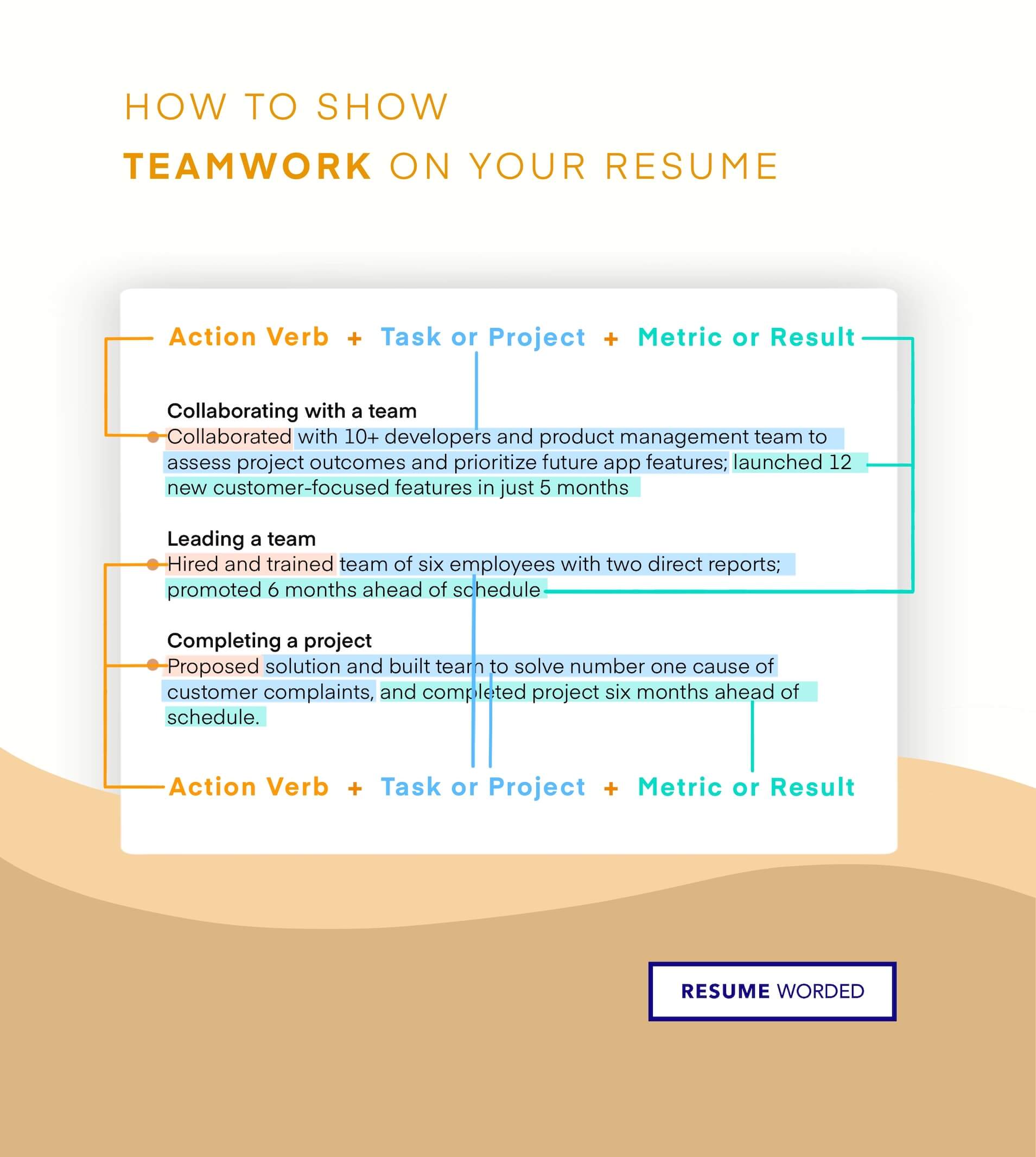
Template 25 of 42: Director of Nursing CV Example
Let's talk about your CV for the Director of Nursing role. It's a top-tier job in the healthcare field, so your CV should demonstrate your leadership capacity, in-depth clinical knowledge and ability to streamline healthcare services. Nursing has been revolutionized recently with digital health and data analysis. Your CV should show how you have adapted to these changes and used these technologies to improve patient care. That being said, be sure to convey your human touch in the role, such as how well you manage and motivate your team and interact with patients.
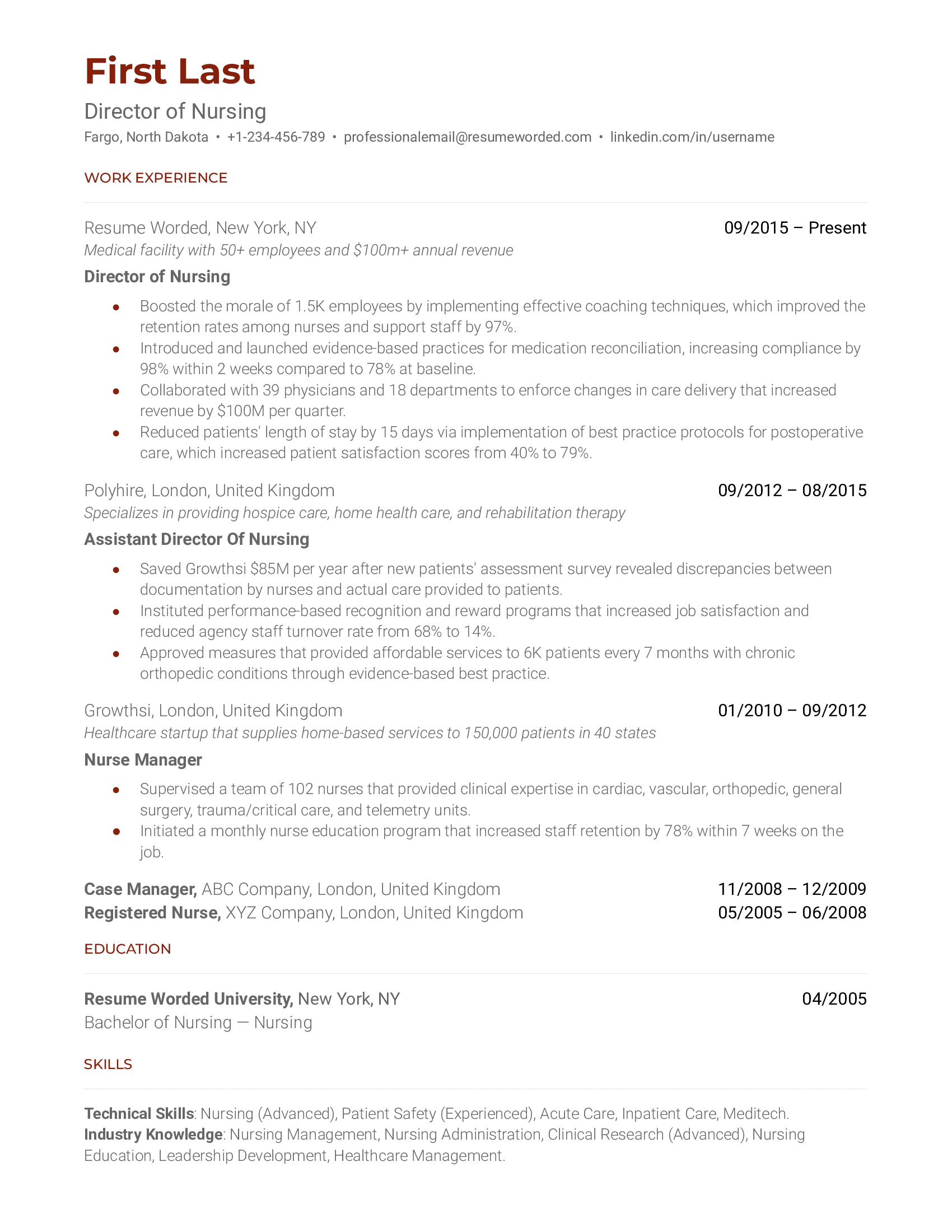
Tips to help you write your Director of Nursing CV in 2024
emphasize your digital health competencies.
It's not enough to claim you're familiar with the latest technologies. You need to show clear examples of how you have used digital health tools or data analysis to improve care services or team management in your previous roles.
Detail your leadership in Quality Improvement programs
As a Director of Nursing, you're expected to spearhead Quality Improvement projects. You should provide real-life examples of these programs you’ve led, including the positive outcomes from your initiatives and how they have enhanced patient care or staff performance.
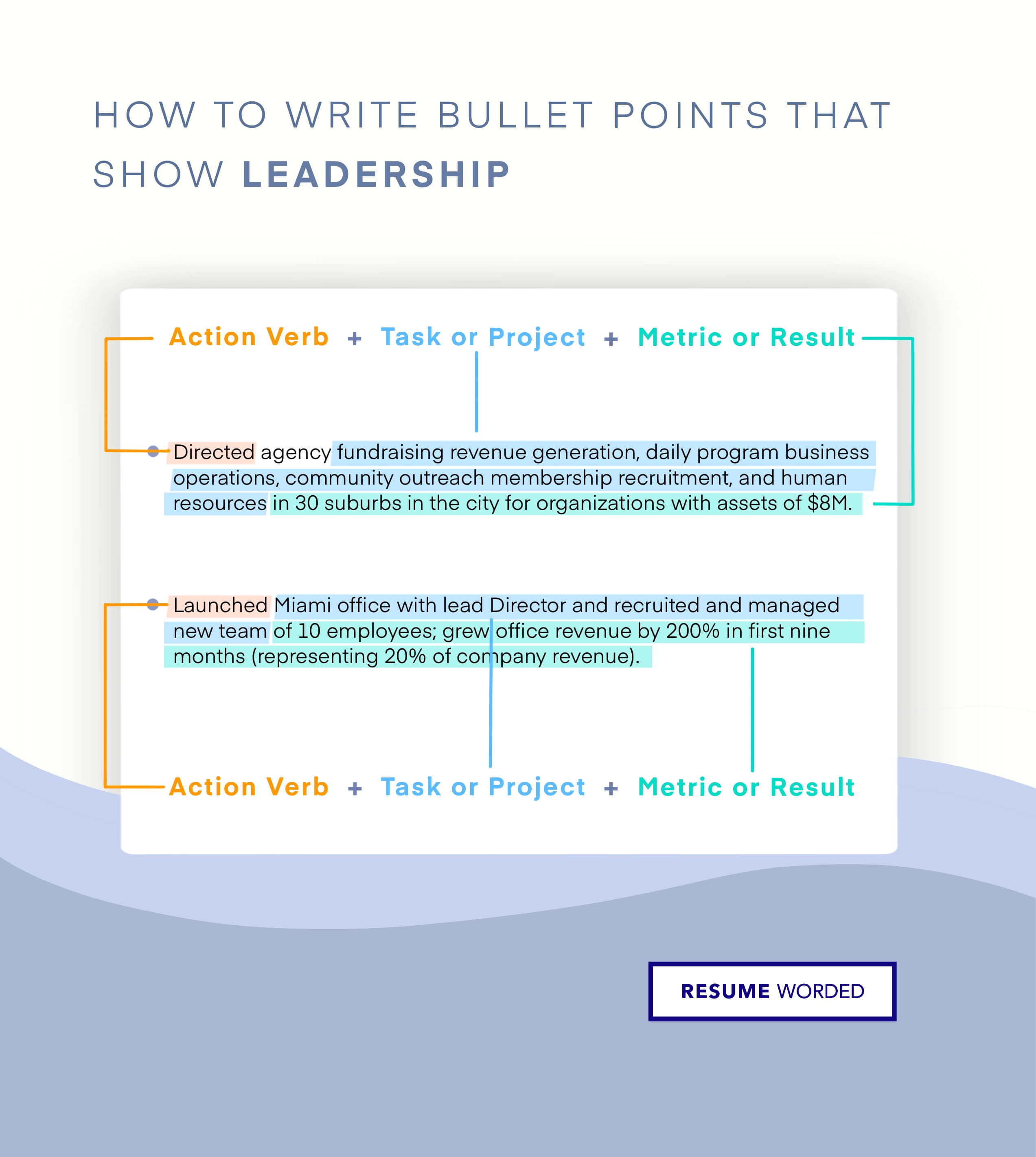
Skills you can include on your Director of Nursing CV
Template 26 of 42: nursing supervisor cv example.
A Nursing Supervisor role is a rewarding albeit challenging role in the nursing field, requiring a perfect blend of clinical expertise and leadership skills. While you're well aware that the job entails supervising nursing staff, coordinating patient care and making critical decisions, your CV should reflect your proficiency in these areas. Recent trends show a high demand for Nursing Supervisors with a deep understanding of patient-centered care, technological adeptness, and crisis-management skills. So, when crafting your CV, make sure it's more than just a summary of your qualifications and experiences - you need to demonstrate your capability to drive quality care while effectively managing a team.
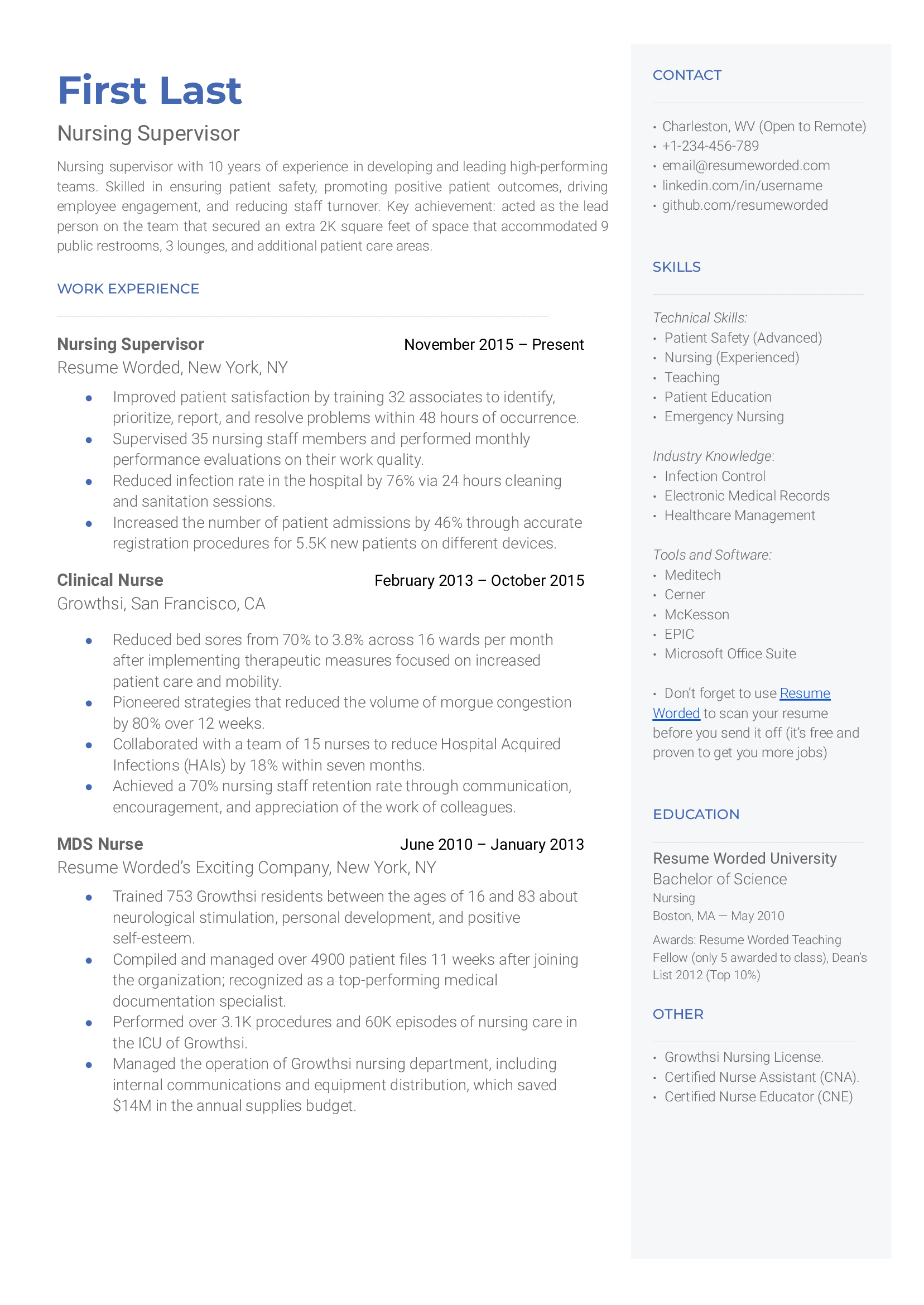
Tips to help you write your Nursing Supervisor CV in 2024
showcase your technological skills.
The healthcare industry is increasingly leveraging technology in patient care. So, if you're proficient in using Electronic Health Records (EHR) systems or any healthcare software, make sure to feature this on your CV. It serves as a concrete indication of your readiness to adapt to tech-driven processes in nursing supervision.
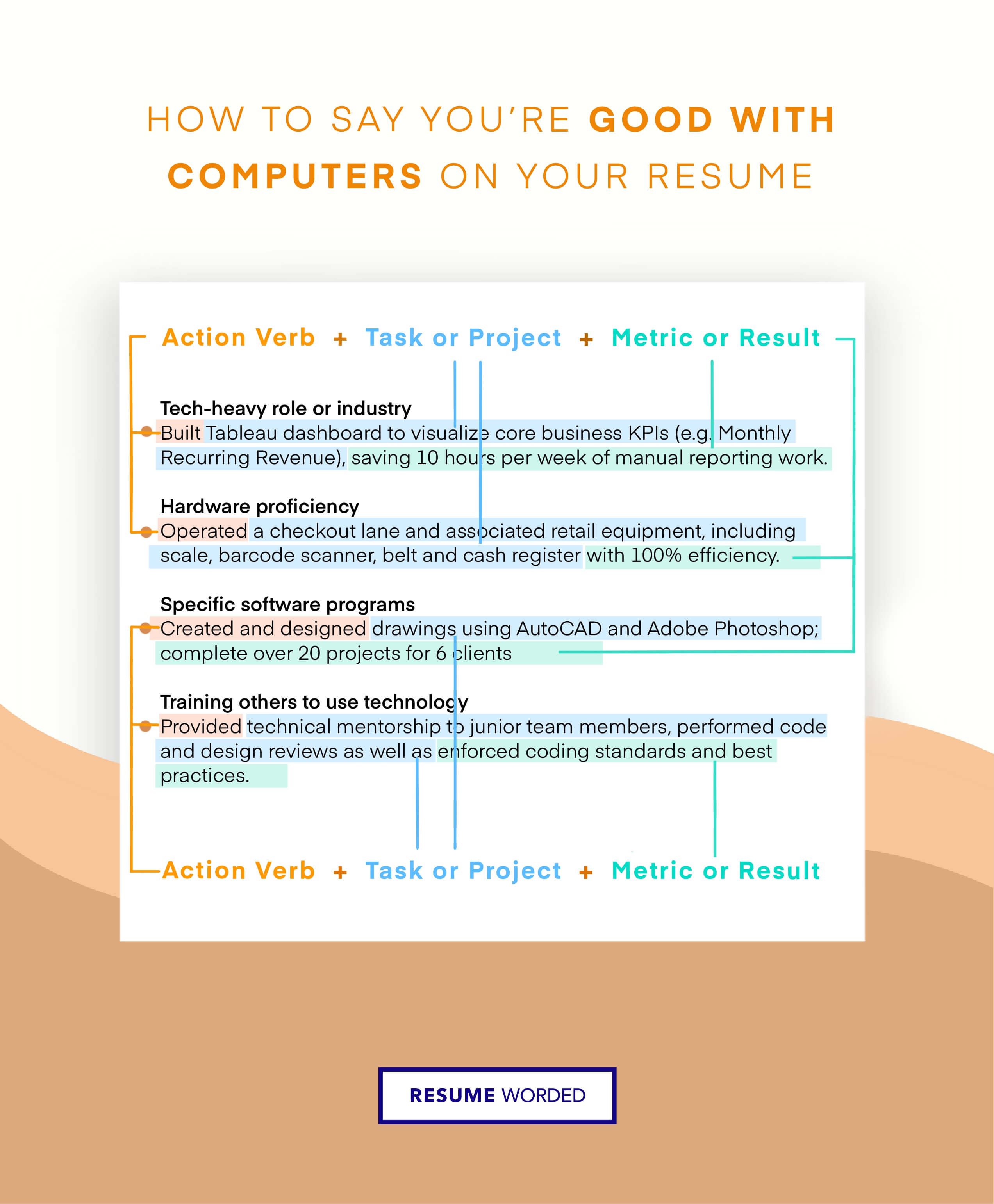
Highlight crisis-management and decision-making skills
As a Nursing Supervisor, you're often required to make crucial decisions under pressure. Your CV should reflect your ability to handle crises. Use specific examples from your past experience where you've had to navigate stressful situations or make hard decisions that had significant positive outcomes.
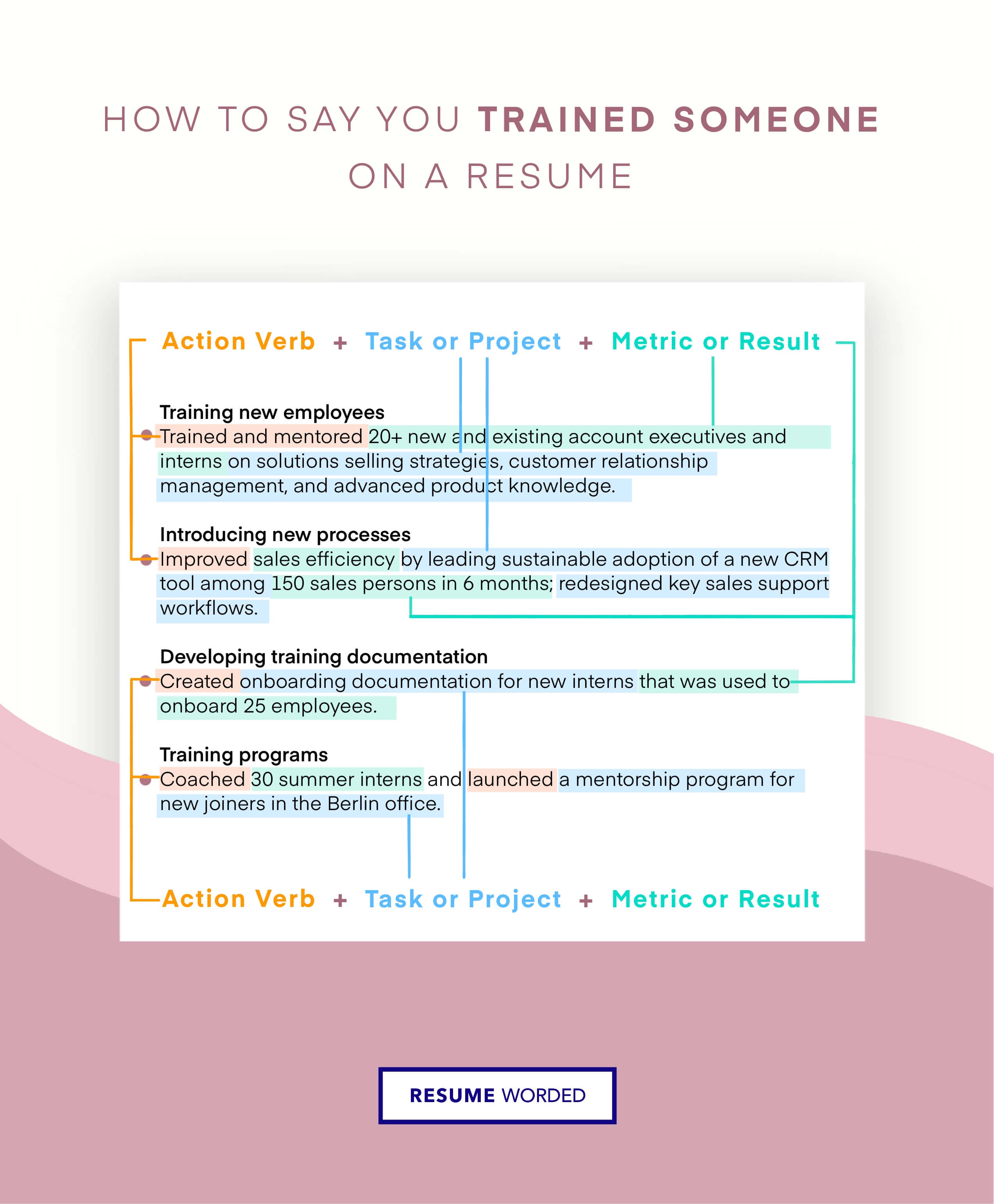
Skills you can include on your Nursing Supervisor CV
Template 27 of 42: er nurse cv example.
As an ER Nurse, your job is anything but predictable. Each shift involves dealing with a multitude of health crises, from minor injuries to life-threatening conditions. Hence, when crafting your CV, it's essential to demonstrate your adaptability and quick decision-making skills. The healthcare industry is evolving, with employers now leaning towards candidates with specializations or advanced certifications in emergency nursing. Also, more emphasis is being placed on telemedicine and digital health proficiency as hospitals digitize their systems. So, your CV should reflect your ability to handle intensive situations while highlighting your up-to-date technical skills and qualifications.
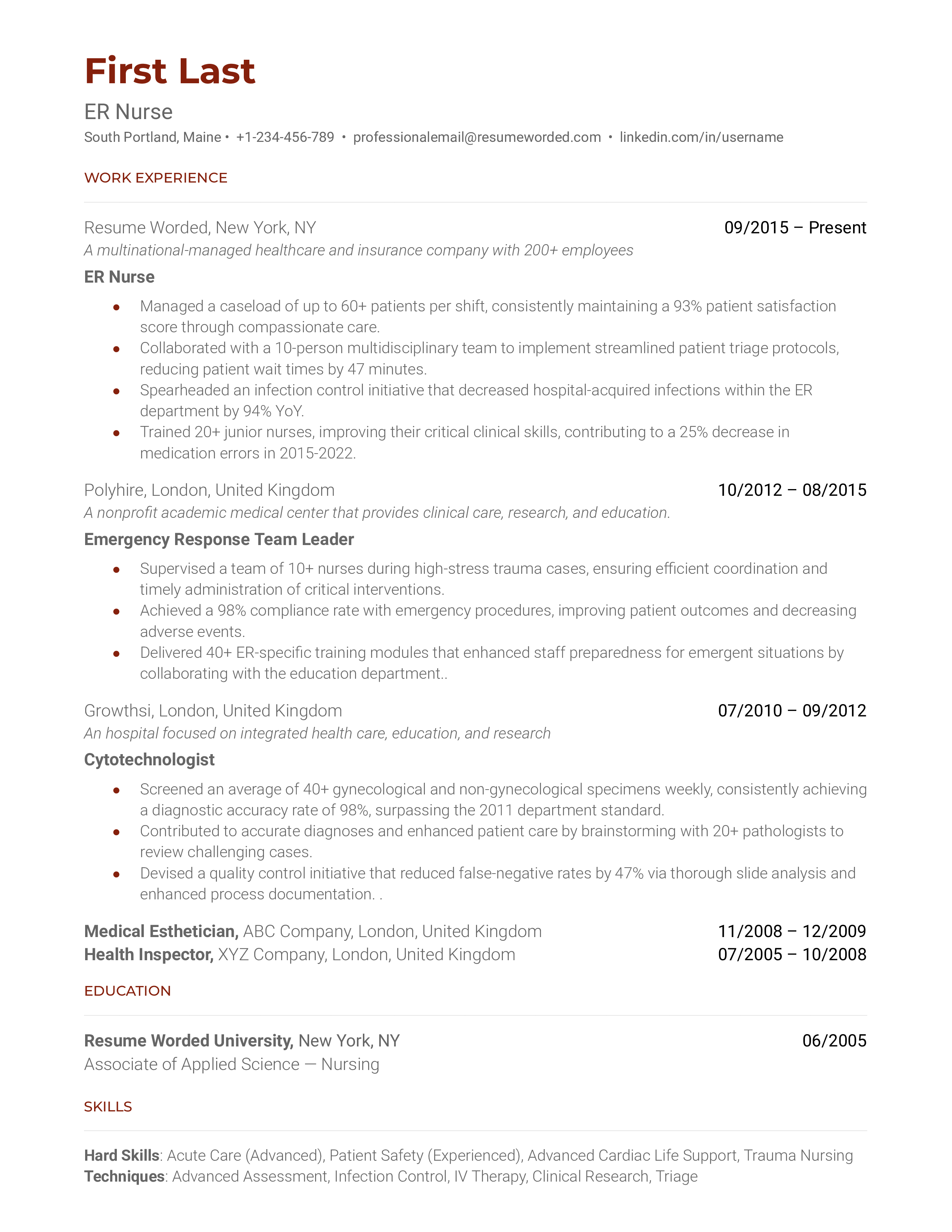
Tips to help you write your ER Nurse CV in 2024
include specific certifications.
Medical facilities typically prefer ER nurses with additional certifications like Certified Emergency Nurse (CEN), Certified Pediatric Emergency Nurse (CPEN), or Trauma Certified Registered Nurse (TCRN). These validate your specialized skills and dedication to the role. Including these can put you ahead of other candidates who don't have them.
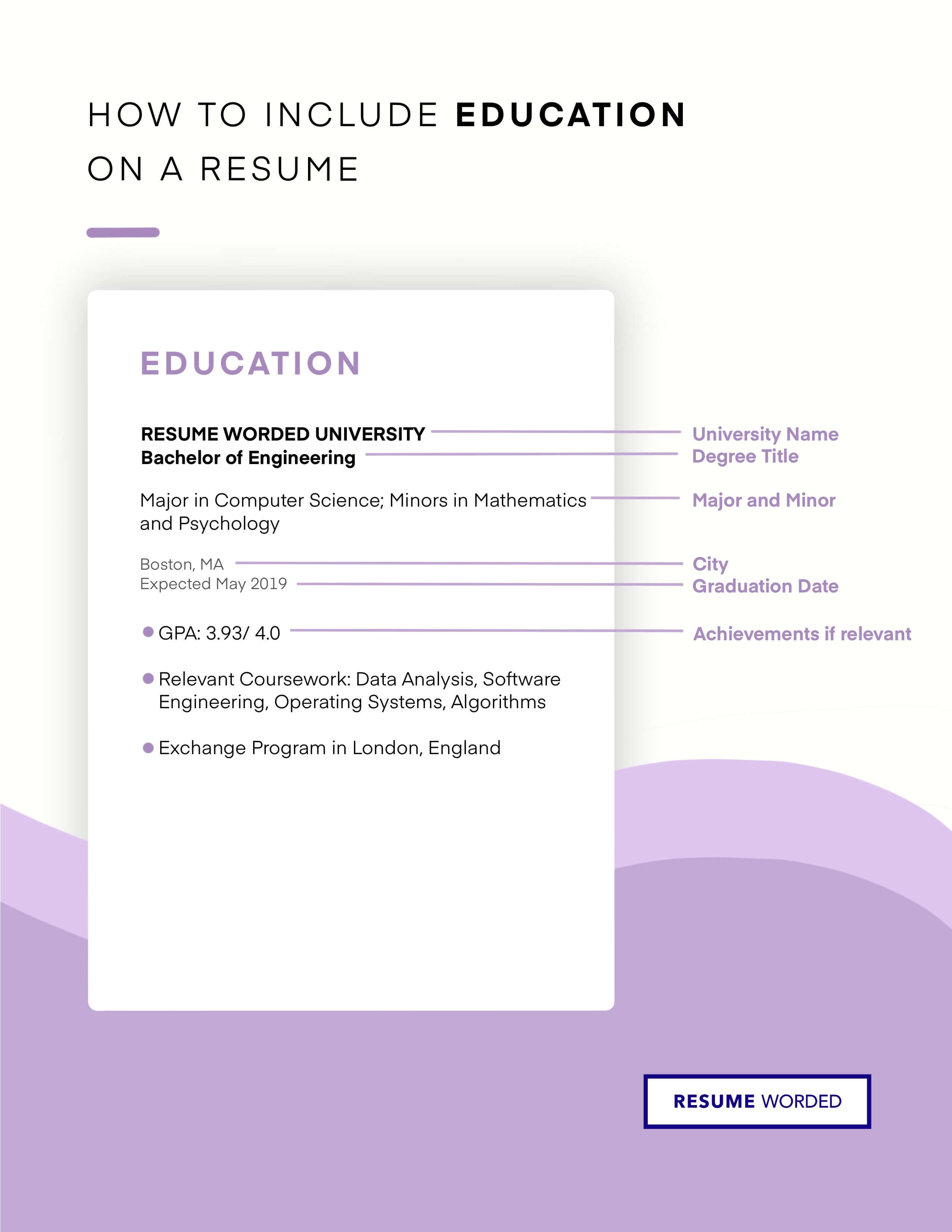
Showcase experience with cutting-edge technology
ER nursing now requires familiarity with telemedicine and electronic medical record (EMR) systems. If you've had experience with these, be sure to mention it. This demonstrates that you're prepared for the future of nursing and can adapt to new technologies.
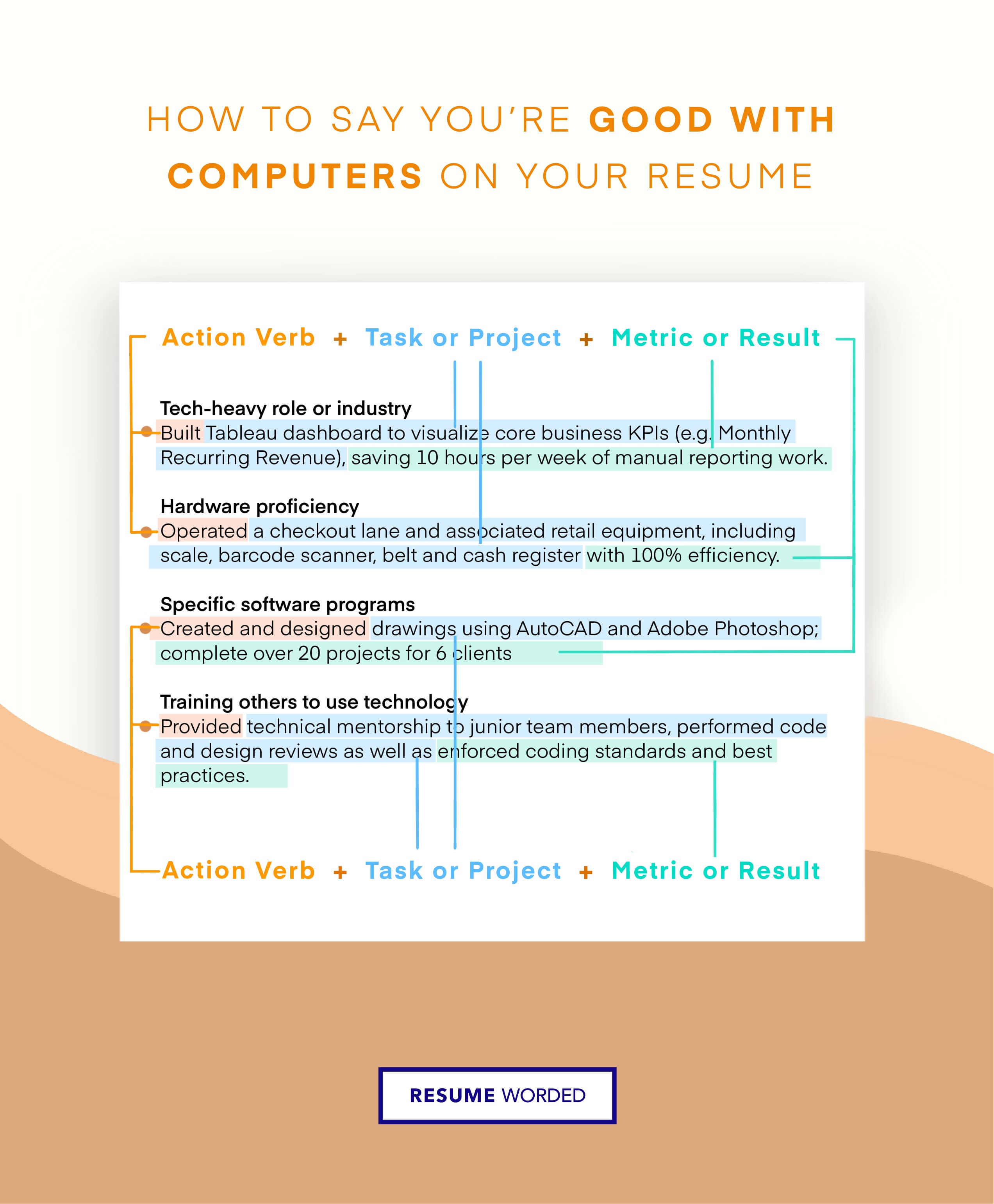
Skills you can include on your ER Nurse CV
Template 28 of 42: er nurse cv example.
As an ER Nurse, you're often the first line of face-to-face help for a medical emergency. A fast-paced, adrenaline-pumping role, you need certain skills that differ from other nursing specialties. Lately, hospitals have been emphasizing a culture of empathy and patient-centered care, so they're looking for ER nurses who not just know their craft, but also know how to put patients at ease. When writing your CV, keep this in mind. Make it a balanced showcase of both your technical competence and your soft skills. In terms of content, an ER nurse's CV needs to reflect the high-pressure environment and the variety of cases you handle daily. Tailoring it to demonstrate your ability to think on your feet, improvise, and give patients the best possible care in the shortest time is essential.
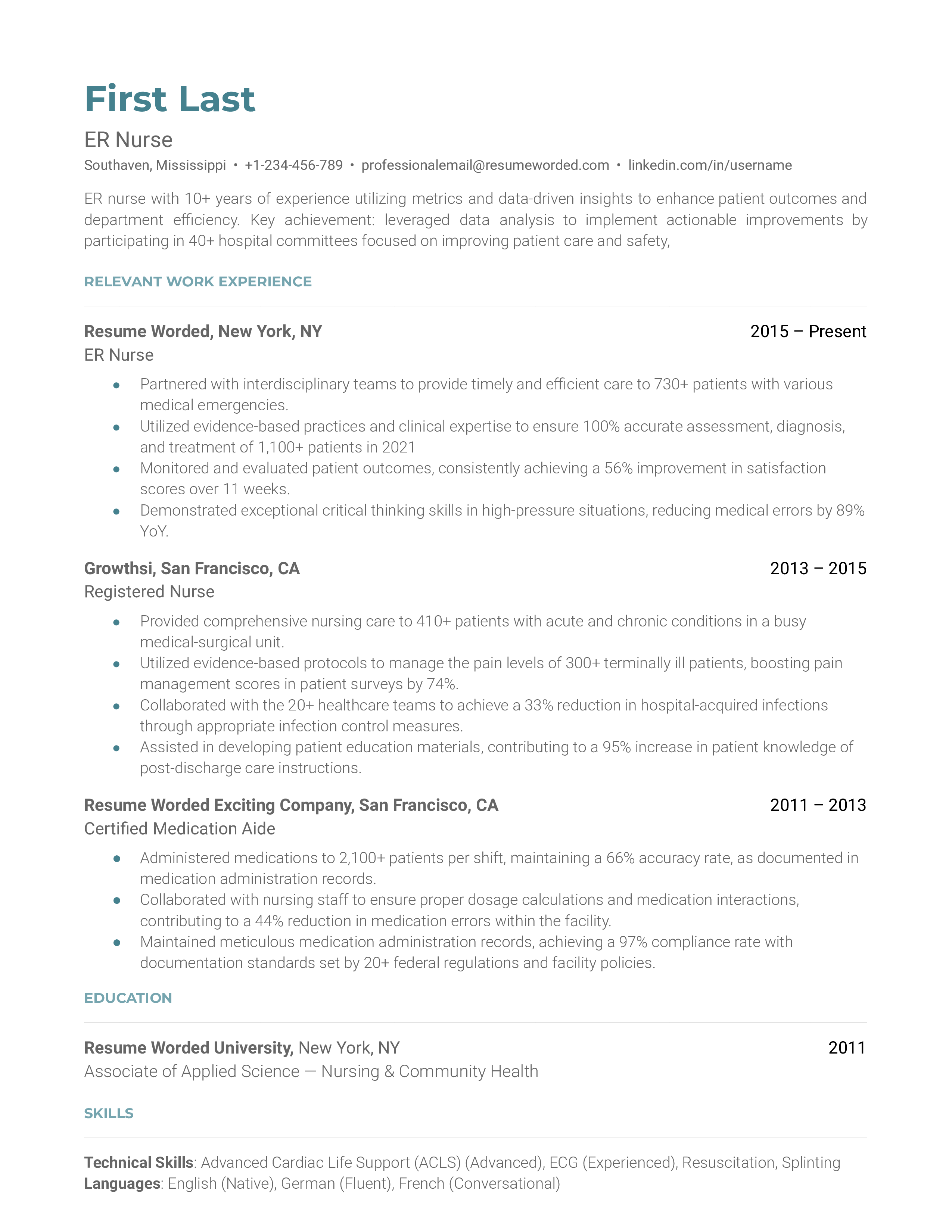
Keep an emphasis on Emergency Room specifics
Unlike other nursing roles, emergency rooms are high-stress, quick-decision environments. On your CV, detail your experience in handling these types of situations. For example, include instances of specific emergency procedures you've performed, or how you've managed in times of high patient influx.
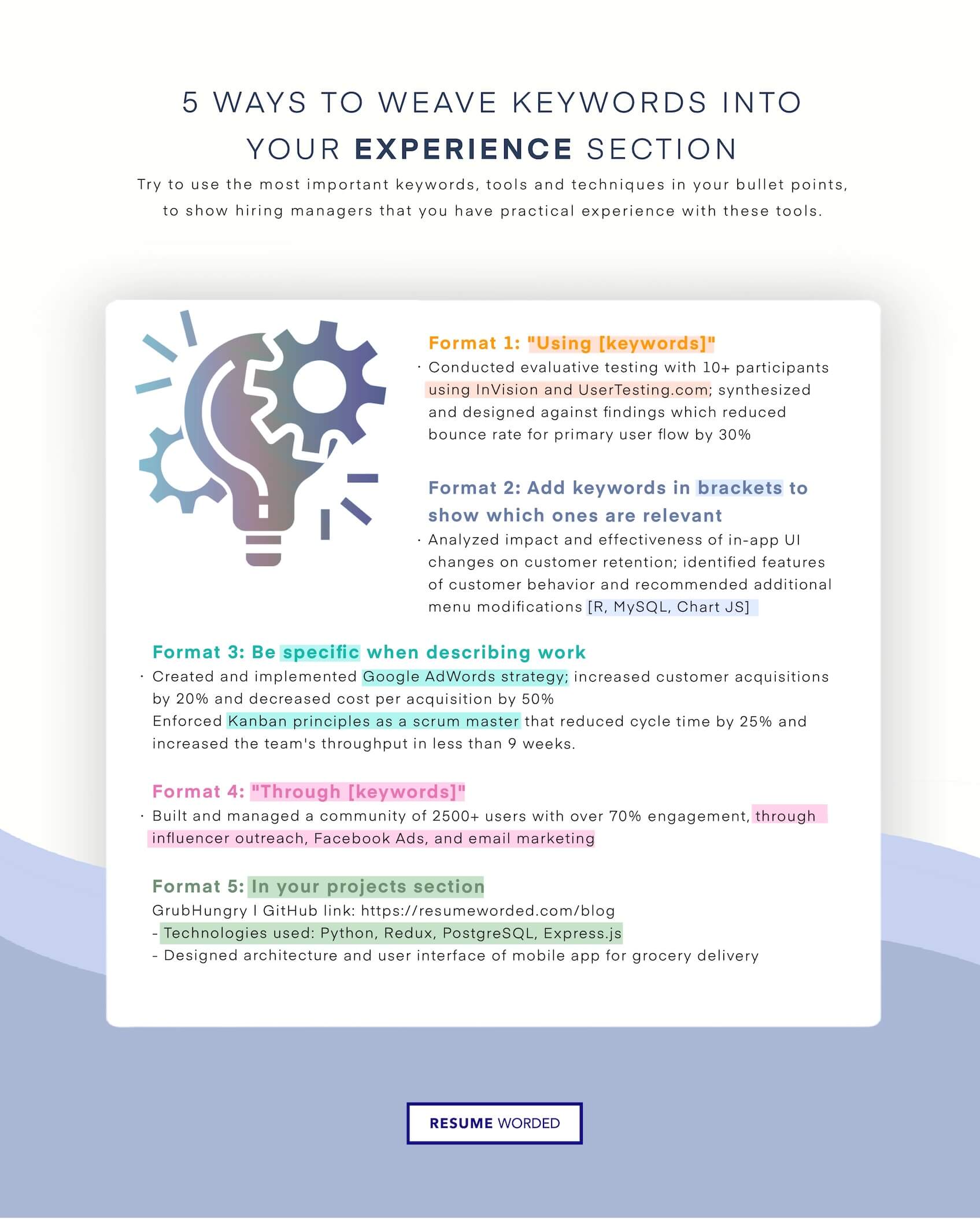
As an ER nurse, you never know what's coming through that door next, so adaptability is key. Use your CV to give examples of when you've had to adapt quickly, or manage unexpected situations. This could include dealing with unusual cases, resource shortages, or sudden changes in patient status.
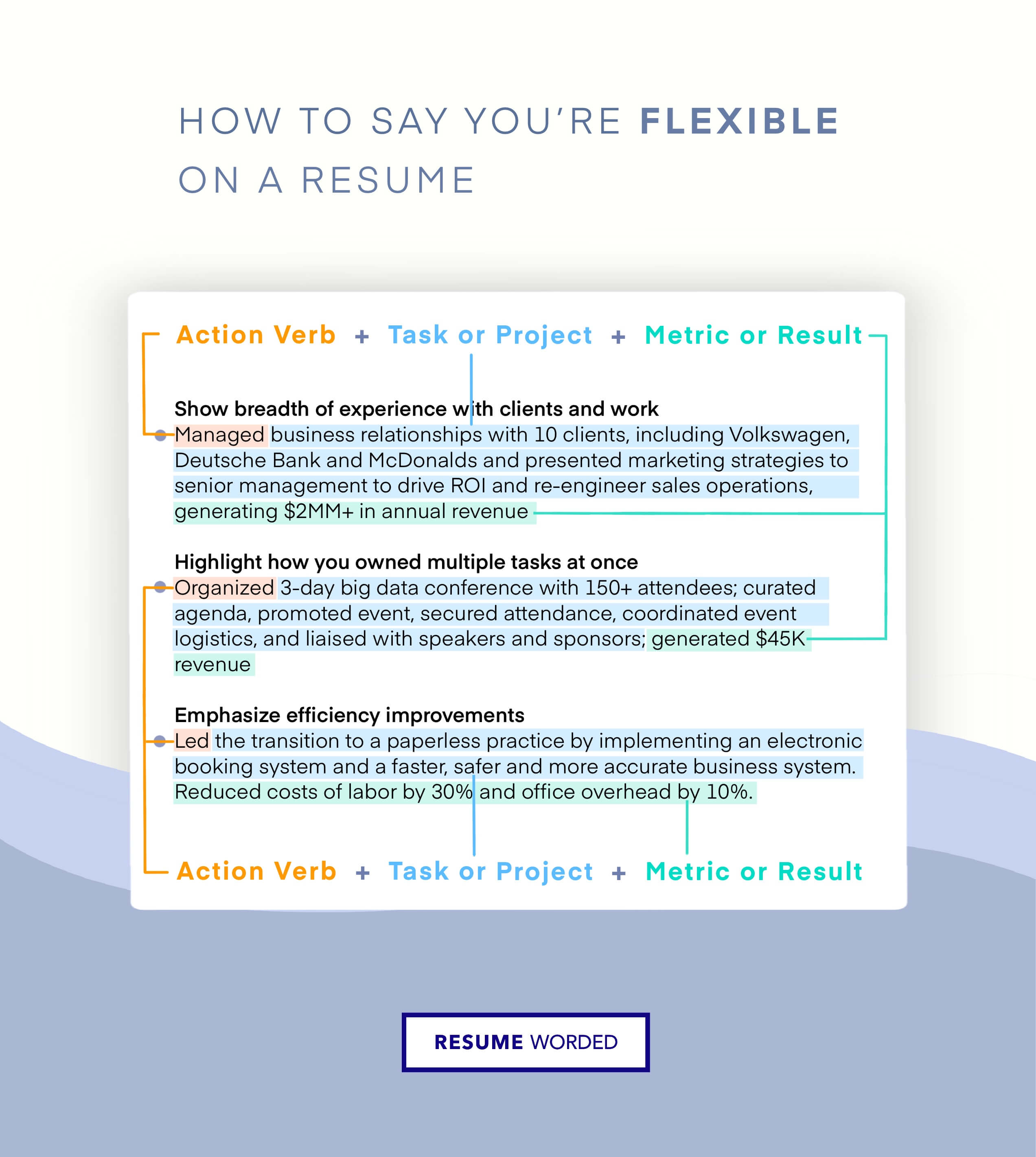
Template 29 of 42: Clinical Rotation Nurse CV Example
Being a Clinical Rotation Nurse is more than just a job, it's a dynamic role that combines extensive medical knowledge with on-the-job experience. The CV for this role needs to tell your personal story, illustrating not only your academic achievements and experiences but also your adaptability in different clinical environments. Industry trends suggest an increasing emphasis on interprofessional collaboration and digital health competencies. So, when crafting your CV, think beyond the basics. Detail your capability to work in collaborative, multidisciplinary teams and comfort in incorporating digital tools in patient care.
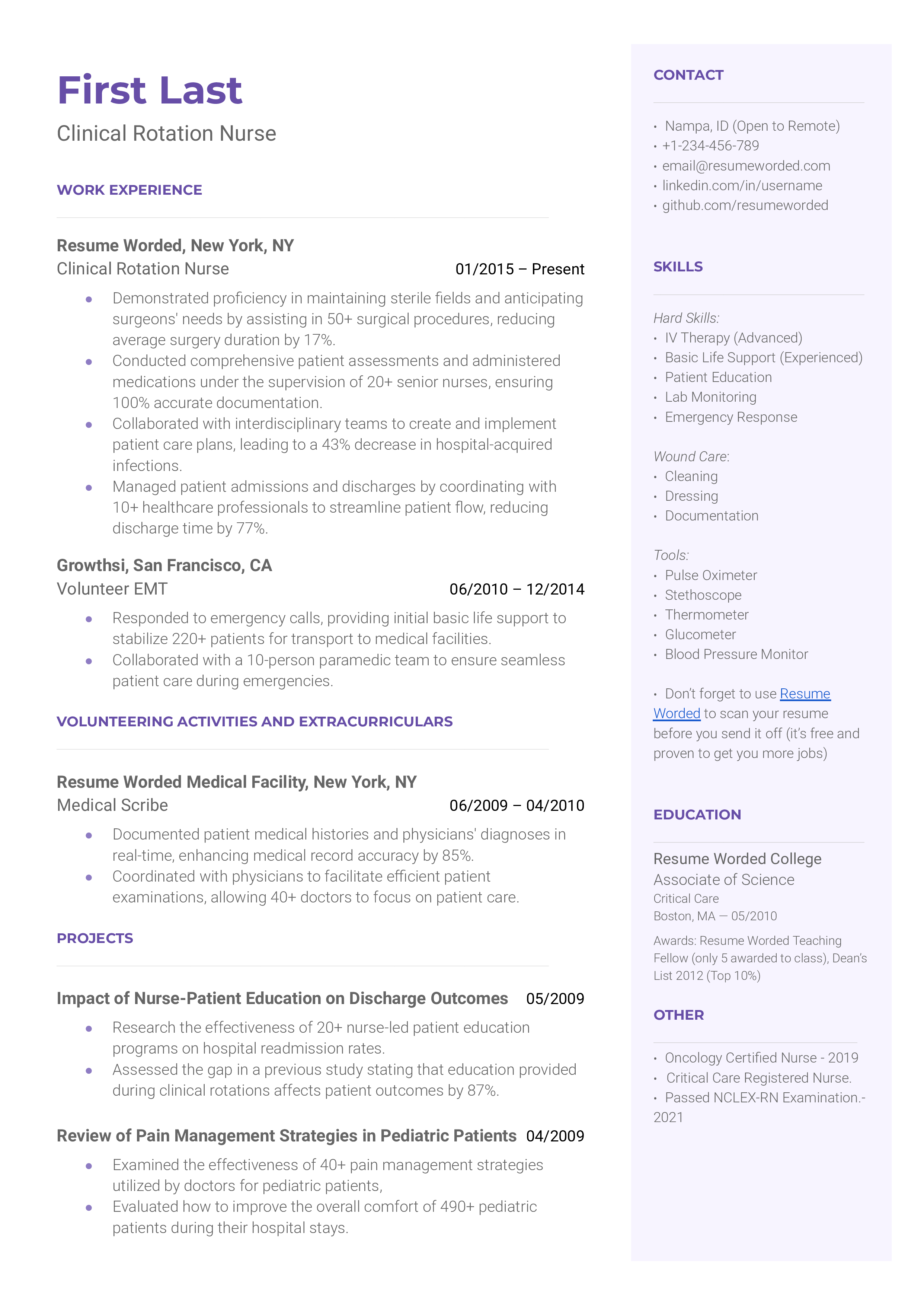
Tips to help you write your Clinical Rotation Nurse CV in 2024
showcase your clinical rotation experiences.
The heart of your CV as a Clinical Rotation Nurse should be a detailed account of your clinical rotations. Don't simply list them; provide context, your responsibilities, and any unique experiences or encounters that show your depth of experience and adaptability.
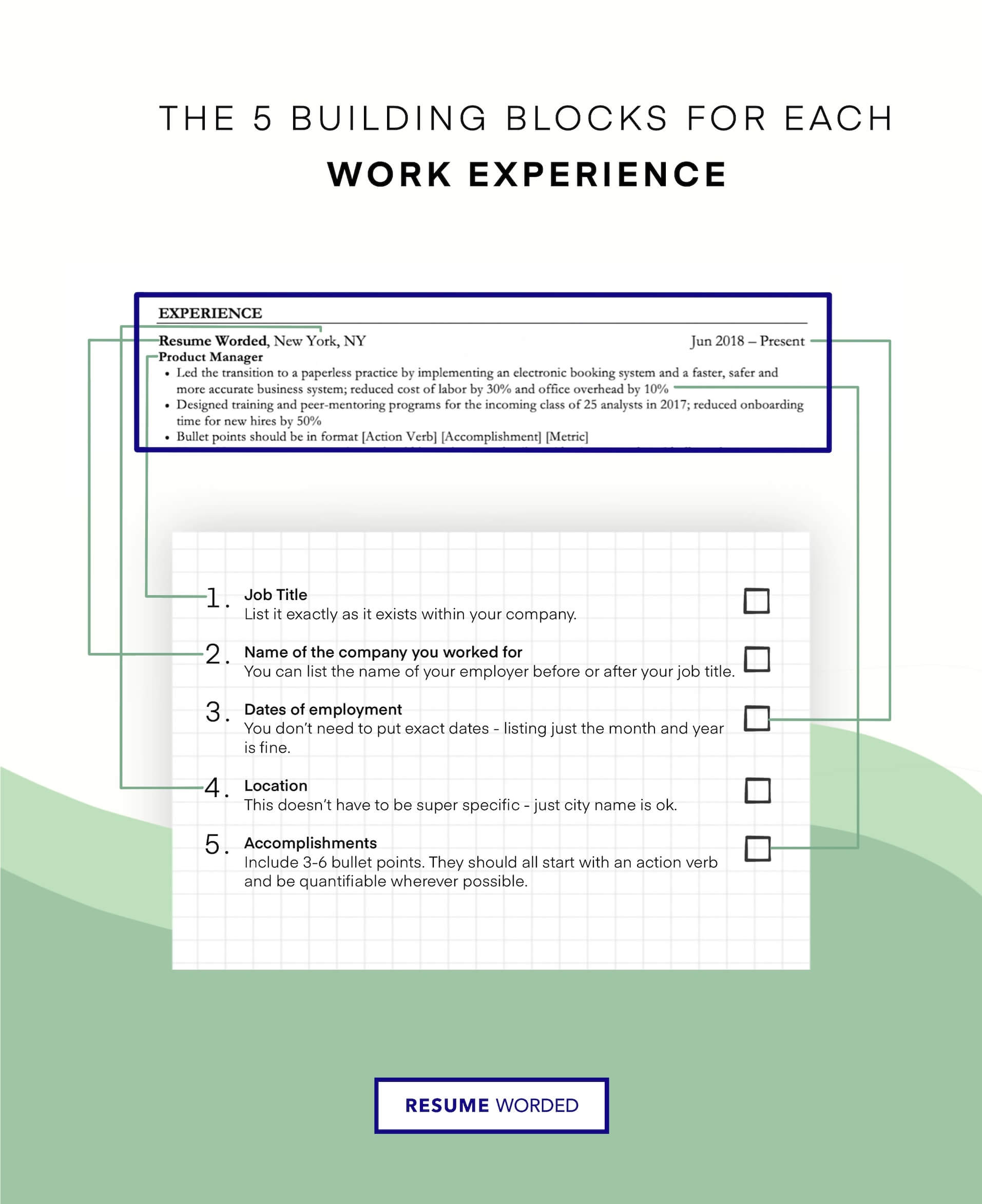
Demonstrate interprofessional collaboration skills
Nursing is part of a larger healthcare ecosystem. Your CV should show how you've worked with other healthcare professionals. Describe shared projects, committee participation or any related experiences. Show your potential employer how you can fit into their multidisciplinary team.
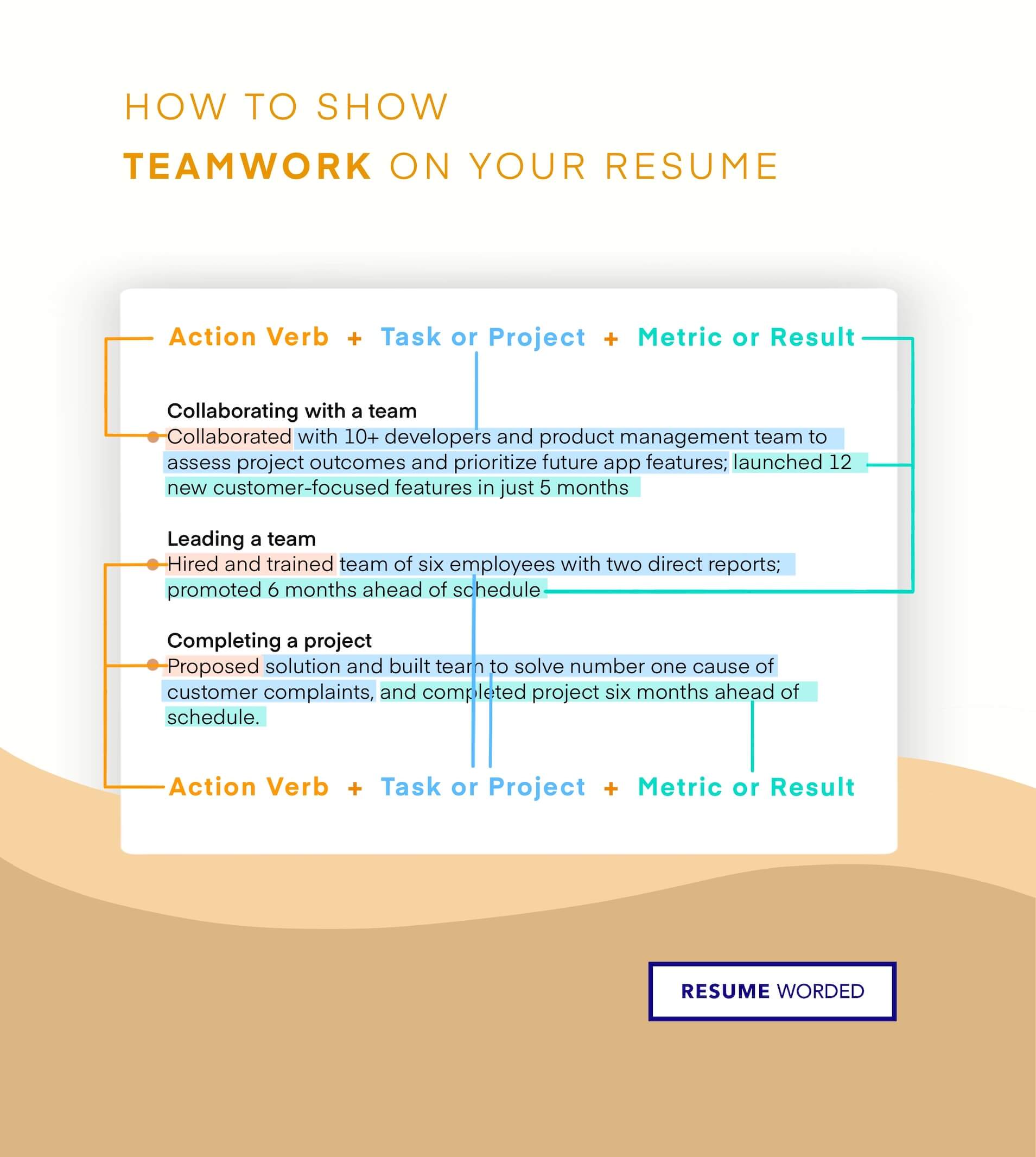
Skills you can include on your Clinical Rotation Nurse CV
Template 30 of 42: charge nurse cv example.
As a Charge Nurse, you're the critical link between the nursing staff and hospital management, ensuring smooth operations and top-quality patient care. It's a role that requires clinical expertise, leadership, and excellent communication skills. Recently, there's been a significant emphasis on continuous professional development and ability to work in high-stress environments in the healthcare industry. When writing your CV, the aim is to position yourself as a skilled, reliable nurse who's eager to step up into a leadership role and can handle whatever the job throws at you. It's important to showcase your past experiences and achievements to reflect your competency in managing a team and improving patient satisfaction.
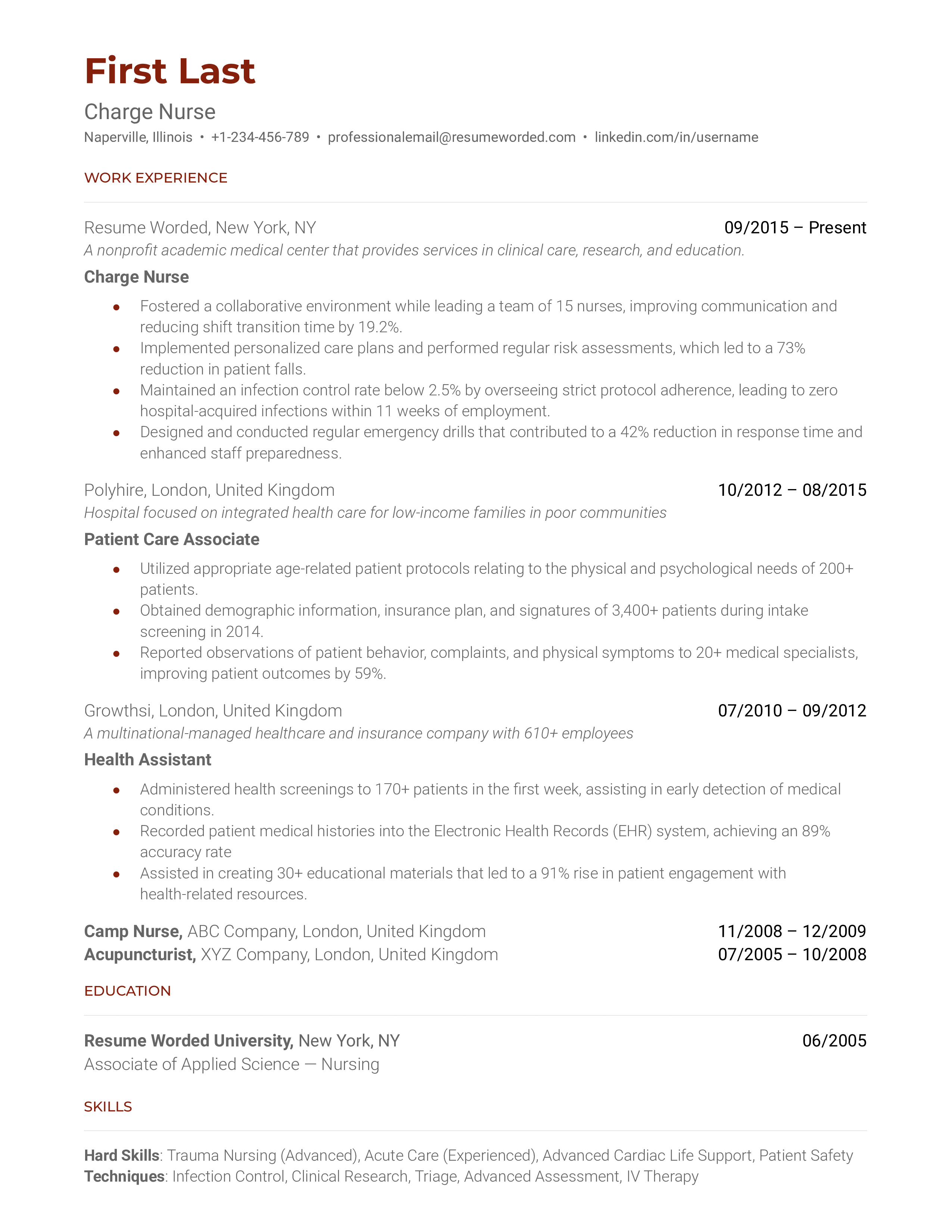
Tips to help you write your Charge Nurse CV in 2024
emphasize your leadership and management skills.
This role isn’t just about clinical excellence. It's about leading a team, making decisions, and managing resources effectively. Show off these skills in your CV, by describing instances in which you coordinated workflow, implemented changes, or improved department performance.
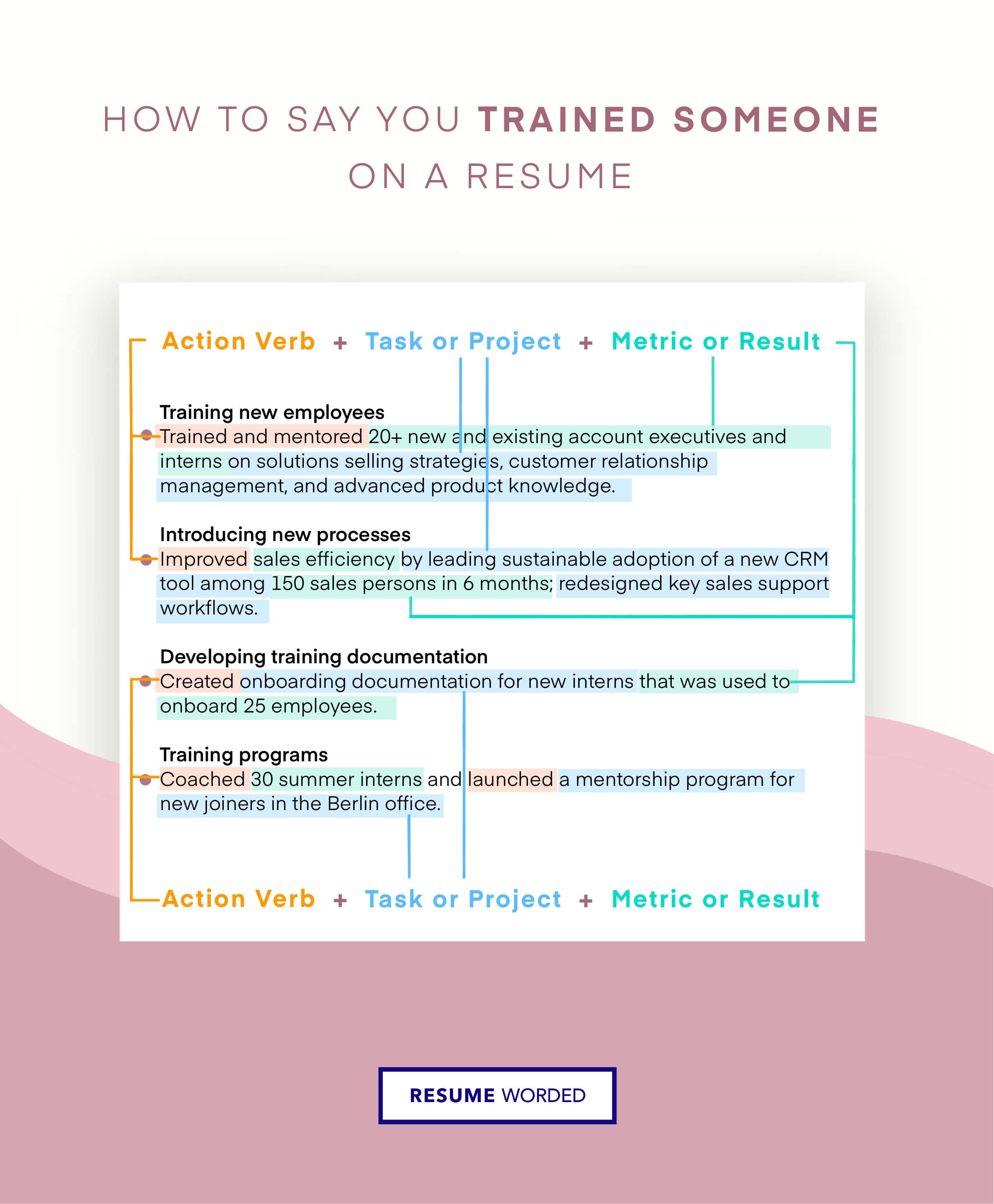
Include specific clinical experiences and specializations
As a Charge Nurse, you need strong clinical knowledge, so it's crucial to detail your nursing experiences and any specializations you have. Maybe you've worked in a high acuity unit or have hands-on experience in wound care or infection control. Make sure to mention these specifics.
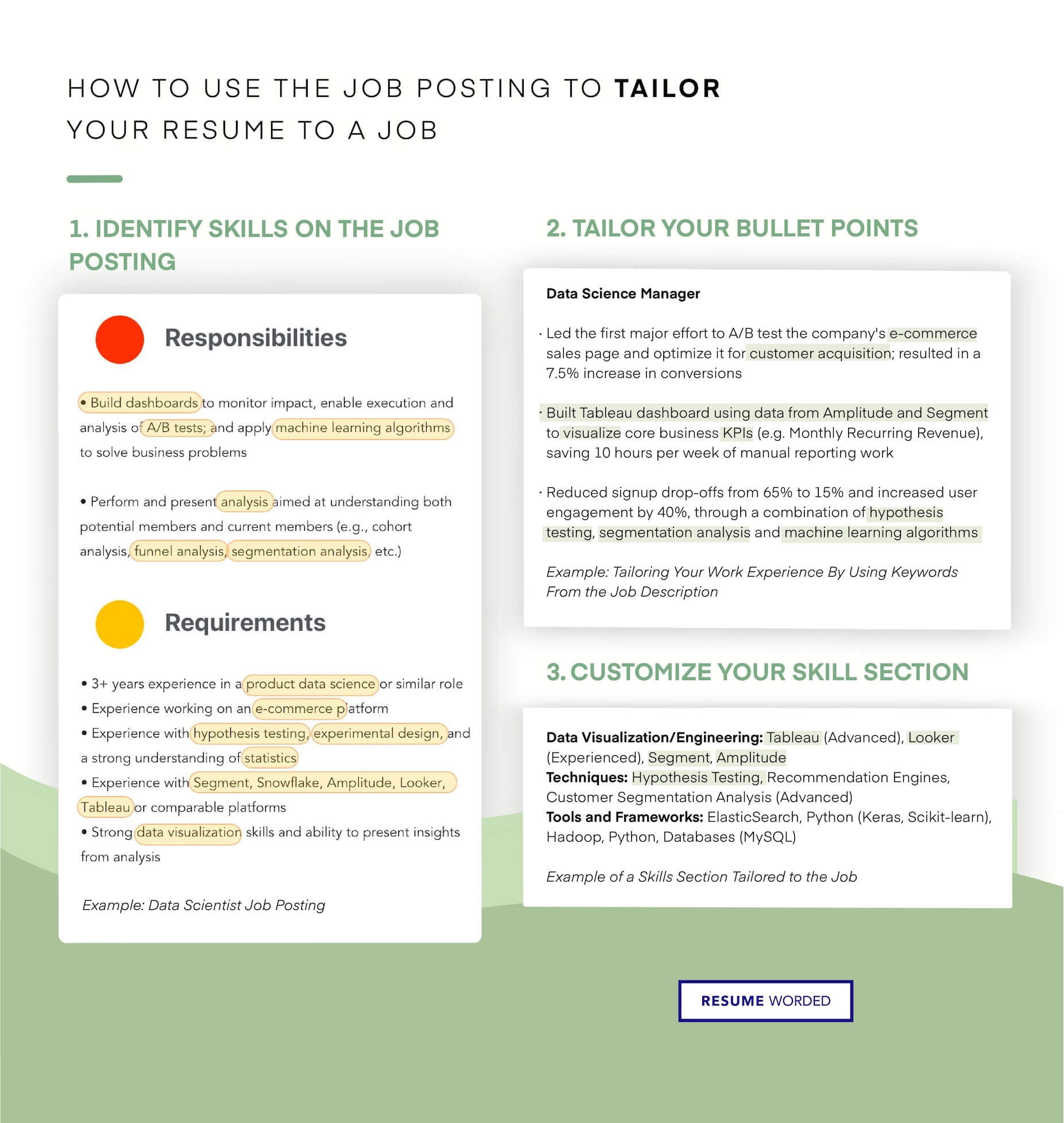
Skills you can include on your Charge Nurse CV
Template 31 of 42: charge nurse cv example.
In the evolving healthcare landscape, Charge Nurses play a pivotal role, acting as the bridge between nursing staff and hospital management. They are part crisis-manager, part mentor, and part healthcare provider. Emphasizing your leadership and management skills on your CV is vital as you're essentially applying for a strategic role within a high-pressure environment. Recent industry trends show that focus has shifted towards strong interpersonal skills and the ability to adapt to new technologies. When writing your CV, it's crucial to carefully articulate these qualities and give clear examples of when you've demonstrated them.
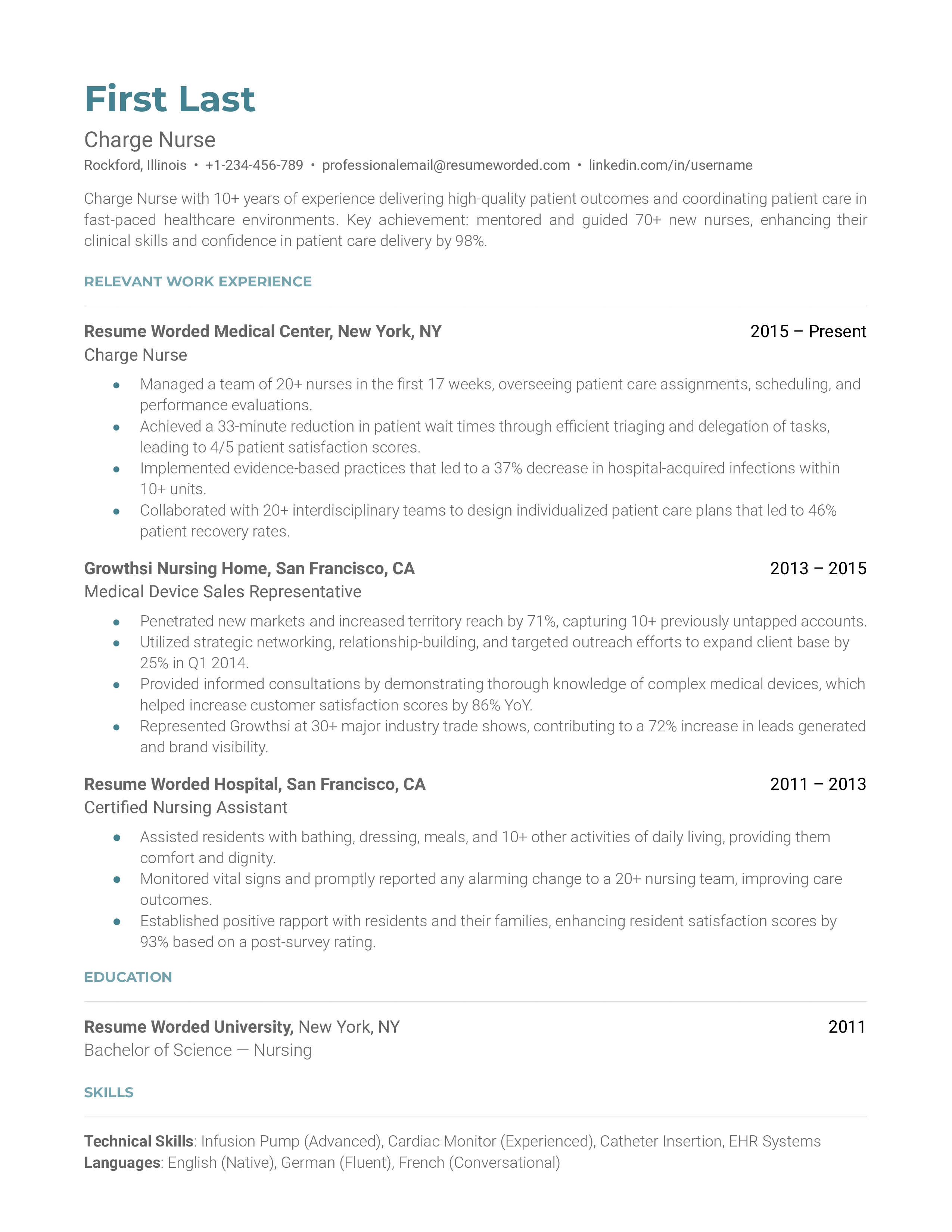
Showcase your nursing experience and expertise
Dive deep into your years of experience as a Nurse. Specify what kind of care units you've worked in and the complexity of cases handled. Tailor your CV to reflect your skills in handling emergency scenarios, supervising teams, and managing patient care.
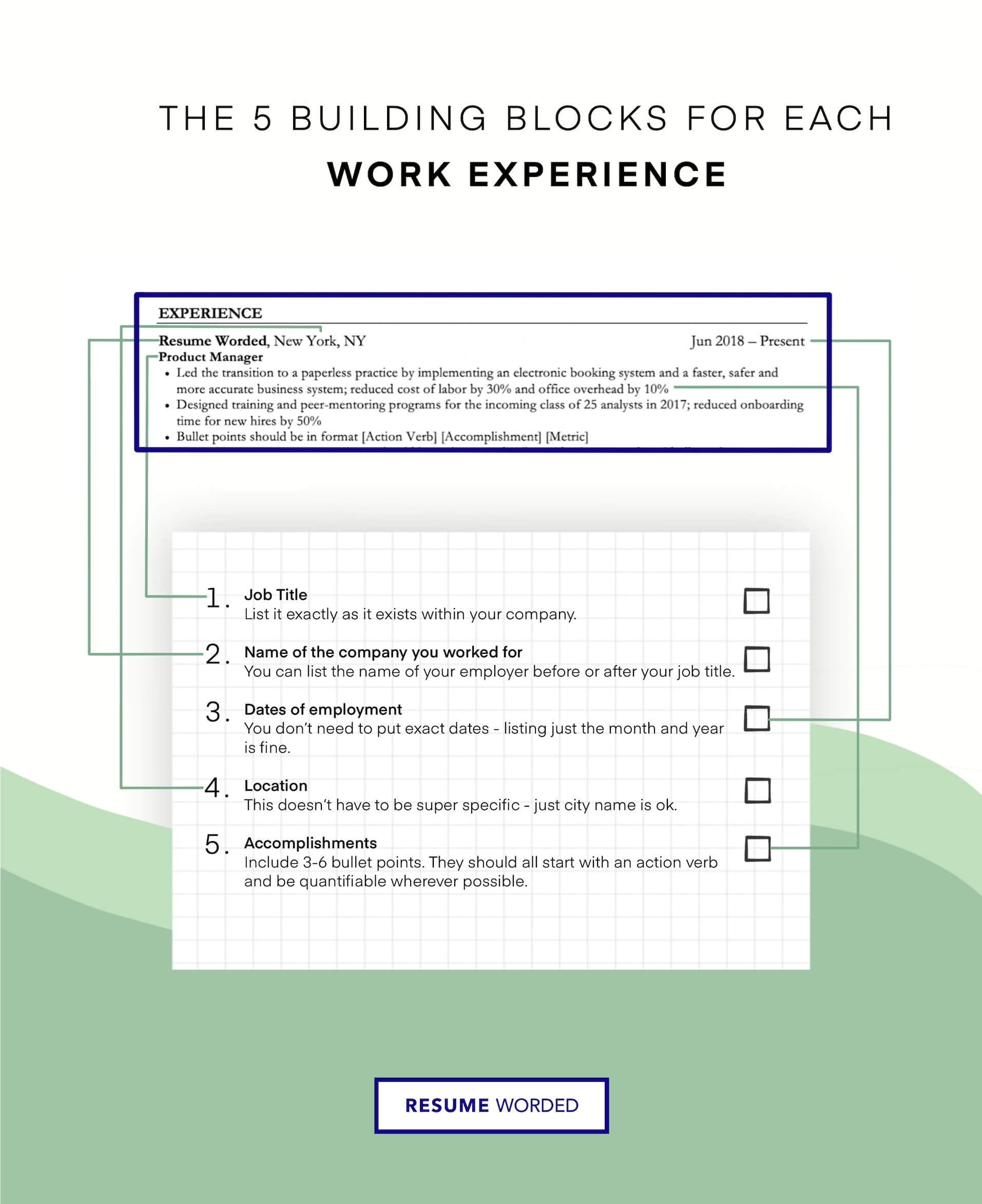
Highlight your leadership and management skills
As a Charge Nurse, you're not just caring for patients but also managing a team. Your CV should reflect your capabilities in scheduling, allocating resources, mentoring junior staff, and liaising with families and doctors. Use metrics wherever possible to prove your efficacy as a leader.

Template 32 of 42: Remote Nurse CV Example
A remote nurse plays an essential role in telehealth, providing patient care and education from a distance. You'll see an increasing demand for this sort of role, as health services continue to adapt to the digital sphere. In drafting your CV, it's essential to remember you're applying for a unique role that blends traditional nursing skills with an understanding of technology. You need to convey your ability to build relationships virtually and manage patient care remotely. These stand out in today's world, where virtual communication and remote medical consultations are on the rise. The second part to keep in mind is that your CV should tell a story about your adaptability, technological proficiency, and nursing skills. Avoid a simple list of duties; instead, focus on achievements and problem-solving incidents that highlight your ability to deliver healthcare remotely.
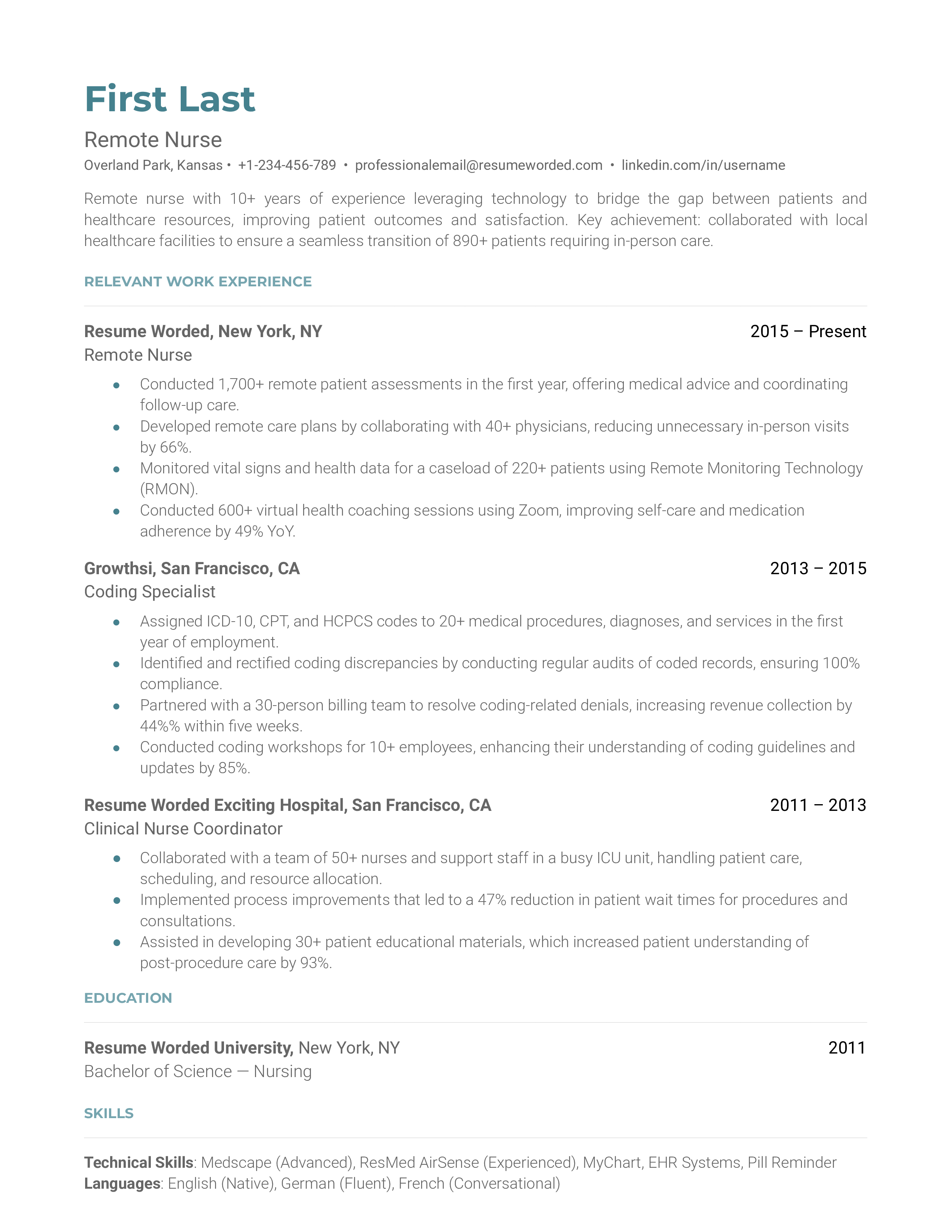
Tips to help you write your Remote Nurse CV in 2024
emphasize your technological expertise.
Telehealth relies heavily on your ability to navigate various software and tools. Therefore, your CV should include the specific medical systems and communication platforms you're familiar with. Don't just list them, explain how you've used them to provide patient care.
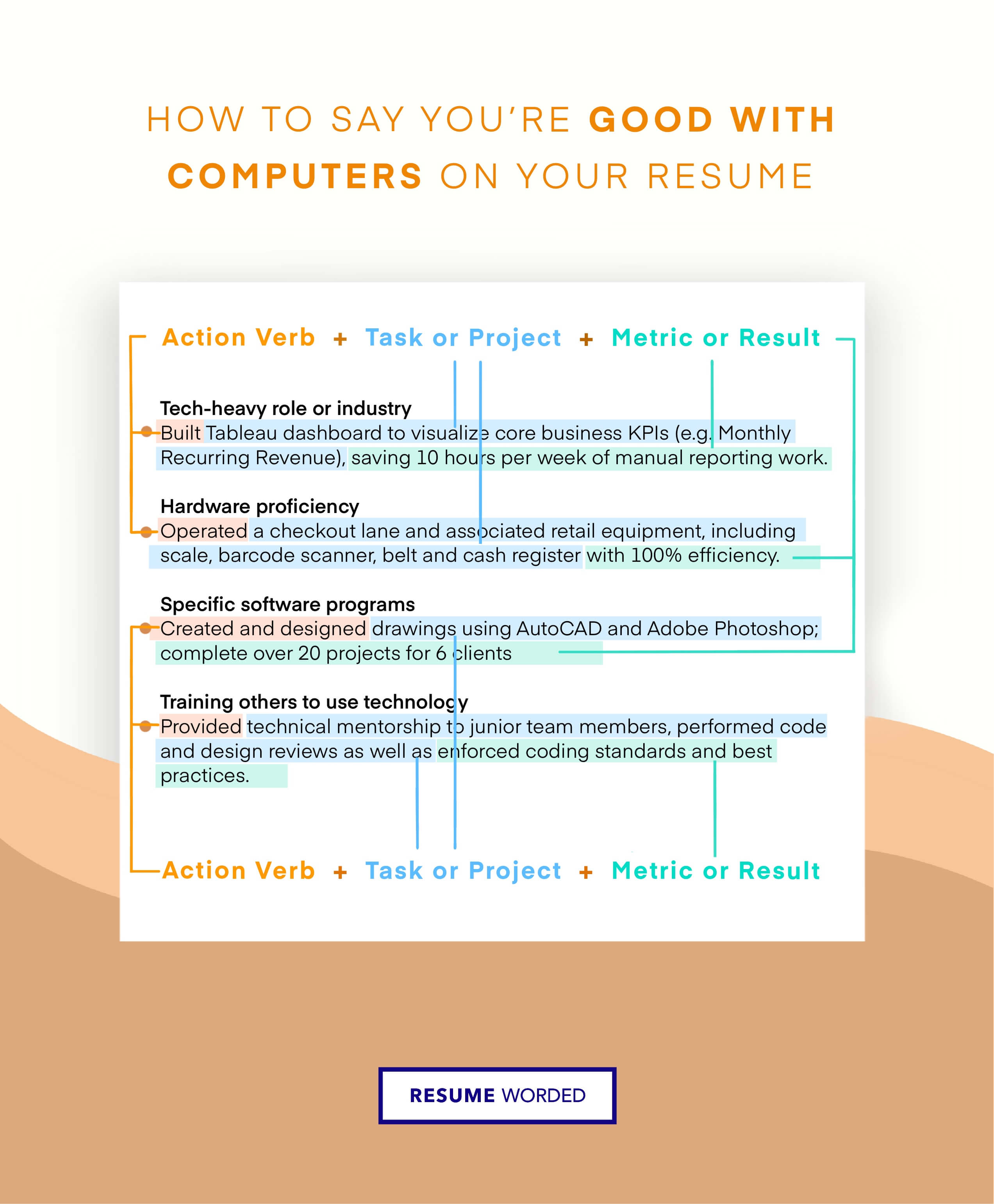
Display your remote communication skills
As a remote nurse, you won't have the non-verbal cues that usually aid patient interaction. Therefore, your CV should demonstrate your remote interpersonal skills. Share examples of how you've successfully managed patient relationships and educated patients remotely.
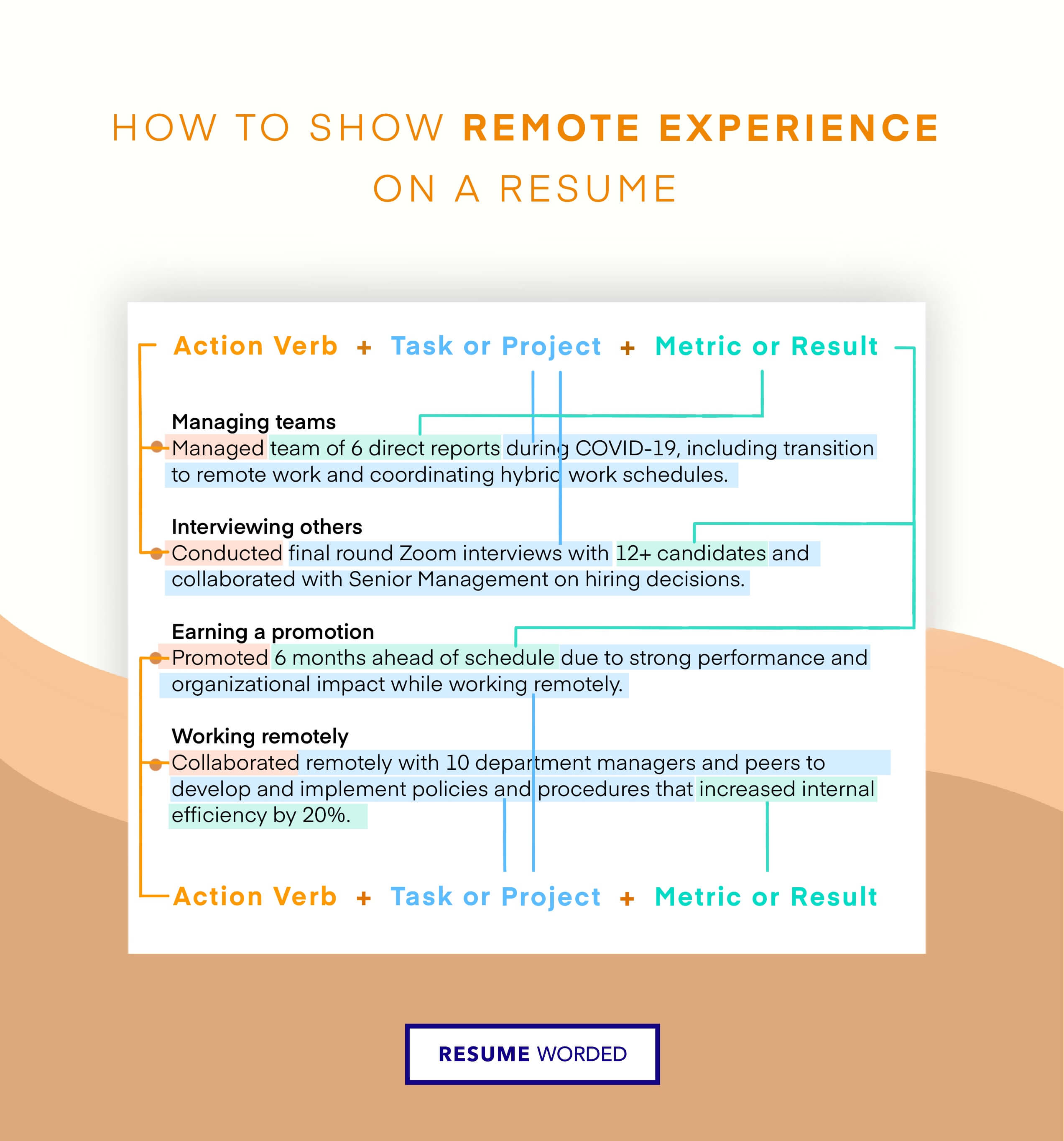
Skills you can include on your Remote Nurse CV
Template 33 of 42: preceptor nurse cv example.
Being a Preceptor Nurse is a dynamic role where you wear many hats - you're an educator, mentor, and guide for new nurses. It's a shift from traditional bedside care, and hiring managers are looking for specific skills on your CV to match this role. The healthcare industry is ever-changing, so staying up-to-date with current nursing practices is crucial. When writing your CV, it's key to showcase that you're not only an experienced nurse, but also a skilled teacher with the ability to adapt to different learning styles. With the growing demand for nurses, we're seeing a trend towards hiring Preceptor Nurses who can facilitate hands-on training. There's a growing emphasis on evidence-based teaching methods and emotional intelligence too. Your CV should highlight these aspects, in addition to your nursing experience and credentials.
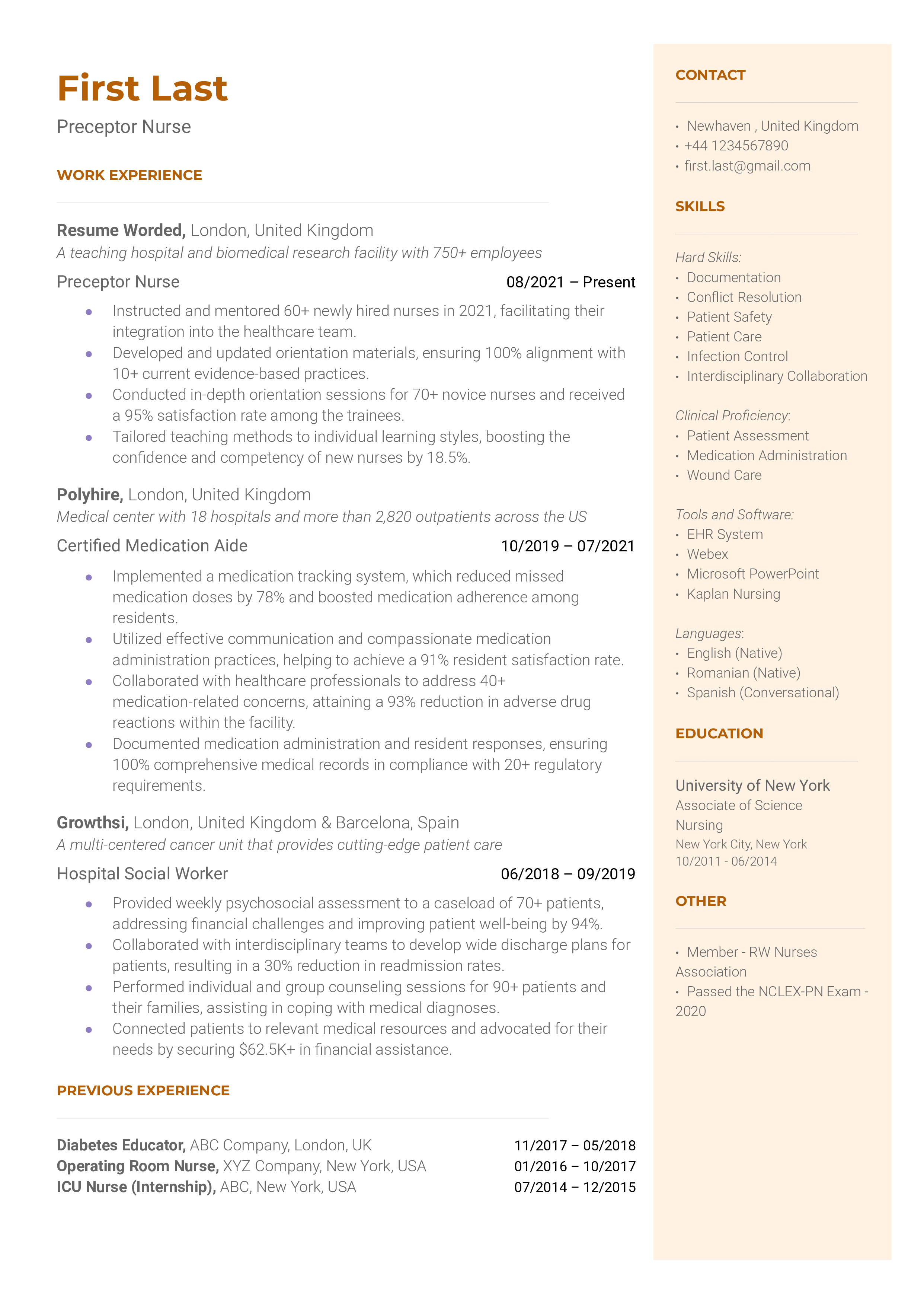
Tips to help you write your Preceptor Nurse CV in 2024
emphasize on teaching and mentoring experience.
As a Preceptor Nurse, you will be guiding new nurses. So, you should clearly outline any prior experience of teaching or mentoring in your CV, specifying the teaching approaches you used and how they improved orientation experiences.
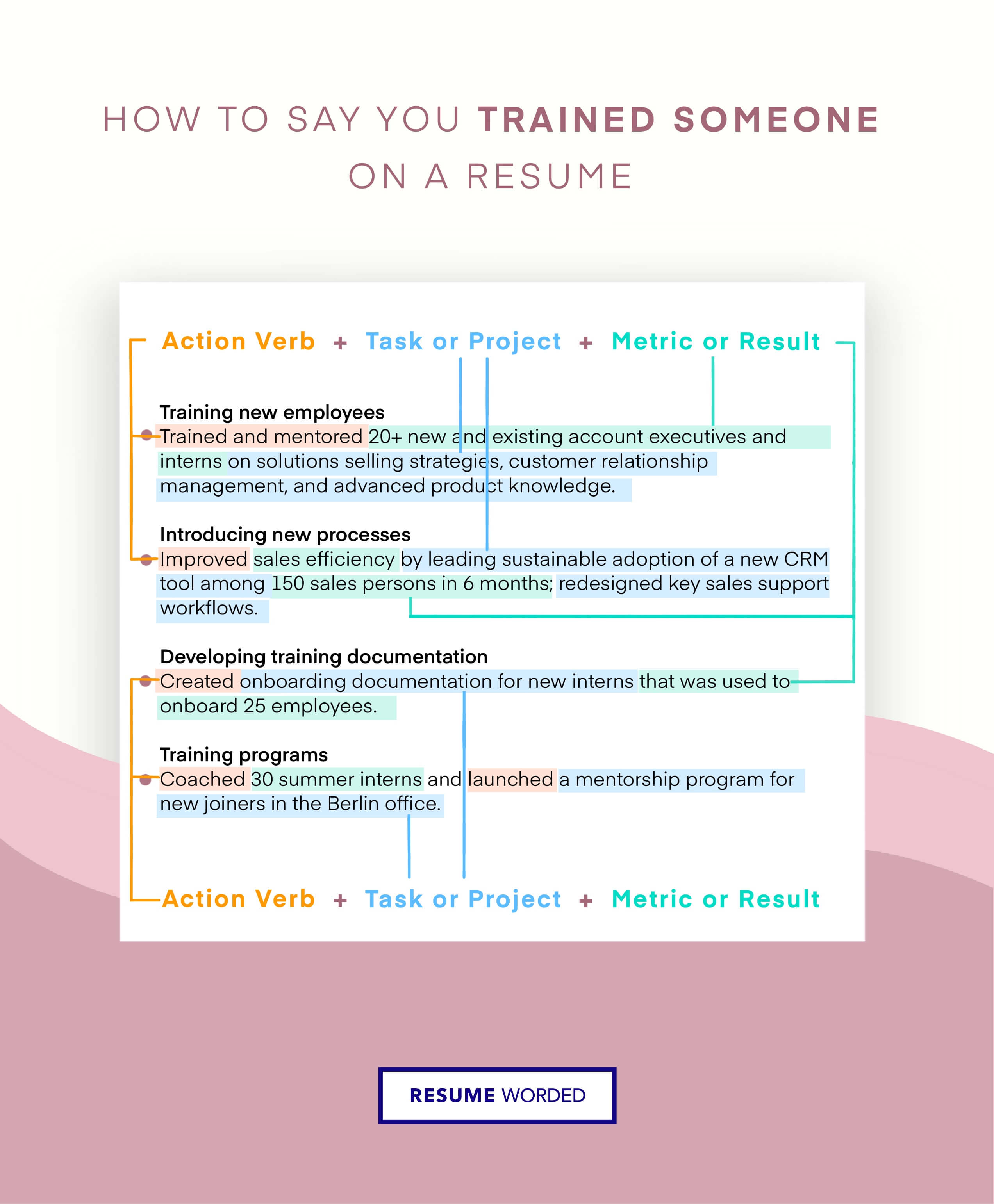
Show adaptability and continuous learning
This role requires you to adapt to new nursing practices and teaching methods. On your CV, list out instances where you've learned new medical practices, updated your training techniques or completed continuing education courses relevant to nursing education.
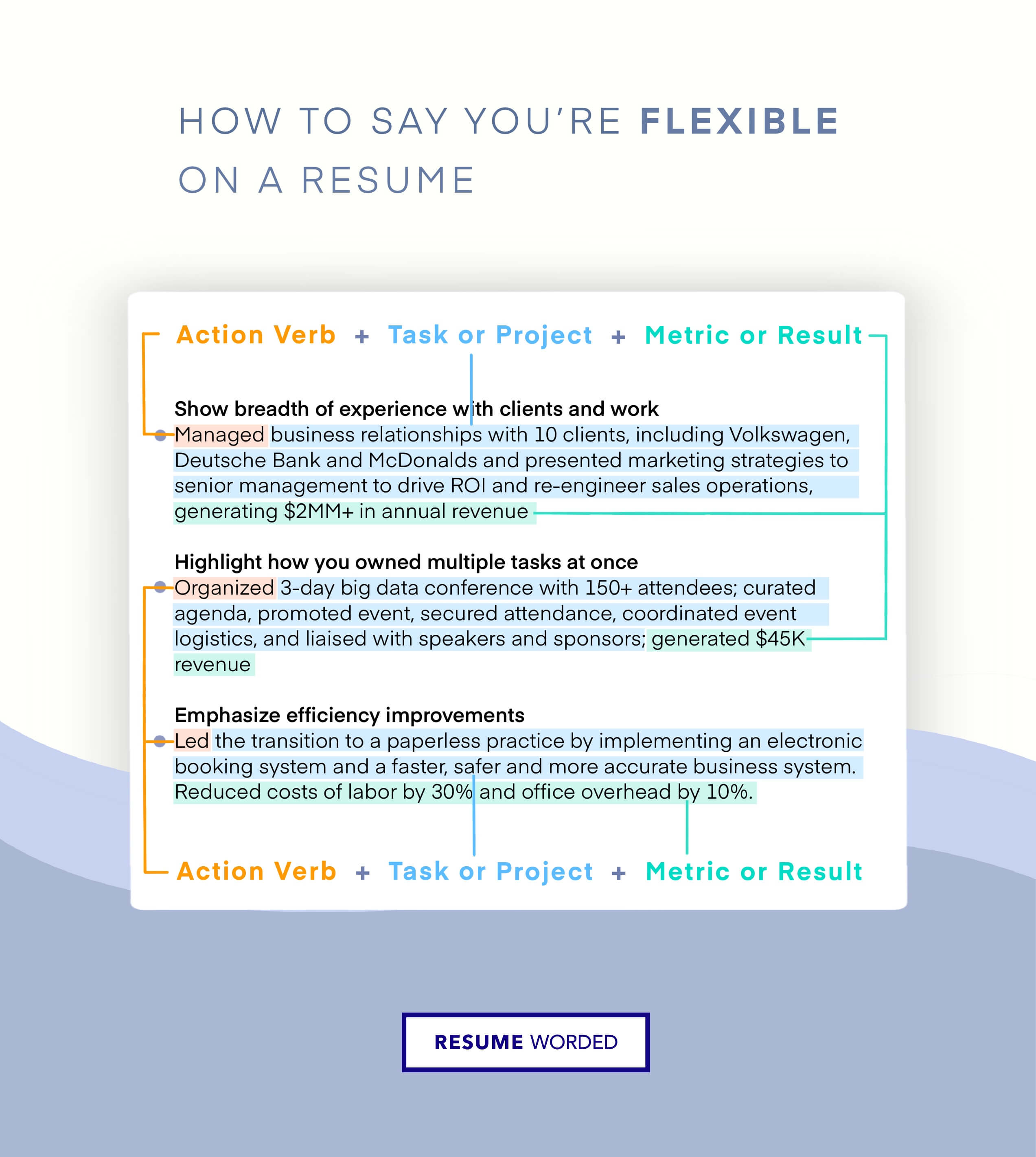
Skills you can include on your Preceptor Nurse CV
Template 34 of 42: relief charge nurse cv example.
A Relief Charge Nurse is the lifesaver of a healthcare environment. In the midst of all the chaos, they step in when the regular Charge Nurse is unavailable, ensuring smooth operations in the most stressful situations. The nursing industry is increasingly recognizing the critical role these professionals play, with more healthcare facilities now creating specific roles for Relief Charge Nurses. When you're crafting your CV, remember, it's about showcasing your adaptability, leadership skills, and clinical experience. You have to paint a picture of a nurse who can seamlessly fit into any team, help guide others, and provide top-tier patient care, all at a moment's notice.
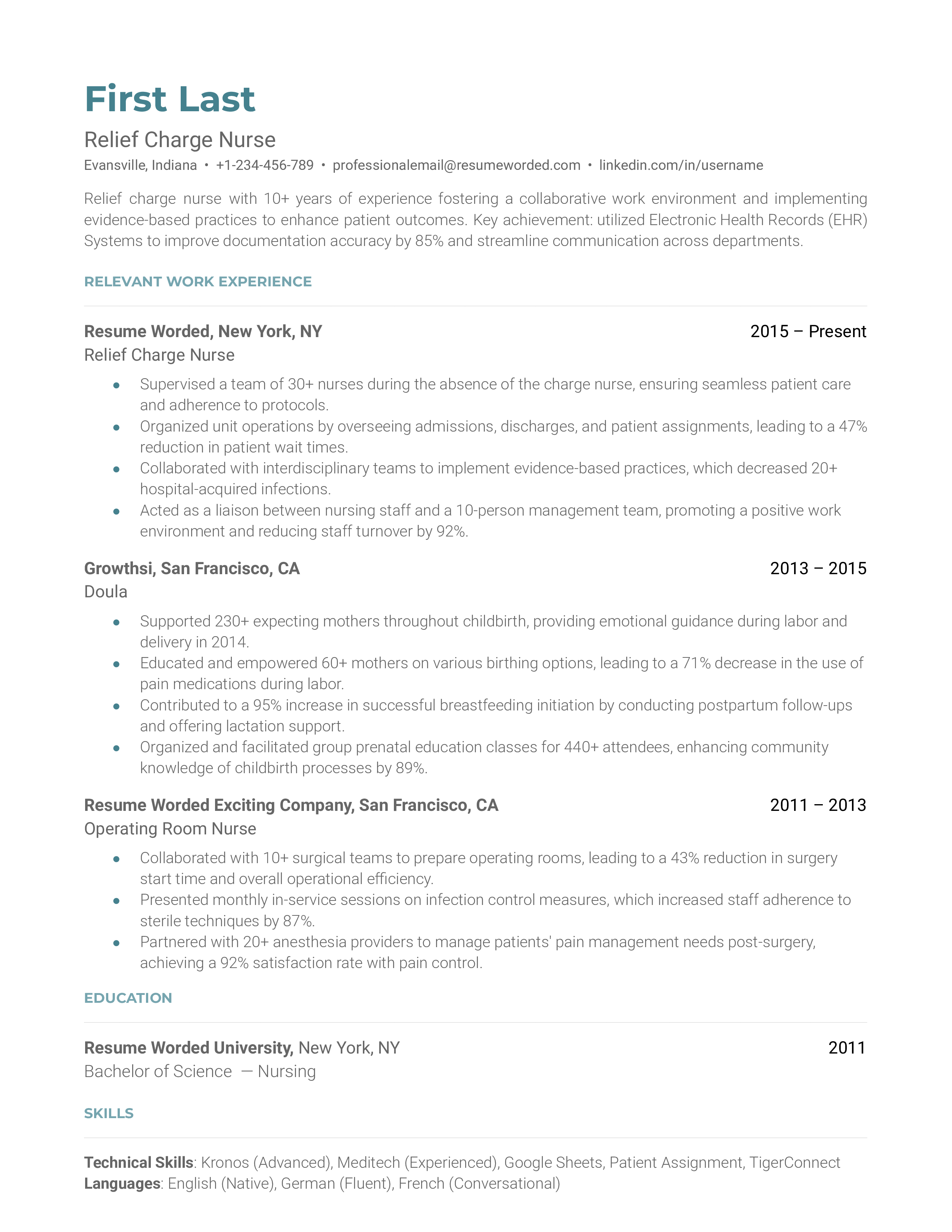
Tips to help you write your Relief Charge Nurse CV in 2024
show off your nursing certifications.
As with regular Charge Nurse roles, having advanced certifications goes a long way to show you're fit for a Relief Charge Nurse role. You may want to list any additional certifications you hold, like Advanced Cardiac Life Support (ACLS) or Pediatric Advanced Life Support (PALS). These are assets in any high-pressure nursing environment.
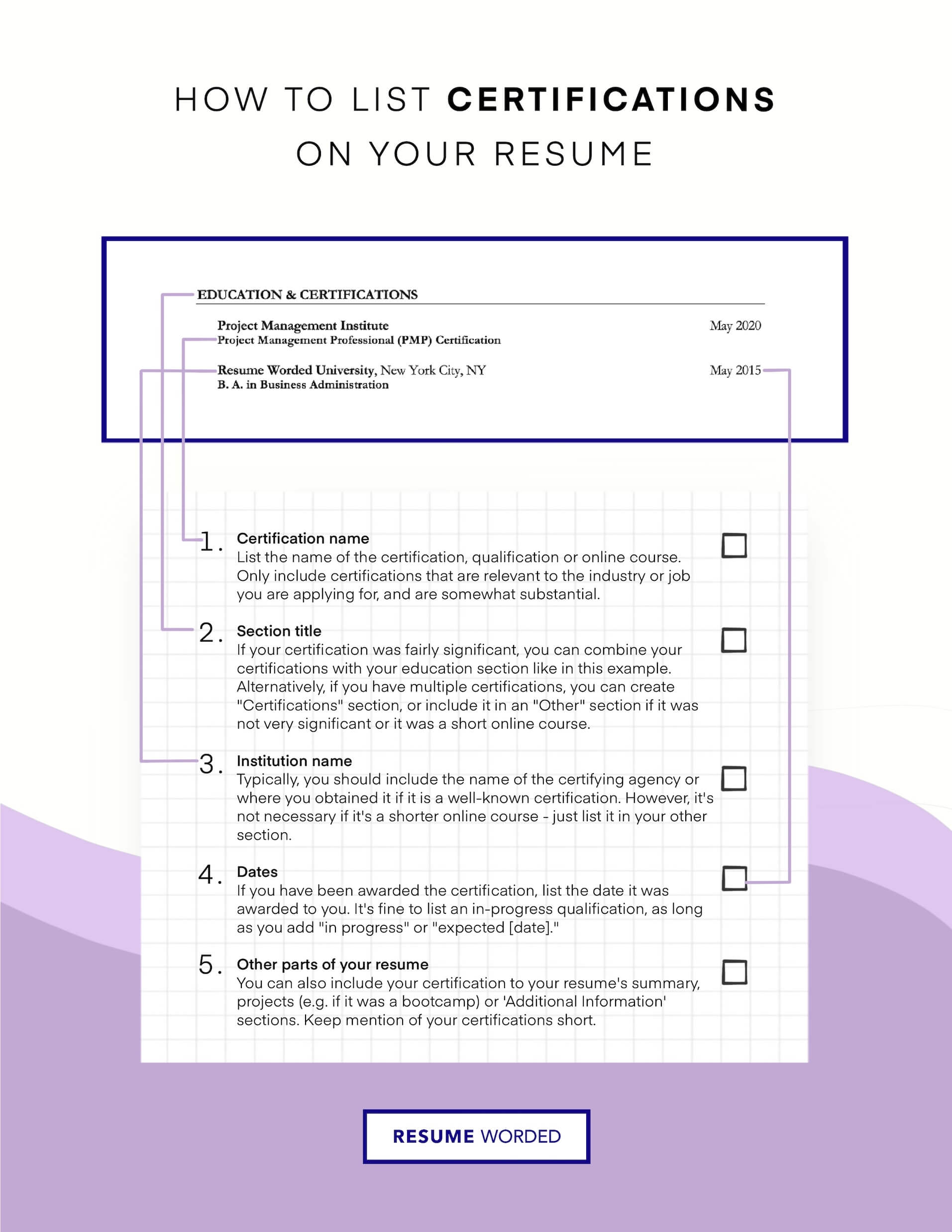
Highlight experience in multiple departments
Given the versatility required of a Relief Charge Nurse, you should demonstrate your experience across various hospital departments. Mention any rotations you have completed, or shifts you have worked in different areas that gave you varied clinical exposure. This showcases your breadth of knowledge and adaptability.
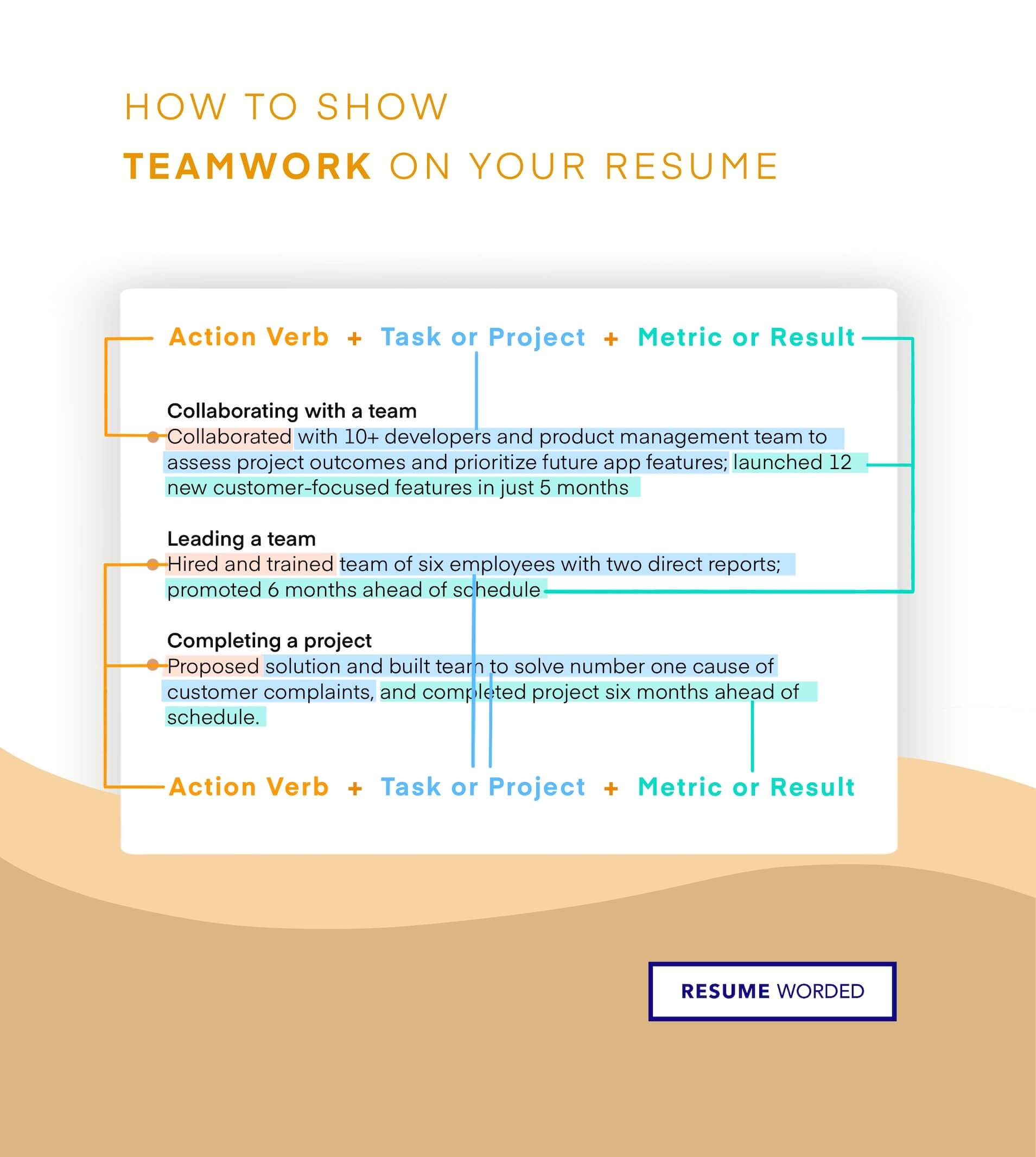
Skills you can include on your Relief Charge Nurse CV
Template 35 of 42: lpn nurse (licensed practical nurse) cv example.
As a licensed practical nurse (LPN), your day-to-day work involves a mix of patient care and administrative duties. The healthcare industry has been evolving rapidly, making it crucial for LPNs to stay updated with emerging trends. When you're crafting your CV, remember your potential employer will be looking for your adaptability and growth within this dynamic environment. It's less about the quantity of your previous nursing experience and more about the quality of care you've provided in your roles. Keep in mind, the CV is your chance to showcase not just your professional experiences but your unique approach towards patient care. In recent years, there has been a more substantial emphasis on interdisciplinary collaboration within healthcare. Hence, as an LPN, your ability to work in a team and your communication skills might hold as much importance as your nursing skills. When writing your CV, highlight experiences where you've cooperatively worked with a diverse team of healthcare professionals to improve patient outcomes.
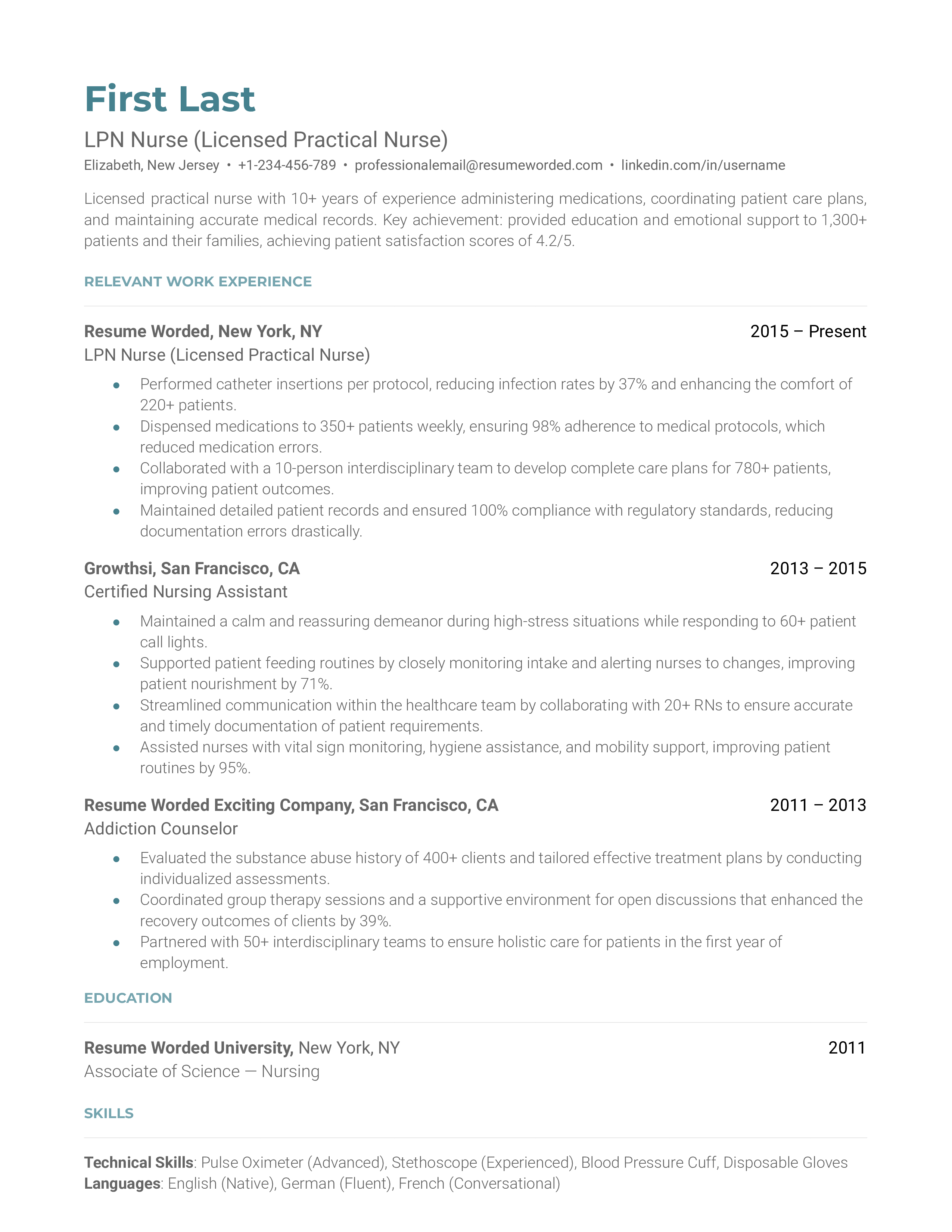
Tips to help you write your LPN Nurse (Licensed Practical Nurse) CV in 2024
demonstrate your adaptability.
As an LPN, you're used to fast paced and constantly changing environments. On your CV, illustrate this adaptability. Perhaps you've had to learn a new charting system or adapt to changing patient flow amid the pandemic. This shows you're not just surviving, but thriving in your role.
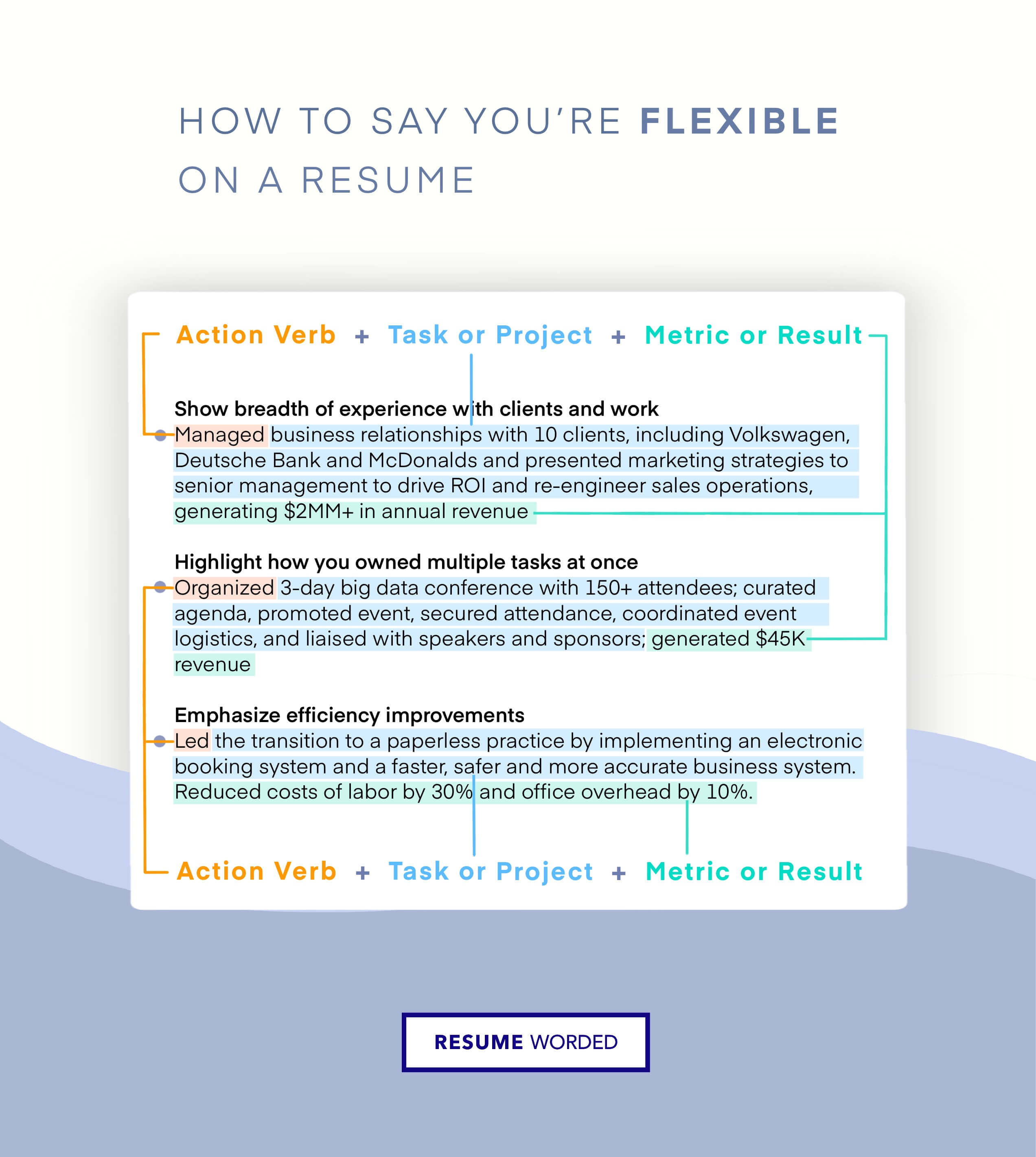
Show your interdisciplinary approach
With the shift towards a more team-based approach in healthcare, showcasing your ability to work within diverse teams is crucial. In your CV, include instances where you've liaised with doctors, physiotherapists, or social workers for patient care. This will portray you as a team player and a versatile nurse.
Skills you can include on your LPN Nurse (Licensed Practical Nurse) CV
Template 36 of 42: lpn nurse (licensed practical nurse) cv example.
As a Licensed Practical Nurse (LPN), your CV serves as a reflection of your clinical skills, passion for patient care, and understanding of current healthcare trends. This role has seen significant changes recently, with a greater emphasis on handling complex patient cases and familiarity with telehealth platforms, as home healthcare services are booming. When crafting your CV, it's crucial to showcase how you adapt to these changing trends and what unique qualities you bring to the table. Illustrating your ability to multitask effectively in fast-paced settings, handle pressure and take on a variety of tasks is critical. But, it's not just about the skills you possess, it's about how you use them. So think about your achievements, not just your daily tasks when putting pen to paper.
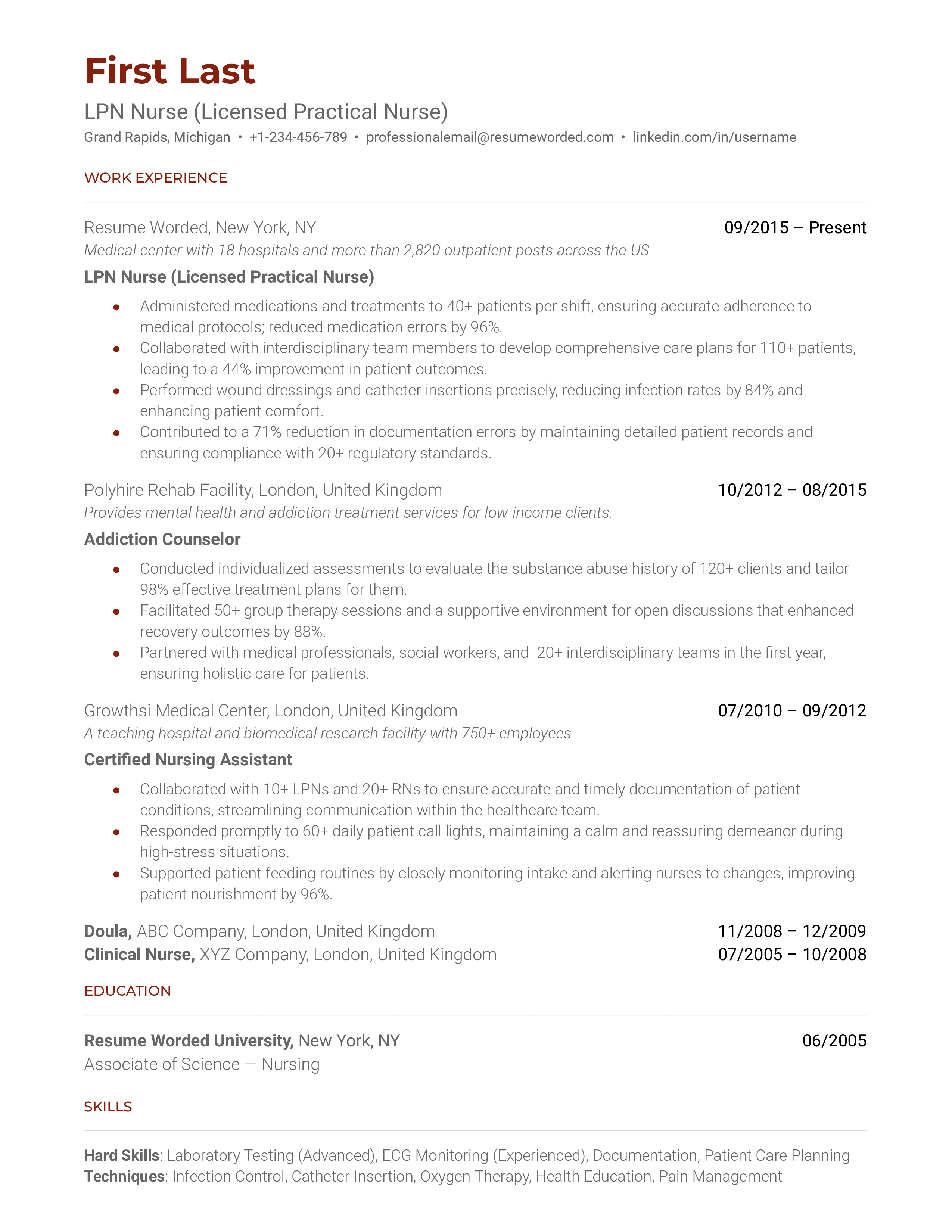
Demonstrate adaptability and resilience
As an LPN, you often work in challenging and dynamic environments. Show how you've adapted to changing circumstances, such as adapting to new healthcare regulations or technologies, or handling stressful situations with grace and professionalism.

Showcase patient care skills
Your CV should indicate your dedication to patient care. Use specific examples to demonstrate this - maybe you've implemented a new way to improve patient communication, or you ensured a high standard of care during a particularly challenging shift.
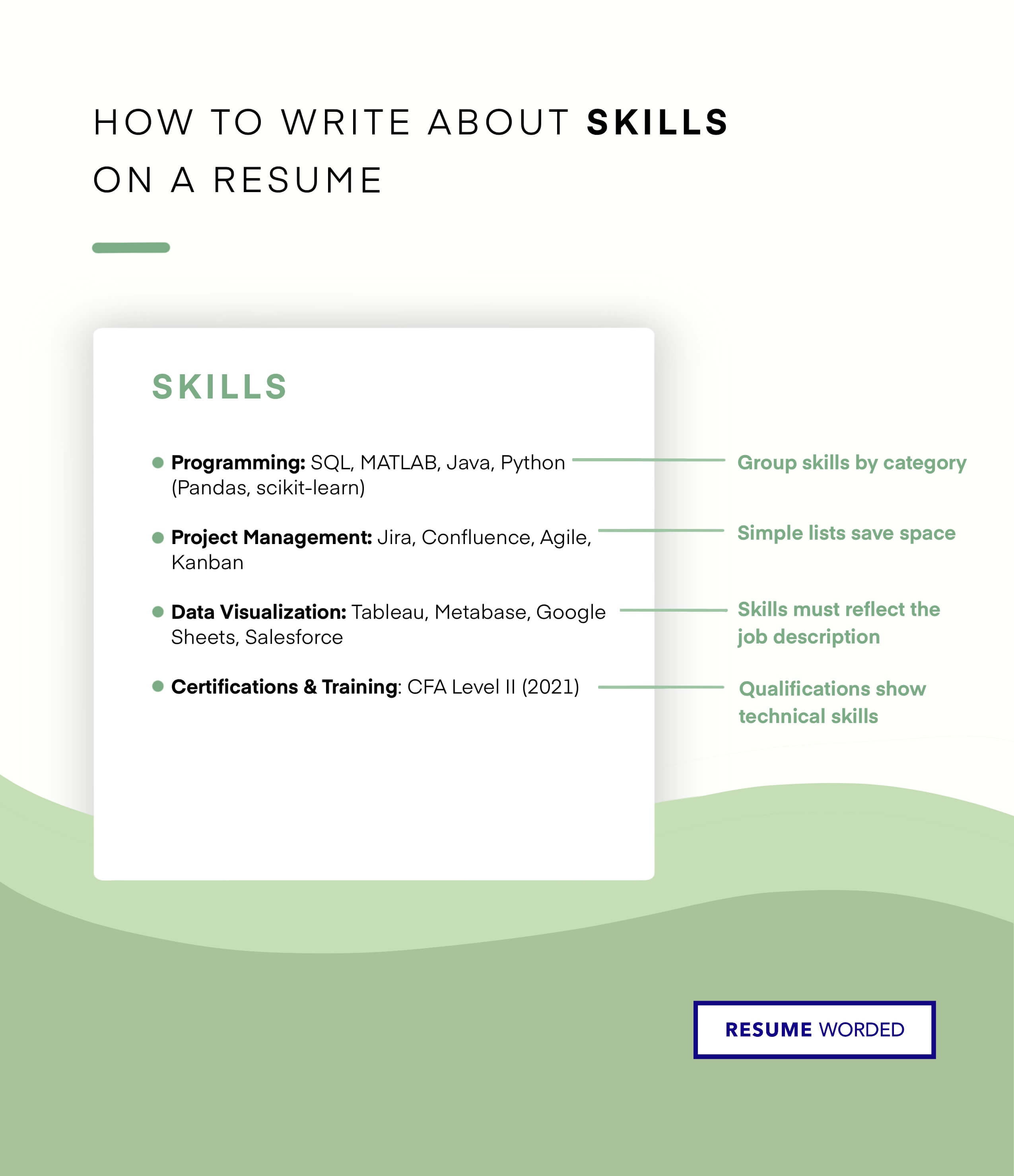
Template 37 of 42: LVN Nurse (Licensed Vocational Nurse) CV Example
As an LVN nurse, you're the backbone of the healthcare industry, providing critical support to doctors and registered nurses. In recent times, we've observed an uptick in demand for LVN roles with a particular focus on geriatric and home healthcare services. This shift has altered what hiring managers look for in a CV. They want clear evidence of your practical nursing skills, but also, increasingly, your ability to adapt to a variety of care settings. A standout CV for an LVN should be more than just a list of your credentials. It's a chance to demonstrate your dedication, flexibility, and patient-focused philosophy.
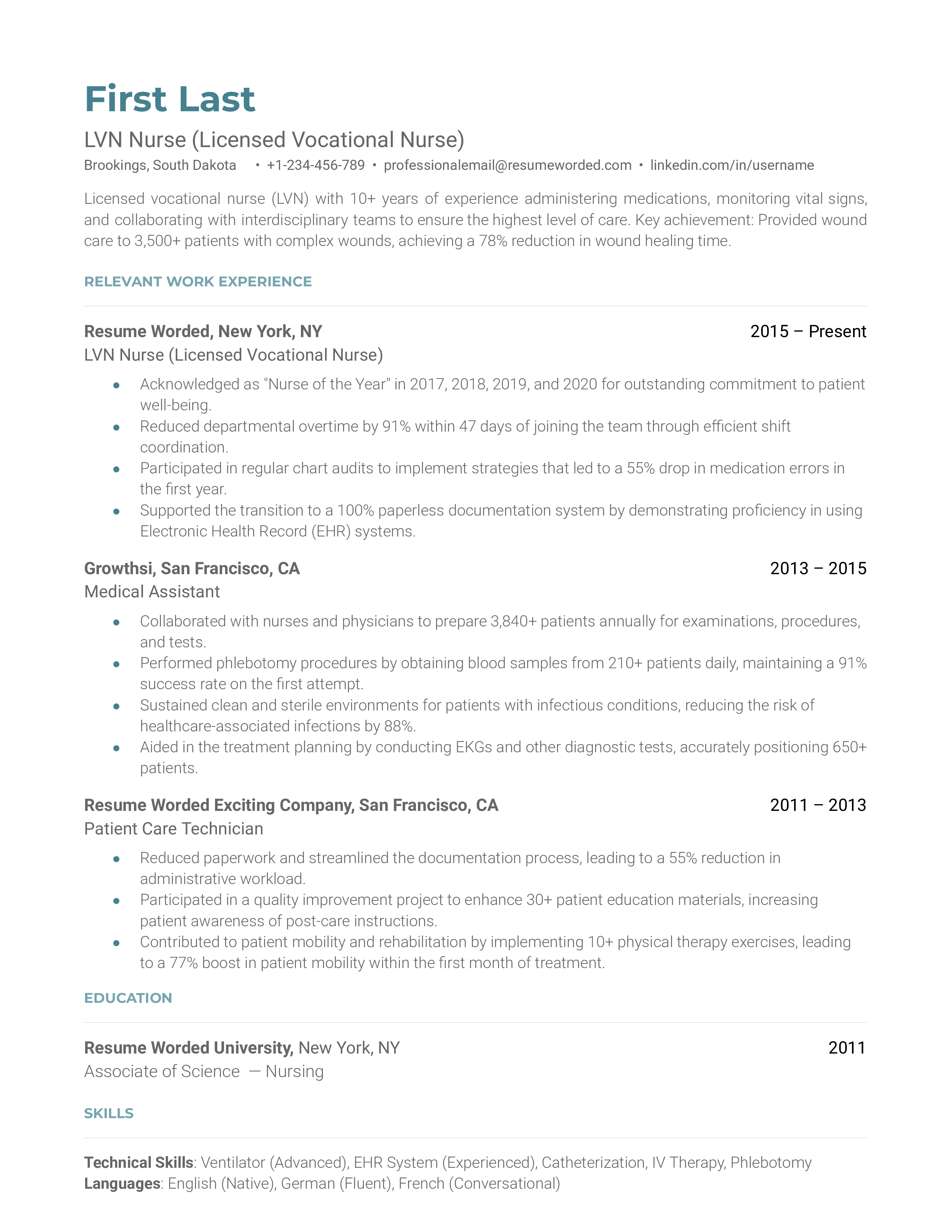
Tips to help you write your LVN Nurse (Licensed Vocational Nurse) CV in 2024
show your range of practical skills.
In the skills section of your CV, include the wide array of practical tasks you're adept at. From administering medication to wound care, these specifics show you're ready for the day-to-day realities of an LVN role.
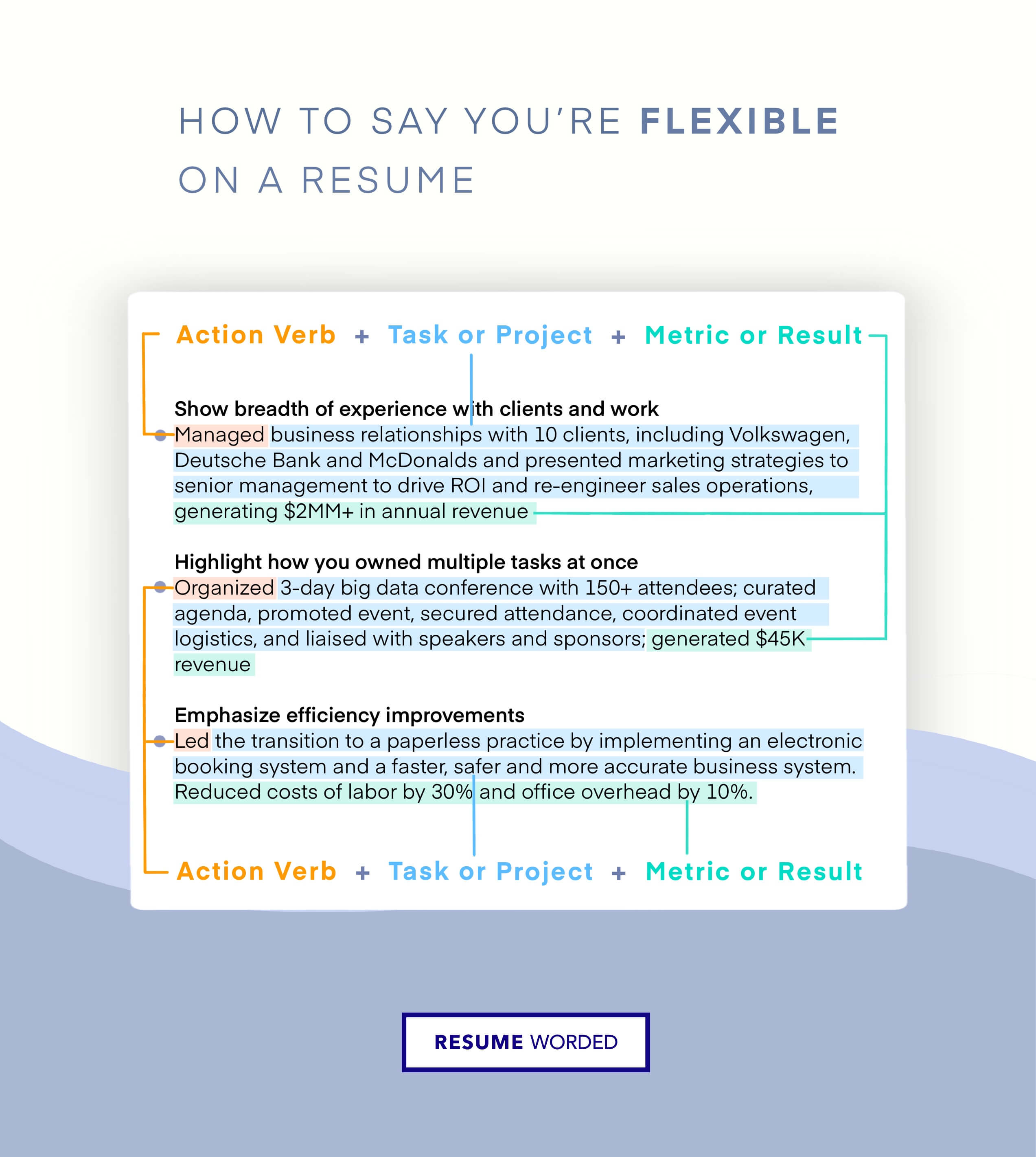
Include experiences where you've worked in different healthcare settings, such as hospitals, nursing homes, or private residences. This adaptability is a valuable asset in today’s dynamic healthcare environment and will demonstrate your versatility to potential employers.

Skills you can include on your LVN Nurse (Licensed Vocational Nurse) CV
Template 38 of 42: lvn nurse (licensed vocational nurse) cv example.
As an LVN Nurse, you play a vital role in healthcare, providing essential patient care under the supervision of registered nurses and doctors. In this rapidly-evolving sector, it's necessary to show that you're at the forefront of new practices in your CV. Employers are increasingly looking for vocational nurses who are up-to-date with the latest telehealth technologies and remote patient care trends. When writing your CV, it's crucial to convey your professional relevance, demonstrating your commitment to ongoing learning and your ability to adapt to new situations and technology.
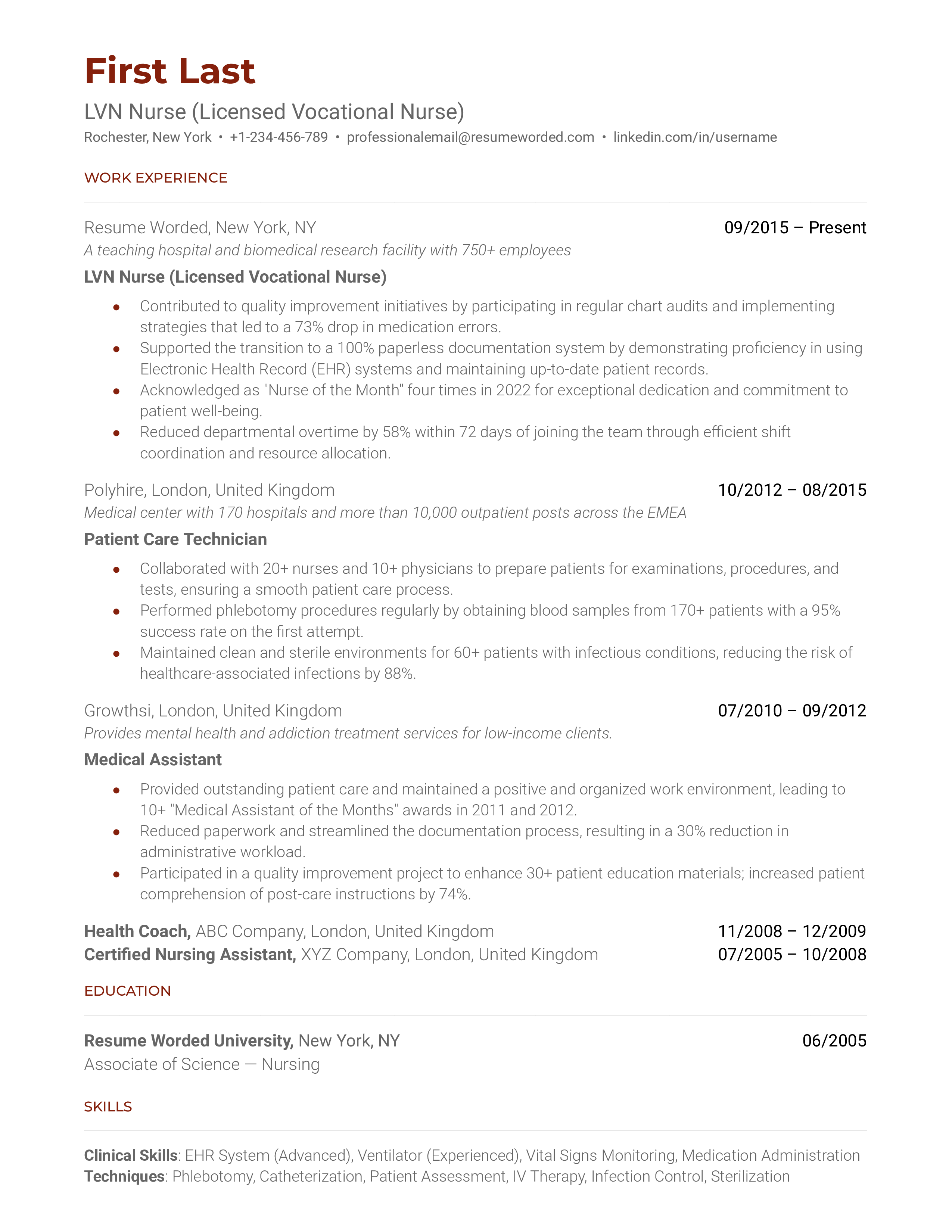
Showcase specific nursing skills
Considering the hands-on nature of your role, it's crucial that you list the specific nursing-related skills you possess. For instance, wound dressing, administering medication, or taking vitals. Showing your capability in these areas will give employers confidence in your abilities.
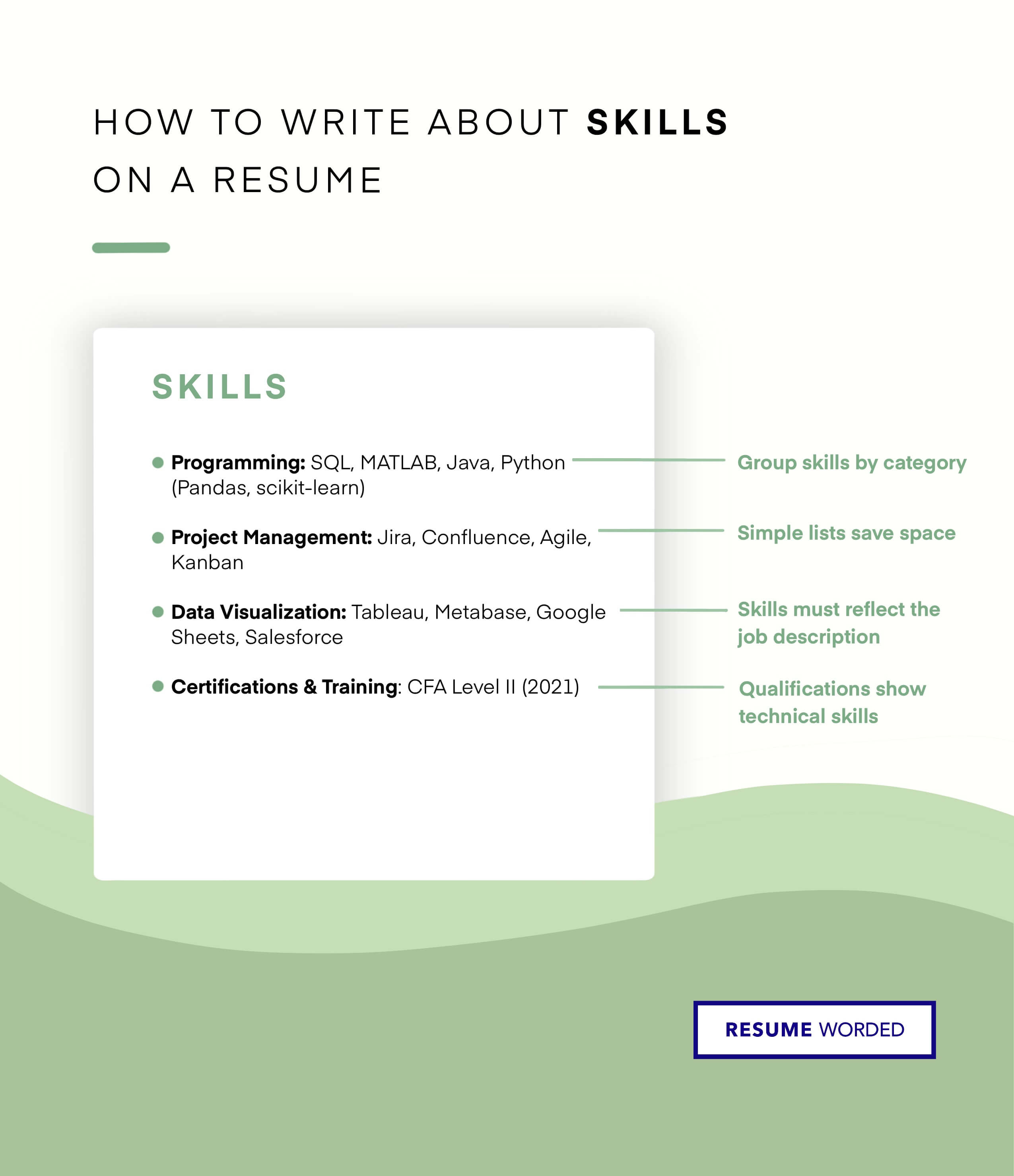
Highlight experience with telehealth technologies
With the rise in telehealth and remote patient care, you should indicate any experience you have with these tools on your CV. Examples could include using video conferencing for patient consultations or electronic health record (EHR) systems for patient documentation.
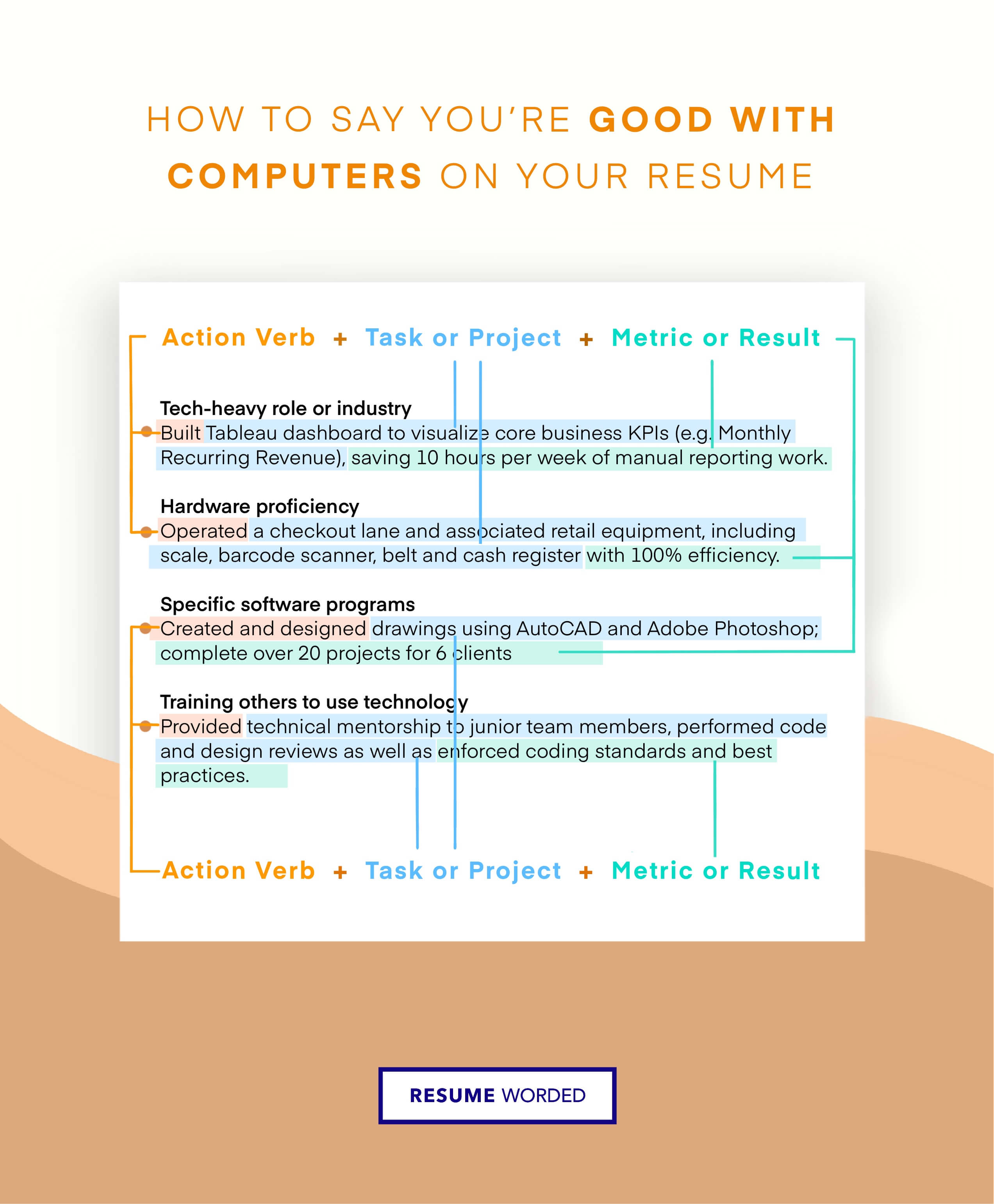
Template 39 of 42: ICU Charge Nurse CV Example
An ICU Charge Nurse doesn't just sit in the heart of the chaos of an Intensive Care Unit, but manages it. You're a conductor, orchestrating everything from patient care to staff assignments. The healthcare industry's recent emphasis on leadership skills in this role means your CV needs to focus on demonstrating this skill set. It's crucial to remember admissions committees and recruiters are looking for evidence of your interpersonal skills, ability to manage stressful situations and detailed knowledge of clinical practices. So, your CV should be a balance between your managerial and nursing skills.
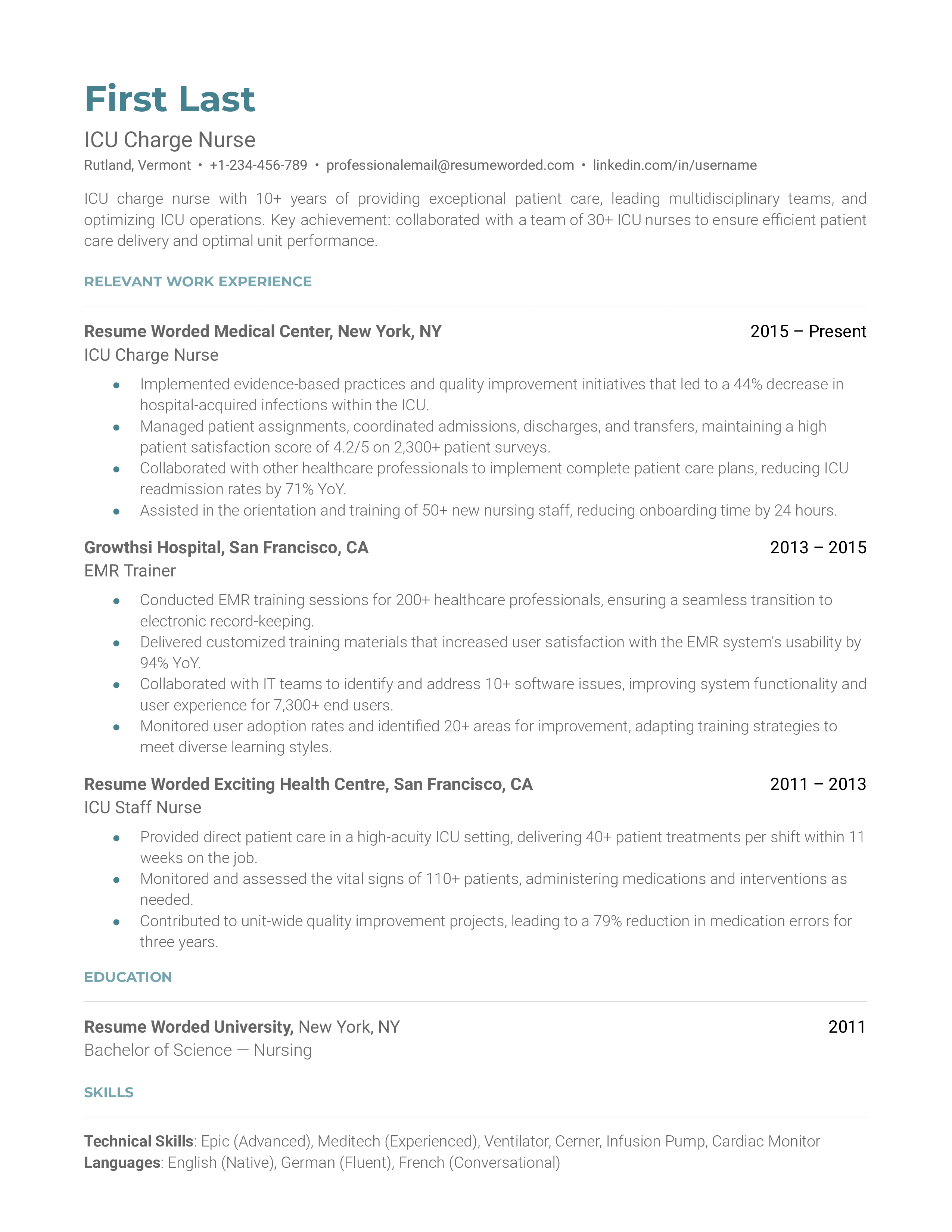
Tips to help you write your ICU Charge Nurse CV in 2024
show your grasp of icu protocols.
It's not enough to just mention you're experienced in ICU procedures. You need to provide specific examples of how you've applied these protocols, like managing ventilator care or handling sepsis cases. This gives recruiters a clearer picture of your hands-on experience.
Showcase your leadership skills
As an ICU Charge Nurse, you're not just part of the team, you're leading it. Detail instances where you've delegated tasks, mentored newcomers, or coordinated with doctors and other departments. This shows you have the necessary leadership skills for the role.
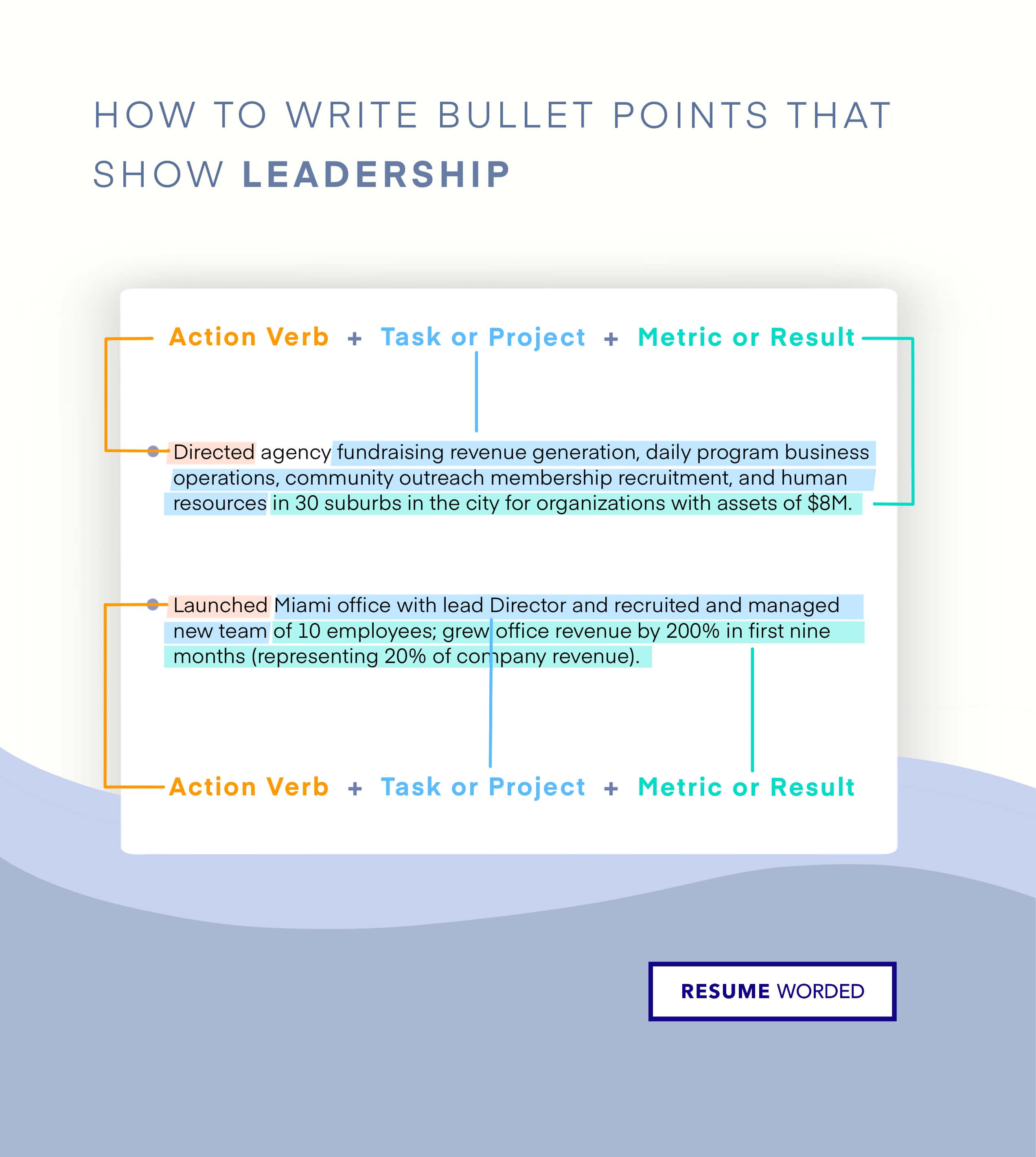
Skills you can include on your ICU Charge Nurse CV
Template 40 of 42: prior authorization nurse cv example.
Being a Prior Authorization Nurse, you find yourself in a unique position within the healthcare industry. Your work is vital for both patients and healthcare providers, since it plays a key role in managing costs while ensuring proper care. Recent trends show an increased emphasis on cost efficiency in healthcare, making your role even more crucial. When putting together your CV, recognize the niche you operate in. It’s important to not only convey your medical knowledge but also your understanding of healthcare policies, procedures, and cost-management strategies. Being detail-oriented and having excellent communication skills are also key traits employers look for in this role.
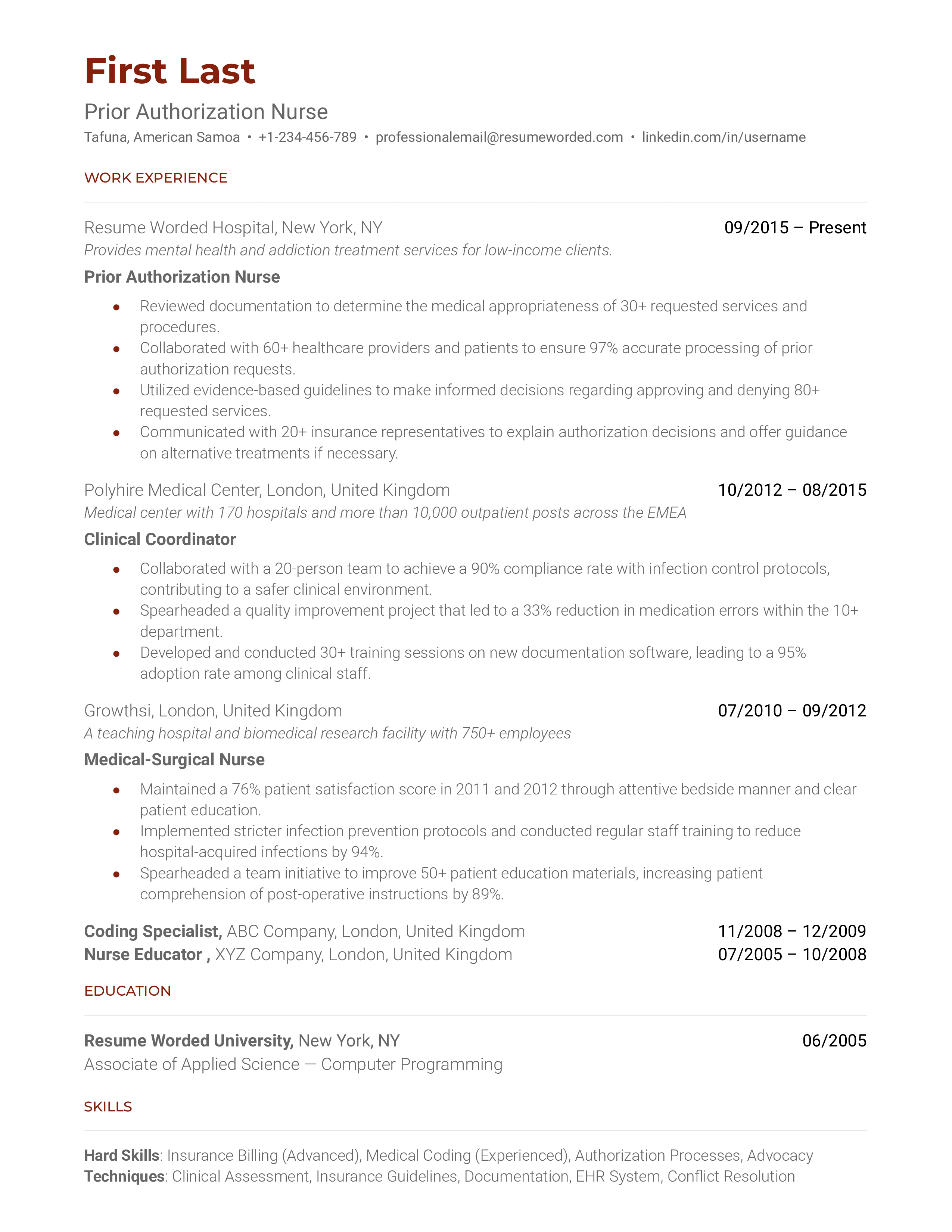
Tips to help you write your Prior Authorization Nurse CV in 2024
emphasize knowledge of medical procedures and terminologies.
As a Prior Authorization Nurse, you liaise between physicians, insurance companies, and patients. Your CV should reflect your deep understanding of medical terminologies and procedures. This knowledge enables you to review and interpret medical documents effectively, thus ensuring that nothing is lost in translation.
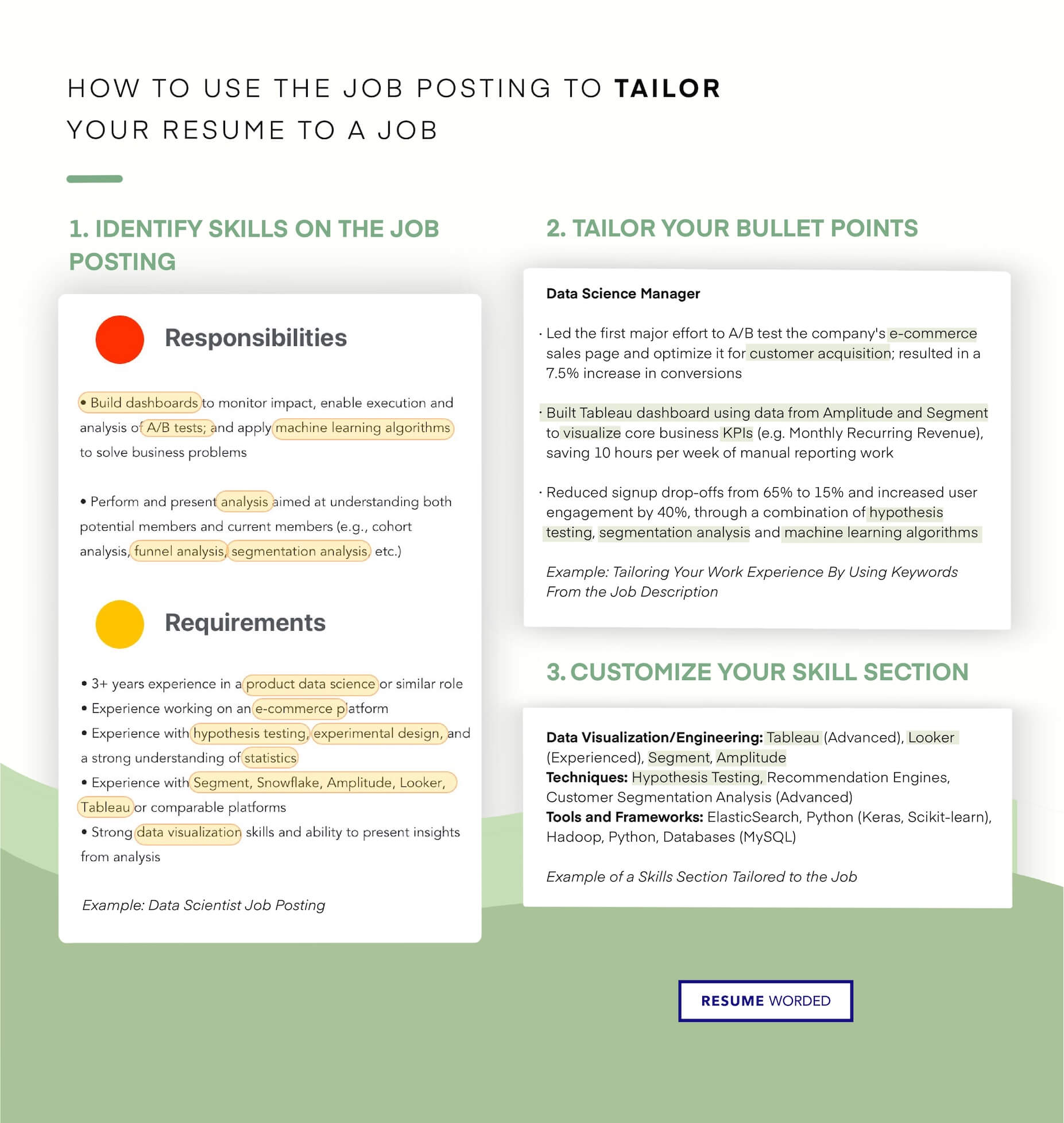
Showcase ability to interpret health insurance policies
Ability to interpret health insurance policies is a big part of your job. Your CV should demonstrate that you can analyze and understand complex health insurance guidelines and policies. This reassures employers that you can accurately authorize or deny procedures based on policy guidelines.
Skills you can include on your Prior Authorization Nurse CV
Template 41 of 42: clinic nurse cv example.
As a Clinic Nurse, your role includes a range of duties such as providing proper patient care, administering treatments, and collaborating with medical staff. Crafting a CV for this role requires showcasing real-life experiences of these tasks. Recently, there's a growing need for nurses specialized in telemedicine and remote patient monitoring, so your CV should reflect your adaptability to these trends. When you're writing your CV, remember to not just list your skills and qualifications, but also demonstrate how you've applied them in practice.
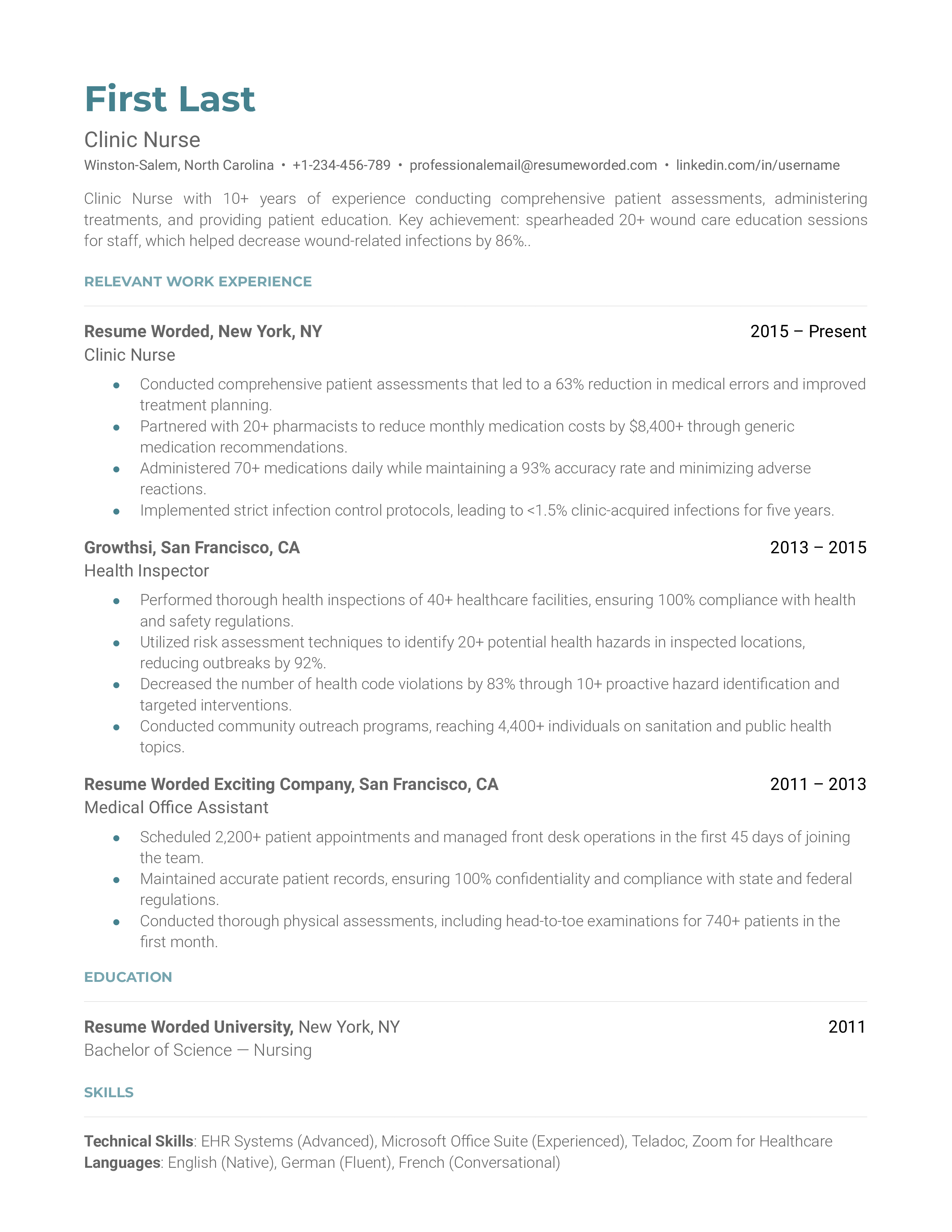
Tips to help you write your Clinic Nurse CV in 2024
show your specialization.
If you've specialized in a particular area of nursing, say, pediatric or geriatric care, mention it in your CV. Specializations show that you're not just a general nurse but an expert in a distinct field. This will make you stand out, as clinics often prefer nurses with specific expertise.
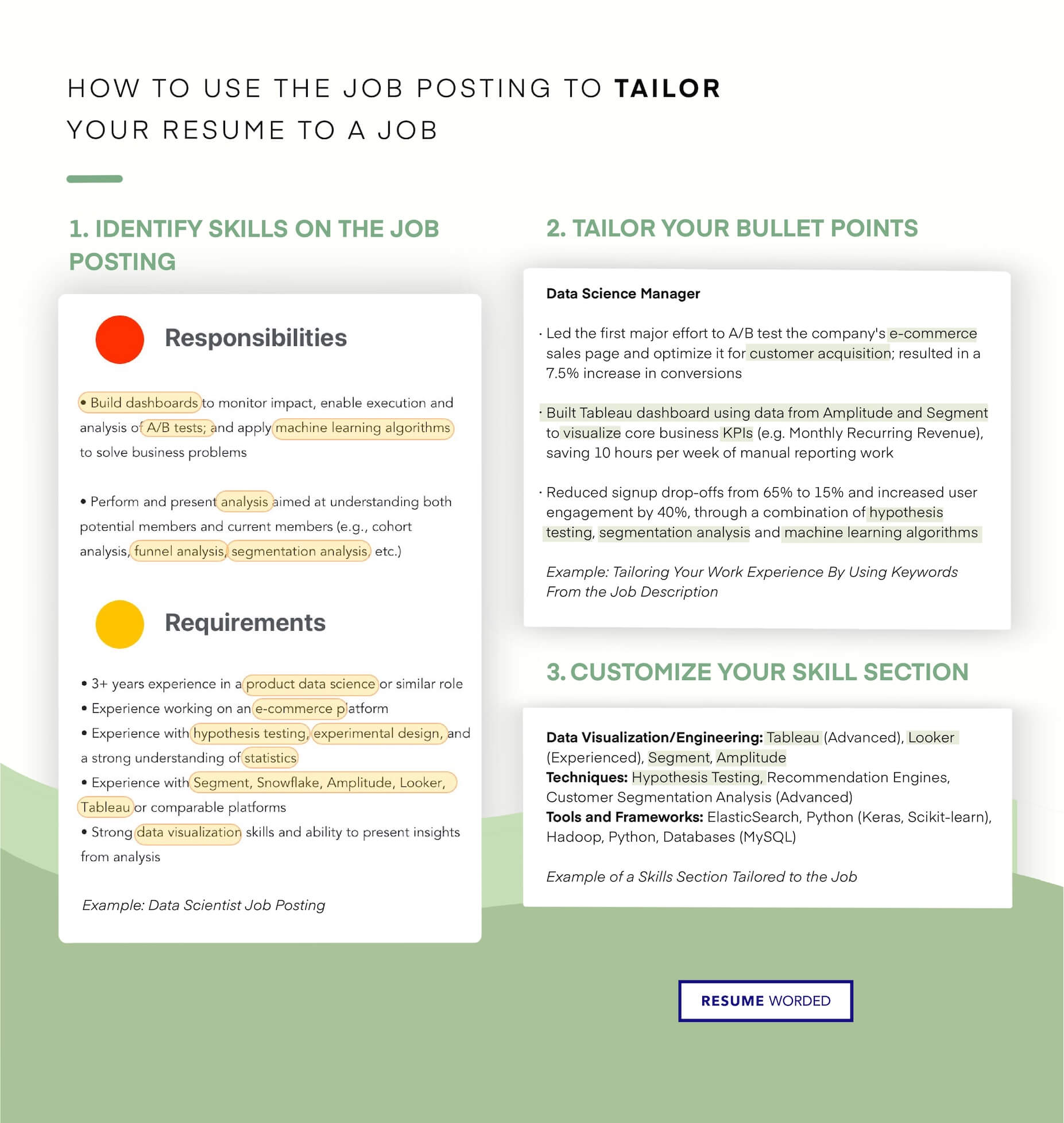
As a clinic nurse, you need to be adaptable to technological advancements in healthcare such as telemedicine. In the experience section of your CV, provide examples of when you've had to quickly adapt to new systems or practices in a clinical setting.
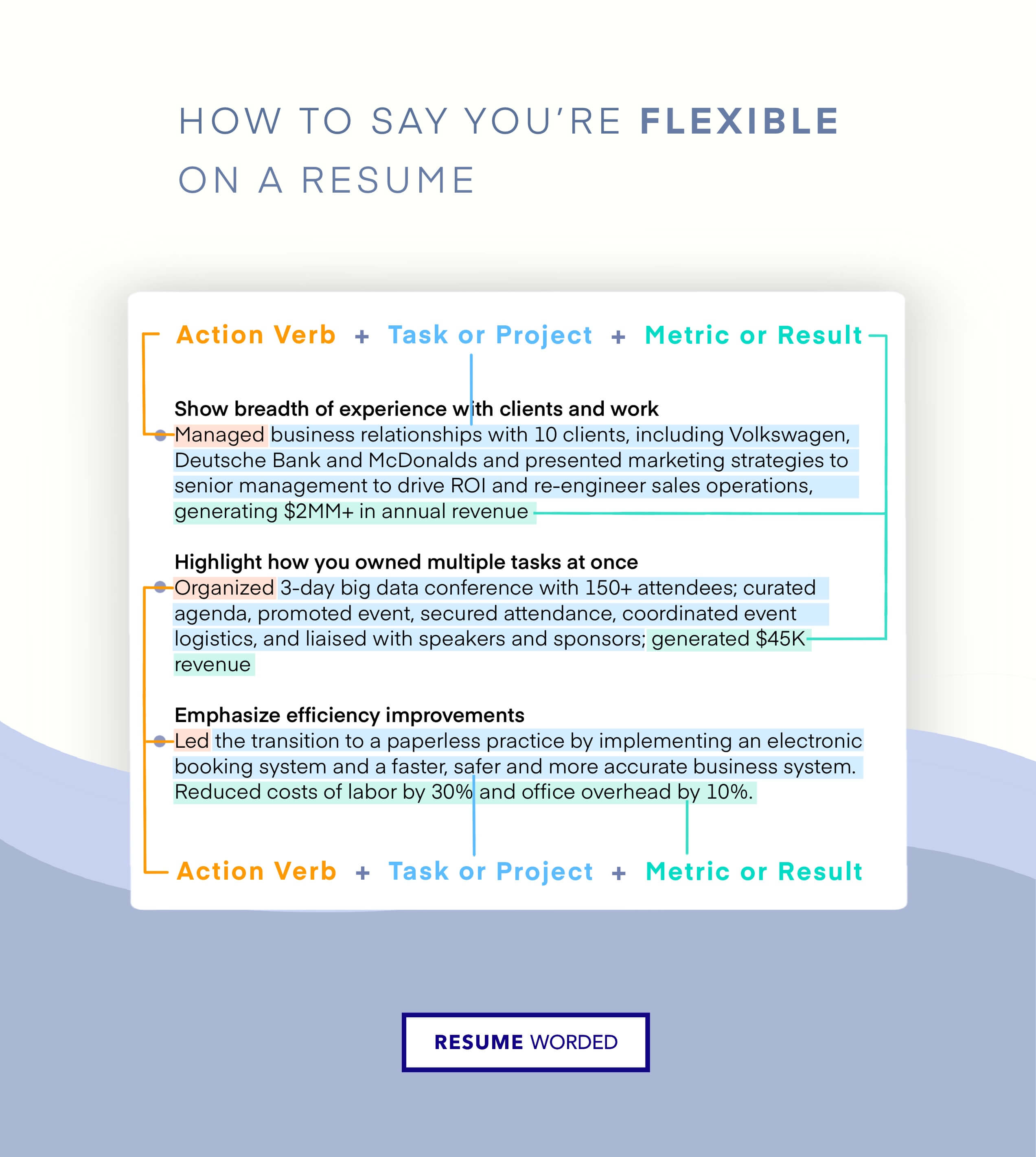
Skills you can include on your Clinic Nurse CV
Template 42 of 42: medical surgical nurse cv example.
As a Medical Surgical Nurse, your role is multi-faceted and complex. You're expected to juggle a plethora of tasks; from administering medications to monitoring patient recovery, all while liaising with a team of healthcare professionals. In recent years, the demand has increased significantly for these nurses due to an aging population and heightened focus on preventative care. When crafting your CV, remember the importance of demonstrating tangible proof of your skills, experience, and adaptability. Furthermore, showcase the breadth of your nursing background, but also make sure to demonstrate a consistent focus on medical-surgical care.
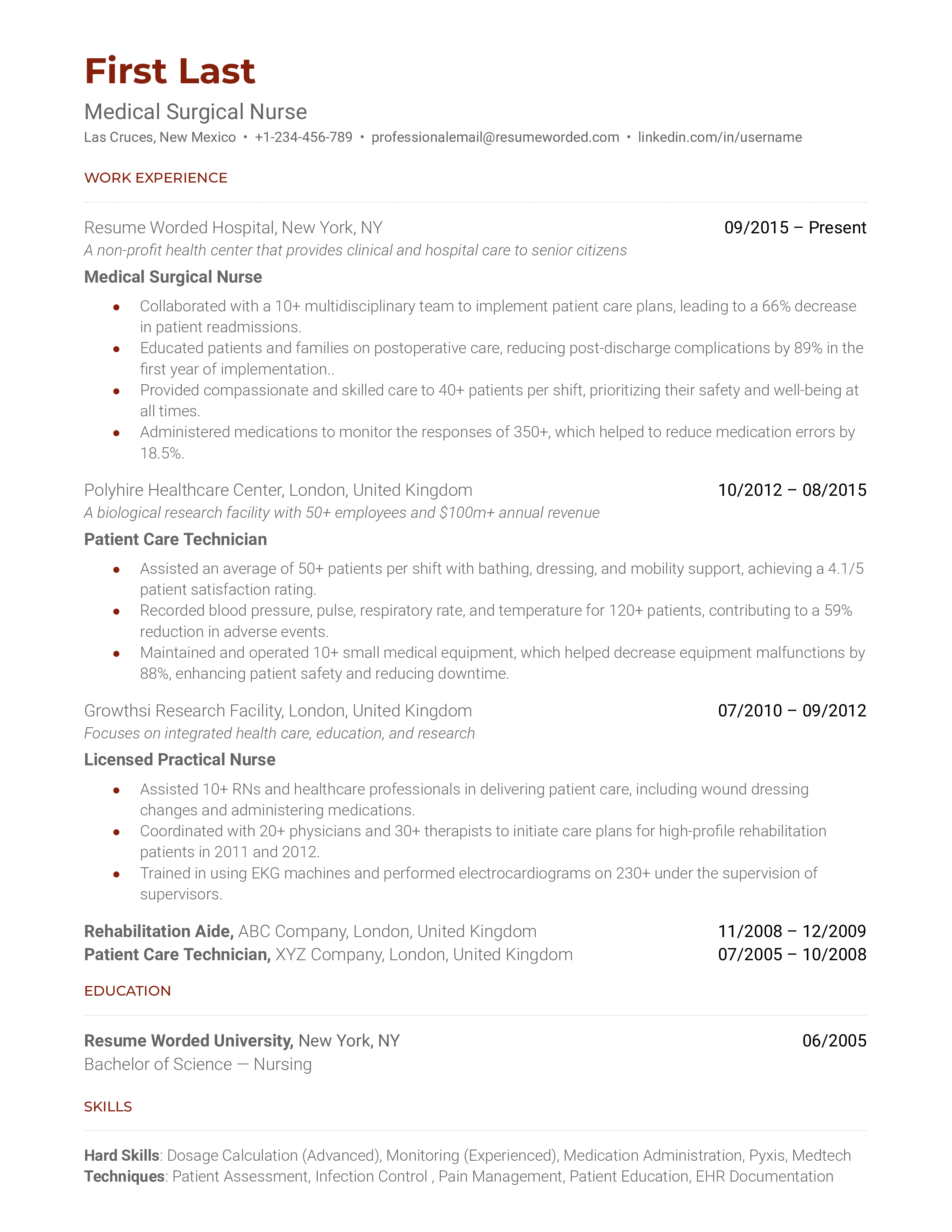
Tips to help you write your Medical Surgical Nurse CV in 2024
emphasize on patient care outcomes.
Medical Surgical Nurses do more than just administer medicine; they improve the lives of patients. In your CV, talk about how you've contributed to improved patient outcomes. Discuss any strategies you have implemented or specific cases where your actions had a positive impact.
Demonstrate awareness of current health trends
As a Medical Surgical Nurse, you need to stay updated with current health trends and advancements in medical procedures. Show instances in your CV where you've kept up-to-date with the latest in your field, such as attending conferences, webinars, or undergoing further education.
Skills you can include on your Medical Surgical Nurse CV
Skills for nursing resumes.
In the pulse-racing world of nursing, your CV serves as the heartbeat of your job application. It breathes life into your skills, mirroring your healthcare heroics to the eyes of the hiring managers. The most important skills to display are ones that meet the job description. These might include bed-side manner, medical software know-how, and speedy decision-making. Listing these in your CV’s Skills section shows your readiness for the role. Nursing isn’t all about quick actions though. There's a lot of know-how and data navigation needed. For example, penning a bullet point like “Managed patient data using Electronic Health Records software” shows you're not a stranger to tech. Getting your CV 'patient-ready' should be on your skilful surgeon's list. With Applicant Tracking Systems (ATS) acting as the front-line ‘triage nurse’, your CV needs to have the right skills to get past this digital gatekeeper. Much like a stethoscope listens for a healthy heart, the ATS scans for vital skills in your CV. Putting all the right skills in the right places helps you slip through and secure an interview.
- Strategic Planning
- Cardiopulmonary Resuscitation (CPR)
- Emergency Nursing
- Healthcare Management
- Customer Service
- Inpatient Care
- Patient Safety
- Quality Improvement
- Nursing Process
- Public Health
- Clinical Research
- Advanced Cardiac Life Support (ACLS)
- Nursing Education
- Nursing Management
- Basic Life Support (BLS)
- Patient Advocacy
- Healthcare Information Technology (HIT)
- Critical Care Nursing
- Medical-Surgical
- Patient Education
- Electronic Medical Record (EMR)
Skills Word Cloud For Nursing CVs
This word cloud highlights the important keywords that appear on Nursing job descriptions and CVs. The bigger the word, the more frequently it appears on job postings, and the more 'important' it is.
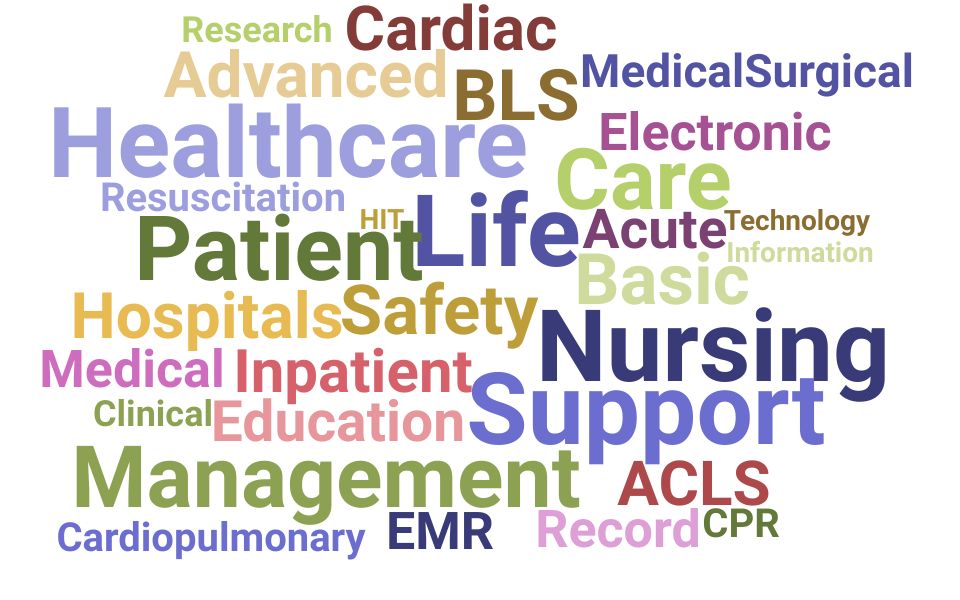
How to use these skills?
Action verbs for nursing resumes.
The lifeblood of a vibrant nursing CV is 'action verbs'. These words paint a picture of you, up and doing. They show you as a nurse who cares, heals, guides, and comforts. Which are, after all, the heart of what being a nurse is all about. Action verbs whisper to the hiring managers, "This is someone who does good work." Let's take the verb "administered" as an example. Instead of saying "gave medication", you can write "administered medication to 30 patients daily". This shows you in action, with a hint of the scale of your work. Or how about "coordinated"? Rather than "worked with team", try "coordinated with a team of 8 to deliver patient care". This tells a story of unity, teamwork and leadership. Remember, your CV is your story. Let it echo with the drumbeat of action verbs that highlight what you do best.
- Administered
- Coordinated
- Facilitated
- Implemented
- Recommended
For more related action verbs, visit Nursing Action Verbs .
For a full list of effective CV action verbs, visit Resume Action Verbs .
Other Medical Resumes
Dental assistant.
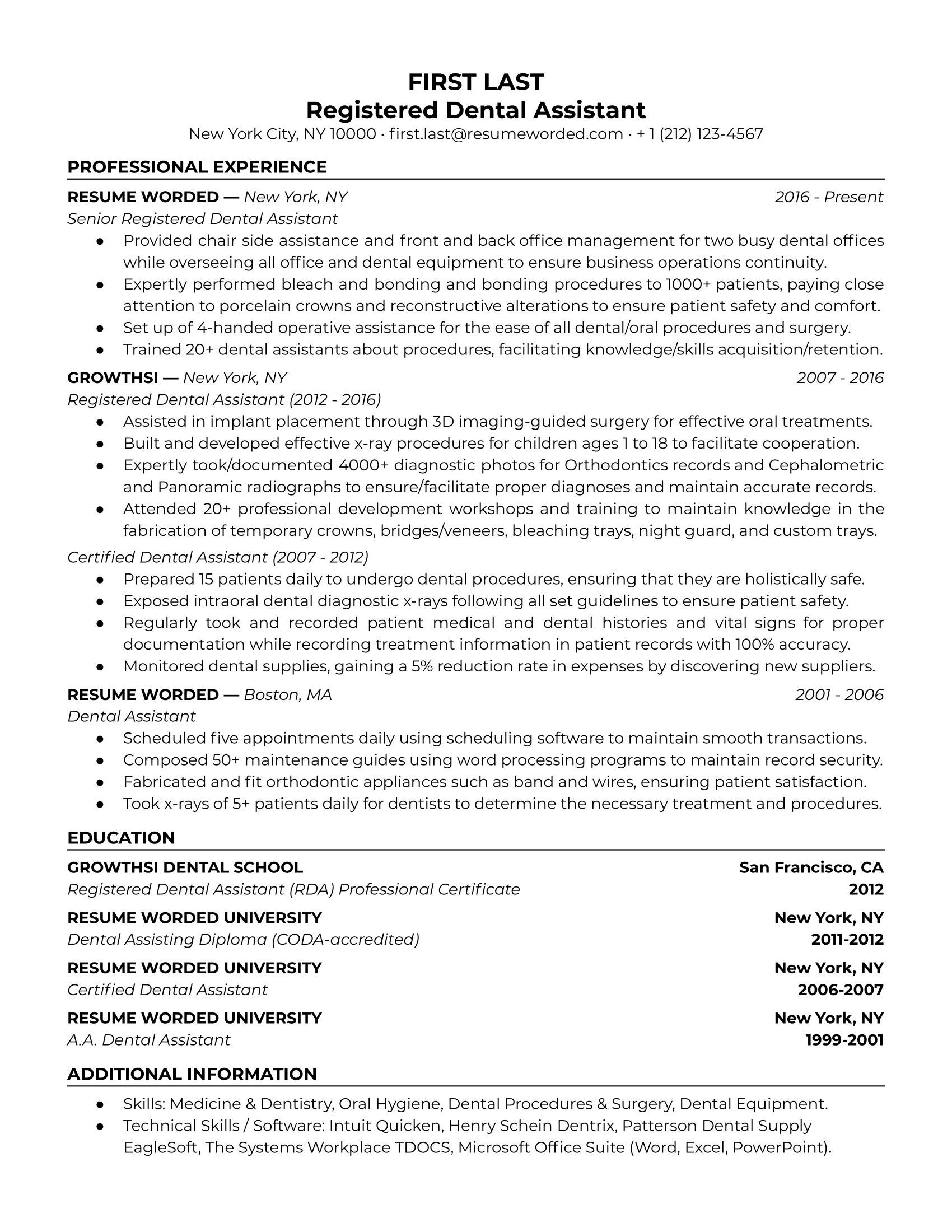
Respiratory Therapist
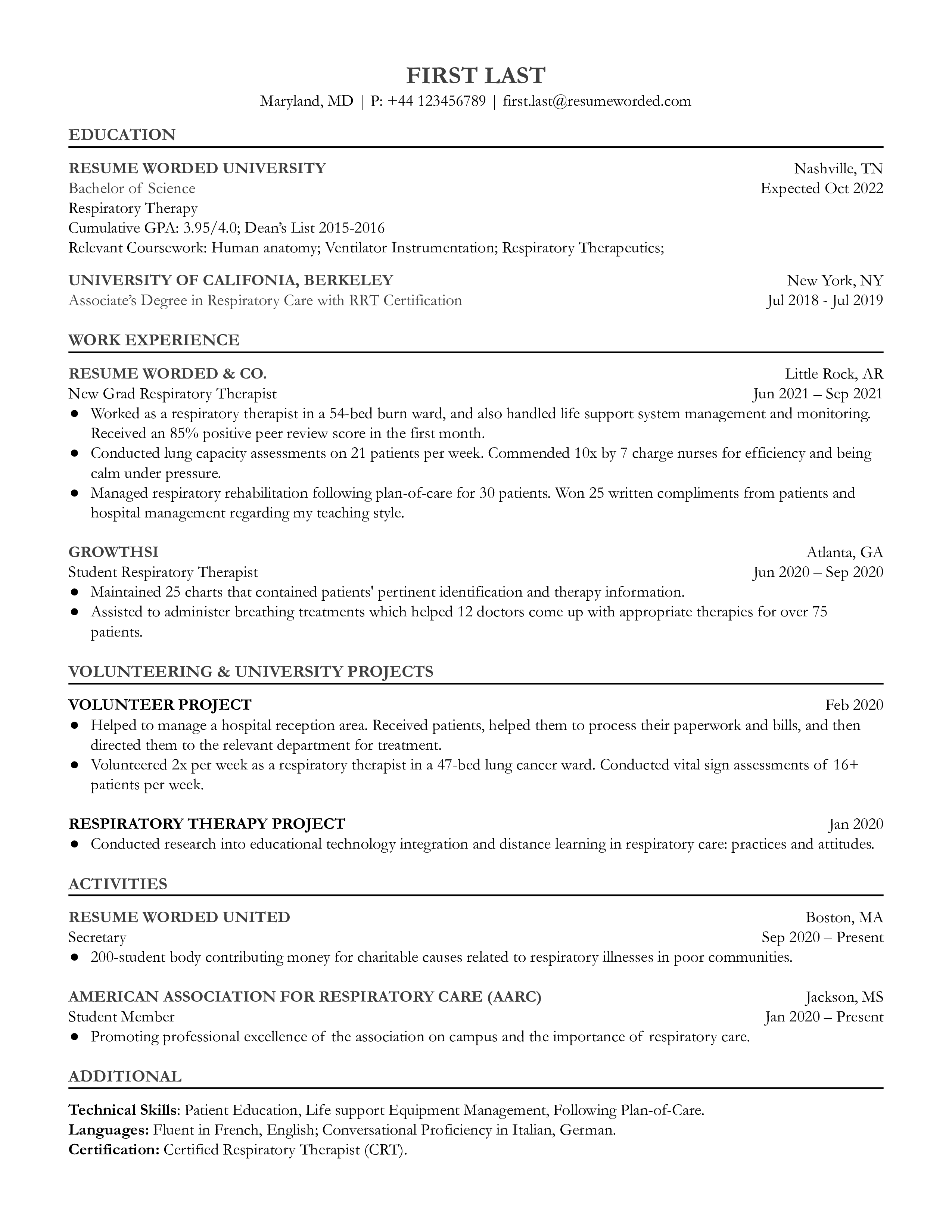
Nursing CV Guide
- Dental Assistant CV Guide
- Case Manager CV Guide
- Respiratory Therapist CV Guide
- Medical Billing CV Guide
- Therapist CV Guide
- Quality Control CV Guide
- Care Coordinator CV Guide
- Occupational Therapist CV Guide
- Clinical Research CV Guide
- Radiologic Technologist CV Guide
- Pharmacy Technician CV Guide
- Medical Technologist CV Guide
- Microbiologist CV Guide
- SLP CV Guide
- General Nurse CV Example
- Experienced Nurse CV Example
- Certified Nursing Assistant CV Example
- Registered Nurse CV Example
- ICU Nurse CV Example
- NICU Nurse CV Example
- Psychiatric Nurse CV Example
- Nurse Case Manager CV Example
- Nursing Student CV Example
- Travel Nurse CV Example
- Nurse Practitioner CV Example
- New Grad Nurse CV Example
- Director of Nursing CV Example
- Nursing Supervisor CV Example
- ER Nurse CV Example
- Clinical Rotation Nurse CV Example
- Charge Nurse CV Example
- Remote Nurse CV Example
- Preceptor Nurse CV Example
- Relief Charge Nurse CV Example
- LPN Nurse (Licensed Practical Nurse) CV Example
- LVN Nurse (Licensed Vocational Nurse) CV Example
- ICU Charge Nurse CV Example
- Prior Authorization Nurse CV Example
- Clinic Nurse CV Example
- Medical Surgical Nurse CV Example
- Skills and Keywords to Add
- Related Medical Resumes
- All Resume Examples
- Explore Alternative and Similar Careers
- Nursing Cover Letter
- Nursing Interview Guide
Download this PDF template.
Creating an account is free and takes five seconds. you'll get access to the pdf version of this resume template., choose an option..
- Have an account? Sign in
E-mail Please enter a valid email address This email address hasn't been signed up yet, or it has already been signed up with Facebook or Google login.
Password Show Your password needs to be between 6 and 50 characters long, and must contain at least 1 letter and 1 number. It looks like your password is incorrect.
Remember me
Forgot your password?
Sign up to get access to Resume Worded's Career Coaching platform in less than 2 minutes
Name Please enter your name correctly
E-mail Remember to use a real email address that you have access to. You will need to confirm your email address before you get access to our features, so please enter it correctly. Please enter a valid email address, or another email address to sign up. We unfortunately can't accept that email domain right now. This email address has already been taken, or you've already signed up via Google or Facebook login. We currently are experiencing a very high server load so Email signup is currently disabled for the next 24 hours. Please sign up with Google or Facebook to continue! We apologize for the inconvenience!
Password Show Your password needs to be between 6 and 50 characters long, and must contain at least 1 letter and 1 number.
Receive resume templates, real resume samples, and updates monthly via email
By continuing, you agree to our Terms and Conditions and Privacy Policy .
Lost your password? Please enter the email address you used when you signed up. We'll send you a link to create a new password.
E-mail This email address either hasn't been signed up yet, or you signed up with Facebook or Google. This email address doesn't look valid.
Back to log-in
These professional templates are optimized to beat resume screeners (i.e. the Applicant Tracking System). You can download the templates in Word, Google Docs, or PDF. For free (limited time).
access samples from top resumes, get inspired by real bullet points that helped candidates get into top companies., get a resume score., find out how effective your resume really is. you'll get access to our confidential resume review tool which will tell you how recruiters see your resume..

Writing an effective resume has never been easier .
Upgrade to resume worded pro to unlock your full resume review., get this resume template (+ 41 others), plus proven bullet points., for a small one-time fee, you'll get everything you need to write a winning resume in your industry., here's what you'll get:.
- 📄 Get the editable resume template in Google Docs + Word . Plus, you'll also get all 41 other templates .
- ✍️ Get sample bullet points that worked for others in your industry . Copy proven lines and tailor them to your resume.
- 🎯 Optimized to pass all resume screeners (i.e. ATS) . All templates have been professionally designed by recruiters and 100% readable by ATS.
Buy now. Instant delivery via email.
instant access. one-time only., what's your email address.

I had a clear uptick in responses after using your template. I got many compliments on it from senior hiring staff, and my resume scored way higher when I ran it through ATS resume scanners because it was more readable. Thank you!

Thank you for the checklist! I realized I was making so many mistakes on my resume that I've now fixed. I'm much more confident in my resume now.


IMAGES
COMMENTS
When applying for a nursing role, a great CV is crucial if you want to get hired. Your CV needs to grab recruiters’ attention and tell them exactly why they should interview you quickly. This guide will walk you through every step of creating a winning nursing CV and also includes 7 nursing CV examples you can use for inspiration. Guide Contents
Jul 7, 2023 · Expert Reviewed by: Amanda Guarniere, NP, Founder of the Resume RX In 2024, a vague, uninspiring nursing resume just won't cut it. Recent years have fostered growing competition for the best nursing jobs, creating a greater need for nurses to learn how to write exceptional nursing resumes.
Real examples and templates of Nursing resumes, updated for your 2024 job search. Download them for free, plus learn how to update your resume for 2024 standards.
Oct 23, 2024 · How to Write a Nursing Resume. 1 Do Your Research. Learning how to write a nursing resume requires dedicated research that allows you to target information to your potential employer. On top of carefully going through the job description, look at the employer’s website and social media platforms to figure out their culture and values.
Action Verbs For Nursing Resumes. The lifeblood of a vibrant nursing CV is 'action verbs'. These words paint a picture of you, up and doing. They show you as a nurse who cares, heals, guides, and comforts. Which are, after all, the heart of what being a nurse is all about. Action verbs whisper to the hiring managers, "This is someone who does ...
Feb 12, 2024 · How to write a nursing resume Here are some step-by-step instructions you can follow to craft a successful nursing resume: 1. Share your primary contact information At the top of your nursing resume, clearly state your primary contact information to make it easy for hiring managers to reach you. Include your full name, phone number and email ...